.....
|
|
|
|

(delwedd B9360) (tudalen 500)
|
500 WEST SOMERSET WORDS.
to a ploughin-match to Broad Hembury, and car'd away the fust prize way nort but an old nanny-zull."
October 1883.
NAP [naa-p], sb. A blow.
I'll gi thee a nap under the ear, let me catch thee again.
NAP-KNEED. See KNEE-NAPPED. NAP, NAPPY. See KNAP. NAPPER. See VUZ-NAPPER.
NASH [naash, naarsh], adj. Tender; delicate. (Daily use.) Comp. pronunciation of [vlaarsh, fraasri,
maarsh,] flesh, fresh, mesh. A.-S.
hnesc, hnczsc, soft, tender.
I don't never keep thick munchy sort o' pigs, they be so nash.
Neschyn, or make nesche. Mollifico.
Growe nesche. Mollesco. Promp. Parv.
EC muwen more dreden j?e nesche dole f>ene j>e herde of f>eos
fondunges J?et is uttre ihoten. Ancren
Ri-wle, p. 192.
And woundede him rith in the flesh,
>at tend re was, and swij?e nesh. Havelok the Dane, 1. 2742.
And )>e saul mare tender and nesshe,
]>an is ]>Q body with ]>e flesshe. Hampole, Pricke of Conscience, 1.
3110.
God hath made neische myn herte, and Almi3ti God hath disturbid me.
Wyclifvers. Job xxiii. 16.
The thridde norice him scholde wassche.
The child was keped tendre and nessche.
Weber, Met. Rom. Seuyn Sages, 1. 731.
For wymmen beth of swyche manere,
All tendre and nessche. Ib. Octotdan Imperator, 1. 1209.
]je lond is nesche, reyny, and wyndy, and lowe by ]>e see syde.
Trez'isa, De Hibernia, vol. i. p. 333.
of quareres of marbel of dyuers manere stone, of reed, of whyt, of nasche,
of hard, of chalk and of whyt lym.
Trevisa, Descr. of Brit. Lib. i. c. 41, 1. 43.
NASTEN [naa-sn], v. t. To befoul; to soil; to render filthy or nasty.
Mind and take care o' the paper, and nit nasten it all over. Said to a man before whitening a ceiling.
NASTIFIED [naa-stifuyd], adj. Dishonourable; tricky; ungentlemanly.
A keeper said to me: "I zim Mr. was a little bit nastified
like, vor to watch me away, and then shut my tame birds.
NASTMENT [naas-munt], sb. A filthy mess; a nuisance; a Jakes.
Don'ee mind thick night, hon we was bird-boitin, how you tum'ld all along in the nastment, and how
you zaid how we tookt ee there same
purpose?
|
|
|
|
|
ñ
(delwedd B9361) (tudalen 501)
|
WEST SOMERSET WORDS. 5<DI
NASTY [naa'stee], adj. Crabbed; ill-tempered; displeased. Maister was ter'ble nasty s'mornin 'bout
the ducks; he zess how ' twas all your
faut.
NATION [nae'urshun], adj. Very; extremely. (Contr. of damnation.) In daily use.
I considers 'tis nation poor sport, we ought to a-vound dree times so much.
Right on they went (I zed avoore The
tackle all wiz stout, An' nashun
strong) zo all the line Zoon vrom the
reyle hurn'd out.
Pulman, Rustic Sketches, p. 37. Also p. 70.
NATION-SEIZE [nae'urshun-sarz]. A very common imprecation, uttered
thoughtlessly by many people at the smallest
provocation. So common has the phr. become that it has developed into an adj. nation-seized.
Nation-seize thee! where's a-bin bidin about to?
Well I'll be darned, if this idn a purty nation-seized sort of a job; here be we a-comed all this yur way and
brought all our things and that, all
vor nort.
I hates a hoss, ver I've ben drow'd
Vrem all that ever I've a-rode,
An' zo I sez, Sir, I shall vail,
Ver your's is nation-seyzed tall. Pulman, Rustic Sketches, p. 57.
NATOMY. See NOTTOMY.
NATTLED [naafld], part. adj. i. Stunted; checked in growth. Applied to young animals. W. H. G. Dec. 6,
1883.
2. Knotted; tangled.
How's anybody vor to quill this yur yarn? On'y zee how tiz a nattled up; sure they could a-tookt more
care o' it in the dye-house-n what this yur is.
NATTY [naafee], adj. and adv. Neat handed(ly); deft; dexterous.
I don't know a more nattier, clever little 'umman 'an her is.
Though danger be mickle, and sauour so fickle, Yet dutie doth tickle my fansie to
wright: Concerning how prettie, how
fine and how nettle,
Good huswife should iettie,
From morning to night. Tusser, 63- 1.
NATURAL [naafrul], sb. An imbecile person; an idiot. I calls it a very wisht thing, that out o'
dree chillern nother one idn no
better-n a nafral.
NATURAL [naafrul]. adv. Quite; entirely. (Very common.)
|
|
|
|
|
ñ
(delwedd B9362) (tudalen 502)
|
502 WEST SOMERSET WORDS.
I 'sure ee, sir, the timber was natural a-ratted like's ever you zeed ort in your life /*. e. as completely
rotten.
The things (stock) 'ont eat it, 'tis natural a vinne'd droughout /. <?. (the hay) is completely mildewed.
NATURLY [naat'urlee, naa'tlee], adv. Actually; positively; certainly.
I naturly widn gee another varden, have em or no.
They wid nafly a-car'd em all away, nif I 'adn a-stap'd em.
NATURE [nae'utur], sb. The nourishing property of vegetable matter; nutrition; goodness, as applied to
food.
Nif that there hay do bide about much longer, there 'ont be a bit o' nature a-left in it /. e. if the hay
remains longer exposed to rain and
wind.
Hon they do gee us a little bit o' mait, 'tis a-bwoild and a-bwoild gin there idn neet one bit o' natur a-lef
in it. Complaint of a workhouse
inmate.
NAUNT [naa-nt], sb. This, like nunde (q. v.), does not necessarily imply relationship.
Well! just eens I was comin' along, who should ees meet but th' old Naunt Betty, so I zaid, s' I, Well,
naunt, and how d' ye sim you be?
I haue a naunte to nonne ' and an abbesse bothe,
Hir were leuere swowe or swelte * J)an suffre any peyne.
Piers Plowman, B. v. 153.
NAWL [nau'l], sb. Awl. Always so when used alone; yet we talk of a shoemaker's awl, a brad-awl,
&c.
Jack's a zeed my nawl? I had'n a minute agone.
Nail for a souter alesne.
Nall-makevfaisevr dalesnes. Palsgrave.
Hole bridle and saddle, whit leather and nail,
With collers and harneis, for thiller and all. Tusser, 17-4.
NAWL [naa-ul], sb. Navel. (Com. pronun.)
For whi helthe schal be in thi nawle, and moisting of thi boonys.
Wycltfvers. Proverbs iii. 8.
Thi nawle is as a round cuppe, and well formed. Ib. Song of Solomon vii.
2. wi thy dugged Clathers up zo vur as
thy Na'el.Exmoor Scolding, 1. 135.
NAWL-CUT [naa-ul-kuut], sb. Used by butchers. The belly part.
His strengthe is in hise leendis, and his vertu is in the naiule of his
wombe.
Wycliffvers. Job xl. 12.
NEAR [nee-ur], adj. and adv. i. Close. Seldom used in the ordinary sense of dose to. See NIGH.
|
|
|
|
|
ñ
(delwedd B9363) (tudalen 503)
|
WEST
SOMERSET WORDS. 503
'Twas a near shave eens you wadn too late.
That'll do near enough; nif 'ee try to do it better you'll spwoil it.
That's near enough; no 'casion vor no glue joints 'bout thick there job. Well, nif 'twadn rezackly
(exactly), 'twas so tiear's fourpence is to a groat. You baint no-ways near
a-come, not 'eet /. e. you are not yet
nearly arrived.
2. adj. Stingy; miserly.
Tid'n no good vor t'ax he; a's to near vor to be honest; why, arter anybody Ve a-do'd the work 'tis a
worth eighteen pence vor to get a
shillin' out o' un.
3. sb. Use, purpose in the phr. "What's the near." (Com.) What's the near to tell up such stuff's
that?
NEAR BY [nee-ur buy], adv. Close at hand.
How far is it to Blagdon? Oh, you be near by, tidn no ways herefrom.
NEAR CHANCE [nee-ur chaa-ns], sb. A close shave; a near miss.
'Twas all but the nearest chance in the wordle we 'adn a turn'd over.
MncT Hi .. (Com.)
NEARDES T [nee' J
'Tis nearder thick way-'n tother. Comp. varder
(lit. further), smallder, &c.
These forms are not so common as handy, handier, nigher^ nighest, because near itself is very seldom
used in this sense.
NEAR-SIDE [nee-ur-zuyd], sb. The left side. In speaking of horses, carriages of all sorts, or
driving, the left side is always so
called, because the driver always walks on that side of the team. Frequently used in reference to persons and
places, but in such connection it is
rather horsey. See OFF.
This can have no connection, as suggested, with neere or neare the kidney, or its antithesis would not be
off. See Neere in Promp. Parv.,
Palsgrave, &c.
NEAT [nai't], adj. Applied to wines or spirits; undiluted. Hot or cold, sir? Nother one o' it let's
have it neat. It is common to see
"neat wines" as one of the announcements at an inn or public-house holding a spirit
license.
NEAT [nai-t], sb. Cattle; bullock. This word is nearly obsolete, and is only now found in
combination, as neatherd (which is
seen in auctioneers' advertisements and particulars of sales, &c.), and in” neat's-foot
oil," the common and only name
for an oil obtained by boiling the feet of cattle much used by curriers.
|
|
|
|
|
ñ
(delwedd B9364) (tudalen 504)
|
504 WEST SOMERSET WORDS.
NEET, beest. Bos. (Neef, or hekfere, infra in styrk. luvenca.} NEET BREYDARE. Reciariiis. NEET DRYVARE.
Armentarius. NEET HYRDE. Bubulus. NEET
HOWSE. Promp. Parv.
NEAT AS A NEW PIN [naits u nue' peen]. Very neat.
I didn know th' old Dame Morgan's darter, her was a-dressed off so fine, and so nate's a new pin
different to hot her is home about.
(Very com.)
NECESSARY [naes-usuree], sb. A privy. (Com.)
NECESSITY [nai'saes'utee], sb. See STILL-WATERS.
NECK [naek], sb. It is still the custom at the cutting of the last field of wheat on a farm, to take a
large handful of ears and plait the
straws into a fanciful shape, very much like the fantastic constructions of plaited palm leaves,
carried by Roman canons on Palm
Sunday. This is called the neck, and is still to be seen in many West country farm-houses, usually
hanging to the kitchen ceiling or the
bacon-rack until supplanted by a new one at the next harvest. In parts of N. Devon and the
Exmoor district there was quite
recently a kind of ceremony at the completion of the cutting, called” crying” or” hollaring the
neck" but in many places the neck
is preserved, while the words and the custom are lost or forgotten. Neck is no doubt nick or
nitch (q. v.), a sheaf.
For the following I am indebted to the Rev. W. C. Loveband, Rector of West Down:
"Tom Dobb of West Down, who has cried 'neck* for more than sixty years, is my informant.
" The * neck ' should be made of bearded wheat with four lissoms or plaits. Size of sheaf (neck) ' big's
your hand-wrist.' Two rows of the
lissoms at least. Cried at the finishing of reaping. One man stands in the middle of the ring of
reapers, holding it up. The words
begun very low [Wee* ... ae' ... un], we have un (twice). We ...e..e...ae...a...a...a neck (third
time), (we have a neck), crescendo
throughout. Repeated three times, and
ending with cheers, or rather, Wooroa!
1 'The neck must be kept dry, and put on the supper-table dry. The 'maids or women' of the house endeavour
to 'souse water' over the one who
carries the neck, and if he allows it to become wet, he is not allowed to have anything to
drink for the rest of the evening. Tom
has been * wet droo ' many a time, but some one else in the mean time slipped in with the
neck"
The Rev. Rowland Newman of Hawkridge says that "the old custom of crying a neck is still continued
in the neighbourhood of Holland,"
and he substantially repeats the same account as the above respecting the maids and the water.
As a boy I remember seeing the neck
cried near South Molton, but I do not recollect the water business, though that may have
occurred. What I saw was dene in the
harvest-field.
|
|
|
|
|
ñ
(delwedd B9365) (tudalen 505)
|
WEST SOMERSET WORDS. 505
My recollection is clear that the shout was given as an antiphon by two
sets; one began” We . . . ae . . .
un!” answered by” Hot-ave-ee?" repeated twice. The third time, "We. . . ae . . . a
neck!” answered by ' ' A neck I *.neck! a neck!" all in chorus, followed by Hurrahs. There
seem to be several variations in the
mode of performing this ancient rite, and during a visit in 17655 that
statesman (Lord North) was so scared
by the cries of a body of reapers, who were "crying the neck" at the close of harvest,
with upraised hooks, and the traditional shout, "We have un!" that he thought his
life was threatened. His friend, Sir
Robert Hamilton, seizing a sword, rushed out to repulse the
"enemy," when the
time-honoured custom was explained and all fears allayed.
1886. R. N. Worth, History of Devonshire (Axminster), p. 67.
In reference to the above Mr. Worth writes:” I have heard of the custom in all parts of Devon and Cornwall,
and it is current in Cornwall now,
especially toward the west." He also calls attention to a detailed description of” crying the
neck” in Couch's Polperro^ 1871, pp.
159-60. Also to Mrs. Bray's The Borders of the Tamar and the Tavy, 1879, pp. 285-7, who regards
the custom as Druidical. Mr. Worth
also points out that a similar custom in Cumberland is recorded in Brand's Popular Antiquities;
ed. 1877, p. 302.
NECK AND CRAP [naek--n kraap-], adv. phr. Bodily; completely, and with
violence understood.
A publican who violently ejected a customer would be said "to turn un out neck-n crap' 1
So a headlong tumble into a pond would be described, "he vailed in neck-n crap"
NECKHANDKECHER [naek-ang-kechur], sb. Neckerchief, necktie. (Always.) See HANDKECHER.
Will Moles 've a-brought our Liz a new silk \neck' ang'kichur}. He bought-n to Minehead fair same purpose
vor to gee un to her.
NECK-HAPSES [naek-aap-sez]
Are the irons put round the necks of the” under-horses” to support the bodkins of the front ones. Pulman, Rustic
Sketches, p. 162.
These are evidently the "bearing gears” of Gervase Markham:
then there is needfull the plow devise, and teame, the toustred, the
swingle trees, the treates, the
harnesse, the collars, the round withs or bearing geares, bellie-bands, backebands, and bridles. A.D.
1616. The Countrey Farme, p. 533.
NECK OF THE FOOT [naek- u dhu veo-t], sb. The instep.
Did'n hurt-n much; there was a bit of a risin' like jist 'pon the neck d the voot like, where the wheel urn'd
over'n; but there, there wad'n no
bones a-brokt, and he 'ont take no notige o' ut.
NEDDY [nardee], sb. Cant name for donkey.
NEEDCESSITY [nud-sas-utee], sb. Necessity.
There wadn no needcessity \ all vor you to a-paid, I'd a settled, and a-paid em avore.
|
|
|
|
|
ñ
(delwedd B9366) (tudalen 506)
|
506 WEST SOMERSET WORDS.
There ont be no needcessity vor you to come, 'thout you be a mind to.
NEEDMENTS [nee'dmunts], sb. Necessaries.
Poor old blid! her 'ant a-got the needments vor to keep body and soul together her's jist a-starved to
death ees! and that her is!
NEEDS [needz], adv. Of necessity; forsooth. Com. among farmers and others above the labouring
class.
I told thee to hold thy jaw, but there thee must needs go and let out how 'twas me ya gurt gapmouth! I've
half a mind to wring the scraalin'
neck o' thee.
NEEL [nee-iil], sb. Needle (always).
Those who have been to school and know how to spell, such as maid-servants, &c., say niddle [mid'l].
George, thee mind and get a neel-n. twine vor to mend they there bags.
[Lai'n-s dhuy paak'een nee'ul, wiif?] lend us thy packing needle, wilt?
NEET [neet], sb. i. The most usual pronun. of night without stress, and when in combination. (Exact
rhyme of sweet.) 'Tidn vull moon
again, neet's vortneet. Come in umbye-#^/.
2. adv. Not.
He ont be a finish'd, neet avore Zadurday night [nai't].
Rather an emphatic, though common form. See NIT.
NEET A'MOST [neet u-mairs], adv. Not almost; /. e. not to be compared; nothing like it. (Very com.)
Shan't zell mine vor no less'n Mr. Gilham. Well then you can keep em vor yours baint so good, nor neet
dmost.
NEGLECTFUL [naiglaek-feol], adj. Negligent.
Tidn no use vor tris to her: her's the \tiaiglaek'feols~\
neglectfulest bitch ever come into a
house.
NEIGHBOURING [naa-ybureen], sb. and part. adj. Gossiping; idly gadding about to neighbours' houses.
I baint no ways surprise vor to zee they boys ragged and beastly; there's to much neighbouring always gvvain
on, vor the house to be a looked
arter.
All o'm up in thick there row be all of a piece, the neighbourins, chacklins lot in all the parish.
(Neighbouringest, chacklingest.)
NEIGHBOURY [naa-yburee], v. i. To go about idly gossiping at neighbours' houses.
There! I never don't urn about, nor I don't neighboury same's
|
|
|
|
|
ñ
(delwedd B9367) (tudalen 507)
|
WEST SOMERSET WORDS. 5O/
some vokes, and I told Mrs. Tottle tother day, I says, s' I, Tis hard vor anybody's chillern vor to be 'cused,
&c.
Better fit her'd bide home and tend her chillern, an' neet be all her time neighbourin and hinderin they that
got work vor to put out o' hand.
NEMONY [minvunee], sb. Anemone.
They there nemonies makes a good show, don't em?
The first syllable in the singular is of course taken to be the indefinite demonstrative, and so becomes
dropped in plural or definite constructions. Comp. nottomy. Anemone is often
corrupted into enemy.
NERE [nee-ur], adv. Mere. Constantly so pronounced. 'Twas a nere nothing. See BUCKLE AND
THONGS.
NESAKTLY [nuzaak'lee], adv. Exactly.
[Aay kaa - n tuul'ee nuzaak'lee wuur ez*,] I cannot tell you exactly where he is.
Also pronounced ruzaak'lee, luzaak'lee, udzaak'lee.
NESSES [naes'uz], sb. Nests; sing, ness; plur. nesses.
This is rather the commoner form than nestes the / is never heard in the singular, except before a vowel,
and even then but rarely; the same
with best, worst, &c.
They there bwoys be arter the bird's nesses ageean!
NEST [naes-(t], v. t. To nestle; to coil up like a dog. Refers to the way a dog turns round, before he
lies down. See NOOZLE. He (a dog) ness'd
hissel down 'pon the cold ground like.
NEST [naes(t], sb. A collection of any kind of things; a gathering.
You never didn zee no jich nest o' rummage in all your born days.
There was Jack Billings and Ned Cowlin and a purty nest o'm in there; zo I started to once, vore they zeed
me.
NEST-EGG [naes-t-aeg-], sb. The addled or "cloamen" egg kept in the nest of a laying hen. Also
very often used metaphorically.
A woman making a deposit in the Penny Bank for her little boy said:
I sim I do want to put in a bit of a nest-egg vor-n, gin he can sar (earn) something vor his zul.
NESTLE-TRIPE [naes-1-truyp], sb. In every large brood or litter there is certain to be one smaller
and weaker than the rest; this is
always called the nestle-tripe. So also is a weak puny child.
|
|
|
|
|
ñ
(delwedd B9368) (tudalen 508)
|
508 WEST SOMERSET WORDS.
In dealing for a” varth” of pigs, it is very common for the buyer to say, "Well then I 'ont gie the same
for the nestle-tripe" or "you
shall drow out the nestle-tripe."
NESTY [naes-tee, naes'ee], v. i. To build nests. The rooks '11 very zoon begin to nesty,
I've a-zeed zome o'm carrin 'bout
sticks a'ready. Another speaker would say to nessy.
]>eos ne beofc nout iliche J?e pellican ]>e leane, ne ne vleoj) nout an
heih ' auh beo> eorj? briddes, *\
nested o >er eorfce. Ancren Riwle, p. 132.
NETTLE [naefl], v. t. To rouse the anger; to irritate.
I was that a nettled, I could a up wi' my vice (fist)-n hat-n down.
NETTLY UP [naet-lee aup', nuflee aup-], v. i. To become angry; to fly into a rage.
I zaid to un, s' I, Tidn no goodvor to nettly up like that there about it; could'n be helped; and if hard
words don't break no bones, why I'll
warn they ont mend no winders.
NEVER [niivur], adv. and sb. i. It will not fail to have been noted how the use of never leads to the
piling on of negatives. I 'ont never
zee un again, not so long's I do live.
Stap cheel! never' s a long day. See LIKES i.
2. By no means; not at all.
You can't never 'spect they beast to goody in no such keep's that I calls it starvin' o'm. For ill. see
also ILL-TENDED, M ISLE ST.
NEVERSTIDE [naevurstuyd], sb. Never. Like "when tomorrow comes."
It is common to say to children, that they shall go somewhere next neverstide; or that they shall have a
silver new nothing next neverstide.
NEVER THE NEAR [naevur dhu nee'ur],//zr. Unavailing; to no purpose. (Com.)
There! her ten' un and her watch'n jis the very same's off 'twas her own cheel, but there, twadn never the
near, he never did'n get no better.
NEWELTY [nue-ultee], sb. Novelty. (Occasionally heard.) Well! there idn very much newelty in thick
there contraption like, he's something
same's a old ewe a dressed up lamb-fashion.
Loo dame! here is newelte! In oure
gardeyne of a chery-tree
I fond yt sekerly. Weber, Met. Rom. Sir Clcges, 1. 214.
NEW-FANGLED [nue'-vang'l(d], adj. Novel in construction; new in kind. (Very com.)
I don't like none o' they there new-vangled machines. I likes
|
|
|
|
|
ñ
(delwedd B9369) (tudalen 509)
|
WEST SOMERSET WORDS. 5OQ
"to reap and mow and plow and zow" in th' old-fashion'd way, same's father did avore me.
NEW-FOUND OUT [nue'-vaewnd-aewt], sb. Newfoundland. A boy, asked where his father was,
replied Auver to New-found-out, mum,
where they plants taties twice a year,
mum.
NEWS [nue'z], sb. Newspaper.
Our Tom's a good scholard; why, most every night they zends vor-n to come into the Barley Mow vor to
read out the war 'pon the news.
NEWSY [nue'zee], adj. Gossiping; fond of hearing gossip. There idn nort to choose 'twixt em, he's so
newsy's ever her is; other one o'm 'ud
talk a butt o' bees to death.
NEXT DOOR TO [naeks doo'ur], adv. Almost; very nearly. 'Twas next door to a miracle, 'hon the tree
vailed, eens he hadn a-killed none o'
the chillern.
NEXT-KIN [naek-skeen], adv. Almost; very nearly. Whether this is next-kin or next-skin is hard to
determine, but I think the former is
the idiom. Same as NEXT-DOOR.
The young Squire idn much o't; they zes how a's next-kin to a fool.
Anybody can't live by it, 'tis next-kin to starvin' anybody to death.
They that ban't vound out 'ill zware that each o' thef vish was neo? kin to a salmon. Ptilman, Rustic Sketches, p. 12.
NEXT-NEVER [naek's-niivur], adv. Never.
I haven't any change now, but I will remember you when I see you again. Ugh! thank'ee vor nort; that'll
be next-never I count.
NEXT-NEVER-COME-TIME .[naek-s-nuVur-kaum-tuy -m], adv. When b'ee comin' to zee us again? Oh, I
count that'll be next- never-come-
time.
Commonly used in a kind of jesting way.
NIB [mib], sb. The draught-tree or strong pole of a wagon, or especially of a timber-carriage, which
connects the axle of the hinder wheels
to the fore-carriage. In a timber-carriage it is used as a strong lever in loading, to raise up
the tree under the axle, and to keep
it suspended there. Hence it gives its name to the entire back part of an under-carriage (q.
v.) consisting of two very high
wheels, having an arched axle between them, with the nib proper projecting at right angles to it,
and with a strong iron bow or eye
fixed on the end, by which, when leary, to attach the nib to the front wheels. The pole of a
bullock-butt or ox-cart is also called
the nib.
|
|
|
|
|
ñ
(delwedd B9370) (tudalen 510)
|
5IO WEST SOMERSET WORDS.
NIB-CHAIN [mib-charn or chaa'yn], sb. A very strong chain belonging to a timber-carriage. It is that
used to suspend the tree under the
axle of the hinder wheels. It has a slip-hook, by means of which the chain can be unfastened
and the tree let fall without
loosening the chain.
NICE [nuys], adj. Fastidious; dainty; over particular as to food or dress.
I tell ee hot 'tis, nif you be so nice as all that there, you'll come to want one o' these yur days. Seems to
have had many meanings of old.
NYCE. Iners. NYCEHEDE, or nycete. Inercia. Promp. Parv. NICE: Lither, lazy, slothful, idle, faint,
slack; dull, simple. Cotgrave.
Nyse proper or feate mignot, coint, gobe.
Nyse strange nice, nyes. Palsgrave.
Quoth Pandarus, "Thow hast a ful grete care, Lest that the cherl may falle out of the
moone: Why, lord! I hate of the thi
nice fare! Chaucer, Troy, and Crys. 1. 1023.
He let his negheboures child for a vice
And went fram hem als moppe and nice. Seuyn Sages, 1. 1415.
The slouen and the careles man, the roinish nothing nice,
To lodge in chamber comely deckt, are seldome suffred twice. Tusser, 102/1.
Old Fashions please me best; I am not so nice,
To change true rules for odd inventions. Taming the Shrew, III. i.
NICE-CHANCE. Same as NEAR-CHANCE (q. v.).
NICK [mV], sb. i. A notch.
Tell how many nicks is 'pon thick there tally-stick.
2. A slit or cut for the purpose of identification upon the ear or other part of any animal. Young hares or
rabbits when set at liberty are
usually marked with a nick on one or both ears.
" The Swan with Two Necks” is really the swan having the mark of the owners, viz. two nicks on the web of
the foot.
3. A niche, as a nick in a rock.
I voun un in a bit of a nick in the wall o' th' old barn.
4. A cut or a chop made on a growing stick to permit of its being bent down or” laid” in a hedge, so
that it may throw out new shoots.
5. A nitch or bundle. See KNITCH.
6. In the phr. "nick o' time."
We happed to zee un, jis the very nick o' time. That^ there hay was a-catch'd up jist in
the very nick o' time; nif we had'n
a-do'd it tho, there must a-bide vor a wole vortnight.
|
|
|
|
|
ñ
(delwedd B9371) (tudalen 511)
|
WEST SOMERSET WORDS. $11
7. In the epithet” Old Nick” for the Devil.
NICK [nik], v. t. i. To act at precisely the right moment. I nicKd it rezactly, in two minutes more
twid-n a do'd at all.
2. To notch; to cut a notch. I've
a.-nicKd my knive again.
It is no trevve poynte to nycke your tayle or to haue mo nyckes upon your
tayle than I haue upon myne.
Palsgrave, p. 644.
Some cutteth the napkin, some trencher will nick, Some sheweth like follie in many a trick.
Ttisser, 98/4.
NICKLED UP [nik-ld aup], part. adj. Entangled; twisted. Often said of beaten-down corn or grass.
No machine on't never tich o' thick there piece o' barley, he's B.-nlckled up all forms and farshins.
NICKLE-NACKLE [nik'l-naak'l], sb., adj., and adv. i. Applied to substances or fibres tangled.
Why, thee's a-got the skein all to a nickh-nackle.
However's anybody gwain to toze out this yur nickle-nackle consarn?
2. Applied to persons namby-pamby, pottering.
Don't let me catch thee here no more, ya nickle-nackle osebird!
NICKY [nik-ee], sb. Brambles, kexes, and other hedge-primings (browse) done up in a small faggot called
sometimes nicky-wad. When dry they are
admirable fire-lighters. (Very com.)
Let Jim take the mare and go down in the Bottom-mead arter they nickies what Joe Ve a-tied up. Same as
NITCH.
NIDDICK [niid'ik], sb. The nape or back part of the neck. Applied also sometimes to the back of the
head, and to the head itself.
The bwoy's a-hat mortal hard there's a gurt hump 'pon the niddick o' un so big's a duck- egg.
Is dedn't me-an the Boneshave, ner the Heartgun, ner the Allernbatch
that tha had'st in thy Niddick. Ex.
Scold. 1. 24. See also Ib. 1. 555.
NIDDY [niid'ee]. Same as NEDDY. A fool; a jackass. Thee must be a purty niddy vor to go down
same purpose vor to vatch the hook,
and then come away wayout-n.
NIF [neef], conj. If; an' if. (Always.) Endless examples will be noticed throughout these pages. See
Ex. Scold. 11. 12, 162, 195, 196,
&c.
NIFF [mif-], sb. Tiff; state of being ruffled or displeased. Let her alone, her've on'y a-got a bit of a
niff, her'll zoon come o' that again.
|
|
|
|
|
ñ
(delwedd B9372) (tudalen 512)
|
512 WEST SOMERSET WORDS.
NIGGLE [nig'l], v. i. To do anything in a petty, mincing kind of way, without boldness or
straightforwardness; in a desultory or
dilatory manner.
Why's-n do thy work like a man, not bide there niggling way - it, like a zow 'pon a holiday?
NIGGLE [nig-1], v. t. and sb. i. Same as to nag. To aggravate. Her'd niggle anybody's live out o' em, nif
they'd let her to. Her's always 'pon
the niggle way un.
2. Nibble.
Could'n catch no fish, they wid'n only jist niggle like, 'thout bitin' proper.
NIGGLING [nig-leen], adj. Mean; cheese-paring. A niggliri old thing! can't get nort out o'
her her'd skin a vlint by her mind.
NIGH [nuy], adv. Comp. nigher, super. Highest, near, nearly. The usual word, though handy is perhaps
more frequently used in speaking of
situation or distance.
Nif they wadn every one o'm there, I'll take my oath 'twas nigh upon it /. e. very nearly all.
Thick way's so nigh's you can go; I reckon he's nigher by a mild, vull up-m th' old road.
'Twas the nighest chance in the wordle, eens the gurt piece o' rock had-n a-come down tap o' my 'ead (upon
my head).
NIGHST [nuyst]. Var. pronun. of 'neast. See ANEAST.
NIGHT [nai't, emphatic}, sb. Any time after the day's work is over.
" I'll do it vor ee m' bye night" even if said in the summer,
would mean "this evening after
six." Evening \ a genteel word seldom
used by peasants, except to gentry. They have other words to signify” dusk cf evening," &c. See
UMBYE.
NIGHT-CAP [nai-t-kaap], sb. A glass of hot grog just before going to bed.
I be next-kin to a taytotal, I be, but I sim I can't slape vitty, nif I han't a-got my little bit of a night-cap
like, avore I goes to bed.
NIGHT-CROW [nart-kroa-], sb. The night-jar or goat sucker. (Usual name.) Caprimnlgus Europceus.
NYGHTE-CROWE. Nicticorax. Promp. Parv.
A NYGHTE-RAVENE, cetuma, nicticorax, noctua, strix. Cath. Ang.
NIGHT- CROWE cresscrelle. Palsgrave.
. . . . the shrieks of luckless owls
We hear, and croaking night-crows in the air!
Ben Jon son, Sad Shepherd, II. ii.
|
|
|
|
|
ñ
(delwedd B9373) (tudalen 513)
|
WEST
SOMERSET WORDS. 513
NIGHT-HALTER [nai't-airltur], sb. The ordinary leather head-stall, with chain attached, with which
horses are fastened when in the
stable. See HEMPEN HALTER.
NIGHT-HAWK [nait-airk]. Same as NIGHT-CROW.
NIGHT-HUNTER [nart-uun-tur], sb. Poacher. (Com. name.) Th' old Jack in the Box, eens they calls'n,
's the worst night-hunter hereabout.
Thick there dog hot he've a-got's a proper night-hunter.
NIGHT-TIMES [nartuymz], adv. At night. (Very com.) Plaise, sir, I be a past the standard. I
goes to work, but I goes to school
night-times.
NIMBLE-TAILOR [nunrl-taa-yuldur]. i. A well-known and prolific variety of field-pea.
2. The long-tailed titmouse. (Occasionally.) Parus caudatus.
NIMMLE [mimi], adj. Nimble.
The nimmle ninepence is better'n the dead shillin'.
NINCUMPOOP [ning-kumpeo-p], sb. A sawny, fool, duffer.
Zo, Mary, they zess you be gwain to be a-married. Who way, then? Au! why he up to Jones's be sure. Git
out wi' thee 1 's think I'd have zich
a poor little nincumpoop's he?
NINNY, NINNY-HAMMER [niiiree], sb. A softy; a spoony; silly fellow. Usually qualified by great or
little.
[Git aewt! ue's dhingk-s gwai'n vor ae*u jish guurt nun'ee-aam-ur-z dhee f
aart?] be off! who do you think will have such a great spoony as you?
NINNY-WATCH [min-ee-wauch], sb. A state of great excitement, of longing
expectancy.
The women was all to a ninny-watch gin they zeed the boats comin' back.
Why thee art in a Ninniwatch e'ery other Torn, nif zo be tha dest bet zet zeert in Harry Vursdon. Ex. Scold. 1. 36.
NIP [niip], v. t. i. To pinch.
What ails thy hand? Why, I nip the tap o' my vinger, eens a was graysin the timber-carriage, and now
the nail's a-slipt oaf.
2. To wither; to scorch.
'Twas a smart vrost last night Vave z.-nipt all the kidney-beans.
3. v.i. To slip rapidly through, or past; to go quickly and stealthily.
I zeed'n comin, zo I nipt in behind the door, and there I bide gin he was a-started again.
L L
|
|
|
|
|
ñ
(delwedd B9374) (tudalen 514)
|
514 WEST SOMERSET WORDS.
NIP [niip], sb. i. A small meal.
Th 1 old missus was always very good like to me, her used 'most always to tell me to come in the kitchen
and have a bit of a nip.
2. A pinch; a squeeze.
I meet way a nip in the drashin'-machine 'most squat my thumb abroad.
3. Also figurative.
'Twas a purty hard nip for 'ee, lostin' thick there gurt zo\v I count he was a wo'th up vive pound, wad'n
'er?
O painfull time, for euerie crime,
What toesed eares, like baited beares!
What bobbed lips, what ierks, what nips! What hellish toies lTusser, 113/5.
NIP-CHEESE [niip'-cheez], sb. A miser.
NIP OFF [mip- oa'f], v. i. To make off rapidly and by stealth. The young osebirds nipt <^f avore I
could come aneast em drat their heads!
NIPPER [mSp-ur], sb. A small boy. (Very com.)
I mind hon I was a nipper I was fo'ced to work hard; ees, and live hard too. Here, nipper / look sharp!
NIPPIGANG [niip'eegang], sb. A gathering, or whitlow; an abscess; carbuncle. (Very com.)
I 'ant a-bin able vor to do nort 'is wik-n more I got a nipp-'gang 'pon my 'an'- wrist; and he do ache, I
'sure ee and I be 'feard there's
another comin' tap my thumb.
NIPPY [nup-ee], adj. Hungry.
Well, I sim I be getting purty nippy; hot's the clock, soce?
NIP UP [nup- aup], v.t. i. To snatch up.
Her nipt up the cheel and away to go, so vast as ever her heels could car her.
2. To wither or scorch completely.
The taties be proper &-nipt up, sure 'nough! way the vrost last night.
NIT [niit], sb. i. The egg of the louse. In dogs and old horses these may be seen as white specks
adhering to the hairs.
Nyt in a marines heed knte. Palsgrave.
When ploughing is ended, and pasture not great,
Then stable thy horses, and tend them with meat:
Let season be drie when ye take them to house,
For danger of nittes, or for fear of a louse. Tusser t 21/23.
2. "So dead's a nit" is one of the regular similes commonly used as the superlative absolute of dead.
See W. S. Gram. p. 22.
|
|
|
|
|
ñ
(delwedd B9375) (tudalen 515)
|
WEST
SOMERSET WORDS. 515
NIT [nit, mit, neet], adv. Not. When not comes before other words in a sentence it takes one of the
above forms. When joined to one of the
auxiliary verbs, see N 5.
There idn nit above zix a-left. Neet half a bad job, is it? Not is only heard as a very emphatic negative.
I don't care what you do zay, I tell 'ee 'tis not.
NIT [nut], sb. Nut. Always so pronounced.
Sight o' nits about de year never know'd em thicker.
NITCH [neech], sb. A bundle of any kind, but usually of firing, either sticks or furze, such as a man would
carry home on his back. See KNITCH.
I'd zwear 'twas he; I meet'n vull butt wi' a nitch o' vuz to his back.
Reed 300 nitches of good hand-made reed for sale. Apply, John Wm. Dunn, Higher Butteiieigh, Butterleigh, near
Cullompton,
Wellington Weekly News, Dec. 2, 1886.
NITTLE [mid-1], adj. Little. This form is extremely common amongst children, and consequently among
nurses and others addressing them, as
[Yuur, BuTee! lu-mee waursh yue nud'l airz], here, Billy! let me wash your little hands.
[Bee yur nud'l veet koai?] are your little feet cold?
NO [noa-], adv. Not.
Jim, urn down and ax Bob whe'er he's comin' or no.
"Tidn a bit o' odds whe'er you do it or no.
I'll let 'e know; vore Vriday nif I be gwain or no.
NOB [naub], sb. i. The head. Tak thy
gurt nob out o' the road.
2. The nose.
Well! - he've a-got a nob of his own, an't 'er now? See NUB.
NOBBLE [naub'l], v.t. i. To steal; to get hold of by stealth; to borrow without leave.
Zomebody 've a nobbled the barrow again; drat their heads, I did'n care nif they'd on'y bring un back
again.
2. To hew stones for walling into proper shape /. e. to knock off knobs or lumps.
NOBBLER [naub'lur], sb. One whose business it is to prepare rough stones for mason's use.
A downright good nobbier?, a wo'th any wages; you can't make no good work nif the stones bain't ^.-nobbled
a little bit arter the rate like.
L L 2
|
|
|
|
|
ñ
(delwedd B9376) (tudalen 516)
|
516 WEST SOMERSET WORDS.
NOBBLY [naub'lee], adj. Having knobs or uneven surfaces: applied chiefly to building-stones. See MUM
ELY.
NOBBY [naub-ee], adj. Good; nice; pretty.
Zeed our new cart? 'Tis a proper nobby one, I can tell ee.
A late importation, but now very common.
NOBERY [noa'buuree]. Nobody. Common pronunciation in quick speech.
I don't care vor nobery, nor nobery don't care vor me.
NOBLE. Used only in the common phrase, "Noble to ninepence" [noa'bl
tu nuynpuns]. To spend lavishly or to live
extravagantly is said to be the way to bring the noble to ninepence.
One noble in season bestowed thereon
May saue thee a hundred er winter be gon. Tusser, 16/16.
NO CALL [noa kairl], phr. No need; no necessity. Nif maister axth o' ee, you no call vor zay
how I was there.
NODDLE [naud-1, nau'l], sb. The head.
There idn no sense in the noddle o' un.
Jim, hon did thy noil zee the bursh last? I'd comb un out, nif I was thee, and have a little o' the
highest o' it a-cut off like, s'now.
NODYL, or nodle of J>e heed (or nolle, infra). Occiput. NOLLE, supra, idem quod nodtil. Promp.
Parv.
J>ey vsej) long berdes and longe lokkes hongynge doun by hynde hir
nolles. Trevisa, De Hibernia, xxxii.
Vol. i. p. 355.
J?e lord schal make ballid J?e nol of the dou^tris of Sion.
Wyclifvers., Isaiah iii. 17.
Noddle of the heed coupeati de la teste. Palsgrave.
Though ]>is be derklich endited ffor a dull nolle,
Miche nede is it not to mwse >er-on. Langland, Rich, the Redeles, I. 2O.
NODDY [naud'ee], sb. A simple sawny; a stupid person; a noodle.
You never did'n zee no jich slack-ass gurt noddy in all your born days.
NODDY-POLL [naud'ee poal]. Var. of noddy. (Both very com.)
NO FASHION [noa faarsheen], adv. Badly; ill-contrivedly. Thick's a purty thing sure 'nough, why he
idn a made no fashion.
NO FEAR! [noa fee'ur!] inter/. Used constantly, but with no kind of connection with the subject.
'Twas a rare shear o' grass, no fear! and I hope we shall zee the fuller o' un next year. July 1883.
|
|
|
|
|
ñ
(delwedd B9377) (tudalen 517)
|
WEST SOMERSET WORDS. 517
NOG [naug], sb. A log, block. See NUG.
NOGGERHEAD [naug-urard], sb. A blockhead; a numskull. Call he a good-looking fuller! I calls'n a
gurt hugly noggerhead, and
s'ignorant's a 'oun (hound).
NOGGIN [naug'een], sb. A measure used only in retailing wines and spirits. A quarter of a pint.
NOGGIN [naug'een], sb. Usually brick-fWgyrW. A thin wall or partition built of bricks on edge, with
timber supports.
NO GO [noa* goo*], adv. Not to be done; impracticable.
Turney Payne do'd all he could vor'n, and maister spokt up vor'n too, but twadn no go, they widn 'ark to it,
and they gid'n zix months.
NO GREAT SHAKES [noa guurt shee'uks]. A generally depreciatory expression; inferior.
" They taties baint no gurt shakes” means they are not good.
" Her idn no gurt shakes" means that her reputation is doubtful.
Also applied to health.
Thank'ee I baint no gurt shakes 'is mornin, I 'sur'ee; my breath is so short, and I can't make use o' nothin
'ar'ly.
NOHOW [noa'aew], adv. In no way. Can't
do it nohow this week.
NOIL [nauyul], sb. Tech. In the process of combing, after all the long-fibred wool has been "pulled
off" from the comb into the
sliver (q. v.), there is a residuum of short wasty wool in the
comb; this is the noil.
Noils are regular and well-understood articles of commerce; throughout England. Halliwell is wrong, and
so are his copiers; the word is
nowhere used for merely coarse locks of wool, or for dag-locks, though there are both coarse
and fine noils. Shortness of staple or fibre is the characteristic of noils,
and not quality of wool.
In the West the commoner term is pinion; (Mod. Fr. peignon i. e. comb-waste;) and noil is quite a late
importation from the North, along with
combing-machines. Evidently an old word,
it seems formerly to have implied something of little value; now, however, noils are an important article in
commerce, owing to improved machinery.
NYLE of wulle (nyl or wyl). Nullipensa, plur. Promp. Paw. NAYLE of woll. Palsgrave.
NOINT [nauynt], v. t. To beat; to smack.
Jimmy! tumm'ld down again and dirt yer pinny! you bad boy, I'll noint your bottom vor'ee, I will, you
young rascal!
|
|
|
|
|
ñ
(delwedd B9378) (tudalen 518)
|
518 WEST SOMERSET WORDS.
NOINTED [nauyntud], adj. Anointed.
Very commonly used throughout the West. The idea is that of being utterly given over to evil course
/. e. the devil's anointed.
A nointed rogue, I be safe 'twas he.
There idn nit a more nointeder young osebird in all the parish.
The implication is, however, frequently that of mere mischief. A nointed young rascal would only mean a very
mischievous boy.
NOINTMENT [nauyntmunt], sb. Ointment.
Well, Thomas, what did the doctor say?
Au! he gid me some stuff, and some nointment^ and told me to come and zee un again next week.
NOISE [nauyz], sb. i. Blame; reproof; fault-finding; anger. This is the common expression for scolding,
probably because reproof is generally
administered by farmers to their men in
anything but a whisper.
[Dhur ul bee u puurdee nauyz neef mae'ustur shiid zee- ut,] there will be a pretty noise i. e. much
complaint and fault-finding if master
should see it.
[Ded muVus maek u nauyz kuz aay waud'-n rad'ee?] did mistress seem angry because I was not ready?
There'll be a fine noise hon maister knowth it.
You mus'n touch o' they, else there'll be a noise about it.
2. Scandal; disturbance.
There's a purty noise 'bout th' old Jack Hill's wive; he turned her to doors torectly he vound out, eens
her was gwain on.
There'll be a noise wi' the police nif tidn a finished avore ten o'clock. Aug. 1883. Said in reference to
carting manure out of the town.
Our dialectal use is precisely like old French.
NOISE: a brabble, brawl, debate, wrangle, squabble, chiding,
altercation, scoulding; a quarrel,
strife, odds, variance, difference, discord, or disagreement in words.
Qui lemme a, noise a; Prov. He that a wife hath, strife hath. Cotgrave.
NOISY [nauyzee], v. i. To scold; to find fault; to quarrel. Her's noisin wi' zomebody or nother vrom
Monday morning to Zadurday night.
NOLL. See NODDLE.
NOMMIT or NUMMIT [naunriit, nuunreet], sb. (Very com.) Luncheon (noon-meat). A slight meal or
refreshment in the morning; called
also vorenoons, and leffm o clocks.
I zim I must catch a bit o' nommit vore we starts, else shan't git nort vore up dree clock.
NUNMETE, Merenda. Promp. Parv. A Nune
mete: Antecena, Antecenum. Cath. Ang.
|
|
|
|
|
ñ
(delwedd B9379) (tudalen 519)
|
WEST SOMERSET WORDS. 519
NONE [noa-un, noomn], adj. Always pronounced with a long vowel and fracture. The Mod. Eng. \nuuri\
is quite unknown. Ang.-Sax. nan. See
MOOR.
Plaise, mum, maister's very zorry he can't zend no eggs to-day, but there idn [noa'uri\ a-left.
NONE-SO-PRETTY [noa-un-zu-puurtee], sb. Corrupted sometimes into Nancy Pretty
[nan'see puurtee], the Virginian stock.? Sometimes London Pride (saxifraga
umbrosa).
NONPLISH [namrplish], sb. and v. t. Nonplus. (Com.) Hon I come t'ax o' un hot business he'd
a-got there, he was proper
&-nonplisht.
NONPOWER [namrpaawur], sb. Fat sheep at the time when their fleeces are at the fullest growth
very often get upon their backs, and
having nothing to kick against are unable to turn. The situation is dangerous, inasmuch as the
animal's struggles soon bring on
inflammation of the bowels. This position is called a nonpower. In daily use.
I vound two o' they [yoa'z] ewes to a nonpower z'mornin', but they wad'n hurted.
Nou^t of J>e nounpowere of god * J>at he ne is myjtful To amende al j^at amys is ' and his mercy
grettere )>an alle ourre wykked
werkes * as holiwrit telleth.
Piers Plowman, B. XVII. 310.
NONSENSE [namrsarns], sb. Delay; hesitation; temporising.
I wad'n gwain vor t-ha no nonsense way he, zo I finisht it to once, and I gid 'n a darned good hiding,
een's '11 veel hot a zits 'pon a
Zindays, I'll warn (warrant) un.
NONSICAL [naun-sikul], adj. Nonsensical; full of crotchets; eccentric.
Terr'ble nonsical sort of a man, never can't do nort same's other vokes do do.
NON-SUCH [nairn-ziich], sb. i. A kind of green fodder, but I am unable to identify it clearly. I have
heard "lucerne" (medicago
sativd) so named, but Prior gives medicago lupulina^ and Britten accepts his authority.
2. A variety of table apple.
NOOD [neo-d, niie'd], sb. Wood (silva). In the phr.” So thick as a nood." The usual simile.
[Neef wuz vur tu lat ut uloa'un, dhu vuuz wud km aup'-m dhik dhae-ur vee'ul u graewn zu thik- uz u
mo'd^\ if (one) was to let it alone,
the furze would come up in that field of ground so thick as a nood. Dec. 10, 1886.
|
|
|
|
|
ñ
(delwedd B9380) (tudalen 520)
|
520 WEST SOMERSET WORDS.
NO ODDS [noa- audz]. No matter.
Where't gwain? No odds to thee. I be gwain there-n back again.
NOODLE [neo'dl], sb. Simpleton; sawney. Implies silliness of character rather than density of intellect.
NO OTHERWAYS [noa uudh'urwai'z], adv. Simply; entirely; nothing else.
" All o' un idn no otherways 'n a zog," was the exact
description given me of a field which
needed draining.
NOOZLE [neo-zl], v. t. Said of a dog or other animal. To arrange the straw for his bed with the
nose, as most animals do before lying
down. The word does not mean to nestle.
If a dog be put into a place with fresh straw, he will first noozlt out a hollow, then he will turn himself
round, usually three times, and then
coil himself up.
NORATION [noa*rae*ushun], sb. Disturbance; outcry; complaint.
There's a purty noration,^ sure 'nough, 'bout the taties. Volks do zay they baint a worth diggin' some
places.
NORMOUS [nau'rmus], adj. Enormous. (Com.)
Normous sight o' stock to fair, can't think where all o' it comth vrom, nor eet whoever's gwain to buy it.
NORRUD [naurud], adv. Northward. (Always.)
'Tis lookin' ter'ble black away to norrud I zim we shall ha znow.
NORT [noa-urt], sb. Naught; nothing. (Always.) Comp. ort (q. v.). See hundreds of illustrations in
these pages.
Margery. That's nort to nobody. Ex. Scold. 1. 621.
In voolish things a wudn't be cort;
Twas stoopid to treat vokes vor nort.
P. Pindar, Royal Visit to Exeter, p. I.
Bit they who kin Vord it, I think shude be boun'
If they can't do nort else, ta come out way thare poun'.
Nathan Hogg's Letters, p. 46. ( The Rifle Corps. )
NORTHERING [nairdhureen], adj. Wandering; slightly deranged; incoherent.
Hotever's the matter wi' missus? her zimth all northering like.
NORTH-EYE [nairthuy], sb. A squint.
Ees, he's a good-looking young chap enough, nif he had'n a-got thick there bit of a north-eye like.
NORT MARCHANTABLE. See MARCHANTABLE.
|
|
|
|
|
ñ
(delwedd B9381) (tudalen 521)
|
WEST SOMERSET WORDS. $21
NORWAY [nairrwai], sb. A kind of stone for sharpening tools, such as knives, hooks, &c., cut into a
long finger-like shape. It is never to
be confounded with a whetstone. The latter is a rough grindstone grit for sharpening scythes,
while a norway is finer in grain, more
of the texture of a hone or oil-stone, but is used dry /. e. without oil or water.
NOSE [noo*uz or noa'uz], sb. The end, point, or projecting part of anything. As the nose of a shaft;
the nose of a pick-axe; the nose of a
pitcher. Also the outer rim of any round object, as the nose of a wheel i. e. the edge or
outer rim of the nave; the nose of a
cask i. e. the chine or rim.
To "lead by the nose" is to have complete influence over.
Her can lead-n by the nose, eens her's a mind to.
To” shoot through the nose” is to supplant another in love.
He used to go 'long wi' th' old Bob Jones's maid, till Bill Hookins shut-n drue the nose.
To” turn up the nose at” any person or thing is to regard him or it contemptuously.
To "pay through the nose" is to pay dearly or extravagantly. See MAZZARD.
NOSE [noo'uz, noa'uz], v. t. To smell.
Not stink! tak'n nose it, that's all.
NOSE-BAG [noa-uz baig], sb. A feast; a feed.
Well! hon I zeed zo many o' they there whit-neckangkecher fullers comin', I thinks to mysul, there's
a bit of a nose-bag a-gwain on in
there.
NOSE-GIG [noa-uz-gig], sb. The little tip on the upper edge of the toe of a horse-shoe, which helps to
keep the shoe in place.
NOT EET [naut ee't]. Not yet. (Always.)
Come on, how long avore you be comin'?
\ - Naut ee-t-s geod' beet,] not yet this good bit i. e. for some time.
NOT HALF BAD [neet aa'f bae'ud], phr. Very good; very nice; pleasant.
Thick there job wadn neet half bad; I could sar my day's wages to it avore breksus.
Her idn neet half a bad maid, her idn; I can't think hot th' old volks wid do 'thout her.
NOT HALF SAVED [neet aa'f sae'tiv], phr. Daft; idiotic. (Very com.)
NO THANKY A HANG'D [noa dhang-kee u-ang'd]. Phr. implying subsequent regret at the refusal
of a good offer. (Com.)
|
|
|
|
|
ñ
(delwedd B9382) (tudalen 522)
|
522 WEST SOMERSET WORDS.
While taking our lunch under a hedge one day when shooting, I asked an old farmer and his son to join
us. The young one at first shyly
declined; the old one, however, said
[Aay bee t-oa'l vur tu goo* un wee*sh noa dhang'kee u-ang'd], I am too old to go and wish "no
thanky" hung. Oct. 1881.
NOTHER [nuudtrur], adj. and conj. i. Neither. (Always.)
Ang.-Sax. ncP&or, ndfter, naif&er, naw*&er.
Nif thee art'n gwain, I baint gwain nother. See OTHER.
Many illustrations will be found scattered throughout the^e pages, showing how the dialect word is much
more like the O. Eng. than the modern
neither.
ne he ne bereS no garsum bute gnedeliche his spense, ne clones nouZer,
bute one }eo )>et he haueiS neod
to. Ancren Riwle, p. 350.
Ac hor no]>er, as me may ise: in pur rijte nas. Rob. ofGlmt., W. Cong. 1.
174. He ne had nouther strenthe ne
myght. Hampole, Pricke of Consc. 1. 465,
J>erne is no^er king ne kuene )>et ne ssel drinke of deaj^es drench.
Ayenbite of Inwyt, p. 130.
Ande no feste wfyer termente y holde, bot iij. Masses atte my buryyng. Hill, of T. Brooke of Holditch, Devon, A.
p. 1417. Early Eng. Wills, p. 27.
Put not thy fyngerys on thy dysche,
Nothyr in flesche, nothir in fische.
1480. Lytylle Childrenes Lytil Boke (Furnivall), 1. 27.
In Fraunce they spared nother ladies nor dameselles, grete, smalle, nor
lytel. 1489. Caxton, FaytofArms, Pt.
III. ch. xxi. p. 218.
For J>ey come} no}t of flesche no\er bee} i-gete flescheliche bytwene
fader and moder. Trevisa, Higden P.
lib. i. p. 335.
Lene not on elbo\\'e at j?y mete,
No\er for colde ne for hete. Boke of Curtasye, 1. 125.
2. Another. (Very com. in connection with or.) Zome man or nother 've a-bin yur, 'cause
can track' n all drue the field.
I 'spose can get zomebody or nother to do it. See also under LAB.
NOTHER-NOTHER [nuudh'ur-nuudh-ur],^./^. i. Never-another. The constant,
almost only, expression used for” no other."
I've a-brokt my bizgy-stale, and I an't a-got nother-nother nif was to gee a guinea vor'n.
Mother zess (says) you must let her hab-m again to once, 'cause her an't a-got nother-nother.
We shan't never meet wi' nother-nother 'oss, nit a bit like th' old [Kuurnul] Colonel (com. name for a cart-horse).
2. Not a single one; never a one. Used in negative constructions. In Dorset
this is” narry oon," or” nar-nar."
Cas-n vind nother-nother screw bigger-n thick?
|
|
|
|
|
ñ
(delwedd B9383) (tudalen 523)
|
WEST
SOMERSET WORDS. 523
There idn nother-nother lemon vor to be had in the town, nit vor love nor money, zo Mr. Baker zess.
and she had gret marvayle J>at he had alle thinges to his luste, and at
his wille, and for she covde fynde
nere mr peny with him. Gesta Roman, p. 182.
NOTHER ONE [nuudrrur wairn], adv. phr. Never a one. In E. Som. nar, or narry oon. See Pulman,
Barnes.
[Lai'n-s dhee narv, Bee'ul, writ? Aay aa'n u-goa'ut nuudh'ur wau'n vur tu lai'n dhee,] lend me thy
knife, Bill, wilt? I have never a one
to lend thee. See OTHER ONE.
NOTHING [nuuth-in], adv. Not nearly.
"He idn nothiri so large as [dhee'uz] this." This is the
phrase of a person a little schooled.
NOTIGE [noa-uteej], sb. Notice. (Com. pron.)
Don't take no notige o' he's slack; he don't main no sarce, only he've a-had a little drap like.
NO TINO! [noa tuynoa!]. An emphatic negative” not that I know." (Very com.) Often varied .to
no tino by!
Did 'ee meet wai un to last? No tino! th' osebird was to shuttle vor me. See INTY.
NOTLINGS. See KNOTLINGS.
NOTT [naut], adj. and sb. Without horns applied to cattle and sheep; polled. 7V0#-sheep, and hence
0#-wool, are regular and
well-understood descriptions of the particular breed most kept in W. Som. and Devon. So a #<?//-bullock
is one of a hornless breed.
A.-S. Hnot shorn, cut, no tied. Bosworth.
Sweet Sirope I haue a lamb, Newly
weaned from the dam, Of the right
kind, it is notted. Drayton, Muses Elysium, Nymph 2.
The word in Chaucer's Prologue (1. 109), which in modern popular editions is "translated"
##/-head, and so is senseless, should
be 0#-head /. e. close cropped.
I notte ones heed, I clyppe it Je tons. I haue notted my heed nowe that sommer is come. Palsgrave, p. 645.
Tha cortst tha natted Yeo (notted Ewe) now reert, or bet lettle rather.
jc. Scold. 1. 210.
Comprising: loi nott couples, 7 barren ewes, 81 large size ewe and
wether hogs (some fat), 3 rams, 4 cows
and calves, 5 cows and heifers in calf, 3
barreners. Advert, in Som. Co. Gaz. Ap. I, 1882.
NOTTOMY [nairtumee], sb. A skeleton. Very commonly applied to a person or animal wasted or
become very thin.
Poor blid! her idn no otherways'n nottomy, her can't make use o' nort. A proper old nottamy [oa*l
nairtumee].
|
|
|
|
|
ñ
(delwedd B9384) (tudalen 524)
|
524 WEST SOMERSET WORDS.
A curious instance of the confusion of the article with the initial of the noun (see NORATION), by which so
many of our literary words have n as
initials, when properly they should have vowels, and vice versa, have lost the n (as in adder,
umpire, orange} when it should have
been retained, is found in
RycharS Smytheot schel haue my Russet gowen )>at y wereS 1 , and my blac hou2, and a tt^bassenet. Earliest Eng.
Wills, p. 40 (E. E. T. S.).
So also,
Case not on walles with thy neghe (eye)
ffyr ne negh, logh ne heghe. Boke of Curtasye, 1. 314.
Ne with tho horde clothe thi tethe J>ou wype,
Ne thy nyen ]>at rennen rede, as may betyde. Boke of Curtasye, 1. 1 16.
NO TWO WAYS [noa tue- wai'z], phr. Only one method.
Th' old Jenny 'ood (Wood) com'd up to me t'other day 'bout her boy hot was a-catch'd stealin' apples,
vor t'ax hot her should do 'bout it,
'cause you zee her can't 'vord vor to pay no fine nor 'spences. Zo I zess, Jinny, s'l, there idn
no two ways in it, otherways you must vind the money, or you must g'in and
zee Mr. Bond yerzul, and zay you be
very zorry, and shan't 'ap zo again.
He's a goodish sort of a man, and I count he on't be 'ard 'pon you. Very like he'll tell'ee to gee the
young osebird a good hidin'.
NOUR [naawur], sb. Hour. See remarks under NOTTOMY. Twadn nat a nour agone I zeed-n go 'long
the road. Come, look sharp! t'on't
take thee boo quarter nour [beo
kwaurtur naawur] vor to goo and come back again.
O dear, O dear, this ez a goo
Ta drash an' drash ver moore'n a nower,
An' git za minny rises too
Hook sitch a sight, an' Ian' but vower! Pulman, Rustic Sketches, p. 14.
NOUSE [naews], sb. Sense; ability. Th'
'ead o' un's a put on vitty there's some nouse about he. This word is quite common, and it really
looks as if we had a veritable Greek
word in the dialect.
NO-WAYS [noa'-waiz], adv. i. Not at all; by no means. No, he idn no-ways partic'lar, he'd sar
(serve) me or you, just the same
farshin.
2. sb. phr. A very short distance.
They don't live no-ways herefrom /. e. they live close at hand.
NOW-RIGHT [naew-rait-], adv. At this moment; just now. Used both for time, immediately past, and
to come.
I'll do un away vor ee now-right, avore I goes to dinner. Comp. HERE-RIGHT, THERE-RIGHT.
Tha cortst tha natted Yeo now-reert, or bet leetle rather, laping o'er the Yonnna J-ock. Ex. Scolding, 1. 210. See also \\.
31, 140, 255, 488.
|
|
|
|
|
ñ
(delwedd B9385) (tudalen 525)
|
WEST SOMERSET WORDS.
525-
In all these passages the phr. is used only to
indicate the past, but it is equally
expressive of future time.
' NOY [nau'y], v. t. and /. To injure; to hurt. Don't you believe it, he widn noy you 'pon
no 'count in the wordle.
NOYYN, orgrevyn. Noceo. Promp. Parv.
So schulde hors be drawe in ]>e same wise. But }if ]>e face is a
weyward fram the water (the water)
noyeth nou^t. Higden Pol., Trevisa, lib. i. vol. ii. p. 25.
Jjanne shaltow come by a crofte but come )x>w nou3te J>ere-Inne;
That crofte hat coueyte-noujte mennes catel ne her wyues,
Ne none of her seruauntes ' J>at noyen hem my^te. Piers Plow. B. v. 581.
and he cried with a greet vois to the foure aungels, to whiche it was ^ouen,
to noie the erthe and the see, and
seide, nyle }e note the erthe and see nether trees: til we marken the seruauntis of oure god in
the forhedis of hem.
Wyclifvers. Revelation , vii. 2, 3.
I noye, or hurt one. Je nuys. I am sorye to noye you thus moche. Je suis marry de vous nuire tant. We noye you
paraduenture. Palsgrave, p. 644.
Such shrubs as noie, in sommer destroie. Tusser, 52/14.
NOYANCE [nauyuns], sb. Annoyance; offence; damage. Nif you'll plase to let us put up the
ladder in your garden, we'll take care
not to make no noyance.
To borow to daie and to-morrow to mis,
for lender and borower, noiance it is. Tusser, 1618.
The single and peculiar life is bound,
With all the strength and armour of the mind,
To keep itself from noyance. Hamlet, III. iii.
A cloud of cumbrous gnattes do him molest,
All striving to infix their feeble stinges,
That from their noyance he no where can rest. Faerie Queene, I. i. 23.
NOYMENT [nauymunt], sb. Malice; intent to injure. I knows em purty well, 'tis all a-do'd vor
noyment; they baint never a-plased
'thout they be on way zomebody or 'nother.
NO ZINO! [noa zuynoa!], interj. phr. The same as no tino (q. v.). (Equally com.) "Not as I
know."
Be you gwain to fair to-marrow? No zino / I 'ant no stock to part way, nor neet no money to spend.
NOZZLE [nauz-1], sb. The nose.
Holloa, Bill! hot's a-do'd to thy nozzle? hast a-trode 'pon un?
NUB [nuub], sb. A small lump of any substance, roundish in form.
Hast a-got other nub o' chalk in thy pocket, Jim?
Small lumps of coal are always nubs. A small lump of soil is a “nub o'
dirt."
D'ee mind hot a gurt nub the poor old maister'd a-got tap o' his [ai'd] head?
|
|
|
|
|
ñ
(delwedd B9386) (tudalen 526)
|
526 WEST SOMERSET WORDS.
NUBBLY [nuub'lee], adj. i. Applied to coal chiefly. Broken into small lumps, and yet free from dust
or” slack."
Let's have it nice and nubbly, we don't want no gurt nugs, nor neet all dust like.
2. Applied to gravel, sand, or similar substances to denote that part of it is in lumps larger than the
bulk.
That there gravel on't do eens 'tis, must all be screened, 'tis so nubbly.
The zarid therevrom 's ter'ble nubbly.
NUBBY [nuub-ee], adj. Lumpy. Said of gruel, paste, paint, or any like matter which ought to be
smooth, but which contains lumps.
Can't never make no work way this here paste, 'tis so nubby.
NUG [nuug], sb. A rough mass of any substance usually qualified by great. A gurt nug o' bread and
cheese. A gurt nug o' timber. Sec
NUBBLY.
NUG-HEAD [nuug--aid], sb. A blockhead. A gurt nug-head. Ya gurt nug-headed son of a bitch! (Very
com. epithet.)
NUMBERS. Both cardinal and ordinal preserve the old usage, almost invariably. See W. S. Gram. p. 26.
I be into my vour and zebmty i. e. in my seventy-fourth year.
This here's the zebm and twentieth old milk pan that I've a vound a-drowed up in this here hedge; 'tis
shameful!
How old are you? Plaiz, zir, I be into my ten i. e. tenth year. Mar. 20, 1887. (Always so.) Comp. Mod.
German.
The stfuen and nyntitht salm hath no titil.
Wyclifvers. Psalms. Also at the head of every Psalm over XX.
NUMSKULL [nuunrskuul], sb. A clodhopper, booby, thick-head. (Very common.)
NUNCH [numrsh] \ , sb. Food taken between regular
NUN CHIN [nuun -sheen] J meals, at any time of the day. Come on, soce! let's have our bit o' nunch.
Nooning, beavre, drinking, or repast ad fionam, three in the afternoon,
called by the Saxons non-msete, in ye
North parts a noonchion, an afternoon's nunchion.
Bp. Kennett, Lansd. MS. 1033.
Recint ': an after-noones nuncheon, or collation.
Gouster: a nunchwn t drinking, aundersmeat. Cotgrave.
His conserves or cates, when he hath well dined; his afternoones nuncions,
and when he goeth to bedde his posset
smoking-hote.
Man in the Moone, 1609 (quoted by Nares).
See NUNCHION, Skcafs Etymological Diet.
Our dialectal nunch seems an adaptation from lunch, just as the literary luncheon is a confusion of the
older word nuncheon.
|
|
|
|
|
ñ
(delwedd B9387) (tudalen 527)
|
WEST SOMERSET WORDS. 527
NUNCLE [nuung-kl], sb. i. Uncle. How
be you, Nunde Jim?
This word does not necessarily imply relationship but only seniority and familiarity. Comp. AUNT.
2. v. t. To cheat.
NURSE-CHILD [nuus'-chee-ul], sb. A child (generally base) taken in to nurse, or a farmed-out baby.
NURSE-TENDER [nuus'-tai'ndur], sb. Monthly or sick nurse.
NURSE-TENDING [nuus'-tarndeen], sb. part. Nursing. To nurse or nursing are not used alone in
the ordinary sense.
How is it you are not at school? Plaise, sir, I be a-fo'ced to bide 'ome to mind the baby, 'cause mother
goes out nuss-tendin\
At the School Board one of the members of the board, speaking in mitigation of a woman's delinquencies,
said,” She's obliged to go out
nurse-tendirt" Dec. 31, 1885. (Very com.)
NUSS [nuus], sb. and v. Nurse; to suckle. (Always so pron.) Nuss Lock d'auvis tend my wive, but
[dhee-uz] this time her an't a-odds'd
it rezackly her idn able to nuss the cheel.
NUSSIN [nuus'een], sb. Nursing; suckling.
NUSTHMA [nuVmu], sb. Asthma.
Mrs. Hookins is a ter'ble a- troubled wi the nits' ma.
NUT [mit], sb. i. The nave of a wheel.
The wheel mid do nif the nut o' un wad'n a ratted.
2. The head.
War! mind thy nut!
NUTMEGS [nufmaegz], sb. Testes. (Common.)
NUZZLE [nuuz-1] \ , v. t., v. i. Said of pigs: to root with the NUZZLY [nuuzlee] J snout.
They pigs must be fresh a ring'd, they be nuzzlin the field all over. I never didn zee no sich pigs as
they be vor to nuzzly.
I nosyll, as a swyne dothe in the yerth with her groyne.
Se howe this sowe nosylleth in the grounde. Palsgrave, p. 645.
O' [u], prep. i. Of. Of becomes short u when
followed by a consonant or a long
vowel, not alone. See OF (b).
A ter'ble sight o' stones. I be that there maze-headed I can't hink 0' nothin'. He don't think nort o'
eatin [u aiteen] a leg
|
|
|
|
|
ñ
(delwedd B9388) (tudalen 528)
|
528 WEST SOMERSET WORDS.
<? mutton vor's dinner. Her zaid how her 'adn a-zeed much [u ee-] <f he, an' her didn want to,
nother.
In the latter case the he is emphatic, and the contraction rather exceptional.
2. Of becomes long o \pa'~\ when followed by a short vowel, provided that vowel is the initial of a
syllable. See OF (a).
Now thee's a-at oaf th' aid oa' un. I wadn a larfin' oa' 'er. There was a purdy lot oa' ee, wadn er?
3. Of becomes [00,] medial length, when standing alone at the end of a clause. See OF.
They never don't know hot her's a-doin' o\ Tidn nort to larf o\
Amang squilk was broght a writte,
O seth jpQ name was laid on it;
O suilk a stern }>e writt it spak, Cursor Mundi, Visit of Magi (Morris),
1. 26.
4. [u],prep. On. Same as IV. A. i. c.
I'll swear he never wadn d thick zide o' the river.
But o griffoun hath the body more gret and is more strong thanne viij lyouns, of such lyouns as ben o this half. Sir J.
Maundeville, (Morris,} Cathay ', 1. 125.
One ]pe hugest holde ' & hard for too wynne,
That was in Greece o J?e grounde grained too stond.
William of Palerme, Alisaunder, 1. 257.
And na mare be travayled o na side,
Ne with na charge mare occupide. Hampole, Pricke of Cons. 1. 6400.
OAK AND THE RIND [oa'k-n dhu ruyn],/r.
"To go 'twixt th' oak and the rind" expresses the making of very fine distinctions hair splitting;
hence the phr. has come to mean the
quibbling by which a trimmer agrees with both sides, “runs with the hare and
hunts with the hounds."
OAK-APPLE-DAY [oa'k-aa-pl-dar]. The 2Qth of May called also, but not often,”
Oaken-bough-day." It is the common belief that this is the anniversary of the day on
which King Charles hid in the oak.
Even fairly-educated people hold this belief, in spite of history and of the better known
Restoration Service in the old Common
Prayer-books. Pulman in his Rustic Sketches gives it as "the anniversary of the escape of
Charles II. in the oak."(!)
Tradition holds that the king came into these parts when hiding after the battle of Worcester, and at
Dunster Castle there was (up to a
recent date) a secret cupboard in a wall, which was shown as the place where the king was
hidden. On the 2 9th May it is still
the custom for all the public-houses, and many private ones, to fasten a green bough of
oak at the side of the outer door.
When they can be got, oak-apples are stuck on this bough, often covered with gold-leaf. There
seems little sign of the custom dying
out. Farm boys also stick sprays of oak with
|
|
|
|
|
ñ
(delwedd B9389) (tudalen 529)
|
WEST SOMERSET WORDS. 529
oak-apples if procurable in their hats, while the horses always have to be” trimmed” with oak on King Charles's
day.
OAK-FERN [oa-k-vee-urn]. The large common bracken. (Pteris aquilma.} The reason of the name is
that if the stalk is cut across near
the root there are dark markings on the section which strongly resemble a very symmetrical
oak tree.
OAKS [oa-ks, emph. hoa'ks], sb. The suit of clubs in cards.
The parish clerk at . . . , whom I knew well, after (presumably) having been playing cards late on Saturday
night, dozed during the service next
day, and forgetting where he was, instead of "Amen," cried out,” Oaks be trumps, Mr.
Hosegood." An old distich is,
Oaks be trumps in Homer 'ood,
There they growed, and there they stood.
OAK-WEB [oa-kub, oa-kup], sb. Cockchafer. The only common name. The spelling oak-web is
adopted from other glossarists; there
is no w sound in the ordinary pronunciation,
neither is there in wood [eo'd], but web is always wuob distinctly.
They rooks be doin' purty well wi' they there oak-ebs I zim I never didn zee 'em so plenty avore.
OAT-GRASS [wiifgraas], sb. Avena pratensis.
OATHS, IMPRECATIONS, and EXCLAMATIONS. These
are so numerous, and subject to such variation from personal equation, that only a typical list can be
attempted.
'Ad! Odds Bobs! I'm blamed if Be blamed if. I'm blessed if I'm blowed I'm burned I'm b . .
. d I'm cuss'd I'm dal'd I'm damn'd
I'm dang'd I'm darn'd I'm daz'd I'm
hang'd I'm jigger'd 'Drat /. e. God rot.
'Drabbet. Rabbet. Rat. My body and soul! My eyes! My eyes and limbs! My heart alive! My liver
and lights! My stars! My stars and
garters! My wigs! My wigs and veathers!
My word! My word and honour! By Gad! By George! By Golly! By Gom! By Gor! By Goramaity! By
Goramassy! By Gosh! By Gum! By
Gummers! By Jingo! By Jobs!
Nearly all the imprecatory verbs are, at times, used in conjunction with the
exclamations, such as
'Ad bless my body and soul! Burn my heart alive! Hang my stars and garters! Bless my stars! Darn my
liver and lights!
" Drown wigs, burn veathers, hang stockings and shoes!” is a very common though slightly cumbrous
exclamation.
" Burn my wigs and veathers!” is about the most frequent of all.
" By Jobs” is a very common oath, and is evidently the bucolic corruption of” By Jove," no doubt
arising from a little knowledge
M M
|
|
|
|
|
ñ
(delwedd B9390) (tudalen 530)
|
53O WEST SOMERSET WORDS.
of Scripture, and confusion of sound. Why it is always Jobs in the plur. is more obscure.
Lor! lawk! lawk-a-massy! massy soce! massy 'pon us! strike me! s'elp me! are, of course, mere
conjunctives, and with some
individuals” Hell! bloody hell!” serve to eke out most sentences.
" Blooming” has of late become a favourite adjective.
After any profane exclamation or oath, especially if uttered in the presence of a superior, it is very common
to add, by way of half apology,
"That ever I should zay zo," or "Anybody can't 'elp drowin' out,"“ 'Twould make a saint
swear, that 'twould,"“ You'd let
out too, nif you was me."
OBLIGATED [autrligae'utud], part. adj. Not used in any other tense. Compelled; obliged. Rather a
"fine" word, used chiefly in
narrating to a superior usually in a deprecating or apologetic sense.
I could'n come no vaster, 'cause I was obligated vor to bide gin the gun was a-do'd; I know'd twad'n no good
vor to come home vvi'out'n.
OBLIGE [ubleej]. Always so pronounced.
Will you plase t'obleege missus way a vew flowers?
OCEANS [oa-ushunz], sb. i. Very large quantity.
There's oceans o' worts 'pon the hill, nif you mind to pick 'em.
2. Amply sufficient.
Nit another drap, thank ee, I've a-'ad oceans.
OD [aud], sb. The stone of the cherry.
Tommy, be sure you don't zwaller th' ods.
Boys play a kind of pitch-and-toss game with cherry-stones, which they call” playing cherry ods"
and they always speak of the several
stones as ods.
ODDS [aud'z], sb. i. Concern; difference; matter; consequence. What's th' odds so long's you be 'appy!
You mind your own business, tid'n no odds to you /". e. it is no concern of yours.
2. sb. A strange, remarkable thing.
'Tis odds to me however they bullicks could a-went in thick way, and nobody zeed 'em. 'Tis odds eens
our Jan can't do it so well's he.
3. sb. In phr. "by odds" A considerable but indefinite
quantity. I baint gwain vor to be a
put off way thick there. Where's thick
I bought? he's better'n tother by odds.
We shall want a sight o' stuff, you 'ant a-zen' enough by odds.
4. sb. More in quantity or number.
|
|
|
|
|
ñ
(delwedd B9391) (tudalen 531)
|
WEST SOMERSET WORDS. 531
How much stuff have ee got dree or vower load? No, tid'n 'boo one or a leedle odds. May 2, 1887.
(Very com.)
5. In the phr.” little odds of = just about.
How many was er there? Well, I count was little odds o' vower score.
ODDS [aud'z], v. t. To contrive; to manage.
I tried all I know'd how, vor to make it out way the reed I'd a-got, but I could'n odds it nohow.
You can odds it very well nif you be a mind to.
ODDS BOBS! [aud'z baub'z!] Interj. of pleasure. (Very common.) Often it is” Odds bobs, here's
fun!”
ODMENTS [aud-munts], sb. Odds and ends.
Purty good sale up to Yercombe (Highercombe), was it.? Ees; zold ivrything wadn nort but a vew odments
a-left.
ODZOUNDS! [au-dzaewnz!] Common quasi-oath =“ By God's wounds!”
OF [uv, uuv, auv], prep. The pronunciation of this word is peculiar, and according to nearly
invariable rules.
It retains its final v sound only
(a) When followed by a short vowel standing alone, such as the indef. adj. a, even though in rapid
speech it may sound like the initial
of a syllable. See O 2.
[Beet uv-u skad* u kaewnr,] bit of a scad, I count /. e. we are going to have a shower, I think.
(b} When followed by a long vowel standing alone.
[Uurded-n wairnt noa'urt uv ee',] she wanted nothing from him. See O i, OFF.
Of follows certain verbs redundantly e. g. help, touch, in all cases, and most other verbs when used
frequentatively or in the gerundive.
Twadn her faut, her could'n help o 1 it. I never didn tich o 1 un. What do er keep on hattin' d me vor? He
wadn hattin' d ee, he was on'y pushin'
o' ee. I could spit the ground in most the same time's I. be hovin' d it. I tell ee I
yur'd'n tellin' d un all about it.
Thee art long enough doin' O/SL bit of a job like that, while
anybody else wid do it dree times
over.
<9/"in some cases follows” to have."
I bin thinkin' 'bout 'avin' d un altered. Nov. i, 1884.
Of follows about in speaking of number or quantity. See I. A. 4.
I picked up about of 'a basket full. I s'pose there was about of a score dm.
OF [uv, auv emph.'}, prep. i. On. (Very com.)
I baint saafe what day 'twas, but I do think 'twas of*. Thursday [auv u dhuuz-dee], 'cause I zim tho I'd
a-bin to market.
M M 2
|
|
|
|
|
ñ
(delwedd B9392) (tudalen 532)
|
532 WEST SOMERSET WORDS.
2. From. For illust. see OF (b).
OFF [airf], adv. and adj. i. Right. See NEAR-SIDE.
" To keep off" in driving is to keep to the right.
The right side of a horse, a carriage, or road is the "off side."
2. conj. Though, if used with as i. e. as though, as if. The as (q. v.) is always contracted to a mere s
or z zound.
Tidn same's ^anybody was a-used to the work.
He don't look's off\\e bin cleaned out's years. Said of a
cistern. Nov. 9, 1883. See THOFF.
Auffvox that I've got a drashin,
An bin vetch'd way minny sticks,
An, vur a clayn apurn splashing,
Zent ta bayd zun arter zix. Nathan Hogg, Series II. p. 4.
3. Var. pronun. of ought; always followed by to. (Very com.) You off to a told me o' it. See OUGHT.
When construed as above in the present, off is the regular form, ought the exception.
OFF OF [oa'f oaj, prep. From. Anything bought is said to be bought off of so-and-so.
Where's meet wi' thick pig? I bought' n in to market off o* th' old Jan Bale.
I always buys my cabbage zeed off o* Mr. Gregory, in to shop.
OFF AND ON [oa'f-m-airn], adv. Now and then; occasionally. I 'ant no reg'lar work like, but I goes to
Farmer Tristram's \pa-f -m-au'ri\ off
and on like."
OFFER [au'fur], sb. i. An attempt, essay.
In practising any athletics, or aiming at a mark, or on any such occasion, it is very common to hear,” That
was a good offer, then \"
They sheep be gwain to break out, they've a-made two or dree offers a'ready.
2. v.L To attempt; to try.
Be sure nobody widn never offer vor to steal your flowers.
He d' offer very well, but he can't nezackly come it.
OFFER [auf-ur], sb. Hunting. A small knob on the top of a stag's horn, not yet grown long enough to
be called a point (q. v.). The offer
is the rudiment, not always found, which in the succeeding year develops into the perfect point.
We sent for a boat, and he was taken at about half-past seven with Chorister
on his back. B. T. 2. B. T. Up: with
two strong offers. Rec. N. Dn Stag. p. 57.
OFF-HAND [oa'f-an-], adv. Immediately /. e. without deliberation, on the spur of the moment.
I mid do it, arter a bit; but I 'on't do it not now, off-hand.
|
|
|
|
|
ñ
(delwedd B9393) (tudalen 533)
|
WEST SOMERSET WORDS. 533
OFF-HANDED [oaf-arrdud], adj. Stiff; haughty; brusque.
Well, he's a nicish sort of a gen'lman like, way his volks; there idn no more pride 'bout'n 'an is way me,
but I've a-zeed-n ter'ble off-handed
like way zome what don't know their place.
OFF HIS HEAD [oaf liz ai'd], adj. Mad.
Poor blid, whatever can her do? they do zay he's riglur off his head.
OFFICE [airfees], sb. T. The projection or drip of the slates or other covering of a roof beyond the
woodwork the eaves.
This is quite distinct from a projecting roof, in which the wood framework forms the projection or eave (q.
v.), and which must have an
[au'fees"] projecting from it, sufficient to carry the rain-water into the shuting or clear of the wood-work.
2. The lower edge of a roof. Office tiles or slates are the first row on the bottom of the slope of a roof.
OFFICE DROPPING [airfees draap-een], so. Eaves-dropping; that is, the legal or customary right to so
much space beyond a wall, where the
adjoining property belongs to another person than the owner of the roof, as will permit the rain
dropping from the eaves of a roof.
OFFICES [au-feesez], sb. pi. Out -buildings; servants' quarters of a house.
'Tis a middlin 'ouse like; there's a good garden, and most capical offices.
And of all thynges let the butterye, the celler, the kytchyn, the larder
house, with all other houses of
offyces be kepte cleane.
Andrew Borde. Regyment, quoted by Furnivall, Babees Boke, p. 1 14.
OFFISH [oa-feesh], adj. Constrained in manner; a little haughtiness rather than mere shyness is
implied.
Her's very well like to the poor vokes, but I zim her's a little bit offish like.
OFF-SCUM [au'f-skuum], sb. Rabble; off- scouring: applied only to persons.
The roughest lot ever I zeed, the very off-scum o' the country, I should think.
OFF THE HOOKS [oaf dh-eoks], cant phr. Dead.
Look'd shockin bad, did'n er; I count's gwain off the hooks ' vore long, poor fuller. (Recently
imported.)
OH FOR [oa- vaur], v. i. To long for; to desire eagerly. Pregnant women are said to oh for things.
See FANCY. They auvis zaid how his
mother oKd vor strowberries, late in the
fall.
|
|
|
|
|
ñ
(delwedd B9394) (tudalen 534)
|
534 WEST SOMERSET WORDS.
OILS [auyulz], sb. pi. Any lotion or liniment used for cattle. “Devonshire
Oils” is a very well-known specific, but it is doubtful if oil of any kind enters into its
composition. See CLEANING.
A dairyman's opinion upon a swelling on a cow's chest was,” I don't think t'll come to much; nif I was
you, sir, I should rub in some
oils." *' What kind? * Devonshire Oils '?” "No, sir, they baint strong enough, must be something
sharp vor to make the water dry
up." He meant a strong absorbent. Aug. 31, 1886.
There wadn no bones a-brokt, thank God, but 'twas a near chance. The doctor Ve a-gid me some oils
vor to rub in, 'cause where I vall'd's
a-zwelled up so big's your vice (fist).
Saracens Confound is not inferiour to any of the wound-herbes whatsoeuer,
being inwardly ministred, or outwardly
applied in ointments or oyles. Gerard, p. 492.
OKKURD [auk'urd], adj. Awkward (w never sounded); inconvenient.
Ter'ble okkurd vor to be so short o' water.
OLD [oa'l], adj. and adv. i. Applied to smell musty, rotten; hence rank, foetid.
Ter'ble old sort of a stink, I zim; hotever have ee bin about, soce?
Thick there cask zmellth old like, he must be a-cleaned out avore any cider's a-put in un.
2. adj. Cunning; clever; sharpwitted.
I count th' old man was t' old vor you, wad'n er? he's a proper old hand.
Applied in many combinations to the devil, as Old Nick, Old Scratch, Old Harry. The commonest is, th'
old fellow [dh-oa'l fuulur].
In speaking of animals or persons by name when putting old or young before their name, it is nearly
invariable to say the old or the
young, and not, as in received Eng.,” Old Mr. Jenkins told
me." In the dialect we always say
[Dh-oa'l muVtur Jing'keens].
\Dhu yuung Mils Biirjez kaum un aak's mee vur tu due* ut vau'r ur,] the young Miss Bridges came and asked
me to do it for her.
Nif tha young George Hosegood had a had tha. Ex. Scold. 1. 280. Enter the old Julian Moreman. Ib. p.
58. Tha young Zaunder Vursdon. Ib. 1.
192. Tha old Hugh Hosegood . . . t/ie
old Hugh. Ib. pp. 133-4.
OLD-ANCIENT [oa-1 an -shunt], adj. Antiquated, old-fashioned; quaint, when applied to persons as an epithet.
'Tis^a riglar old-ancient sort of a 'ouze, same's 'tis over to Cothay. Her's a proper old-ancient, her is.
|
|
|
|
|
ñ
(delwedd B9395) (tudalen 535)
|
WEST SOMERSET WORDS. 535
Also a familiar epithet in addressing another. Well, my old-ancient, how b'ee, and how's
all home?
Oldeauncyent Doctors of physicke sayth viii. houres of slepe in sommer, and
ix. in wynter, is suffycent for any
man. And. Borde. Regyment (Furnivall), p. 246.
OLD-GROUND [oa'1-graewn], sb. Virgin soil, or land which has not been disturbed, in opposition to
made-ground (q. v.).
OLD-MEN'S-BEARD [oa'1-marnz-bee'urd], sb. Joint-weed. Equisetum. The usual name. I have never
heard Clematis so called.
OLDNESS [oa-ldnees], sb. Age; old age implied. Bobby (an old horse) don't show his
oldness, do 'er? I don't zee much
differnce for ten year agone. Oct. 8, 1885.
Oldnesse uiellesse; aynesse. Palsgrave.
OLD-WOMAN [oa'1-duunrun]. i. Mrs. Jones is a-come to look a proper old 'umman, and her idn
s'old's I be by zebm year.
2. Used as a term of endearment for a wife.
There wad'n nobody home but me and th' old 'umman.
O'M [oa-m]. Contraction of of them. (Very com.) Abundant examples scattered throughout these
pages.
ON [au-n], adj. i. Tipsy.
Well, I should'n like to zay how he was drunk, but you zee he'd a-bin to market, and he was a little bit on
like.
2. aav. In a scolding manner or humour. See KEEP ON. Missus is on again. Now her's on 'bout the
clothes.
3. adv. following the verb.
As (a) Come on! either the defiant challenge daring another to fight, or the mere rallying friendly
exhortation of one friend to another,
as in Come on, soce! (b) To come on; to thrive; to grow. Well, they little pigs be z.-com d on sure
'nough. (c) To ripen or become fit.
How your boy do grow! why he'll zoon come on vor to help ee in killing and that, (d) To go
on; to scold; to rate; to nag. A purty
old tear, her is, you on'y gee 'er a word and 'er'll go on all day long, (e) To keep on; to
persist; to continue. Tidn no use to
gee out, anybody must keep on keepin on nif they do want to do ort a wo'th ort. (/) To scold or rant
persistently. Don't keep on zo! drat
th' ummun, thee art 'nough to make any man urn away and lef thee to starve, (g) To hold on; to
stop; to cease working or speaking; to
pause. Hold on! don't over-ride the hounds!
Hold on! let's hark if can hear em comin. Hold on a bit, let's
zee where he'll do, to that, (h) To
fake on; to grieve; to mourn. Her
tookt on, poor blid, ter'ble hon he died, 'er ded; but there, 'er bin better off ever since.
|
|
|
|
|
ñ
(delwedd B9396) (tudalen 536)
|
536 WEST SOMERSET WORDS.
4. prefix. The lit. in and un mostly take this form. Ondecenf, onlight, ontidy, onlucky, onless,
onmerciful, oncommon, onpossible.
The great number of on- words in the Promp. Parv. show that we preserve the M.E. form e. g. onlawfulle,
onmeuable, onnumerable, onpacyent, onsufferabyl, &c.
5. On with [airn wai], adv. phr. Implying action.
Well then, what b'ee always on way me vor? /. e. nagging or scolding. There you be again, always on w?
your items. I wad'n on wF you, 'vore
you was on wF me /'. e. playing pranks, ending in a quarrel.
ONCE! [wairns]! inter/, i. Of no particular meaning,but tacked on to a sentence. It does not convey
exactly” once for all," but only”
I say” or” I tell you." (Very com.)
" Well, thick's vull grow, once /" a man said of a very large
rabbit.
2. Often used at the end of an assertion as a kind of asseverative, like” once for all!” “there now!”
I took good care to let'n know my mind about it, once / Nif I did'n zee thee myzul, I knows you was
there, once! Anyhow I told-n what I
thort about it, once! Nif I don't I'm d d, and that's the way to zay it, once!
There is a flavour of defiance in the above utterances, but such is not always the force of the word. See
Ex. OVERLIE.
ONCHUCK [aurrchuuk-], v. t. To unstop; to free; to give vent; to unchoke. See POND.
Joe, the gutter's a-stapped again; mus' go down an' o-nchucKn.
ONCONVENIENT [aun'kunvarniunt], adj. Inconvenient. Not so common as ill-convenient.
ONDACENT [autrdai -stint]. Indecent. (Always.) There's he an' her and all they vower gurt
maaidens, and zometimes a lodger too, an' on'y two chimmers. I will zay it,
'tis downright ondaant.
ONE-ARM'D LANDLORD [watrn-aarmd larrlairrd], sb. Cant name for a pump. Like "Cow with the
iron tail." (Very com.)
Well, Jimsy, bin drowin up your vinger again, aan' ee? Nif I was thee, I'd keep away vrom th' old Phil, and
make in wi' the one-armed landlord,
s'now.
" Old Phil” kept a well-known public-house, and was known far and near for his two club feet and his
joviality, so that keeping away from
Old Phil was equivalent to avoiding the public-house generally.
ONE BIT [wau-n bee-t], adv. At all. (Very com.) [Doa'n drawee waii'n bee't,~\ it (i. e. the
atmosphere) does not dry at all.
[Twaud'-n neet wau-n bee't u geo'd,] it was no good at all.
|
|
|
|
|
ñ
(delwedd B9397) (tudalen 537)
|
WEST SOMERSET WORDS, 537
[Uur waud'n neet wau'n beet luyk ur mairdhur,] she was not at all like her mother.
ONE HEAT [wau-n yaet], sb. A thing made at one heat is a cant way of saying that it was stolen. The
allusion is to the forging of a
horse-shoe or other iron-work, which could not possibly be done by only once heating the
iron; hence an article made at one
heat must have been stolen ready made.
Where's meet wi' thick there bisgy? Au! I made thick. Ees I count! to one yeat! See To MAKE.
ONE O'CLOCK [wairn-u-klauk]. A favourite simile, to denote punctuality or dispatch.
So zoon's ever he zeed me, nif he wad'n off like one o'clock. The idea is evidently taken from the alacrity
with which work or tools are dropped
at one o'clock, the dinner hour, as compared with their resumption.
ONE TIME [wau'n tuym, wan* tuym], adv. phr. Once; formerly; long ago.
I mind there used to be a public-house there one time, but he bin pulled down 'is gurt many years.
We'd a-got siver o'm (several) one time, but they be all a-condiddled.
ONE-WAY-ZULL [wau-n wai zoo-ul], sb. A plough of the ordinary kind which only turns over a
furrow in one direction generally to
the right.
A two-way-zull, eens can plough vore and back in the same vore, is a handy thing like, but can't make such
good work way un's can way a proper
good one-way-zull.
ONE WHILE [wau'n wuyulj, adv. A long but indefinite time. (Very com.)
I 'count he 'on't ax vor no more o' thick sort vor one while, howsomdever!
I let her know'd how we did'n wish to zee her here again for one while.
Tho hule one wile hi bi-tho^te, And
after than this word up-bro^te:
Owl and the Nightingale, 1. 199.
ONE WITH TOTHER [wau-n wai tuudh'ur], adv. phr. On the average; also, as they come /. e.
without selection.
Is forty bushells an acre, one way father, all over the farm, else idn a peck; there now!
How d'ye zill your apples, Missus? Zix a penny one way tother.
ONKNOWIN [aun-noa-een], adj. Unbeknown; unknown. At Taunton Assizes, Jan. 22, 1886, a police
constable in giving evidence said,” If
he said so, 'tis onknowin to me."
|
|
|
|
|
ñ
(delwedd B9398) (tudalen 538)
|
538 WEST SOMERSET WORDS.
All I can zay is, that nif 'tis eens you do zay, twas onknowin to me. This use is very common indeed.
ON-KNOWE (onknowyn, K.). Ignotus, incognitus.
ON-KNOWYNGLY. Ignoranter, ignote, inscienter. Promp. Parv.
ONLIGHT [aurrluyt], v. i. To alight from a carriage or from horseback. (Always.)
Good mornin, Mum. Law! how 'tis rainin, do ee plase t' onlight an come in a bit.
ONLY [aim-lee], adj. Extraordinary: used most commonly in a depreciatory sense, and generally in the
superlative. (Very com.)
He's a on-ly looking fuller, I zim, don't you?
Nif that idn th' onliest [aun'lees] bit o' work ever I clap my eye over; they that do'd it ort to be a
transported vur rubbery.
'Twas th' onliest [aun'lees] instance ever I yeard tell o'.
ONPOSSIBLE [airnpairsubl], adj. Impossible. (Always.) 'Tis onpossible vor to get'n ready 'vore
'marrow mornin.
ez the fifty-lebenth paart ev a shade too light in one of ez hind ligs,
and therefore 'tis onpausible\a. ketch
vish. Pulman, Rustic Sketches, p. II.
'ON'T [oa-un(t]. Won't; will not. . (Always so.) Used in the construction of all persons, except 2nd
pers. sing. See W. S. Gram. p. 61. The
w is never sounded; the final / occasionally
before a vowel, and always when used alone emphatically, as” I W//"
'ON'T BE A-ZAID [oa'un bee u-zaed'], phr. i. Will not be advised.
[Saar-n jis bud rai't; aay yuurd MuVtur Bau'n tuul'n aew u-d bee saa'f tu lau'st ut, but dhae'ur, u
oa'un ntivur bee u-zaed' , un
naew-vu-gairt tu smuurt,] it serves him just but right; I heard
Mr. Bond tell him that he would
certainly lose it (the case), but he
would not take advice, and now he has to smart.
2. Will not be refused, or take no for an answer; will not be restrained or withstood.
He's that voreheaded, he W/ be a-zaid by nobody, he will have his own way.
Margery. Ya won't be a zed. Well, bet hearky, Cozen Andra; won't ye g'up and zee Grammer avore ye g'up to
Challacomb? Ex. Scold, and Court. 1. 536.
ONTHAW [auirdhair], v. t. To thaw. (Always.)
We was fo'ced to light a vire, vor fonthaw the plump, vor all t'ave a-keept on thawin like all night. See
THAWY.
'OOD [eo-d], sb. i. Wood (stlva).
The w is never sounded in this word, and, moreover, it is
|
|
|
|
|
ñ
(delwedd B9399) (tudalen 539)
|
WEST SOMERSET WORDS. 539
strictly limited in its use as above. A felled tree (lignuni), whether sawn or otherwise, is timber.
Horner 'ood is a very favourite meet of the stag-hounds in West Somerset.
2. Faggot wood, either in the condition of tree tops, or brushwood of the
kind suitable for firing, whether bound up in faggots or not. See NICKY, RAMBLE.
Class 5. To the Agricultural Labourer, who shall best dig and lay a Rope
of Hedge and make up the Wood. First
Prize, los.; Second ditto, 8.r.; Third
ditto, 6s. Handbill of Ploughing Match, &c. Culmstock, October 5,
1883.
'OOL [eol, ill, -1]. Will. (Var. pron.)
The w is only sounded when extreme emphasis is given, proving that there is a feeling that a w belongs to
the word.
[Aai braik yur ai'd, aay eol', yu yuung oa'zburd; dhaeiir naew, un dhaat aay wul' f] I'll break your head,
I will, you young rascal; there now, and
that I will!
? OOL [eo-1], sb. Wool. (Always.)
Can't think hotever the farmers '11 do; whait idn 'boo vower'n zix, and they on't gee on'y but ninepence
vor t ool. Nov. 1885.
'OOLLY [bo-lee], adj. Woolly. (Always.)
OON [oo*n], num. adj. One. Pronun. most usual in Dorset and E. Somerset, but also heard commonly in
the vale of West Som. about Bishop's
Lydeard. In the Hill district it is always
[wan'.} and in the remainder, except as above, it is \wau'ri\. By sounding oo'n with a fracture, oo'un, it is
pretty clear how we get our modern one
[wuun 1 ].
[Aa*y aa'nt u-zee'd naar oo'n,~] I have not seen one lit. never a one. (Taunton and neighbourhood.)
In alle this world thanne pore noon We
shulde fynde, I trowe not oon.
Chaucer, Romaunt of the Rose (Bell, 1856), Vol. vii. p. 196.
thou hast wounded myn herte, in oon of thin i$en, and in oon heer of tin
necke.
Wyclif, Song of Solomon, iv. 9.
)>e iij knyghtes, of whom oon was strong, anoj>er wys, & ]>e
thrid amerous.
Gesta Roman, p. 57.
ther were two knyghtis, oon was old, and |>at ojir was yong. Ibid. p. 60.
Solinus seij) }>at men of ]>is lond bee]) straunge of nacioun, housles,
and grete fijteres, and acountef) ri^t
and wrong al for oon, .... and hawej>e breche and hosen al oon of wolle, . . . ]>ey
fi3tej) wij> oon hond.
Trevisa, De Hibernia, xxxii. Vol. i. p. 353.
OOSE [ue'z], sb. Noose; running slip-knot. Applied generally to a rope or heavy cordage; the same if
made of string or wire is called
angle-bow [ang*l-boa] (q. v.).
|
|
|
|
|
ñ
(delwedd B9400) (tudalen 540)
|
540 WEST SOMERSET WORDS.
Nif you be a mind vor to tie thick load eens
he shan't muv, you mus' make a oose.
Get out o' the way! darn'd if thee art'n s'han' - lum way a rope 's a cow han'lin a musket.
OP [aup], adv. Up. Most usual pronun. See Up.
Y wil ^eld op, so god me saue '. & bileue on god almi^t.
Sir Ferumbras, 1. 765. See also 16. 11. 2335, 2365, 3333.
J?anne Harold was yset op in the kyngdom & >o3te no$t on >e
couenantes.
Trevisa, Morris's Specimens , B. i. p. 243.
OPE [oa-p], adv. and v. t. i. Open; to open. (Always.) What, idn the gate ope 9 Urn, Jim, and ope
'm; take and post (q. v.) un ope,
[pau's-n oa'p] eens he shan't vail vast.
O death thou fo, why didst thou so
Ungently treat that Jewell great,
Which opte his doore to rich and poore, So bounteously? Tusser, 113, st. 22.
Macd. Most sacrilegious murder hath broke ope
The Lord's anointed temple, and stole thence
The life o' the building. Macbeth, II. iii.
2. so. An opening; a gap; a rent.
There was a gurt ope in the zide o' the carriage eens could shut your head in.
3. adj. and adv. Tech. Of a saw.
Can't cut it like this! the zaw idn ope enough, he's to close (q. v.) by half. See THROW ABROAD.
This means that the teeth are not "set" enough, and so do not cut a kerf sufficiently open for the plate
of the saw to pass readily.
4. adj. Coarse in texture; applied to a sieve coarse in opening; to wood, coarse grained.
That there cloth 'on't never wear, 'tis tiope by half; why can look droo it.
Thick sieve idn find enough, he's tiope by a lot. That stuff (wood) idn fit, 'tis s'ope's a
sponge.
OPEMENT [oa-pmunt], sb. Opening; crack.
I count another gurt piece o' the cliff '11 vail down purty quick; I zeed a gurt long opement s'morning eens
you could shut your hand in.
OPEN-ASS [oa-pm aa's],^. The medlar. Mespilus Germanicus. This fruit used medicinally is said to be
aperient. The common and usual name
among the working class, and it appears to be a survival, not perhaps of the fittest
according to modern taste, but of a
very early period.
A.-S. Open-tzrs. Mespila, Open-ars .Earle, Eng. Plant Names.
|
|
|
|
|
ñ
(delwedd B9401) (tudalen 541)
|
WEST SOMERSET WORDS. 541
MESPLE: A medlar, an open-arse.
NEFFLE: A medler, or Open-arse. Cotgrave.
An OPEN-ARSE. Mesple, neffle, nesple. Sherwood. Opynars a kynde of frute neffle. Palsgrave.
But yit I fare as doth an open-ers;
That ilke fruyt is ever lenger the wers,
Til it be rote in mullok or in stree. Ckattcer, Reeve's Prol. 1. 17.
OPEN- ASS-TREE. The medlar tree. (Always.)
Opynars tree, nefflier. Palsgrave.
OPEWAY [oa-p-wai], sb. An entry; a porte-cochere; any large doorway, with or without a door. (Very
com.)
He went into thick there opeway, gwain into the George stables, benow, neet vive minutes agone.
That's Mr. 's house, you'll zee the door 'pon the left-hand zide in th' opeway.
OPOLUS [oa-pulus], sb. Obelisk. Com. name of the Waterloo monument on the Wellington Hill.
The lightnin' 've a-strookt the tap o' th' Opulus again; I count t'll hat 'n down one o' these days.
OPSARVE [aupsaarv], v. t. Observe; notice. (Very com.) [Wuul naew! aa*y kaumd ulau'ng dhae'ur
rue*, bud aay nuvur
dud-n aupsaar'v ut,] well now! I came along there also, but I did
not notice it. May 20, 1886.
OPSTROPOLOUS[aup-straup-ulus],tf^/. Obstreperous; troublesome.
They there boys be that there opstropolus, there idn no doing nothin' vor em, nor neet way em; nif
anybody do but put down their hook or
ort, he's a-go a-hided away. On'y tother day hon I went to my tommy basket, vor to get a little bit
o' vittles, nif a gurt vrog didn jump
out o' un. They be all vor their mirschy, and tidn not one bit o' good vor to zay nort to em, they
on'y urns away and calls arter
anybody; they be s' impudent's the devil, and I'd most so zoon zee un come along.
OR [aur, ur; no emph. form], adv. Before; hence sooner or rather. A.-S. &r. Not com., but heard
amongst old people pretty frequently.
The train '11 be a-started or you be there, nif you don't look sharp. See Ninth Report^ Devon Association
Provincialisms, 1886, p. 98.
Or ever I'd be a-sar'd lig that there, I'd zee em to the devil, an' that I wid! See Daniel vi. 24, or ever they
came.
J>e latere dole of his sawe limpeS to recluses; . . . . ]>et habbeS
]>e arne dale of >et Seint lame
seide. Ancren Riwle, p. 10. See also Ib. p. 86.
|
|
|
|
|
ñ
(delwedd B9402) (tudalen 542)
|
542 WEST SOMERSET WORDS.
For suche a brawne of a best, >e bolde burne sayde, Ne such sydes of a swyn, segh he neuer are.
1320. Sir Gaivayne, 1. 1631. See also Ib. 1. 239.
and >at londe hatte Scotland also, for Scottes woned )>ere sometyme,
or >ey come into >e o}>er
Scotland. Trevisa, Lib. I. p. 331.
J?e sijt was ful semly * and louely for to se,
whan eij>er of )>emperoures * er fei wold stint,
eijjer oj^er keste. Will, of Palerme, Werwolf, 1. 1611.
But many a balefull beurn ' bought it full dere,
Or kid Methone ' too the kyng fell. Ib. Alisaunder, 1. 309.
The kny^t to J?e keruer haldes anon,
He says hit ar he more schalle don. Boke of Curtasye (Furnivall), 1. 709.
And now is routhe to rede, how \>Q red nobb Is reuerenced or ]>e Rode. Piers Plow. B. XV. 501. See also Chaucer,
Cokes Tale of Gamclyn, 1. 96.
ORCHARD GRASS [airrclnit graas], sb. A coarse kind of grass found in orchards. Britten says it is
Dactylis glomerate* The term is common
enough, but I am unable to identify any
particular species.
ORDAIN [aurdarn; p. t. aurdarn; p.p. u-aurdai'n], v.i. To intend. (Very com.) Also pron. [aurdaa'yn].
I ordain to a went last night, but 'twas so wet I could-n.
How is it that piece of ground is left in that state?
Under-gardener. Well, sir, we ordam to a dig'n up a Zadurday, but the rain com'd in and we wad'n able to.
Jan. 1884.
So J>at my wytt is, ]>at >e remaindre of att my landes and
tenementes at I ordeyn to myn other
children fro myn heir, abide.
Roger Flore, Fifty Earliest Wills, 61/16. .
ORDER [oa'udur; /. /. oa'udur; p.p. u-oa-udur], v. t. i. Com. pron.
[Dhai oa'udur mee pun kuurchez, bud aay ad-n u-gau't um,] they (the doctors at the hospital) ordered me
(to go) on crutches, but I had not got
them i. e. I never had any provided. Applicant for relief, Wellington Board of Guardians,
June 10, 1886.
2. v. i. To arrange; to manage; to determine.
How be gwain Border [t-oa'udur] 'bout haulin' the things?
Have maister ordered whe'er a's gwain to let the field o' ground or no? /. e. decided.
An educated person would say, "They've sent the tablecloths, but they are too short; however shall we order
1” i. e. manage.
ORGAN [au-rgeen], sb. The plant Penny-royal (Mentha pulegium). Usual name of this herb, which
is much grown as a flavouring. The
name Penny-royal is unknown. It is chopped
small and put into a mess called” Tea-kettle broth” (q. v.),
which is also often called” Organ
broth."
|
|
|
|
|
ñ
(delwedd B9403) (tudalen 543)
|
^WEST SOMERSET WORDS. 543
A vew broth be always better vor a bit o' organ in 'em. The herb is supposed to be good for colds.
is called ... in English, Pennie Royall, Pudding grasse, Puleall Royall, and of some Organic. Gerard's Herbal ', p.
642, ed. 1636.
A good wife once a bed of organs set,
The pigs came in, and .eat up every whit; The good man said, Wife, you your garden
may Hog's-Norton call: here pigs on
organs play.
Witts Recreations, Epigr. p. 85 (Nares).
ORMANICK [airrmuneek], sb. Almanack. (Always.) We be gwain t'ave a sight o' bad weather;
th' ormanick spaik'th o' it.
ORNARY [airrnuree], adj. i. Plain; inferior.
I calls her a very ornary sort of a bullick. Ter'ble ornary ', poor farm, sure 'nough.
2. sb. A public dinner; table d'hote.
I be gwain to dinner to th' ornary in to Castle (Inn).
ORT [oa-urt], sb. Aught; anything.
Nif I'd a-got a bit o' cord or ort, vor to tie un up way, he'd lee-ast 'ome (/. e. last until we reach
home).
Constantly used redundantly.
Tid'n 's off anybody was a-forced to go, or ort, when they 'ad'n a-got no money or ort; then anybody must
put up way it, like, een's mid zay.
See Ex. Scold, p. 143. See NORT.
ORT [au'rt], v. t. To waste food or provender.
Thick there yeffer's ter'ble taffety 'er d' ort 'er mate ter'ble; every mornin' I vinds purty near half 'er
hay down in under 'er veet; and tid'n
th' ay, vor the rest o'm ates it honeysweet.
A farmer, speaking of feeding a cow, said,” Be sure not to gee her to much hay to once, he 'on't on'y ort
it." And again later, “They d'always ort it, nif you gee 'em so much to
once." Nov. 21, 1886.
ORTS [aurts], sb. //.,no sing. Leavings; scraps; refuse. The shells of turnips left by sheep are always
so called.
A farmer would say,” Tak'n give they hogs a move, and then tak'n dig up th' orts and let in the yoes”
(ewes). This means, put the yearling
sheep (fattening) into a fresh patch of turnips, and when the shells they have left are loosened
from the soil, put store ewes in to
eat them up.
I have heard it said of a rejected sweetheart,
[Z-dhingk aay bee gwai'n tu pik aup ee - z aurts? Noa, aay kaewn-t!] dost think I am going to take his
leavings? I should think not!
Ortus, releef of beestys mete. Ramentum. Promp. Parv.
|
|
|
|
|
ñ
(delwedd B9404) (tudalen 544)
|
544 WEST SOMERSET WORDS.
ORTYS; farrago, ruscus; or fodder. Cath. Ang.
1st Thief. Where should he have this gold? it is some poor fragment,
some slender ort of his remainder.
Shakespeare, Timon of Athens, IV. iii.
Let him have time to live a loathed slave,
Let him have time a beggar's arts to crave. Ib. Rape of Lucrece, st. 140.
OTHER [uudh-ur], adj. i. Any.
(Let it)” be tried by other farmer you mind to," is the commonest form of offering to refer a dispute. See
ill. to DRAW, p. 211.
2. A mere redundant expression, equivalent only to the indef. article a; or, perhaps, to ever a.
'As a-got other knive? Dids zee other bullick comin along?
3. adj. Either.
Other one o'm '11 do. I be saaf 'twas other he or his brother.
sacrifice to god wi)?outen charite schulde not ben acceptid, but
vengaunce schulde come on him o\er
gostly or bodily. Wyclif, Works, E. E. T. S. p. 78.
Bote god sende hem som tyme * of som maner ioye,
0\er heer oj>er elles-wher elles were it reuthe. Piers Plowman, xvi. 299.
Drye ])y mouthe ay wele and fynde
When ]>ou schalle drynke o]>er ale or wyne. Boke of Curtasye, 1. 81.
4. conj. Either at the end of a clause. (Very com.) In beginning a sentence, as in "Either he
is talking, or he is pursuing" (i
Kings xviii. 27), we should say aitherways (q. v.).
I tell ee hot I'll do, I'll call in myzul, or Jim can come, other. Take other one o' th' 'osses you mind to,
or the poney'll go there nif a shall,
other.
And if conscience carpe J>ere-a3ein ' or kynde witte oyther, Or heretykes with argumentz Jnn honde }?ow
hem shewe.
Piers Plowman, B. xvn. 135.
OTHER ONE [uudtrur wairn], sb. phr. Ever-a-one. In such sentences as the following, where one
simply would be used in lit. Eng.,
this idiom is nearly invariable.
Where's thy angkecher? 's a-got other one?
Maister zend me down t'ax 'ee to plase to len' un a dipper, nif you'd a-got other one i. e. if you have
one. See NOTHER ONE.
OUCHILS [uw-cheelz, uuch'eelz], sb. Outside slabs of wood; the uneven rounded pieces, sawn on one side
only, from the outsides of trees.
(Com. North Devon and Exmoor district)
A farmer, asking for some timber for repairs, said,” Tidn no ways particular, ouchils would do very well
for that job." Possibly a contr. of
out-shells (?).
OUGHT [au't, or airf]. Always construed with did in negative or conditional sentences, and occasionally
even when affirmative. You never did'n
ought to a-went aneast the place.
|
|
|
|
|
ñ
(delwedd B9405) (tudalen 545)
|
WEST SOMERSET WORDS. 545
The jistices zaid how that they did ought vor to pay me, nif I could prove who do'd it.
When did us ought [au'fj vor to put in they there plants what you promisht us? See OFF 3.
OUKS! [aewks!] int. The cry used to drive pigs, followed by turrh! [aewks! tuuruh!]. See CHOOK.
OUR [aawur], pr. Used by families and by people of a district in speaking not only of persons and things
belonging to the same household, but
respecting all persons belonging to their parish or neighbourhood.
What d'ye mean our Turney Payne, or he down t'Exter? /'. e. another Mr. Payne. 'Twas our butcher Lock,
not he to Taun'on.
Our jistices. Our pa'son. Our poor old Jan Stevens.
A servant would speak of all the master's property as” Our 'osses,"“ Our garden," &c.
OUT [aewt], adv. i. Wrong; mistaken.
You-m out there, Robert, 'twadn he; I zeed who 'twas.
2. Widely diverging in opinion.
I yeard em zay how they was a brave ways out in their figures, and how that they wad'n nit a bit like vor
t'agree. Said of two agents respecting
a farm valuation.
3. Very often used in speaking of seasons.
Tidn same now's 'tis out to Kirsmas.
Tidn no good to look vor they flowers vore out in July or August.
We shan't be gwain vore out in February [fiitrue-uree].
The use of this word rather conveys the idea of a considerable interval of time as well as difference in
season.
4. Redundant. (Very com.)
Pressed to take more at table, it would be said, "\Vell then, I'll ha' the leastest bit out"
Or whan'tes avrore or a scratcht the least Theng out. Ex. Scold. 1. 124.
5. adv. Extant an imported cockneyism. (Very com.)
They -
zess how they oils be the bestest thing out, vor information or ort.
The wo'st job out is 'bout the taties; they be proper ratlin in the groun'.
OUT AND OUT [aewt-n aewt], adv.phr. i. Out of hand; once for all; without after claims.
No, I on't never warrant nothing; if I sells'n, I sel'.s'n out and out.
N N
|
|
|
|
|
ñ
(delwedd B9406) (tudalen 546)
|
546 WEST SOMERSET WORDS.
2. Entirely; completely; beyond comparison.
Hers out and out the best maid vor work ever I meet way. He's th' out and outest [aewt-n aewts]
young osebird you ever had the hidin'
o'.
Ovte and ovte; vbi halely. Cath. Aug.
The kyng was good alle aboute, And she
was wyckyd ante and oute.
MS. Rawlinson, C. 86, quoted by Halliwell.
OUT AND OUTER [aewt-n aewtur], sb. phr. This is another recent cockney importation. Zeed our new dog-cart? proper out and
outer, I can tell 'ee.
OUT-AX [aewt-aa'ks], v. t. To publish banns of marriage for the third time (once-ax, twice-ax, out-ax).
Commonly used only as a /. part.
What, bain' um a-married! why they must a-bin out-ax d 's two months. Sometimes axed-out.
OUTDACIOUS [aewt-dae-urshus], adv. and adj. Very bad; shocking of things. (Very com.) Of persons
or conduct, the form is darious (q.
v.).
I 'sure ee, sir, the hedge is a-brokt right down; he's in a outdacious state, else I would'n zay
nothing.
I sim 'tis the outdaciousest weather we've a-zeed 'is purty while; I never did'n reckon thick there oak wid
a-blowd down.
OUT-DOOR WORK [aewf-doar wuurk], sb. Ordinary farm labour; field work.
You zee, mum, I baint able vor to sar nort, 'cause I can't stand to no out-door work, and there idn no
drashin' nor reed-making now, same's
used to.
OUT OF HAND [aevvt u an-], adv. At once; without delay. Nif you'll zen un down a dinner-time, he
shall be a-do'd out o' hand.
OUT OF SORTS [aewt u soa-urts], adv. phr. i. Indisposed in health.
Thank ee, I be riglur out d sorts 'iz mornin, I got th'eadache distracted.
2. Ruffled in temper.
Hot ail'th maister? ter'ble out o' sorts, idn er? a call'd me but everything 'cause the zaddle wad'n 'pon the
mare 'vore he com'd out.
OUT OF TRACK [aewt u traak-], adj. Out of order; needing repair; out of health.
Our clock's proper out o' track, he don't go a bit vitty.
|
|
|
|
|
ñ
(delwedd B9407) (tudalen 547)
|
WEST SOMERSET WORDS: 547
The gates 'pon the farm be all out d track.
Thank ee, her's all out o: track like, her 'ant a-bin well like, 'iz good bit.” x
OUT-RIDE [aewt-ruyd], sb. i. A commercial traveller.
Where is your son now? Au! he's doin' well 'nough he've a-got in out-ride vor Mr. Jones up to
Bristol, zillin o' hats anil that. We
zees'n once a quarter, every time he do come round this way. (Usual word.)
2. v. i. To perform the duty of traveller. (Very com.)
He ^outride vor Mr. Honniball, zillin crockery and shop-goods.
Here pelure and here palfrayes * poure menne lyflode,
And religious out-ryders ' reclused in here cloistres,
And be as benit hem bad * domenik and fraunceis. Piers Plow. v. 115.
A Monk ther was, a fair for the maistrie,
An outrydere, that lovede venerye. Chaticer, Frol. to Cant. Tales, 1. 165.
'OUTS. See GENTLEMAN WITH THREE 'OUTS.
OUTSIDE [aewtzuyd], adv. Utmost.
That's the very outzide I on't gee a varden more, whe'er I d' hab'm or no.
OUT TO END [aewt t-arn], adv. phr. Finished; done. Plase, sir, hot mus' ees go 'bout, I be out
to end wi' thick job. Can er zend vor
some more lime? we be quite out to end.
OUTWARDLY GIVEN, adj. Dissolute; immoral. W. H. G., Dec. 6, 1883.
OVEN [oa'vm]. Always so pronounced.
We an't a-got nort but one o' these yer cloamin' ovens [oa'vmz], and he idn big enough; we wants a proper
brick oven. Feb. 1886.
OVEN-SWAB [oa-vm-zwaub], sb. (Com.) See MAWKIN.
OVER [oa'vur], adv. i. Used in connection with some other adv. to express fondness, regard, or care
for.
Her's winderful over thick there boy.
Mr. Venn's ter'ble ove^s bullicks /'. e. very particular about.
Well, I zim maister no 'casion to be so much over a vew taties, tidn's off they was anyways scarce
[skee'us].
There, I baint gwain to be over a bun'l o' straw [stroa 1 ].
2. adv. A common saying is,
'Tis better to be over-manned than over-tooled /. e. that the tool should be rather light than heavy in
comparison with the man's strength.
OVERDROW [oa-vurdroa-J, v. t. To defeat an adversary in a lawsuit. (Always.)
N N 2
|
|
|
|
|
ñ
(delwedd B9408) (tudalen 548)
|
$ 4 3 WEST SOMERSET WORDS.
I s'pose you've a-yeard how Mr. Langdon 've z-overdrowed the Local Board. They zess how they've a-got to
pay all 'spences, and 't'll cost up
dree hundid poun'.
OVERGET [oa-vurgif], v. t. To overtake. (Always.)
I urn vor my life, but I could'n overgit her gin her come to the
turnpike-gate.
They there plants'll zoon overgit they tothers, vor all they wad n
half so big when they was a-put in.
OUER-GETT; equiparare. Cath. Aug.
I merget a thyng that is flyeng away with pursewyng after. le acconsuys.
I made suche dylygence that at the
laste I overgate hym. Palsgrave.
OVERGO [oa-vurgoa-], v. t. To forego; to dispense with.
I be very zorry I an't a-bin able vor to meet ee not'eet, but her bin so bad, and I an't a-sar'd nothin'
nother. I thort I should be able to
make up a quarter in a week or two, and then p'raps you'd be so kind's t overgo some o' the rest o'
it.
OVERLAND [oa'vurlarr], sb. Land having no farm-house upon it. This word constantly takes the
indef, adj. a before it. Any piece of
land let without farm buildings is called” a overland."
OVERLIE [oa'vurluy], v. t. To smother by lying upon. Such niceties as lay and lie are unknown. See
LIE.
Th' old zow Ve a-bin and overlied one o' the little pigs I vouii un dead s'mornin'.
Well, Thomas, so you have another olive branch. Ees, and gone agean. Missus overlied 'n last night
he was dead s'mornin', once!
OVERLOOK [oa-vurleok-], v. t. To bewitch; to injure with the evil eye. (Always.) The belief in
witchcraft and the evil eye is almost
universal among the lower class.
Within the past year (1883) a girl living close by was evidently in consumption, and after being some time
in the hospital, of course gradually
getting weaker, her mother took her away, and spread a report that they had starved her in the
hospital. Speaking of this to an
under-gardener who lodged at the mother's, he said, "Twad'n that they knows her wad'n
a-starved; her's overlooked, and they
knows, and zo do I too, who 'tis. 'Tis th' old Mary
, her've a-witched ever so many by her time." The girl
died soon after leaving the hospital.
Such stories are very common in this neighbourhood.
Another instance of a like kind has occurred quite recently (1887). A child, as often happens, pined
away and died, but all through its
illness, and since its death, the parents insist that the child was overlooked, and they point out
the person who caused the child's
death.
|
|
|
|
|
ñ
(delwedd B9409) (tudalen 549)
|
WEST SOMERSET WORDS. 549
At this moment there is more than one person in the neighbourhood, doing a
thriving trade as a white witch /'. e. one who can overcome the evil eye, and frustrate the
malice of black witches.
Halliwell says the word overlock is so used by Shakespeare, but I cannot find it.
OVER-NICE [oa-vur-nuys]. i. Very particular; fidgety; hyper-squeamish.
Middlin' sort of a man, but over-nice 'bout the vokes. Lor! they mus'n zay their soul's their own 'ardly.
2. Dainty in eating.
They that be ^over-nice '11 come to want it, one o' these yer days.
OVERPLISH [oa-iurplish], sb. Surplus. (Very com.) They do zay how that arter everybody's
a-paid, there on't be ve ry much
overplish vor her and the chillern.
OVER-RATED [oa'vur-rae'utud], /./#/-/. Too highly assessed. I must 'pale agin it I be over-rated
ter'ble I never can't pay it.
OVER-RIGHT [airvur-rart], adv. Opposite.
You turns into a gate over-right a blacksmith's shop.
OVER-RUN [oa-vur-uurn], v. t. In hunting, the hounds are said to over-run the scent, when they continue
running past a point where the hare or
fox has turned off, and thus have lost the scent.
OVERTOOKT [oa-vurtfeo-kt],/ar/. adj. Tipsy.
I do behope you'll plase t'overlook it this time, shan't 'ap zo no more; I 'ad'n 'ad on'y two pints o' half
and half 'long wi' Jim Zalter, and hon
I com'd out, whe'er 'twas the cold or what, I was a proper overtookt; but I 'sure ee, sir, I had'n
a-drink nort 'ardly.
OWL [aewul], sb. Com. simile is,” Drunk's a owl" Why the solemn bird should be taken as the ideal
drunkard I know not.
Th' old Jirnsy idn s'old's I be, neet by zebm year; but there, he've a-drow'd hiszul out o' work, and
don't do nort but drow up his 'and.
You don't mean that he drinks? Ees, ado, sure! two or dree times a week they puts'n to bed
so drunk's a owl. May 20, 1887.
Another very common saying now become literary is,
[Aay du lee*v t-an'dee tu dh eo'd vur tu bee u-fraitud bi u aewul,~] I live too near the wood to be
frightened by an owl. Meaning that
blustering talk, or words of any kind, will not deter from the purposed intention.
Another, to a person small in figure, but much padded out with clothes:” Why you be all veathers like a
young owl;” or,” Her's all. eyes and
veathers, same's a young owl"
OWN [oa'un], v. t. To recognize. (Com.)
|
|
|
|
|
ñ
(delwedd B9410) (tudalen 550)
|
WEST SOMERSET WORDS.
I meet your brither to fair, but darn'd if I could own un to fust I an't a-zeed'n zo many years.
Well your honour, I on't tell no lies, and I on t zwear eens I could riwi un, 'cause twad'n very light,
but I do ver'ly b'leeve 'twas he.
- OWNSELF [oa-nzuul], adj. Selfish; grasping.
You know what an ownself woman your aunt is. Letter to W. H. P., Nov. 10, 1885.
OWN TO [oa-un tue], v. t. To confess; to admit. He owrid to it his own zul, how 'twas he
what zot th'ill a vire (hill on fire),
and now a zess how Jim Darch do'd it.
OX-EYE [auk-see], sb. Only name for both the chiff-chaff and the willow warbler. Phylloscopus rufus and
Ph. trochilus. The former are
plentiful in spring, and very much resemble the latter.
What eggs are those?
Ox-eyes, sir [auk'eez, zr]. I knows dree or vower ox-eye's nesses. Keeper's boy, May 24, 1887.
OXHEAD [auk-seed], sb. Hogshead. (Always.)
Plase, sir, I be come arter th' empty oxhead.
OX-PINDED [auk-s-pee-ndud],^'. Com. well-known description of a horse with ugly projecting pins or
hip-bones.
No, he idn altogether a beauty, eens mid zay; he's t'igh in the muggle and fox-pinded vor that; but he's a
rare good 'oss, and ho mistake.
P. B, v, and/, when followed by n or n sound,
change it into;;/. See W. S. Gram. p.
1 7, and hundreds of examples herein.
PAAIN [paa*yn], sb. and vb. Pain, (Always so pronounced.) Here again we seem to have preserved the
true sound. Ang.-Sax. pin, pinan.
and cleopefc forfc //*> seoruwe. Ancren Riwle, p. 306.
Thar thai sal euermare duelle,
And wafullie m pines welle. Homilies in Verse (Skeat), p. 85/165.
and haue here penaunce on pure erthe and nojt J?e pyne of helle.
Piers Plowman, IV. 101. To kepe ous
fram helle pyne;
And come be-fore god present, And fonge ther ys iuggyment, to ioye o^er pyne to wende. Sir Ferumbrus,
li. 5728, 5739.
ver, and bernston, and a Jxnisond pinen, f>et neure ne ende)? |>e uor
to//;;/.
Ayenbite of Imvyt, p. 130. Also used
frequently by Chaucer.
|
|
|
|
|
ñ
(delwedd B9411) (tudalen 551)
|
WEST SOMERSET WORDS. 551
PAASNIP [paa'snup], sb. Parsnip. Always so pron. the r never sounded.
Pasneppe an herbe. Palsgrave.
PACK [paa'k], sb. i. The nine skittles are always called a pack of skittles, and spoken of as”
\hepack" while the individuals
are called pins [pee'nz]. See COANDER-PIN.
2. A measure of weight or number. A pack of wool is 240 Ibs.; a. pack of teazles is twelve "staves”
of twenty” bunches” = 240 bunches. The
latter are always sold by \hepack.
3. An indefinite number or quantity.
Pack o' nonsense. What a pack o' rooks!
4. The whole number of persons or things; family.
I widn harky to nother one o' the w'ole pack they'm liards every one o'm; I widn harky to their gospel
oath, no neet vor a bad varden.
5. A pedlar's bundle; hence packman (q. v.).
6. sb. and v. i. A brood of black-game, analogous to covey. There was a fine pack o' poults in the
middle common zmornin'. So they are
said” to pack" when they get together in numbers
after the broods are dispersed.
Nif you do zee the poults begin to packy, tidn no good to think you be gwain to get 'thin shot o' they.
I'll warn there's always a old cock a
pitch' d 'pon a turra-heap or ort, and he'll let 'ee come to 'bout of a dree gun-shots off, an' then
he's off, an' the rest long way un.
PACK AND FARDEL [paak'-n faa-rdl],/^. Bag and baggage. They gypsies was there again last night,
but the police [poa-lees] zeed em, and
zoon shift em along, pack and fardel. See FARDEL.
PAKKE. Sarcina, fardellus. Prom. Parv.
PACK-GOODS [paak'-geo-dz], sb. The wares of a pedlar, as distinguished from shop-goods, which are
well known to be generally better in
quality.
I don't like they there pack-goods; vokes do think they be cheap, but they be dear come to last, vor there
idn no goodness nor wear in em.
PACK IN [paak ee*n],tf. t. To pitch or throw underhand. In the game of rounders one player pitches the
ball to the one who has to strike it
with the "timmy" (q. v.). The pitcher is always said to "pack in" the ball.
Who can hat'n like that? why's-n fack-n in vitty! Bill, thee go in the balls.
|
|
|
|
|
ñ
(delwedd B9412) (tudalen 552)
|
552 WEST SOMERSET WORDS.
Peck in a stwone behind theck weed,
Wull sed! now burn below;
Work en wull, an' he'll be mine
In 'bout a nour or zo. Pultnan, Rttstic Sketches, p. 60.
PACKING [paak-een], sb. Any material used for "packing up” or securing a heavy weight by building or
wedging up under it while in course of
lifting. A recent importation.
PACKING [paak-een], adv. Quickly; with dispatch. I wadn gwain to stan' no nonsense way they
I purty quick sent 'em 'long packin* .
PACKING-TWINE [paak-een-twuyn], sb. Stout cord or twine used for sewing up bags of wool. It is made
specially for this purpose.
PACKMAN [paak-mae-un]; often pack feller [paak'-fuul'ur], sb. A pedlar; a” Johnny-fortnight."
I always tells my missus, don't you never hang me up wi' noan o' they there pack-fullers; nif you do I
on't never pay it.
PACK OFF [paak- oa-f],/^. Be off; get away; be
gone. Now then, you boys, look sharp'm
pack off!
PACK-SADDLE [paak'-zad'l], sb. The saddle for a sumpter or pack-horse, on which he carries his seam
(q. v.). See CROOK.
P ACKE-s ADYLL bate, bas, Palsgrave. A
PACK-SADDLE. Bast. Sherwood.
PACK-STAVE [paak'-stae-uv], sb. The pedlar's staff on which he carries his bundle over his shoulder,
and which is often notched with inches
to measure his wares. By wearing on his journeys this stave becomes exceedingly smooth,
hence our every-day simile, “So plain's a pack-stave" which literature
has corrupted into “plain as a pike-staff."
And roguing vertue brings a man defame,
Kpackstaffe Epethite, and scorned name. 1599. Marston, Scourge of Villanie, lib. 2,
sat. 5, p. 197.
PACK UP [paak aup-], v. t. To secure any heavy weight, as it is raised, by inserting wedges or blocks
underneath.
Mind and /#<:/ up the piece well, fear the chain should break.
PAD [pad], sb. i. The foot of a fox or otter.
2. Tech. Used by sellers of woollen yarn. The square-shaped package of yarn in which it is generally
made up for sale, consisting of twelve
bundles or hanks, and each bundle consisting of a great many skeins varying in number
according to the fineness
the yarn a skein being always a fixed number of yards, and a fixed weight.
|
|
|
|
|
ñ
(delwedd B9413) (tudalen 553)
|
WEST SOMERSET WORDS. 553
3. Tech. By spinners. A bundle of yarn consisting of twenty-four small hanks, each consisting of four
skeins, each skein measuring 360
yards; consequently a pad of yarn always represented the same number of yards, whatever its size or
weight. Before the days of machinery,
but far" into the nineteenth century, the country manufacturers gave out wool to be spun at
home, by spinsters, and the size of
the thread required was fixed by ordering the pad to be spun to a certain weight, or in other
words 24 x 4 x 360 = 34,560 yards, to
be got out of so many Ibs. of wool. In
some factories even now this mode is still retained, and instead of spinning 2o's or 30*5 they spin at so
many Ibs. ^0,1 pad. This word is not
to be confounded with ped t a basket, used by Tusser, Ray, and others, as also in Ptd-market, q.
v.
Zwer thy Torn, or else tha tedst net carry whome thy Pad, and meet
Neckle Halse by the Wey. Ex. Scold. 1.
112, and note 4.
4. A soft kind of saddle, made without a” tree” or other hard foundation. Used generally for very young
riders. Called in some districts a
"pilch."
5. An iron (frequently called comb pad] of a peculiar shape, made to screw into a post, and used by a hand
wool-comber to hold one of his combs
firmly in a horizontal position, while he works the wool in it with the other comb, and
then draws out the sliver. See Diz,
SLIVER.
PADDLE [pad'l], sb. i. A flat-pointed iron having a long handle, used in ploughing to free the
implement from too much adhesive soil.
Modern ploughs rarely require this.
2. A little flat piece of wood, usually stuck in the outer leather garter, used by navvys to free the shovel
from adhering soil.
PADDLE [pad'l], v. i. i. To drink heavily. (Rare.)
Whan ha hath a took a shord, and a paddled, ha will tell Doil.
Ex. Scold. 1. 511. See also 1. 5.
2. To wade in mud or shallow water; to mess or play with water. Thick there bwoy do like paddliri in the
water, sure 'nough.
PADDY'S TOOTHACHE [pad-eez teo'dhae'uk]. Cant term for pregnancy.
PAD IT [pad- ut], v. i. To tramp on foot; to foot it. The wagon was a started home along 'vore I
come'd in, zo I was a-fo'ced to pad it
all the way home.
Comp. PAD, fox or otter's foot; also FOOT-PAD.
PAD-LOCK [pad-loa-k], sb. (Always so called.) The put-log or short piece of wood used in forming a
builder's scaffold; one
|
|
|
|
|
ñ
(delwedd B9414) (tudalen 554)
|
554 WEST SOMERSET WORDS.
end rests on the wall, and the other upon the” ledger" or horizontal pole of the scaffold. Upon the
pad-locks rest the planks on which the
workmen stand and place their materials.
The holes left in a wall after the removal of a scaffold are padlock holes.
PAD TH' UFF [pad' dh-uuf]. Cant phr. To pad the hoof i. e. to tramp it on foot.
PAIL [paayul], sb. A cow is said to be” a come'd in to pail'' when her calf is gone, and all her
milk becomes available for the dairy.
PAINFUL [paa'ynfeol], adj. Laborious /. e. needing much labour.
A farmer said to me of a hilly farm,” 'Tis ter'ble painful groun', 'tis so clefty” /. e. steep.
Though countrie be
and not so greedie gainful!,
yet is it not so vainfull,
in following fansies eie. Tusser, 2/13.
PAIR O' STAIRS [pae-ur u stae'urz], sb. A staircase. (Always.) This term survives in the cockney "two
pair back," &c., but in the
dialect the latter phrase would be unintelligible.
Thick there 'ouze must have a new pair o 1 stairs.
You mind how Will .... put up thick there pair o' stairs, don' ee? how he begin'd em up 'pon top and
work down?
P ALDER [paa'ldur], sb. Parlour. The best of the two living rooms in a farm-house /. e. the hall and
the parlour. In a cottage the two
rooms are the” house” and the "back-house."
For pronun. com p. tailder, smallder, firnider, varder, fineder. Ur sound following a liquid takes d before
it.
PALM [paa'hm], sb. All varieties of the willow when bearing their catkins are so called. No doubt this
arises from the exigencies of our
Northern climate, which obliges us to use willow catkins for decoration on Palm Sunday.
PALME the yelowe that groweth on wyllowes chatton. Palsgrave.
PAM [paam], sb. In cards, the knave of clubs. (Very com.) There is a game called” Pam loo," in
which the knave of clubs is the
winning card in the pack.
FAME [pae-um], sb. i. A square of fine flannel, often handsomely bound and embroided, in which the new-born
child is wrapped. The pame is always
part of baby's toilet until it is” tucked up." Used by upper, as well as lower class. See
WHITTLE.
2. Building. A pame of joists is the row or” bay” filling up the
|
|
|
|
|
ñ
(delwedd B9415) (tudalen 555)
|
WEST SOMERSET WORDS. 555
space between two main supports. Used when the floor is supported by short joists bearing upon beams or dwarf
walls. When the joists reach the entire
width of the room they are spoken of as a
floor d joists [vloo'ur u juys].
FAMES [pae'umz], sb. pi. Purlins or side timbers of a roof. W. H. G., Dec. 6, 1883.
PAN [pan], sb. Any depression in a field or on other land. Oncommon likely place vor to vind a hare,
there in the pan o' the field.
By J>at were Safins stolen vp al frechs: And wer come inward at hard neychs: At a pan ]>at was bioken. Sir
Ftriunbras , 1. 5187.
PANCAKE DAY [pang'keeuk dar]. Shrove Tuesday.
PANEL [parrl], sb. The lining of a saddle, usually made of serge, called panel serge.
New panel and flocking to saddle. Saddler's Bill, Xmas, 1882.
The word does not apply exclusively to the flaps of the saddle, though most likely it did so originally.
It is used by Tusser for the sort of pad or cushion still often used upon which sacks of grist corn are carried,
or on which panniers are slung. I
believe this pad is still called a panel.
A panel and wantey, packsaddle and ped,
A line to fetch litter, and halters for hcd. Tusser, 17/5.
I think Miss Jackson (Shropshire Word-Book) is quite mistaken in calling panel a pillion.
PANKY [pang-kee], v. i. To pant; to breathe laboriously; to puff and blow. (Always.)
" Lor! how a to panky /" said an old woman at her first sight
of a locomotive drawing a train.
The pankirf bullicks now
Lies under heydges cool. Pulman, R. Sk. p. 20.
When kows no longer blows M\' flanks,
In wander halfway up the'r shanks. Ib. p. 26.
PAN-SHORD [pan-shoa'urd], sb. A piece of broken pottery, called also shord.
Never didn zee the fuller place o' this yur, vor old kettles, vryin pans, bottles, pan-shords^ and all sorts o'
trumpery; 'tis one body's work a'most
vor to bury the rummage they drows in here.
PANSHORD-DAY [pan-shur-dai-]. Shrove Tuesday. (Com.) No doubt in allusion to the custom referred
to under DROWIN' o' CLOAM. See CLOAM.
|
|
|
|
|
ñ
(delwedd B9416) (tudalen 556)
|
556 WEST SOMERSET WORDS.
PAN-TILE [parrtuyul], sb. The ordinary roofing tile, of all kinds, to distinguish it from tile, or
tile-stone, common roofing slate.
I count you'd be gainer, vor to put up tile 'pon thick there roof; 'tis jis vleet place they there pan-tiles
'on't never answer vor no
dwellin-'ouze. Nov. 12, 1886. (Usual word.)
PAP-DISH [paap'-deesh],^. A cup or vessel used for warming baby's food; a mug.
I always keeps a pap-dish vor to yit up a drap o' milk or ort, in the night, vor the poor old man. Lor! he
idn no otherways-n a cheel. Wellington
Almshouse, January, 1885.
PAPMATE for chylder. Papatum. Promp. Parv.
PAPERN [pae-upurn], adj. Made of paper.
I baint gwain to wear none o' your papern shoes, and catch me death way the rheumatic.
PARE [pae'ur], v. t. To prune or trim. (Always.) Have your staff-hook and pare up the thorn
hedge. Thick orchet o' trees do want
parin shockin' bad; I should like to
zee two or dree wagin-load o' 'ood a-tookt out o' un.
You wid'n plase to let me pare up they there elems, I s'pose?
PARFIT [paarfut], adj. and adv. Perfect.
Thick job on't never be parfit gin there's a culbet a-put in, to car off the water parfit like.
PARGET [paarjut], sb. i. A mixture of mortar and cow-dung, used for coating the inside of chimneys.
2. v. t. To coat the insides of flues with parget. The word is probably borrowed from architects, and is
used exclusively as above.
PARGET, or playster for wallys. Gipsnm. Promp. Parv. See Ways Note, P- 383.
PARING SULL [paenireen zoo-ul], sb. A breast-plough. Called also a spader.
PARISH-LANTERN [paareesh-lan-turn]. The moon.
FARMER [paarmur], sb. Palmer. See HALY-PARMER. The palmer-worm. (Always.)
An' as ver vlies, I don't kear much
Ver moore'n a sart er two; Let's hev
the partner ribbed wi' gold,
Th' yaller dun, an' blue.
PARRICK [paarik], sb. Paddock. The word paddock is unknown, but \ad-ik or hafik] are quite
common for paddock.
|
|
|
|
|
ñ
(delwedd B9417) (tudalen 557)
|
WEST SOMERSET WORDS. 557
They cows mus'n bide in the parrick no longer, else he'll be bare all the zumrner.
I zee very well they there masons '11 purty near vill up thick there addick way their rummage, nif they
baint a-made to put it up a little bit
together like.
Ang.-Sax. pearroc,
Parrok, or covvle. Saginarium. See Way's Note, p. 334, in Promp. Parv.
Parrocke, a lytell parke, parquet. Palsgrave, p. 252.
Par, an inclosed place for domestic animals.
/fovyard, the farm-yard. Forby, JS. Ang. ii. p. 243.
PARSLEY BED [paa'slee bard]. Besides being the source whence children are told that the little
girls come (see LEEK-BED), it is
considered to be fatal to one of the household if parsley be transplanted. Parsley may be sown anywhere,
but once sown must not be moved until
destroyed.
An old man now living went to a widow whom I know well, and said to her, "I-widn do it mysel hon
he ax me, and I begged maister not vor
to do it, and now he's dead and gone! Well, nif he'd on'y a-harked to me and not a-muv'd
that there pa* sky bed he'd a-bin
livin* now to this minute.
PARSON [paa-sn], sb. A black rabbit. (Very com.)
A farmer when rabbiting cried out to me [Dhae'ur-z \\paa*sn!
shuut dhik'vur gau'd-sae'uk!] there's a person! shoot thick for
God's sake! November 27, 1886.
PARSON IN THE PULPIT [paa-sn een dhu puul-put], sb . The wild arum. Arum maculatum.
PART [paart], v. t. To divide; to separate: to share. Mother zaid we was \a part it fair. (Usual
word.) On parish boundaries it is very
common to see,” This parts Tolland and
Stogumber."
"Certes, sire" J>anne seide ich * "hit semep nat here,
In J>at $Q parts} nat with ous poure J>at }e passe> dowel."
P. Plow. xvi. 115.
and aftir that thei hadden crucified hym, thei departiden hise clothes and
kesten lot. Wyclifvers. Matthew xxvii.
35.
All the versions down to the A. V. have parted in this passage except Rheims (1582), which has deuided his
garments.
PARTS [pae'urts], 'sb. pi. Fractions, whether of number or quantity. Two-thirds is always [the*
pae'urts aewt u dree']. Three-quarters [dree*jfcwr/j aewt u vaawur], [Narn
pae'urts aewt u tarn,] nine-tenths;
and so on. Three-quarters of an hour is always e'urts uv u naawur].
|
|
|
|
|
ñ
(delwedd B9418) (tudalen 558)
|
558 WEST SOMERSET WORDS.
They zess how the taties be shockin' bad about; zome places two parts out o' dree be a ratted.
Tufters often break away after a good stag, and the pack cannot be brought
to the spot for three parts of an hour
or even an hour. Collyns, p. 212.
PASSMENT [paa-smunt], sb. Parsnip. (Very com.)
PASS THE TIME O' DAY [paa's dhu tuym u dai'j, phr. To exchange greetings or a few words of
friendly gossip.
Our Squire idn no ways proud like, he do always like to pass the time o' day 'long wai other one o' his
vokes, nif he do meet em, like. No, I
never did'n know un, not no more'n jis to pass the time o' day like.
The following is from an account of a murder at Tiverton; two witnesses used the expression during the
same inquiry.
Since then he had been in the army, and I had been away from Tiverton
for some years, and of late years I
have been just in the habit of passing the time of day with him. Wellington Weekly News, Aug.
n, 1887.
PATCH [paa'ch], sb. Newly-imported slang phr.
So good man's his father? I tell 'ee he idn a patch 'pon th' old man i. e. not fit to be compared with.
PAT ON THE POLL [paa-t-n dhu poa'l],//*r. To kill by a blow such as would dislocate the neck.
Hares and rabbits when caught living
are always killed by a pat on the poll.
PATTENS [paafnz], sb. Usually "a pair tf pattens." A kind of clogs worn by women which rest on iron
oval rings, and so keep the feet quite
two inches from the ground. They were much
worn within the writer's memory, but are now only to be found in out-of-the-way places and on the stage.
PATTERIDGE [patureej], sb. Partridge. (Usual name.)
PAUCH; PAUNCH [pau-ch; pairnsh], v. t. and z. To tread or trample in soft wet ground. The word
scarcely implies treading in actual
mud. Either form used indifferently.
They bullicks '\\pauch thick mead all over like a ploughed field; take and turn 'em in, they didn ought to
a-bin a-let out, paunchin about, such
weather's this.
PAUNCH [pau-nsh], sb. The stomach and intestines of all game or hunted animals, including rabbits, but
not of domestic animals.
2. v. t. To disembowel hare, deer, or any wild animal.
PAWY [pau-ee], v. i. Of animalsto beat or dig with the forefeet.
Can't do nothin' way thick 'oss he 'on't be quiet a minute; he've a-rub and a-pawed gin he've a-tord the
vloor all to pieces.
|
|
|
|
|
ñ
(delwedd B9419) (tudalen 559)
|
WEST SOMERSET WORDS. 559
and wriggled, and pawed, and wraxled, and twined, and rattled, and
teared, vig, vig, vig. Ex. Scold. 1.
217.
PAY [paa-y], v. t. To thrash; to beat.
Maister '11 pay thee, ah'll warn un, zoon's a knowth it.
PAY-RENT [paa-y-rai-nt], adj. phr. Profitable; prolific: applied to both crops and animals.
I calls yours a proper pay-rent sort o' pigs.
A rare pay '-rent piece o' beans.
It is com. to say approvingly of any stock,” Very good lot o' things; they be proper rent-payers, else I
never didn zee none.
PAYZE [pai'z], v. t. To weigh down \ to raise by a lever; to prise. (Very com.) Only implies the use of
the lever in one way i. e. by weighing
down the end; it could not be used if the
lever were lifted, having the fulcrum at the point.
Take the iron bar smd^ayze up the end o' un, eens can put the chain in under-n.
PEYCE, or wyghte (peise of whyght, K.). Pondus. Peysyn, or weyyii. Pondero, libra, trutino.
Promp. Pan/.
I peyse, I waye. Je poise. Tell not me, if I peyse a thing in my hande, I
can tell what it wayeth. Palsgrave, p.
655.
To PEISE. Peser. A PEISER. Peseur. Sherwood.
PEYCE a weyght peys: pesant. Palsgrave.
|>e pound J>at hue paiede hem by * peysed a quarter
More J?an myn Auncel' whenne ich weied treuthe. Piers Plmv. vn. 223.
As perle bi ]>e quite pese is of prys more,
So is Gawayn, in god fayth, bi o]>er gay kny3te$. Sir Gawayne, 1. 2364.
And thus gan fynysshe preyer, lawde, and preice, Which that I yove to Venus on my knee, And in myne harte to ponder and to
peice; Chaucer, Court of Love, 1. 687.
See also Pricke of Conscience, 1. 7730.
The/m<? and weight which this carnall world hangs upon Religion.
1642. Rogers, Hist, of Naaman, p. 208.
and ther complayned uppon Willam spicer, tayler, for w* holding of a
potell pot of pewter paysing iiij 1 .
Eng. Gidlds, E. E. T. S. p. 322.
PAYZER [pai'zur], sb. A heavy iron lever used in quarrying stone, but always by weighing down the end.
(Only name.)
PAZE [pae-uz], sb. i. Pace. (Always thus.)
[Nau! aay ded-n uur-ee un, aay lat-n goo' uz oanm/^m,] no! I did not hurry him, I let him go his own
pace. Jan. 17, 1882.
On, on she comes wi' stealthy paze,
Now ling'ring, now advancing As
maaidens tri'th ther loviers' faaith
All teyzin an' entrancin. Pulman, Rustic Sketches, p. 7-
2. v. t. To measure distance by pacing.
Nif youflaze it, you'll vind tidn no varder'n hot I do tell 'ee.
|
|
|
|
|
ñ
(delwedd B9420) (tudalen 560)
|
560 WEST SOMERSET WORDS.
PEAKING [pek-een], adj. Pinched in appearance.
Well, I thort the poor maid looked maain ptakin, s' off the shelf was purty high in there; I've a-yeard em
zay how he's mortal near, but the
missus idn so bad like.
PEAL [pee-ul], adj. Applied to the countenance. Unhealthy; pasty-looking; implies much more than pale.
Our Jim idn vitty 't all, a lookth peal and waik like, and zo he hath now 'z mon's past /. e. for these
months = several months.
PEAR [pee-ur], v. i. To appear. (Very com.)
[Pee-ur-z auf dhai wiiz gwaayn vur chai't mee aewt u mee muun-ee,] (it) appears as though they were
going to cheat me out
of my money.
Her zingth like a nightingale,
Pearth like a dove, And the zong that
her zing'd
Was consarnin of my love. Old Song.
PEARL [puurul], sb. Hunting. Of a stag. (Com.)
The rough excrescences round the burr of the horn are "pearls"
Colly ns, Chase of the Wild Red Deer, p. 27.
men shall alwayes knowe the olde hartes by these tokens which follow: First, when the compasse of the burre is
large and greate, well pearled, and
neare unto the moisture of the head. Art of Venery, quoted by Collyns,
p. 29.
PEART [pee-urt], adj. Sprightly; gay; brisk; lithe; lively. No literary words can exactly express peart
there is no idea of pert in it. Used
in speaking of women or children, and sometimes of birds. Applied to temperament or health,
and never to dress or manner. See
PERKY.
How's Jenny s'mornin'? Her's so pearfs a cock rabbin, for all, the cheel idn dree weeks old, gin Zinday.
Godinet. Prettie, dapper, fiat, peart, indifferently handsome.
Mis>nardelet. Prettie, daintie, fiat, peart.
Accointer. To make jollie, peart, quaint, &c. Cotgrave.
P<:art: Godinet, mignard, mignardeler. A pretty Peart lass. Godinette.
Sherwood.
PEARTISH [pee-urteesh], adj. Dimin. of peart.
Her's a peartish sort of a maid like on'y her's like some o' the rest o'm, her on't never hurt herzul way no
hard work.
PEASE-ERRISH [parz-uureesh], sb. The stubble after a crop of pease has been taken.
You'll sure to vind the birds in the pease-errish, they be 'most always there.
White wheat upon pease-etch doth grow as he wold, But fallow is best, if we did as we shold.
7usser, 19/5.
PEASE-HAULM [pai-z-uul'um], sb. The stalks of pease after thrashing. The word [uul'um] in this sense
is used in this dialect
|
|
|
|
|
ñ
(delwedd B9421) (tudalen 561)
|
WEST SOMERSET WORDS. 561
only in connection with pease, beans, vetches, or clover after seeding.
PEAZE OUT [pai-z aewt], v. i. To ooze or trickle applied to liquid.
I zeed the cider peaziri out droo the head o' the cask.
The water do keep on peazing out o' the wall.
I knowed we was a-come to the right place, 'cause I zeed how the water'd [\\-parzud] out. April 16,
1884. Searching for a leak.
PECK [pak], v. tr. To measure with a peck.
Mind and peck it op careful like, eens mid-n be no mistake. Spoken of a quantity of grass seed. July,
1879.
Applied as a vb. to grain or dry measure only, notwithstanding is a measure of liquids = two gals.
I do hear how Farmer Burge is zillin' o' very good cider vor a shillin' a. peck.
I knew a man who won a bet that he would drink "&peck o' cider to one tip," /. e. at a draught.
He laid on his back, and the cider ran
down his throat. He survived some years.
PECK O' DIRT [paek- u duurt]. The saying is very common when much” smeech” is being made.
Well, they do zay how everybody must ate a peck o 1 dirt avore they do die, but anybody'd zoonder nit be
a-fo'ced vor ate it all to once like.
PECK O' TROUBLE [pack- u truub'l], phr. Misfortune; bereavement; disaster.
Poor blid, her've a-got a peck o' trouble, sure 'nough. There's 'ee bidin' about doing o' nort, and drunk
half his time, and her lookin' to be
a-put to bed every day and now th' oldest boy Ve a-catched in his 'an' in the chaff-cutter
and a-cut off all his vingers.
PEDIGREE [piidigree], sb. Tale; story.
You never didn hear the fuller o' un vor to tell why'll tell by th'our. We was in to Dree Cups, and we
toss'd vor a. quart, and that zot'n
off nif he didn tell up a fine old pedigree o' it, for two mortal hours, and all 'bout nort 'all
(nothing at all).
PEDLAR'S BASKET [ptid-lurz baas'kut], sb. The plant Linaria Cymbellaria, oftener called
Wandering Sailors.
PED-MARKET [paed'-maarkut], sb. A market where fruit, vegetables, and other articles are pitched
for sale, usually, or formerly,
brought to market in large panniers on donkeys or pack-horses. The term is used in
distinction to the cattle, sheep,
shambles, or corn, markets.
o o
|
|
|
|
|
ñ
(delwedd B9422) (tudalen 562)
|
5 6 2 WEST SOMERSET WORDS.
There is a large ped-market at Taunton every Saturday on the open space where the shambles were set up
after Jeffrey's bloody assize. The
word ped only remains in this form, and in pedlar and peddling. See quot. from Tusser, 17/5,
under PANEL. PEDDE, idem ^w^panere,
supra (calathus). PANYERE (or pedde
infra; pander, or paner. Calathus.
Promp. Parv. See Note, p. 390.
FED, a pannier, large basket with a lid. Forty, ii. p. 246.
aif J>ei becomen pedderis berynge knyues, pursis, pynnys and girdlis and
spices and sylk and precious pellure
and forrouris for wymmen. Wyclif, Works, p. 12.
PEE [pee-], v. /. Urinare. (Always.) Used by and to children.
PEEL [pai-1], sb. Salmon of the first season; grilse. Called truff'm South Devon.
PEEWIT [pee'weet], sb. The lapwing or silver plover. So called from its shrill cry Vamllus
cristatus.
PELT [puul-t], sb. Passion; rage. My
eyes! wad'n er in &pelt then?
PELT [puTt], sb. A sheep-skin in the raw state after the wool has been got off, but before being
subjected to other processes by which
it may be turned into chamois (shammy), morocco, roan, sheep, or other leather. See FELLMONGER.
A PELT. Felice, peau. A PELT-MONGER. Pdletier. Sherwood.
PEN [pai'n], sb. A spiggot as in the "pen and fosset” used in brewing.
PENDILO [pai-ndeeloa-], sb. Pendulum.
Maister 've a-zend me arter the pendilo he forgot'n hon he tookt 'ome the clock.
PENTICE [pai-ntees], sb. Pent-house. Applied solely to the shed belonging to a smith's shop, where
horses stand to be shod. (Always so
called, and so pronounced.)
Penthouse is quite unknown; our usual word is linhay, but we seem to have preserved the old French
better in our word, than the literary
dialect has, in its development.
PENTYCE, of an howse ende. Appendicium, appendix, in pendo.
Promf. Parv.
receiue inne the rayne watres that fallen doune along the thackes of
thappen-tyzes and houses. Caxlon, Boke of the Fayt of Armes, quoted by Way.
A PENTIS; Appendix, Apptndicium, Append iculum: Dicas Apheduo solaria significat que Appendix que si lignum conslruxerat
ipsum Dicas profectum, si saxum die
menianum, Dicas protectum si tectum
noueris ipsum. Cath. Ang.
|
|
|
|
|
ñ
(delwedd B9423) (tudalen 563)
|
WEST SOMERSET WORDS. 563
Penthouse of a house appentis. Pentys over a stall avuent. Palsgrave. A PENT-HOUSE. Un appentis, soupendoue,
souspendue. Sherwood.
PEP(T [pup-(t]. Past tense and p. part, of to peep. (Always.) I pep round the corner. I pept in the
cupboard.
PERCH [puurch], v. t. When any kind of article made from materials found by the master is brought to
be examined and passed for payment,
this word is used both to represent the
production of the work for examination by the workman, and also the examination itself by the master or his
agent.
I shall have dree dizn o' gloves ready to perch gin Zadurday, and then you shall have your money.
I'd zoonder by half th' old maister'd perch the work hiszul, he don't faut it not a bit like the young Joe.
No doubt originally the word was confined to the examination of weaver's work, by pulling the piece of
cloth over a bar or perch, by which
all bad work can be readily discovered. To examine a weaver's work is always to perch the piece.
PERCH [puurch], sb. i. The iron-pointed stave or stick often fixed by a joint to the axletree of
carts and wagons, to prevent their
running back when the horse stops on an ascent. The word no doubt is pritch or point.
2. v. t. To punch or prick holes in anything, chiefly in horses' shoes, with sprite/ill or purchil (q. v.).
Jim, mind an' purch thick shoe way vower holes one zide an' dree tother.
3. sb. Of a carriage or wagon. The pole which connects the axletree of the hind wheels by means of the
main-pin with the fore wheels. We
often see advertisements of” Cee spring Broughams without a perch" In a timber-carriage
this is the nib.
4. v. t. To perch board is to stand it on end leaning against a bar, alternately putting a board on each
side edgewise. Sawyers usually perch
freshly-sawn boards in this way. Builders also perch the flooring board to season before using.
PERISH [puureesh], v. i. i. To become very cold or chilled; to become numbed.
Missus, do ee plase to yit me a drap o' cider, I be jist a-perlshcd.
Come in by the vire, cas'n neet bide perishirf out there.
I thort the cold wid ackly a-killed me, nif my 'ands wadn proper ^.-perished, eens I could'n veel
nort.
2. Anything such as wood, fruit, vegetables, that has become decayed or rotten is said to have/mV/W.
002
|
|
|
|
|
ñ
(delwedd B9424) (tudalen 564)
|
564 WEST SOMERSET WORDS.
Must put new rafters and new battens, all th' old ones be proper ^.-perished.
We be having so much wet all the zeed ^perish in the groun'.
PERKY [puurkee], adj. Applied only to females, and more to dress and manner than to temperament.
Pretty; dainty; smart; dressy; natty;
coquettish; attractive. Would never be applied to a large, stout person.
You must a-knowed her 'vore he married her her was a purty little perky sort of a body, and such a
tongue! nif her wid'n a-talked a butt o' bees to death! but her lookth
married sure 'nough now.
PERNTICE [puurntees], sb. Apprentice; apprenticeship.
Of a man who had got up in the world, I heard it said,” I mind un hon he wadn 'alf such a big man he wadn
nothin' but a parish perntice, same's
myzul. Why, we sar'd our perntice together 'long way th' old Farmer Venn up to Park, and he
was a gurt looby bwoy, sure
'nough."
Lor! I've a-know'd th' old Mai Jones 'ez sixty year why, we sar'd our perntice together out t'
[Aa'rshbuurtl]A.shbrittle 'long way
th' old Farm' Coles, an' a very good maister a was, too.
PERSWARD [purswau-rd], v. t. To persuade.
Her do'd all her could, but nobody could'n never per sward he.
PERVENTIVE-MAN [purvarnteev-mae-un], sb. A coast-guardsman.
PERVENTIVE STATION [purvai-nteev stae-urshun]. A coastguard station. (Always.)
PESTLE [paes-1], sb. Leg. In the common term "pestle o' pork." So called when cooked fresh,
instead of being salted for ham o'
pork.
FAUCILLE: in an horse, the bought, or pestle of the thigh. Cotgrave.
PESTELL of ftesshejam&on. Palsgrave.
A Pestle of Porke. lambe de porceau. Both Cotgrave and Sherwood.
In the fyrst course, potage, wortes, gruell, & fourmenty, with venyson,
and mortrus VD&pcstdUi of porke
with grene sauce.
Wynkyn de Worde, Boke of Keruyng (Furnivall), p. 278.
PHEASANT'S EYE [faz-unts uy], sb. The evergreen alkanet. Anchusa sempervirens.
PHYSIC [fuz-ik], sb. Medicine. See METCIN. Also to express nasty taste.
Call this yer good drink! Darn'd if I don't call it downright physic, missus!
|
|
|
|
|
ñ
(delwedd B9425) (tudalen 565)
|
WEST SOMERSET WORDS. 565
PICK [pik], sb. i. A hay-fork. (Always.)
2. A pickaxe.
[Kaa'n due* noa'urt wai dhee'uz pik voa f r ee'z u-shaa'rpt,] (I) cannot do anything with this pickaxe until
it has been sharpened.
PICK A BONE WITH [pik u boa-un wai],/^r. To take to task; to demand an explanation.
I've a got a bone to pick 'long way you 'bout that there zeed; you zold it to me vor swede, and 'tis half o'
it common turmuts.
PICKED [pik -iid], adj. i. Pointed; peaked. (Very com.) Thick there stake 'on't do, he's to picked
by half; there'll be a hole
droo the cloth in no time.
I yur'd em zay how a man made in a vire way nort but a picked
stick an' a little bit o' board way a hole in un.
Proude prestes come with hym ' moo >an a thousand, In paltokes & pyked shoes ' &
pisseres longe knyues, Comen a^ein
conscience. Piers Plowman, B. xx. 217.
With scrip and pyked staf, y-touked hye;
In every house he gan to pore and prye.
Chaucer, tiompnours Tale, 1. 29.
2. Applied to countenance. Pinched, sharp-featured: implies ill-temper.
A nasty picked fac<d old thing.
PICKED ARSED [pik-ud aa'sud], adj. Having the root of the tail protruded, or projecting beyond the
usual contour. Of cattle, pointed or
angular at the buttocks.
Purty peaked arsed old thing! Why, you can hang your hat 'pon the pins o' un.
PICKING [pik'een], adj. Dainty in eating; particular as to food; also, eating little; having a poor
appetite.
I'll tell thee hot 'tis, thee'rt to pickin by half. Hard is it? I reckon thee'ds vind it harder wi'out.
Poor blid, her do look wisht sure 'nough; and there, her's so pickin too, her don't make use o' nothin'
[skee'us] scarce.
PICK IT IN [pik ut ee-n], //$;-. To catch it; to get a thrashing, or a severe scolding. (Very com.)
[Dhee-t pik ut ee'n muyn, haun mae-ustur zee-th dhee; aay wud'n stan een dhuy sheo'z vur zau'mfeen,]
thee wilt pick it in when master sees
thee; I would not stand in thy shoes for
something.
PICKLE [pik-1], v. t. and sb. i. Seed corn before sowing is very often steeped in solutions of various
kinds, according to the receipts or
fancies of different farmers. This is always called pickling the
|
|
|
|
|
ñ
(delwedd B9426) (tudalen 566)
|
566 WEST SOMERSET WORDS.
corn, and is done to prevent grubs or birds from devouring the seed! Used also for poisoning any substance
for vermin.
2. sb. State; condition.
They'll be in a purty^Vvfc/*, ah'll warn 'em, zoon's they years o' it.
Reape barley with sickle
that lies in \\\ pickle. Tusser, 56/17.
PICK OUT, v. To discover; to find out by inquiry. I can't pick out nort at all about-n. Do 'ee
try vor to pick out all you can.
But what do we picks out to resolute him withall?
Rogers , Hist of Naaman, p. 396 (1642).
PICK PRATES [pik prae-uts], v. To tell tales.
Billy, I on't ha you comin' to pick prates 'pon the tothers; you be all so bad's they.
And nif tha dest pick Prates upon me, and tell Vauther o', chell tell a
zweet Rabble-rote upon thee, looks
zee. Ex. Scold. 1. 221.
PICK UP, PICK UP HIS CRUMBS [pik- aup ilz kreo'mz], v. i. and /. To amend; to improve either in
health or fortune: applied also to
animals.
I reckon they be pickin up again now, her's a rare hand about butter'n that.
Our Liz bin ter'ble bad, her was a'most come to a nottomy; but her's pickin up her crooms again now, like,
thank th' Almighty.
I 'sure you, mum, 'tis on'y kitchen physic that he do want, neet none o' yer doctor's stuff; nif he could
meet way a little more o' that there,
he'd zoon/zV/ up, he wid.
PICKY-BACK [pik-ee baak], adv. To carry on the back, with the arms round the neck and the legs
supported on either side, under the
bearer's arms.
The poor old man can't walk no more'n a cheel; Joe's a-foced to car'n picky-back up'm down stairs.
PICTURE [pik-tur], sb. Image; resemblance. (Very com.) [Dhu zaak- pik'tur u dh-oa'l au's,] the
exact image of the old horse. Spoken
of a young horse.
PIDDLING [pud-leen], part. adj. i. Peddling or trifling; working in a lazy manner.
Come on, soce! b'ee gwain to bide piddlin here all's day?
Nif anybody didn sharp 'm up a bit, he'd \n&& piddlin over thick there job vor a month o' Zindays.
2. Trickling.
Never didn zee the river zo small avore, he's nort now but a
|
|
|
|
|
ñ
(delwedd B9427) (tudalen 567)
|
WEST SOMERSET WORDS.
little piddlin lake o' water, an' I can mind hon a post-boy was a warshed away, there by our road, and a
drownded, 'osses an' all.
If hops looke browne,
go gather them downe. But not in the
deaw,
for piddling with feaw. Tusser, 56/48.
PIECE [pee's], sb. i. Often used alone without any other noun to explain it.
(a) A piece (of timber) or log. (Very com.)
1 be a-com'd over vor to git some help, vor to git the piece up to pit; Me and Jimsy baint men enough by
ourzuls. Said by a sawyer to me
(April, 1883).
(b) A piece (of flesh) /. e. a woman, usually gross in figure; or used to express unchastity. (Very com.)
You knows th' old Bob Zalter's wive, don'ee? Her's a gurt coose piece, you know.
(c) In the expression” all of a piece” i. e. all alike, all of one kind. (Very common.)
Maister've a-zend back these here baskets; they baint no good nif can't 'ave 'em all of & piece.
You must paper the wall all over nif you want to make'n look all of a piece,
(d) In combination as turning-//^*?, pillar^/Vi?, tail^/o?, clavel-piece.
2. A part or portion of anything.
No, tidn a finished, not eet; why we 'ant a bin there only two pieces o' days /. e. parts of two days.
Better have home some more cider, had'n er, sir? there idn but a piece of a hogshead a left.
What! do you call yourself a man? Well, I zim I do, apiece of a one, like.
I can't go home 'long way 'ee (/. e. all the way), but I don't mind gwain apiece o' the way.
This use seems to be archaic.
PECE, or part. Perticula, pars, porduncula. Promp. Parv.
3. A field, or close of land. Constantly used in combination for the names of fields, as "Par son's
//<?<:<?," "Home piece." Compare the well-known” Parker's piece” at
Cambridge.
4. In speaking of any crop on the ground, whether the whole field or only part is referred to, it is
usual to say, thick piece o' whate;
rare piece o' grass. Shockin poor piece o' turmits, Thindest
piece o' barley I've a-zeed de year.
PIECE-MEAL [pee's mae'ul], adv. i. Applied to letting land.
|
|
|
|
|
ñ
(delwedd B9428) (tudalen 568)
|
568 WEST SOMERSET WORDS,
When a farm is let to a number of different tenants it is said to be let out piece-meal.
2. v. t. To let land in small holdings.
I've a-tookt the zix acres o' Mr. Baker, and I be gwain to piece-meat'n out
in garden splats.
To PEECE MEAL (to divide, cut, pull, rend in pieces). Morcillir; despccer.
Sherwood.
PIECEN [pees'n], v. t. One of the rare verbs in en. To join or fasten together broken parts; to mend.
We've a.-piecened th' old chancy tay-pot, eens you widn never know he was a-brokt.
Of all th' old shows ever you zeed, nif th' old Squire Newman didn beat 'em all He'd a got on a old brown
coat that anybody widn pick up in the
road he was a piecened and a-patched all
over. Th' old man looked like a proper old cadger, and eet they do zay how he's a wo'th thousands.
PIECENER [pees-nur], sb. A boy" or girl in a factory, whose work is to piecen or mend up the
"ends" or threads which break
while being spun. Until recently pieceners were children who lapped together the soft wool rolls from
the carding engine to feed the”
billy." Now this handiwork is altogether superseded.
PIECE O' WORK [pees-u-wuurk], phr. Fuss; disturbance.
Come now, her did'n go to do it, and tidn nort vor to make a piece o' work about.
There's a purty piece o' work up 'm town; they've a-brokt the winders to the King's Arms, and the
[poa'lees] police can't do nort agin
'em.
^ PIGEON-PAIR [pij-een-pae-ur]. A son and a daughter nearly the same age when there are no more
children in a family are always called
& pigeon-pair, whether they happen to be twins or not.
Pigeons have but two young ones at a time, and these are said to be always male and female.
PIGEON-TOED [pij -een-toa-ud], adj. Having the feet turning inwards. Bow-legs and pigeon-toes usually
go together.
PIGGY-PIE [pig-ee-paay]. See STRAT-PIE.
PIG-HEADED [peg--ardud], adj. Obstinate; stubborn; not to be convinced.
Tidn nit a bit o' good to zay nort, you mid so well talk to the tower; idn a more pig-headeder, hignoranter
gurt hedgeboar in all the parish.
PIGS [peg-z], sb. Contraction of pixies, in the common saying,
|
|
|
|
|
ñ
(delwedd B9429) (tudalen 569)
|
WEST
SOMERSET WORDS. 569
11 Plaze God and the pigs" See Way's note to PYGMEW. Promp. Parv. p. 395.
Ta marra maurnin, playze tha pigs,
Out in ma bestest close I rigs
This yer nayt vorm a mine. Nathan Hogg y Mee Pickter tuk bt Light.
PIG'S BUBBLE [peg-z buub'l], sb. The cow -parsnip. Heradmm Sphondylium. Usual name about
Wellington. Pigs are very fond of it,
and cottagers gather it about in the hedges. See
LlMPERNSCRIMP.
PIGS-HALES [peg'z-ae-ulz], sb. Haws, the berries of the white-thorn.
PIGS-LOOZE [peg-z-lue-z], sb. Pigsty. (Always so.) Pigsty unknown.? Pigs-lews i. e. shelter (see LEW,
LEWTH).
John Gadd do want to have a HK& pijf s-looze^ but I told him the rent was to low already. (Letter from agent
for cottages.) See STRAIN.
PIG'S LOUSE [peg'z hews], sb. The common wood-louse.
PIG'S MEAT [peg-z mart], sb. Wash; refuse of the kitchen. (Always.) When very fluid it is often spoken
of as” clear meat."
PIG'S-NUT [peg'z-mit or pai'gz nut], sb. The common earth-nut, for which pigs
are so fond of grubbing and rooting. Bunium
flexuosum.
Caliban. I pr'ythee let me bring thee where crabs grow,
And I with my long nails will dig \h&z pig-nuts. Tempest, II. ii.
In my copy of Gerarde's Herbal, p. 1065, under Earth-nuts, is an entry in handwriting of the last
century, ' Somerset Pig-nuts T. W.'
PIG'S PARSLEY [peg'z paa'slee], sb. Wild parsley. Caucalis anthriscus.
PIG'S PARSNIP [peg-z paa-sniip], sb. (Rare.) Same as PIG'S BUBBLES, COW-PARSNIP. Heraclium
Sphondylium.
PIG TOGETHER [peg tugadh'ur], v. i. To sleep or crowd together; to herd.
There was nine o' um all &-pig together in thick there little bit of a 'ouze; why he idn big enough to zwing
a cat in, hon's void tidn dacent.
PIKE [puyk], sb. i. A turnpike gate.
2. The toll payable.
Hast a-got any money vor to pay the pike way?
|
|
|
|
|
ñ
(delwedd B9430) (tudalen 570)
|
WEST SOMERSET WORDS.
PILL [pee'ul], sb. Pillow. (Very com.)
I never can't zlape way a soft ////.
PILLAR-PIECE [pul-ur pees], sb. Part of a wagon. The cross timber attached to and supporting the
bottom of the fore-part of the body. It bears upon the foil-piece, and turns
upon it when the wheels are
"locked." The main-pin passes through both. In a timber-carriage or railway
timber-truck the pillar-piece is that
on which the log actually rests, and is made to turn on its centre.
PILLION [puTyun], sb. A seat behind a man's saddle for a woman, on which she sits sideways. It is a
kind of pad or cushion, having a small
board suspended by straps on which she
rests her feet; her right arm is supposed to be around the man's waist.
Pillions are now very rare, but may still be seen in North-west Somerset.
PILL-TIE [pee'ul-tuy], sb. Pillow-case. Sometimes applied to the entire pillow. It is evident tie is
a French word. See BED-TIE.
PILLOWE BERE taye dortilkr. Palsgrave. Sherwood.
PILLUMY [puTumee], v. i. and adj. To give out dust, as a carpet does when beaten. Full of dust.
Til make thy birches pillumy vor thee, nif I catch thee again. (Very common.)
chell make thy Boddize pilmee,
. . . make my Boddize pilmee. Ex. Scold. 11. 83, 84.
PILM, PILLUM [puTum], sb. Dust; fluff; briss (q. v.). (Com. in Hill dist.) See Mux.
PIN [pee-n], sb. i. The hip, both of man and beast: no other term is used for the hip. Applied also to
the hip- joint. Called ^o pin-bone [pee'n-boa'un].
2. sb. The middle one of a team of three horses.
Ah'll warn un to go avore or in the pin, but he idn no sharper (shafter).
3. [p. t. pee-n; p. part, u-pee'n-], v. t. To hold; to clench, as "to pin the bargain,"“ to pin
him to his promise."
I knowd he was a slippery sort of a customer, zo I pin un there and then.
PIN-BONE [pee-n-boa-un], sb. The projecting bone of the hip. PIN-SHUT, or PIN-SLEFT [pee-n-shuut,
pee-n-slaef], adj. and
|
|
|
|
|
ñ
(delwedd B9431) (tudalen 571)
|
WEST
SOMERSET WORDS.
sb. An injury to the hip-joint of a horse, often produced by the animal rushing through a doorway, and
getting thereby a violent blow on the
projecting bone.
PINCH [pim'sh], v. /. To prize or raise up with a lever point, having the fulcrum to bear down upon. Same
as PAYZE. To raise with a lever by
using the point as the fulcrum, is” to heave."
Take and pinch'n. up, you can't heave'm like that you've a-got'n to dead by half.
PINCH FART [piin-shfaa-rt], sb. A niggard; an epithet for a miserly person.
A proper old pinchfart I why I'll war'n un he'd skin a vlint vor ha'penny.
It avore all, th' art an abomination Pinchvart vor thy own Eends.
Ex. Scold. 1. in.
PINDY [pee-ndee], adj. Musty in taste or smell applied chiefly to corn or flour.
Mother 've a-zend me vor to tell 'ee how we can't eat the bread her zess 'tis so pindy, 'most stinks/, e.
it almost stinks.
PINE [puyn], sb. Pen for sheep or cattle. (Always so.) The cow-pines be shockin' bad out o' order,
there idn one o'm fit vor a cow to
calvy in.
PIN-FEATHERED [pee'n-vadh-urd], adj. Applied to poultry when the downy chicken plumage is changing
to the coloured natural feathers; when
first the difference can be noted between
cocks and hens.
I never didn zee no chicken grow so vast, why they be pin-leathered a'ready.
PING [ping, paeng; /. /. puung'd; p.p. u-puung'd], v. t. To push or thrust.
I catch'n by the scruff and pung'd the head o' un up agin the wall.
tha wudst ha' borst en to shivers, nif chad net a vung'd en, and pung'd
en back agen. Ex. Scold. 1. 255.
PIN-HORSE [pee-n-aus], sb. The middle horse in a team. They are the vore 'oss (leader), pin- oss,
and sharper (wheeler).
It is often said of a horse,” He'll go very well in the pin, but he on't go avore."
PINIATED [pdrriae'utud], adj. Opinionated; arrogant; obstinate; conceited.
He idn much o' it to much to zay by half I never baint a-tookt in way these here piniated sort o'
vokes.
PINIONS [punyunz], sb. The short refuse wool left in the
|
|
|
|
|
ñ
(delwedd B9432) (tudalen 572)
|
572 WEST SOMERSET WORDS.
comb after the long-stapled” sliver” has been drawn off. This word, evidently from Fr. peignons, is
thoroughly West country. In other
parts this regular article of commerce is called "noils."
PINK EYE [ping-k uy-], sb. i. A horse ailment; a kind of inflammatory catarrh, causing inter alia a
congested state of the eye.
2. A variety of potato.
PINKING [ping-keen], adj. Ailing; weakly; querulous applied to women.
So Bob Giles is a-brokt out again, idn 'er? Well there, 'tis 'nough vor to make any fuller g'out vor t'ave a
drap, way zich a poor pinkiri thing of
a wive's he've a-got.
PINKING [ping'keen], sb. A kind of rounded scallop made upon the edge of leather or cloth by
stamping with an instrument called a”
pinking-\iQi\" I have seen notices” Pinking done here” very frequently.
PINK-TWINK [ping-k-twingk], sb. The chaffinch, doubtless from its peculiar double note. Fringilla
Calebs.
PINNY [peen-ee], sb. Pinafore.
Billy, you've a-dirt you. pinny again. Come in, you bad boy, or I'll put 'ee in the darky hole 'long o' the
black man!
PIN-POINTING, or PIN-PLASTERING [pee-n-pauynteen, pee-n-plaas'tureen]. Roofs are often
covered (or rather were) with small
slates, which instead of nails have small wooden pegs, called pins, driven firmly into a hole in the
slate. These pins are allowed to
project only on the under side, and resting upon the lath, prevents the slate from slipping down. In order to
keep them in their places, and also to
prevent the wind from disturbing the small
slates, the row of pins along each lath is buried in a rim of
mortar, which sets around them and
keeps them firm. This final operation
is called pin-pointing or pin-plastering.
PINS. It is still confidently believed that if you wish to do injury to an enemy, you must take an onion,
write the name of your enemy on a
piece of paper, and then stick it with pins to the onion; putting as many pins into the onion
through the paper, as it will take.
The onion must then be put up the chimney, and as it withers so will the heart of the
person whose name is pierced. An onion
so pierced, and bearing the name of a well-known person still living, was found not long since in a
chimney near my own house. Another
mode of working mischief, either to an enemy or a witch, is to take a pig's heart and stick
it full of pins, and hide it in the
roof or walls of a house. As the heart of the pig is pierced, so will be that of the person or
witch whom it is desired
|
|
|
|
|
ñ
(delwedd B9433) (tudalen 573)
|
WEST SOMERSET WORDS. 5/3
to punish. A heart so stuck full of pins was found very recently on pulling down an old cottage in the
parish of Ashbrittle, and is now to be
seen preserved in the Somerset Archaeological Society's Museum at Taunton Castle.
PINS AND NEEDLES [pee-nz un nee-ulz]. The pricking sensation often felt when the limbs have
been kept long in one position, or
are” asleep."
PINSWILL [pee-nzwul], sb. A small abscess; a boil; a gathering of matter.
PINY [puynee], sb. The flower peony. (Always.)
PIP [piip], sb. i. Flat seed: that of apples, pears, cucumbers, oranges, &c.
2. The several //f or spots on playing cards.
3. A disease to which chickens are very liable same as gaps caused by worms in the windpipe. See DRAW
i.
I PYPPE a henne or a capon, I take the pyppe from them. le prens la
pepic. Your hennes shall never waxe
faste tyll they be pypped. Palsgrave.
4. A slight cough in children.
Why, Billy, what's the matter got the//>?
PYPPE, sekenesse. Pituita. Promp. Parv.
J>e PIPPE, pituita. Cath. Ang.
PYPPE, a sickenesse; pepye. Palsgrave.
Chervel, y-dronkyn with muls, oftyn for-do)> \>Q pippe.
Arundel MS. 42, quoted by Way, Pr. Parv. 401.
5. In phr.” to take//> o'." To take offence.
Besides, so vur as tha knowst, ha murt take Pip o', and meach off, and
come no more anearst tha. Ex. Court.
1. 468. See also MX. Scold. 11. 162, 310.
Comp. PUG, Leicester Gloss, p. 219.
PIPE [puyp], sb. i. Blood-vessel; vein; artery.
2. The common field draining pipe. Used only in the singular. I'll pay vor gutterin', nif you'll plase to
vind iheptpe. Thick gutter '11 take
vower hundred o' dree inch pipe.
PIPE-GUTTER [puyp-guad'r], j. A drain made with ordinary tile pipes, in distinction from a
stone-gutter, which is one made of
loose stones, until late years by far the commoner kind.
PIPING [puypeen], adj. Wheezing; husky.
Her's a poor piping crakin' poor cratur, her is.
a wud ha' had a coad, riggelting, parbeaking, piping "Rody in tha.
Ex. Scold. 1. 148.
|
|
|
|
|
ñ
(delwedd B9434) (tudalen 574)
|
574 WEST SOMERSET WORDS.
PIRDLE [puurdl], v. t. To cause to spin.
Let me //><//,? the top, I'll show thee how to make'n go.
PIRDLY [puurdlee], v. t. To purl or spin like a top. D is usually inserted between r and / final.
Comp. [guurdle, wuurdl, skwuurdl}, girl, worl(d, squirrel.
Giraculum. Anglice a chyldes whyrle, or a hurre, cttm quo pueri luduut. ORTUS. In the MeJulla, Harl. MS. 2257, it
is rendered” a pirdle"
Way, note to PRYLLE, Promp. Parv. p. 413.
FIRM ROSE [puurnrroa-uz], sb. Primrose. (Always.) I han't a zeed pirmroses thicker, not's
years.
There's bu'stin buds 'pon ev'ry spray,
An' purmroses in every hedge. Pulman, Rustic Sketches, p. 4.
PISS-A-BED [pus'-u-bai-d], sb. The dandelion. Taraxacum Ojfirinale. Among old people this is still
the usual name.
Forby (n. p. 255) says it is said to have a name equivalent to this in every language in Europe. Also in
most languages a popular name
importing lion's tooth. See Promp. Parv. p. 402.
PISSE-A-BED (herbe). Pissenliet, dent de lion, couroune de prestrc. Sherwood.
PISTERING [pus-tureen]. One of those alliterative pleonastic words which serve to complete the sound,
without adding to the meaning, like
shilly-shally, rolly-polly, driggle-draggle, &c.
Whistering and pistering always go together, and simply mean whispering.
They be always whisterin' and pisterirC together.
ing or cuffing
Ex. Scold. 1.
297.
PIT [peet], sb. i. Pond. A labourer in my
employ always speaks of a pond nearly
half an acre in extent as” thick there pit"
2. Well. See PLUMP- PIT.
Of a well dug a considerable depth without rinding water, the contractor wrote,” I have let the pit rest
for a few days, as the fouel are (foul
air) is in it very bad." Aug. 24, 1887.
3. A saw-pit. Not by any means necessarily an excavation. Sawyers very often speak of putting up a
//'/, that is, of erecting a framework
on posts or other supports above ground, on which to place the” piece” to be sawn.
PIT-A-PAT [peet-u-paaf], phr. Any recurring sound or beat. I yer'd'n comin' along pit-a-pat 'pon the
road, ever so long avore I
zeed'n. And tho' I veel'd my heart go
pit-a-pat.
PITCH [puch], sb. i. A rod of willow, poplar, or elder, which
|
|
|
|
|
ñ
(delwedd B9435) (tudalen 575)
|
WEST SOMERSET WORDS. 575
being stuck in the ground at a certain season, will take root and grow. In making new hedges it is usual to
stipulate, "to be planted with
good withy or elder pitches" or "pitchers."
2. [piich], sb. A game played with pennies or other round discs. The object is to pitch the penny
into a hole in the ground from a
certain point.
3. [pee-ch]. The climax of darkness "fates pitch? "pitch
dark."
4. [puch], v. t. To deposit goods or produce in a market for sale. There idn a quarter much so 'ool ^-pitched
to Bristol Fair as
used to. I mind they always used to pitch the corn in our market, and peck it out there right.
5. v. t. and /". To load hay or corn with a pitch-fork applied to wagon or cart in the field, and also to
loading it from the cart upon the
stack. The only word in use.
Last year I pitched every stitch o' corn 'pon the farm.
How dedst Thee stertlee upon the Zess last Rarest wey the young Dick Vrogwill, whan George N\XLZ putcttd. Ex.
Scold. 1. 33.
6. v. t. To pave with pebbles or other small stones.
Will 'ee have the floor a-put in way brick, or else will 'ee hab'm
7. v. t. To shrink in bulk; to subside in
height.
A hay-rick always sinks materially in height when it begins to heat; in so doing it is said to pitch.
Newly-made ground settles down
considerably, and so is said to pitch.
Thick there rick lookth purty high a-cock'd up, but zee un in a vortnight's time arter he've
&-pitcht> he 'ont be half s'igh.
PITCH AWAY [piich uwar], v. t. To lose flesh; to become thin applied to man and beast.
Our Bill bin shockin' bad way the fayver I 'sure you, he's that &-pitcKd away, he's most a-come to a
nottomy.
They bee-us be a pitch } d away oncommon they baint zo good's they was by vower a head /. e. four pounds.
Your old maister's M-pitcht away, sure 'nough I didn 'ar'ly know un.
PITCHER [puch'ur], sb. i. The man who throws the hay or corn upon the wagon in harvest; also he who
throws it from the wagon on to the
rick.
2. sb. Name of a deep vase-shaped jug, having one handle at the top on one side. The pitcher is
always made of coarse brown
earthenware (cloam). If of finer ware, or china, it is
" Ewer and basin” are always "jug and basin."
3. A willow or other rod. Same as PITCH i.
|
|
|
|
|
ñ
(delwedd B9436) (tudalen 576)
|
WEST SOMERSET WORDS.
PITCH-GUTTER [puch'-guufur, guad'r], sb. A channel or shallow open drain formed with small stones
or pebbles.
Thick road 'on't never be vitty gin there's a proper pitch-gutter a-put in both zides o' un.
PITCHING [puch-een], sb. A pavement made of pebbles or small stones.
PITCHING-STONES [piich -een-stoa'unz], sb. pi. Small stones suitable for paving.
PITCH INTO [piich ee'ntu], //^. To attack either by word or blow. Varied by pitch it into. Also to
set to work vigorously about anything.
They pitch 'd into the pa'son, did'n 'em, up to vestry meetin', 'bout locking the ringers out o' the tower?
Well, I considers how maister was
right; nif I was he, I widn have no jis drunkin' 'busie lot, not if the bells wadn never a-ring'd
at all.
PITCH-MARKET [puclr-maarkut], sb. A market in which the corn, wool, or other produce for sale
is actually on the spot in bulk. At
present this is very rare, but it was the rule formerly.
Goods deposited in a market are always said to be pitched for sale. See PITCH 4.
PITH [piith, paeth], sb. Substance; strength; bottom. [Dhur waud'n noa paeth' een dhu puud-n,]
there was no pith (goodness) in the
pudding.
He idn half a fellow to work, there idn no pith in un.
P YTH E, strength -force. Palsgrave.
The paume is ]>e pt\ of J?e honde ' and profre]> for]? )>e fyngres.
Piers Plowman, XX. 1 1 6.
Bot \>e poynte$ payred at ]>e pyth J>at py^t in his schelde},
& ]>Q barbe} of his browe bite non wolde. Sir Gawayne, 1. 1456.
PITHEE [pudlvee]. Prythee. A com. expression of familiarity, of affection, of contempt, or defiance,
according to intonation.
Oh aye! pithee, mun, thee art'n a-gwain to come over me thick farshin! There's a sartin thing thee dis'n
Pitha,
tell reaznable, or hold thy Popping, ya gurt Washamouth.
Ex. Scold. 1. 137. See also 11. 57, 132. See W. S. Dial. p. 20.
PIT-HOLE [piit-oa-1], sb. A grave children's word; also called pitty-hole. I remember being taught
a nursery hymn, of which one verse was
Tell me, mama, if I must die One day
as little baby died: And must I in the
churchyard lie, Down in the pit-hole
by her side?
|
|
|
|
|
ñ
(delwedd B9437) (tudalen 577)
|
WEST SOMERSET WORDS.
577
PITICE [piifees], adj. Inferior in quality;
worthless; unsatisfactory. (Very com.) Nothing in com. with lit. piteous.
Where's get thick knive? 'tis a pitice thing, sure 'nough I widn gee thee tuppence vor'n.
A pitice tale that, sure 'nough /. e. improbable story; not likely to deceive anybody.” Pitice job” /.
e. badly done as to workmanship.”
Pitice consarn” /. e. mean, paltry piece of business. "Pitice fuller," an undersized,
inefficient weakling; half a man. “Poor ////' trade," weak, washy
beverage.
Our pronun. follows the M. E. in keeping the word a dissyllable, while literature has corrupted it, and it
is quite regular in becoming
[piit'ees,~\ like [gaal'ees, aal'ees, maal'ees, buul'ees,] gallows,
aloes, mallows, bellows.
This gentil duke doun from his courser stevte
With herte pilous, whan he herde hem speke. Him thoughte that his herte wolde
breke, Whan he seyh hem so pilous and
so maat, Chaucer, Knighles Tale, 1.
94. See Piers Plow. A. VII. 116, &c.
PIT-ROLLER [piif-roa-lur], sb. A strong piece of timber cut
“eight-square," i. e. octagonal in section, used by sawyers. It is that which bears on each side of the pit,
and carries the front end of the log.
It is movable, so as to allow the sawing to be continued past the bearing
point. The support at the other end of
the log is called the bolster-piece;, to this it is usually
"dogged" to prevent its
turning. A third cross-piece necessary to the sawing of a log is called a transum. Its use is to
support a fulcrum, by which the end of
the partly-sawn tree is "tripsed" up, so as to permit the movement of \\\^ pit-roller as
may be required.
* PIT-WOOD [put'-eo-d], sb. Larch or other wood cut into lengths for supporting "the roof"
in coal-mines. \ Thick plantation idn
gwain to do no more good; nif he was
mine I should clear'n -pit- cod's zellin' middlin' now.
PIT-ZAW [piif-zaa], sb. The large saw used by sawyers, needing a saw-pit to work it.
PIX [pik-s], v. t. To gather the stray fruit after the crop is taken j to glean fruit instead of corn.
Farmers usually permit this, unless in
the frequent case of the apples being left in large heaps in the orchard” to fret” (/. e. to
become half rotten) before being made
into cider.
Mr. Bird don't never zay nort nif anybody do pix his orchets.
PIXING [pik'seen]. Same as PIXY-WORDING.
PIXY [pik-see], sb. i. A fairy. The belief in these little creatures is still prevalent, although there is great
confusion of idea between them and
witches, bogies, goblins, hags, or other uncanny things.
p P
|
|
|
|
|
ñ
(delwedd B9438) (tudalen 578)
|
578 WEST SOMERSET WORDS.
The green rings so often seen in pastures are pixy-rings, round which they dance on moonlight nights.
Toad-stools are always pixy-stools.
Rusty horse-shoes are nailed over stable-doors to prevent \\\Q pixies from
"terrifyin"' the horses. See PIGS.
See long description by Pulman, Rustic Sketches, p. 124.
As if a picksy way es plow Had took et
vur a barly mow,
An rvul tha pitmarks in her chaps
Zim'd like \ha.picksy* $ bosses' staps.
Nathan Hogg's Letters, Series I. p. 50.
2. v. i. To glean stray apples.
They baint so particular our way can pixy all over the parish nif you be a mind to; they on't zay nort.
PIXY-WORDING [pik-see-wuurdeen], part. sb. Gathering the stray apples in an orchard after the trees
have been stripped /. e. the pixies'
hoard. (Very com.)
Farmer Jones Ve a-tookt in his orchet, zo we can g'up there pixy-wordiri I reckon some be a-lef.
PIZZLE [puz-1], sb. The duct or pipe leading from the bladder in slaughtered male animals. (Always.)
The Fizzle of a beast. Pible, vit. Sherwood.
Falstaff. Away, you starveling, you elf-skin, you dried neat's tongue,
bull's piztle, you stock-fish. I Henry
IV. II. iv.
PLACE [plae'us], sb. Duty; business. (Very com.) A woman who fancied the parish doctor had
not been so attentive as she thought
desirable, said,” Twas his place to come
s'often's he's wanted what do'er get his money vor, else? December, 1886.
PLAGUE [plaayg], v. t. To teaze; to worry. (Very com.) They louzy boys be enough to plague anybody
to death.
PLAIN [plai-n, plaa-yn], adj. i. Inferior in quality or appearance.
I calls thick there a very plain piece o' beef.
Plainish sort of a farm anybody must git up over night vor to live in un.
2. Applied to health.
How are you to-day? Thank 'ee, I be on'y very plain, I sure 'ee.
Plain is compared according to rule, likeyfr^. See D i.
You'll vind the road I tell 'ee o', ever zo much plaindern. tother.
The very [plaa-yndees] plaindest lot o' stock's I've a-zeed a-zold 'is longful time.
|
|
|
|
|
ñ
(delwedd B9439) (tudalen 579)
|
WEST SOMERSET WORDS. 579
An' ev'ry minnit the light da bring
Et plainder about ta zee. Pulman, Rustic Sketches, p. 21.
PLANCH [plairsh], sb. Board of any kind of wood, if an inch thick or over; thinner it is called”
board," or "thin board," or {, f , | inch board, as the case may be; while
thicker than i \ inches it is always
plank.
"A piece tf planch" would be understood as a piece of board, at least an inch in thickness.
PLANCH-FLOOR [plan'sh-vloo-ur], sb. A wood floor in distinction from one of
brick, stone, or other material.
Thick there 'ouze did'n ought vor to bide void, way a good garden to un, and a planch-vloor and all.
March i8th, 1884.
PLANCHIN [plan-sheen], sb. The board of the floor. (Always.) Tlit plane/tin's proper a-weared out,
'ton't pay vor men'in. The poor young
man was a-tookt way the fits, and vore anybody could urn vore, he was a-vall'd all along
'pon \h.t planchin.
PLANCHIN-BOARD [plan-sheen-boo -urd], sb. Flooring-board. Comp. Norfolk, Plancher^ a boarded floor.
Forby, 255.
PLAUNCHERE. Plancula, inplanca. Promp. Parv.
Plancher made of bordes, planche. Palsgrave.
Y e holys yat ben made for hand gunnys ben scarse kne hey fro y* plancher.
jf'aston Letters , iv. 316.
PLANETS. To "rule t\\e planets" is to practise rustic astrology.
I well knew a "conjurer" who was said to be able "to rule
the planets" and who made a good
living from those who consulted him. I
had one of his business cards, on which was printed his name, and "Nativities cast," ''Questions
answered."
This man was always known and spoken of as Conjurer B . If any one were asked what that meant, the
answer was,” Au! he's a
white-witch."
PLANK [plang'k], v. t. To pay down; to deposit the stakes. In accepting a challenge to bet, it is
usual to say,” Done! plank your money”
/. e. put it down on the table.
PLANK(Y [plang-k(ee], v. t. and /. To bend; to spring. Applied only to a pliant article not to any
substance which would not regain its
shape, as lead, copper, &c. The idea is that of walking on a plank bearing only on its two
ends, which springs up and down when
walked over. Any horizontal support which is
bent down with the weight upon it is said "to planky down,"
or "to be planked down”
[u-plang'k daewn].
PLANT [plaerrt], sb. Young cabbage plant.
How be you off VQV plants? mine didn come up 'lall; but I've
P P 2
|
|
|
|
|
ñ
(delwedd B9440) (tudalen 580)
|
580 WEST SOMERSET WORDS.
a-got a plenty o' curly greens and that, ^ and I wants to changy way zomebody vor zome plants, vor zome o' they.
PLANTING [plaan-teen], sb. Plantation.
Keep right vore, gin you come to a plantirt like.
PLAT [plaat], sb. i. Plot. (Always.) Very common in field names. 1 have several e.g. Jordan's
/&/, Ham plat, Big-burrow plat,
&c.
2. A garden allotment. See SPLAT.
Mr. Leat 've a-tookt the field o' groun vor to let-n out in. plats.
PLATE [plae'ut], sb. Tech. Called also wall-plate. The piece of wood which runs longitudinally on the
top of each wall of an ordinary
building, upon which are fixed the rafters. Called also plating.
Inch and half by vive's plenty stout vor the//0&
You an't a-zend enough stuff vor \htplate.
There was a piece o' plate a-left /'. e. a piece of the scantling intended for wall-plate.
PLATTER-FACE [plaat -ur-fae -us], .sb. A round flat face, by no means an uncommon type. Very common as an
epithet. Ya gurt platter-face /
PLATTY [plaafee], adj. Said of corn or any other crop growing unevenly or in patches.
Idn quarter so good's he looks, thick there field o' barley; he's ter'ble//#//y. Come to g'in to un, he idn
no way suant like.
PLAT-VOOTED [plaat'-veofud], adj. Splay-footed; having flat feet; also shambling in gait.
A plat-vooted, nackle-ass old son of a bitch! why I widn gee un his zalt, let 'lone taties!
A rubbacock, rouzeabout, platvooted, zidlemouth'd swashbucket. Ex. Sc. 1. 56.
PLAY [plaa-y], v.t. i. To have a bout at wrestling or with single-stick. Used transitively only in
this sense.
[Aay muyn aay plaa-yd Jum Ee'ul tu Lang'vurd ravul, vur u au'lun shuurt, un aay wee'n un, vur au'l
dhut ee au'furd mee vai* shuTeenz neef
aay-d vaai tiie un,] I remember I played (wrestled with) Jim Hill at Langford revel, for a
holland shirt, and I won it, for all
that he offered me five shillings if I would fall to him (/. e. allow him to throw me). To express the act
of wrestling intransitively would be iQ plaay tu rau'sleen. See THROW IN.
\hac\plaa-y dhee vur u suvreen,] I will play (wrestle with) thee for a sovereign.
2. v. i. Of bees. When likely to swarm they fly in great numbers, just flitting about in front of the hive:
this is playing.
|
|
|
|
|
ñ
(delwedd B9441) (tudalen 581)
|
WEST SOMERSET WORDS. 581
Thick there butt o' bees '11 zwarm to-marrow, I reckon, they bin playirt all's mornin. The actual swarming
is not called playing.
3. To idle; to have no work to do.
The work bin ter'ble slack sure 'nough, we bin fo'ced to play half our time purty near all the winter.
'Tis hard when anybody's a mind to work, vor to play half threir time, and put gwain what little they've
a-tookt care o'.
PLAY FOR LOVE [plaay vur luuv],//^. To play any game without stakes.
I don't niver zee no fun \\\ playiri vor love; let's play for zomefin, nif 'tis but ever so little.
PLEAD PARDON [plard paardn], phr. To humble oneself after giving offence.
Nif thee art'n a fool, thee't go and plead pardon, and ax'n vor t'overlook it; 'tis a mortal sight easier
vor to put thyzul out o' a good job r
m 'tis into un.
PLENTY [plai-ntee], adj. i. Plentiful.
Hurts (whortleberries) be ter'ble plenty 'pon our hill de year. Makin' a new cellar for to hold the cider,
'cause 'tis likin to be SQ plenty de
year. May 26, 1881.
2. sb. Sufficient in quantity. In this sense, unlike lit. Eng., the word is always preceded by the adjective a.
You be welcome to so many's you be a mind to, and there'll be a plenty a-left arterwards.
No more this time o' zittin down, thank'ee, I've a-had a plenty.
PLIM, PLIMMY [plum, plunree], v. t. and /. To swell or increase in bulk, as rice or peas in
boiling; hence often used for “to grow fat."
Poor little maid, I zim how could plim her up, way a little more kitchen physic like.
They peas baint meat-ware, they Qj\\plimmy one bit; you mid so well bwoil a passle o' marvels (marbles).
PLOUGH [pluw, plaew], sb. A team of horses.
A farmer walking with me over his farm, said, on finding two stray horses in one of his fields,” Holloa! whose
plough's this here?”
I calls that there so good a plough o' osses as ever was a-hitch'd by the neck.
is departed unto God, by a mysfortune of his ploughe.
1505. Liber. Riiber. Wells Cathedral, fol. 123, back.
Item To William Escott for vi dayes carriage of stones and gravell for
the Causewaye w* his Ploughe at iim.
per diem.
1605. Borough Minute- Book of the Chippenham Corporation.
Bay horse, over 16 hands, 3 years old, warranted sound, and good in any
part of \h& plough. Advert, in
Wellington Weekly Neivs, Dec. 2, 1886.
|
|
|
|
|
ñ
(delwedd B9442) (tudalen 582)
|
582 WEST SOMERSET WORDS.
PLOUGH-LAND [pluw-lan], sb. Arable land.
In making your list kindly set out each field whether meadow or plough-land. Agent's letter, 1884.
Thick farm on't suit me, he's purty near all plough-land; idn meads 'nough to un.
Pltnve landeterre labour ee. Palsgrave.
&pl<rw-land. Mas de terre, meix, Voyez Oxegang. Shenvood.
PLOUGH-LINES, or PLOUGH-GUIDES [pluwlarnz, or
pluw-guydz], sb. The cords used as reins by which a skilful ploughman guides and drives his horses.
PLOUGH-PATH [pluw-paa'th], sb. Horse-path; bridle-path. See HALTER-PATH.
Tidn no road thick way, 'tis on'y a plough-path into the ground.
In Ogilby's Britannia (i6>]$) plough-road is marked in one or more of the maps to signify a road
practicable only for a plough i. e.
pack-horses.
PLOUGH-TACKLE [pluw-taak-1], sb. Harness for horses; also farm implements of all kinds worked by
horses.
Sight o' wear'n tear o' plough-tackle 'pon a farm way so much tillage.
PLUCK [pluuk], sb. The hange; the liver, lights, and heart of a sheep. The genteel name.
PLUM [pluum], adj. i. Mellow; not harsh applied to drinks.
This here cider's rare trade, do drink so plum's milk.
2. Applied to soil; thoroughly tilled, or prepared for the seed. Same as BREATHE.
Darned if we an't a-do'd zomethin* vor thick field; we've a-work-n and a-work-n gin he's sop/urn's a
arsh-'eap.
3. Of the weather. Warm; genial.
We shan't have no plum weather vore we've a- had some rain.
PLUMB [pluum-], adj. i. Perpendicular; upright. Thick there wall on't never stan'; why he
idn plumb by up dree inches.
Plumbe, of wrylitys or masonys (plummc of carpentrye, or masonrye). Pcrpendiculum. Promp. Parv.
2. v. t. To prove by use of the plumb-rule.
I never don't plumb another man's work; but you can plumb un (the wall) yerzul nif you be a mind to.
PLUMB-BOB [pluuirr-bairb], sb. (Always.) The plummet of a plumb-rule, often called the bob only.
|
|
|
|
|
ñ
(delwedd B9443) (tudalen 583)
|
WEST SOMERSET WORDS. 583
[Jiim, lai*n-s dhee bau'b, wiif; muyn-z u-laef oa'm,] Jim, lend us thy bob, wilt; mine is left at home.
PLUMP [pluump], sb. and v. Pump. (Always.)
Plase, sir, the plump's a-brokt, can't plump a drop o' water. I
don't know what ailth'n, but can't plumpy 'tall /'. e. the handle
cannot be moved.
PLUMP-PIT [pluunv-pee't], sb. A well having a pump attached.
The plump-pifs bound to be a-cleaned out 'vore the water'll be lit to drink. Huish Champflower, May, 1882.
That there water 'ont never be fit vor drink gin \he plump-pit's a-cleaned out. Said at Wellington. See PIT
2. WINK.
Pytte or well. Palsgrave. A PITT.
Fosse, puis. Sherwood.
PLUSH [plush], v. t. To plash applied to hedging. The quick or growing underwood is bent down
with the points outwards, and sods are
laid on the top so as to make it grow thicker; this is \vplush the hedge. The word is often found
in old leases. Same as MAKE.
PLUSHER [plush -ur], sb. The layer, or horizontal stick crooked down in making a hedge; more commonly
called "stretcher."
POAT(Y [poa-ut(ee], v. i. and sb. To kick; to struggle. A kick. (Very com.)
What's the matter, Jim? Why th' old Bob (horse) Ve a-gid me a peat right in the thigh, an' I thort he'd
a-brokt the bone.
Our Bill do poaty mainly in his sleep; can't get none of the rest o'm vor to zlape way un.
Cornish, poot, pwtio, to butt, to thrust, to kick like a horse. Welsh, pwtio, to prick. Breton, pouta,
bouta (pousser). Way says (Pr. Parv.
417) that put is derived from Fr. bouter, to
butt. (!) See Shropshire Word-Book, p. 333.
Edmodnesse is iliche Jreos kointe harloz j?et scheawefc fortS hore gutefestre
*\ hore vlowinde cweisen J;et heo
pitted euer worfc. Ancren Riwle, p. 328.
Wone is of J)e zo]>e milcle o])ren to herie, and praysy, and poty him
uor]) an worpssipij. Ayenbite of
Inwyt, p. 135.
Hwo so mithe putten ]>ore
Biforn a-nother, an inch or more. Havelok, 1. 1033.
but thof ha ded viggee, and potee, and towsee, and tervee. Ex. Scold. 1. 216.
POCK-VURDEN [pauk'-vuurdn], adj. Pock-fretten; marked with small-pox. (Very com.)
You must know un very well go'th lame, and \.v?\*\t pock-vurden; but he idn a bit the wiss vor that.
Poke frekyns picqtictevre o>\ picquottevre de uerolle. Palsgrave.
|
|
|
|
|
ñ
(delwedd B9444) (tudalen 584)
|
584 WEST SOMERSET WORDS.
POG [paug], v. t. and /. i. To poke or thrust with the closed hand.
I never didn never hat'n 'tall, plase sir, I on'y jis /<'*,
2. sb. A thrust or poke with the fist.
POINT [pauynt], sb. and v. L Hunting. The direction or destination for which a hunted deer strives
to make. See BLANCH.
Yet the deer, though not severely pressed, faced it (the wind and rain),
and made her point to the moor near
Sherdon Hutch, where she took soil and was
lost. Collyns, Chase of the Wild Red Deer, p. 154.
Let the wind blow from whatever quarter it may, a deer will make his
point good for some particular stream
or covert which he knows well. Ib. p. 182.
At first the deer pointed for the forest, and a grand moorland run appeared
on the cards. Wellington Weekly A r
ezvs, Aug. 19, 1886.
POINT [pauynt], sb. Stag-hunting. The projection upon a stag's horn by which his age, up to a
certain period, can be told. According
to its position upon the horn, each has a distinct and separate name. Only three are found
"under" /. e. growing out of
the side of the main horn or” upright” and these are bow, bay, tray, counting from the root. See
WARRANTABLE, UPRIGHT.
Those which grow at the end of an old deer's horns are called "points upon top/' To be able to”
count \\\s points" is to tell his
age. In accounts of "a kill" it is not sportsmanlike to give
the stag's age in years, but to say,”
He had bow, bay, tray, and four upon
top.; ' This would inform the cognoscenti that the stag was at least eight years old, in fact a
"Hart of ten." See Benjomon,
Sad Shepherd, I. ii. See Bow, HART, SLOT, RIGHTS.
POINTING END [pwauynteen, or pauynteen ee'n], sb. Gable of a building.
There's th' ouze, you can jis zee fat pwointiri een o' un 'twixt the trees.
POINTY [pauyntee, pwauyntee], v. i. To make known; to say. I told'n to be sure *&& pointy when
he was comin'.
Es marl ha don't pointee whot's in tha Meend o' en. Ex. Court. 1. 629.
POKE [poa-k], sb. A bag. Retained only in the phr. "Not to buy a pig in a poke" the vernacular
for caveat emptor.
SAC: A sack, poke, pouch, bag:
Acheter un chat en sac. To buy a pig in 2. poke (say we \). Cotgrave.
POKE [poa-k], v. t. and /. i. To stoop in gait; to protrude the chin while stooping the back.
Stan' up! don't poke like that. How he do poke his chin, to be sure.
|
|
|
|
|
ñ
(delwedd B9445) (tudalen 585)
|
WEST SOMERSET WORDS. 585
2. sb. One who bends or stoops in gait.
D'ye ever zee sich a old poke in your life? I never didn.
3. sb. One who dawdles; a slow, inactive person.
A riglur old /<?/<?, one step to-day and another to-morrow.
4. A push; a thrust.
I gid'n a. poke in the ribs.
5. A blow.
The bar vall'd down and gid me & poke in th' aid (head) I shan't vorgit vor one while, I can tell ee.
POKE ABOUT [poa-k ubaewt], v. i. To pry; to go about stealthily.
Th' old man's always /#// about, way his nose int' everything.
POKED UP. See PUGGED UP.
POKING [poa-keen], adj. Slow; dawdling.
Whatever d'ye have sich a pokiri old fuller's he vor? I wid'n gee un tuppence a day.
POKY [poa-kee], v. i. i. To dawdle; to loiter.
Come on, soce! look sharp! b'ee gwain to poky there all's day?
I zeed'n /<?y/V along, just the very same's whip a snail.
2. adj. Small; confined. A little poky room. A poky little place.
POLE-PIECES [poa-1-pees-ez], sb. The strong straps by which the horses' collars are attached to the
front of the pole, to enable them to
guide and to keep back the carriage. If of chain, they are pole-chains.
POLE-REED [poa-1-reed], sb. A long stout reed used for ceilings instead of laths. Arundo
phragmites. This may be a corruption
of pool-reed, just as bull-rush is said to be of pool-rush.
POLL [poa-1], sb. Top; crown.
I baint gwain 'long way they there bwoys, vor t'ave my hat a-hat off an' the poll o' un a-brokt. Said by an
old man at the Culm stock Jubilee
procession, June 22nd, 1887. The hat was a reminiscence.
Slouen alle at a slyp >at serued J>er-inne, Pulden prestes bi J?e folle & plat of
her hedes.
E. Alliterative Poems, Cleanness, 1. 1264.
POLL-PIECE [poa-1-pees], sb. i. Of a roof, the top or ridge; the piece of timber against which the
rafters are fixed to form the apex of
the roof. Called more commonly the vuss or vuss-piece.
2. A part of a cart or wagon.
It is the transverse piece of wood upon which the body rests ,
|
|
|
|
|
ñ
(delwedd B9446) (tudalen 586)
|
586 WEST SOMERSET WORDS.
and which bears on the springs, or on the axle. It is always directly under the '* pillar-piece” (q. v.).
POLL-PARROT [pau'l-puurut], sb. Parrot. (Always so.) A woman came to me and said,” Did you want
to buy a poll-parrot?" Oct. 10, 1883.
POLL-SHEET [poa -1-sheet], sb. The top fixed bar of a rack or fiame for stretching woollen cloth. The
continuous upper row of tenter-hooks
is driven into the poll-sheets. See LARRA.
POMSTER(Y [pauirrstur(ee], v. t. and /. To practise unskilful surgery; to meddle with a sick person, as a
quack.
Tes better twar: then Ount Annis Moreman could ha blessed vore, and net ha pomsterd about et, as moather ded. Ex.
Scold. 1. 26.
POND [pairn, pp. u-pau'ndud], v. i. and v. t. To dam back water.
Here, Jim! urn down and onchuck the gutter, the water's pondin all back the road, eens nobody 'on't be
able to go 'long.
'Tis the hedge 've a-rused in and ^.-ponded the water, the gutter idn a-chuck'd.
POOCH [peo-ch], sb. and adj. A pursing or protruding of the lips in a sulking or pouting manner.
Look to the pooch o' 'er! Well, her's a beauty, and no mistake! A gurt /wv/z-mouth, nif her purty face idn
enough vor to turn all the milk so
zour's a grig!
POOCH, POOCHY [peo-ch, peo'chee], v. t. and v. i. To protrude the closed lips, in a pouting
manner.
I'll make thee poochy vor something, s'hear me! can't spake to thee, I s'pose, 'thout always zeein' thy
purty mouth &-pQOcKd up thick
farshin vor a quarter day.
How dedst thee poochee and hawchee, and scrumpee, whan tha young Zaunder Vursdon and thee stay'd up oil tha
Neert a roasting o' Taties?
Ex. Scold. 1. 191. See also 11. 1 88, 311.
POOK [pkrk, sb. i. The stomach of a calf, from which rennet is made.
Mrs. Baker, I wish you'd tell me where you get your rennet. Why, I buys a veil and zalts-n in. A veil?
whatever is that? Don'ee know hot a
veil is? Why &pook, be sure! Dear me, I
never heard of that either; what can it be? Some vokes call'n a mugget. I really cannot understand you.
What is a mugget? Lor, mum! wherever
was you a-brought up to? Well, be sure! I
s'pose you've a-zeed a calve by your time? Of course I know that. Well then, th' urnet's a-tookt out o'
the veil o' un.
2. sb. A hay-cock. (Always.) Sometimes called” hay pook" or
|
|
|
|
|
ñ
(delwedd B9447) (tudalen 587)
|
WEST SOMERSET WORDS. 587
'pook o' hay." The word is not used in this sense, except for hay. We do not say pook o' corn or oats.
Why dedst thee, than, tell me o' the zess, or it o' the "Roy-pock, as tha
dedst whileer? Ex. Scold. 1. 88.
3. v. t. To gather the hay into cocks.
1 be feard t'll rain 'vore thick mead's a-come. Take and pook'n. up avore you lef work, and mind and neet
make \hspooks to big.
POOL [peo'ul], sb. i. Part o' a barn; on either side of the “barn's-floor”
where the corn is piled up before being thrashed.
We always clean out the pool of the barn gin sheep-shearing, 'cause 'tis so handy 'bout keepin' o'm in
the dry, like. See ZESS.
2. In building, it is usual to speak of” a. pool of joists ";
meaning the number of joists
sufficient for the space between the wall and a beam or girder, or between two beams, into
which the joists are either fixed or
ready to be so. The word only applies where main beams or short joists between dwarf walls
are used; when the joists reach from
wall to wall, the number for any room is called a” floor of joists." See PAME.
Well, I consider 'twas purty near time to part; he never done'd a stroke vor a wole day's work, more; n to
drow in they two pool o j jice; and if
I didn do thick job avore breakfast, I'd be bound t'ait 'em 'thout zalt. Said by a master
carpenter.
Also used for a similar space on a roof, which is covered by a "pool o' rafters." Same as BAY 2,
except that I never heard of a 11 bay
o 1 rafters."
Every Poole of work is either 6 foot broad and 14 up on both sides, or,
&c. 1669. Philos. Trans. Royal
Society, vol. iv. p. 1010.
POOR [poo'ur, poa*r], adj. i. Applied to cattle lean, thin. Poor stock means store cattle.
They bee-us be shockin'/00r. I never didn know/00/- stock so dear.
A crow is the apparent climax of leanness.” Poor's a crow” is the regular simile, though "poot's a
rames," i. e. skeleton, is sometimes
heard. "Poor's a rake" is a phrase used by "gen'l
vokes" very often, but not by the
working class.
Al-so lene was his hors as is a rake,
And he was not right fat I undertake; Chaucer, Prol. to Cant. Tales, 1. 287.
2. People who are dead are always spoken of as poor so-and-so. When old or young follow /^r, the is always
prefixed.
You mind the poor old Farmer Follett, that's ttt old Farmer George's father you know. See Note 5, Ex.
Scolding, p. 27.
3. Used in a variety of combinations expressive of inferiority or disparagement.
|
|
|
|
|
ñ
(delwedd B9448) (tudalen 588)
|
588 WEST SOMERSET WORDS.
Poor job wadn it, sir, 'bout the poor old Frank (of a man who was found dead). Very/^w lot o' things,
nothin' there worth ort.
Shockin'/<w trade; what they do draw into "White Bear" tidn fit to drink; I widn drink a quart o' ut,
gee me a shillin'.
POOR FOOL, POOR OLD FOOL [poo'ur feo'l]. Expressions of pity for a suffering animal, as a horse
or a dog. Fool in this way is constantly
applied to animals as a term of endearment. The idea is precisely analogous to the Italian”
Non sono Cristiani." The poor
expresses the pity, and the fool the lack of reason. Compare POOR BLID.
POOR OATS [poo'ur wiits], sb. Wild oats. Avena fatua. (Always so called.)
POOR YOKES [poo-ur voaks], sl.pl. The working class. They baint a bit like poor vokeses chilern,
a-rayed up so fine; wherever do 'em
get the money vrom?
POPE'S-EYE [poa-ps uy], sb. The round ball of muscle at the small end of a leg of mutton. A favourite
morsel with many gourmets.
POP-GUN [paup'-guun], sb. A toy made with a piece of elder wood, from which the pith has been removed.
POP-GUNS [paup-guunz]. The common fox- glove. Digitalis purpurea. Same as POPS.
POPPET [paup-ut], sb. i. The head-stock of a lathe. The [drai'veen paup"bf\ is that in which
the pulley works the headstock proper. The [vaul'een paup'uf\ following
poppet is the movable head or centre.
2. A puppet. (Very com.) Epithet for a silly, vapid female. Poor fuller! her idn nort but a neer poppet
of a thing.
POPPING [paup'een], sb. Empty chatter; jaw. (Yery com.) Hold thy Popping, ya gurt Washamouth! Ex.
Scold. 1. 138.
POPPLE [paup-1], sb. Pebble. (Always.)
That there popple lime idn no good 'bout no buildin' work, but 'tis most capical for dressin', idn none
better.
They there white popples be the best vor pitchin' of a path like thick there, but they be skee-us (scarce)
to get, now.
For vche a pobbel in pole }>er py}t
Wat} Emerad, saffer, of?er gemme gente,
fat alle pe loje lemed of ly^t,
So dere wat} hit adubbement. E. Allit. Poems, Pearl, 1. 117. Some limestone and the white popple are
also found in the neighbourhood. The
latter, when used for the repair of the roads, gives them a curious
mottled appearance. Descr. of
Wiveliscombe, Som. Co. Herald, July 2, 1887.
|
|
|
|
|
ñ
(delwedd B9449) (tudalen 589)
|
WEST SOMERSET WORDS. 589
POPPLE-STONE-PITCHING [paup-1-stoa-un-piich'een], sb. A pavement made of pebbles. (Very com.)
POPS [paups], sb. The common fox-glove. Digitalis purpurea. Sometimes called pop-dock and poppy-dock.
PORK AWAY, PORK OFF [pairurk uwar, pairurk oa'f], v. t. Applied to young pigs. To fatten them for
sale while very young.
I shan't keep thick varth, I shall pork em off.
I s'pose you'll ^orJfc away thick lot o' little pigs, 'ton't never pay to keep 'em this time o' the year.
PORKER [pau-urkur], sb. A young fatted pig, intended to be eaten fresh as” crackling pork."
POSTMANTLE [pairsmairtl], sb. Portmanteau. (Com.)
POST OPE [pau-s oa'p], v. t. To fasten open applied to a door or gate. (Very com.)
Mind a.nd#ost ope the door, eens he mid'n vail vast.
Zomebody 've [u-^au's oa'p dhu gyuf] a-post ope the gate, an' all the bullicks be a-go to road.
POSY [poo'uzee], sb. A nosegay; a bunch of flowers.
POTATOES. This is never more than" a dissyllable, but with various pron. [tae'uteez, tae'udeez,
tae'ureez, tai'teez, (taet'eez, Hill
country, Dulverton to Porlock), tae'uturz].
POTATOES AND POINT [tae-udeez-n pwauynt]. One of those mythical meals, like "flint
broth," that are often talked of.
It is said that "maister" has the meat, while the
"purntice" points at it by way
of seasoning to his potatoes.
POT-BUTTER [pauf-buad'ur], sb. Butter put away in summer in earthen jars for winter use. In order to
keep it, larger quantities of salt are
needed. Hence salt and pot applied to butter are synonymous terms.
POTECARY [pauHkuree], sb. Apothecary. The word is not now of common use, as country
practitioners, whatever their
qualification, even veterinary, call themselves doctors^ but I have heard it used disparagingly.
Calls hissul a doctor do er! I calls 'n a drunkin old potecary^ there now! Potecary is by no means a rare
surname.
POT-LIQUOR [pauf-lik-ur], sb. The water in which vegetables have been boiled; sometimes called
green-liqour, when cabbage or other
green vegetables have been boiled in it.
POT-LUCK [paut'-luuk], sb. A meal with a friend who was not expecting, and had made no preparation
for visitors.
|
|
|
|
|
ñ
(delwedd B9450) (tudalen 590)
|
590 WEST SOMERSET WORDS.
POTS [pauts]. Small D shaped boxes, placed bow side outwards, on either side
of a pack-saddle for carrying heavy articles,
such as manure, stones, sand, c. Each pot has a hinged bottom, fastened by a catch, by which means the
load is discharged instantly. Called
also dung-pots.
POTS AND PUDDINGS [paut's-n puud'nz], si. pi. Sausages made of pig's blood and fat. Same as
BLACK-PUDDINGS.
POT-WATER [paut'-wau'tur], sb. Water used for drinking and cooking, as distinguished from slop-water.
We be shockin' bad off vor water. Ees, there's always plenty urnin in the shut, but tidn fit to drink,
we be a-fo'ced to vatch every drap ti
pot-water down to copse. Sept. 1883.
POULT [poa'lt], si. The only name for black-game in W. Som. Called also heath-poult.
Comin' across the hill we rosed a fine lot o' poults^ sure 'nough.
POUND [paewn(d], v. t. i. To impound; to hold stray cattle until fine or damage is paid usually in the
parish pound.
Purty trick vor to lef the gates ope, and then pound another body's cows.
2. In hunting, an impassable barrier is said "to pound the
field." So also a bold rider who
clears a fence which others cannot do
is said” to pound the lot."
Ah! tidn the fuss time I've a zeed em %-pounded, there to thick place.
3. sb. A position from which escape seems difficult, particularly in hunting.
They 'ad'n no business to a-went thick way, I could a-told 'em diffurnt; I knowed very well hon they went
into thick there field o' ground they
was into a proper pound.
4. v. t. To make up into pats or parcels each of ilb. weight: mostly applied to butter, but occasionally
to other commodities.
We always pouris up our butter; nif tidn %,-pounded, they zess 'tis pot-butter, and they on't have it.
5. sb. and v. t. A mill in which to grind the apples for making cider. To grind the apples.
There's a capical cider-press, and a hoss-pound 'pon the farm, cause I knows who made'n.
POUND-BUTTER [paewn-buad'ur], sb. Butter made up in pats of a pound each, as distinguished from
tub or pot-butter, i. e. in bulk.
POUND-HOUSE [pa2wn-aewz], sb. The place where cider is made. (Always.)
|
|
|
|
|
ñ
(delwedd B9451) (tudalen 591)
|
WEST SOMERSET WORDS. 591
POWER [paawur], v. t. i. To pour. (Always.) Power out the tay.
2. sb. A large number.
There was a power o' volks to fair, sure 'nough.
PRAISE [praa-yz], v. t. To appraise; to value. I do praise thick yeffer in vourteen poun',
and I wid'n zill- 'n vor no less, nif
he was mine.
A trevv and p'fect Inventory of the goods, Chattells and howshoulde
stuffe of Henry Ganclye, late of the
Citie of Exeter, Brewer, deceased, viewed and
praised by Nicholas Hatch, &c. loth Aprill, 1609.
PRATY [prae-utee], v. i. To talk; to prattle; to keep on chattering.
Her've a-got a tongue o' her own, mind; nif her an't, tell me. Why her'll praty^ vrom day's -light gin
dark-night, nif on'y her can git
anybody to bide 'n harky to 'er.
His knowledge or skill is \\\ prating too much,
His companie shunned, and so be all such. Tusser, 64/27.
PREACHMENT [prarchmunt], sb. A scolding harangue.
Hold thy noise! mus'n a fuller zit down half an hour 'thout all this yer preachment? Said to a wife.
("Sit down half an hour" is
an elliptical form of” spend the evening and get drunk.")
PRECIOUSER [prash-usiir], adj. Dearer; more costly.
Mr. Honniball 'ad'n a-got none o' they there cheap ones a-lef; these here be TQQTQ prtciouser, but I count
they be cheapest, come to last, *'. e.
in the end.
Litil foli at a tyme \s> preciousert than wisdom and glorie. Wyclif,
Ecclcs. x. i. PRESENT [praez-unt],
adv. Same as PRESENTLY.
PRESENTLY [praez-untlee], adv. Now; at this time; immediately. In the dialect
this word retains its original i6th century
meaning, while it has become obsolete in lit. Eng. in that sense. In America, however, it also retains its
proper meaning, and conveys no notion
of delay or” by-and-by." Here in the West it is still used habitually by elderly
people of the better class. Among pure
dialect speakers the adverbial suffix is dropt. A man in response to an order would say,”
I'll go an' do it present" i. e.
instantly.
Thinkest thou that I cannot aske my Father: and he vvil giue me
presently more then tvvelue legions of
angels. 1582. Rheitns vers. Matthew xxvi. 53
none might sitt still, but away they must come presentlie, and they that
were neerest and came first stayed for
the rest. 1610. Lives of Women Saints, p. 23.
one hundred and ten cases of the "caisson disease," of which three
were presently, and probably more
finally, fatal. Harper's Mag, May 1883, p. 945.
|
|
|
|
|
ñ
(delwedd B9452) (tudalen 592)
|
592 WEST SOMERSET WORDS.
PRETTY [puurtee, piirtee], adj. Nice; pleasant; agreeable.
'Tis a purty smell; I likes it. What d'ee call it? Sep. 23, 1883. Said by a groom of a perfume.
Applied to taste and handling.
What d'ye call it? I likes it uncommon, 'tis very purty stuff. Said by the same groom tasting a liqueur.
Jan. TO, 1887.
A servant-girl, of a dose of medicine, said,” Why tidn a bit nasty, 'tis a very purty taste with it." Dec.
10, 1886.
There's a very purty veel way it. A very purty han'lin sort of a tool. Very/tfr/y trade, /. e. eatable or
drinkable stuff.
Also very commonly used ironically.
Come, soce! here's a purty stink, sure 'nough. Thee'rt a purty fuller; art'n now? I calls it a purty old
concarn.
PRICK [prik], v. t. and sb. i. To track a hare; to examine the mud in a gateway or road to see if a hare
has passed, is to "prick the hare."
The print of a hare's or rabbit's foot is a. prick.
2. Followed by out. To plant out seedlings singly; to grow them on for regular planting.
They plants (cabbage) be to leggy, they wad'n ^.-pricked out zoond enough. The best way is to zow the zeed
in a frame and then/r#v$ 'em out.
PRICKED, or PRILLED [prik't, pnil'd], adj. Turned sour; said of any liquid turning acid.
That there beer idn a worth nort, 'tis &prickt every drap o' ut.
Time this here cider was a-drinkt; I zim 'tis a little bit a prickt like; you taste it, else. See Ex. Scold.
11. 194, 313.
PRICKER [prik-ur], sb. i. A small setting-stick used by gardeners. See PRICK 2.
2. One who tracks a hare by her footprints.
Mr. White's a capical pricker.
PRICKLE-BACK [prik-1-baak-],^. The common stickleback. (Always; stickleback unknown.)
Gasterosteus.
PRIDE [pruyd], ref. v. To take credit for; to take delight in.
Her do pride herzul 'pon keeping her 'ouze clainder'n other vokeses; better fit her'd pride herzul 'pon
keepin' her man home, and nit draivin'
o' un to the Barley Mow (public-house) way thick there tongue her've a-got.
PRIDY UP [pruydee aup], v. t. To make smart; to trim; to furbish; to” titivate."
Come, soce! here's a middlin' smutter; I zim 'tis most time vor topridy tip a bit, else shan't be able vor
to turn round.
Our Jane do look very well hon her's ^-prided up like.
|
|
|
|
|
ñ
(delwedd B9453) (tudalen 593)
|
WEST SOMERSET WORDS. 593
anchored neer Poolo-Pcn-Iang, to pridy tip our ships, and to take in water
and planks that lay by our side.
Purchas, His Pilgrimes (1625), i. p. 637.
PRILL [priil]. Prop, name: short for Priscilla. (Very com.)
PRINK [pring-k, praeng'k], v. t. PRINKY [pring-kee, praeng-kee], v. i. To deck out in fine
clothes; to titivate; to furbish up:
applied to personal appearance or decoration.
Wad'n 'er k-prinKd off then, last Sunday, sure 'nough! I could'n think whoever could be comin' down
the road, so fine.
Th' art olways a vustled up in an old Jump or a Whittle, or an old
Seggard, avore zich Times as Neckle
liaise comath about: Than tha wut prinkee.
Ex. Scold. 11. 107. See also 11. 22-567.
PRIZE [pruyz], sb. i. Price. (Always.) See EM i. “I baint gwain to gee no jis
prize" may be heard a hundred
times in any market.
2. v. t. To inquire the price. (Very com.)
How be 'em zellin o' peas to market? I cant tell 'ee, vor I didn prize 'em.
PRYSYN, or settyn a pryce. Taxo, metaxo. Promp. Parv.
PROACH, PROACHER [proa'uch, proa-uchur], v. and sb. To poach; poacher. (Very com.)
He never don't do no work 'zides proachiri?; idn a more out - daciouser, proachiner fuller thin twenty
mild; all the wole fam'ly tfiEL z
preachers.
An' they ed zwarm, an' sammon too, If
we ked stap the proachin* chaps.
'Tis honist fun, but zum da zay
Iproach the trout I git. Pulman, Rustic Sketches, pp. 5, 10.
PROOF [preo f f], sb. Quality of either becoming fat, as applied to cattle, or of causing to become fat, as
applied to soil.
There's always more proof in the hill country young stock 'n what is in ours hereabout.
There's more proof in one acre o' your ground to Foxydown, 'an is in vower o' mine up under the hill.
PROOFY [preo-fee], adj. i. Of cattle or sheep of a kind likely to improve or grow in size or condition.
I calls 'em a downright proofy lot o' hogs, cheap's a dog in a 'apenny; why they'll cut ten poun' o' 'ool
apiece.
2. Of land or soil rich in fattening qualities. Very proofy ground for young stock. (Very
com.)
PROPER [praup-ur], adv. and adj. Undoubtedly; unmistakably; completely;
thorough. (Very com.) That's a proper
rough job as ever I zeed.
Q Q
|
|
|
|
|
ñ
(delwedd B9454) (tudalen 594)
|
594
WEST SOMERSET WORDS.
Nif he id'n a proper old 'oman. See POUND 3,
and abundant examples elsewhere.
Have ee a-made a good job o' it? Ees, I've a-zot up the hedge, an' a-do'd it proper.
The ryjtwys man also sertayn
Aproche he schal >at proper pyle,
>at take} not her lyf in vayne. E. Allit. Poems, Pear!, 1. 685.
PROUD [praewd], adj. i. Conceited; supercilious. Ter'ble /raft/ sort of a man; but vor all
he do make wise vor to know zo much;
lor! tidn no ways to the bottom o' un.
2. adj. Honest. It is very common to hear
Well, Josep, 'ow be you? Middlin' like, thankee, Thomas, poor but proud.
3. adj. in the phr. "winter-/ra/^": said of corn which a mild winter has encouraged into too luxurious
growth, and so rendered liable to
injury from spring frosts.
PROUD FLESH [praewd-vlaarsh], sb. Unhealthy flesh in a wound. Very often a great mistake is made,
and the term is applied to what is
really the healthy young healing flesh.
PROUD TAILOR [praewd taa'yuldur], sb. The goldfinch.
PROVE [preo'v], v. i. Of cattle to improve; to grow in size or condition. See PROOF.
Never zeed nothing prove so vast in all my life as they steers you bought to Taunton market; I zim I do
zee 'em grow.
PUCKER UP [puuk-ur aup], v. i. To change countenance; to evince signs of nervous excitement.
When he zeed me watchin' o' un, did'n er pucker up! He turn'd so wheel's a sheet.
PUDGY [puuj-ee], adj. i. Of a person thick-set; short and stout.
A pudgy little man about up to your elbow.
2. Of a liquid thick; adhesive; stodgy.
Can't work this here paint 'thout some more oil, 'tis so pudgy** wex.
PUFF [puuf], sb. i. The ostler at an inn at Taunton helping on an ulster said, "That's a nice coat,
sir, I should like a/z/Jfout o' that
one."“ What do you mean?” “Well, 2. puff, sir."“ What is that?" "Why a puff, sir, to be
sure, that's what we do always
say." I failed to get more, even by an extra tip. January 1887.
But /^possesses still a wider sphere,
For Puffiht advertising Taylor stitches.
A scrap of Latin wins the public ear,
And gives to Puff*, handsome coat and breeches.
1806. Peter Pindar, Tristia, vol. v. 271.
|
|
|
|
|
ñ
(delwedd B9455) (tudalen 595)
|
WEST SOMERSET WORDS. 595
2, sb. A kind of light tart in which the apple or preserve is completely hidden by the paste, in
distinction from” open tart."
PUGGED UP [puug-d aup],/0r/. adj. Poked up/, e. confined in space; inconvenienced for want of room.
I went down to zee th' old Jim Vowler; but lor! I never zeed no jish place avore; there's he and his old
ummun, and Jim and his wive and vower
chil'ern d^-pugged up in thick there little bit of a house. Can't work ^.-pugged up like this
here. See PIG TOGETHER.
PUGGER [puug-ur], sb. A peg or plug used for stopping the outlet of a dilly (q. v.) or an irrigating
pond.
[Dh-au's uurnd uwai* wai dhu diil'ee, un aewt kaum dhu puug'ur-n shaud au'l dhu zig,~] the horse
ran away with the dilly, and out came
the plug and spilt all the sig (q. v.}.
PUGGER-HOLE [puug'ur-oa'l], sb. The vent or hole in which the plug fits. (Always.)
PUG-MILL [puug'-mee-ul], sb. A machine for kneading clay in brickmaking; also one for mixing mortar.
PUG-TOP [puug'-taap], sb. Peg-top. (Always.)
PULKING [puul'keen], adj. Cowardly; bullying.
A gurt pulking 'oiler-mouth like he ort vor t'ave his head a-brok't.
PULPER [puul-pur], sb. A machine for cutting roots for cattle into very fine morsels; the result,
however, is nothing like pulp.
PULTRY [puul-tree], sb. Poultry. (Always.)
Putte, yonge hen. Gallinella. PULTER,
Avigerulus. PULTRYE. Gallinaria. Promp. Parv.
To rere vp much pultrie, and want the barne doore,
is naught for the/w/^r, and worse for the poore. Tusser, 21/9.
Pultrie, povllaillerie. Pulter, povllaillier. Palsgrave.
His lordes scheep, his neet, and his dayerie,
His swyn, his hors, his stoor, and his/w/^V,
Was holly in this reeves governynge. Chaucer, Pro!, to Cant. T. 1. 597.
PUMMY [puunvee], sb. i. Ground apples, in process of cider making. Always so called before the juice
is expressed; and the same word is
applied to the refuse when pressed dry; this latter is, however, sometimes called cider-muck (q.
v.).
2. A mash; a shapeless mass.
A man who was murdered was said to have had his head” a-beat all to
PUMPLE-FOOT [puunrpl veo't], sb. Club-foot.
Pumple-vooted is the invariable description of a person having a club-foot.
QQ 2
|
|
|
|
|
ñ
(delwedd B9456) (tudalen 596)
|
596 WEST SOMERSET WORDS.
PUMPTIAL [puunvshl], adj. Punctual. (Always.)
Well then you'll mind and be pumptial, on'ee, eens midn keep anybody a-woitin'.
PUN [pun, p'n], sb. Pound (sterling). This pronunciation is nearly invariable at markets among farmers
and cattle-dealers, when the sum named
is so many pounds and a fraction; when the
sum is” even money," then pound, if spoken at all, is
pronounced \J>aewn~\ at length.
How much d'ee ax vor thick yeffer? Voo'urteen paewn, and I on't take neet a varden less. You on't? No,
I on't. Then I on't buy un. Well, I
should like to dale way 'ee; what is 'er wo'th in your money? Ah'll tell ee what, ah'll g'ee
twuul'v p'n tai'n vor'n, and I on't
gee neet a varden more. Well there, gi' me arf a crown to luck and take 'n along.
They \bee'us kairs dhuur'teen fin tai'ri\ thirteen pun ten, one way t'other; cheap's a dog in a halfpenny.
It is also very usual, in speaking of prices of stock, to omit the pounds, shillings, or pence.
He ax me vourteen a-piece vor they steers; but they be to dear. I calls 'em a wo'th twelve a head (pounds
understood).
I bought they sheep to Taun'on market vor fifty-vive a head (shillings understood). Comp. ordinary
colloquial prices:” Five and
six," Eight and six,"“ Four and nine," &c.
PUNG [puung], v. t. and sb. To prod; to thrust; to push with some pointed instrument; to prick.
I zeed you was gwain to do mirschy way thick there stick; and now you've a-bin an' 2,-pung Tommy Giles
right in th' eye, an' 'twas jist
a-come you had'n a-blin' un.
He gid'n jish/^ in the back way his stick, he on't vorgit it vor one while.
PUNG'D [puung-d],/. /. of to ping (q. v.).
PUNISH [puun-eesh], v. t. To hurt; to cause suffering. How thick there old tooth have ^-punish me
this week [thee'uz wik] to be sure! I
thort he wid a-drove me maze.
PUNISHMENT [puun-eeshmunt], sb. Suffering; pain; misery. Ah! poor old dog, his leg is broken; we
must have him put out of his
punishment.
This would be used by educated people as well as peasantry.
PUNKIN [puung-keen], adj. Dumpy; obtuse in shape. Often applied to a boat or vessel.
;Uur-z tu pung-kecn,] she is too dumpy in the bows/, e. not sharp enough.
PUR [puur], sb. A male lamb. This word is seldom used in
|
|
|
|
|
ñ
(delwedd B9457) (tudalen 597)
|
WEST SOMERSET WORDS. 597
W. S., but is the regular term in E. S. and Dorset. Ram or wether is the common term in W. S.
PURCHASE [puurchus], sb. Leverage; length of lever beyond the fulcrum.
PURCHIL, or PRITCHIL [puurchee'ul, prucrree-iil], sb. The square point used by smiths to punch
the nail-holes in a horse-shoe.
(Always.)
PURDLING [puurdleen], sb. i. Purring (of a cat). Comp. insertion of d with girdl, Chardles,
quardle, pirdle, &c.
Thay'd hear the piirdlin of a cat
Or squalling uv a mouze. Nathan Hogg, The Milshy.
2. Twirling, or twisting round. The idea is that of the spinning of a teetotum. See PIRALE.
PURDLY [puurdlee], v. i. i. To purr (of a cat). There, her'll zit in the zin, w&&
purdly by th' hour.
2. To spin round.
There was a fuller tookt a plate, and made'n purdly roun tap o' a stick the very same's a whirdly-gig.
PURTENANCE [puurteenuns], sb. i. The” hange” of edible domestic animals. Rather a more
genteel word than “hange."
Tidn no gurt hardship vor poor vokes when can buy a sheep's purtenance for eightpence.
his head with his legs, and with the purtenance thereof. Exodzts xii. 9.
2. Applied sometimes to the "inward" or intestines, including the stomach, but the head is no part of the
purtenance.
PURTY [puurtee], adj. See PRETTY.
PURTY [puurtee], v. i. To sulk; to pout; very similar to pooch.
Sue, 'tont never do vor thee to purty lig that, hon Joe com'th, else I don't never bleeve '11 ha ort to zay
to thee.
Nif won zey the le-ast Theng out, tha wut purtee a Zennet arter.
Ex. Scold. 1. 163.
PURTY MIDDLIN [puurtee mud'leen]. Very well, very good.
Well, Jan, 'ow do you bear't up?
Au! purty middlin like; mus'n grum'l I s'pose.
PUSHED UP [peo-sht aup], phr. Put about; driven into a corner; over busy.
Arter a bit I shan't be so much Vi-pushed-up, and then I'll 'tend to it vor ee. We bin &-pushed-up, sure
'nough, this [dhee'uz] wik.
|
|
|
|
|
ñ
(delwedd B9458) (tudalen 598)
|
598 WEST SOMERSET WORDS.
PUSKY [puus-kee], adj. Wheezing; puffing; short of breath.
What a proper pusky old fuller th' old Butch' Hartnell's a-come to! but there, I s'pose he've a-drow'd up
his hand purty well by his time, /'.
e. drank heavily.
PUSS [puns], sb. i. Purse. (Always.)
Tes wor twenty Nobles a Year, and & puss to put min in. Ex. Court. 1. 419
. 2. The scrotum of all animals.
PUSS (cat) is pronounced [pue'z, pue'zee], rhyming with shoes, whose, [shiie'z, ue'z]. Puss as
spoken genteelly is unknown.
PUSSY [puus-ee], adj. Fat; corpulent; inclined to puff and pant with slight exertion. Nearly the same
as PUSKY.
What a pussy old fuller th' old Zaddler White's a-come; I can min' un when he used to go a-courtin, a
slim young spark, so genteel's a young
shopman.
PUT ABOUT [puut ubaew't], p. part. Vexed; annoyed; inconvenienced.
Maister was ter'ble/w/ about 'cause you bide about so long.
PUT IN [puut ee-n], v. t. i. Applied to pigs to fatten. I shall let 'em urn a little bit longer
vore they be a-//// in. They two an't
a-bin a-//// in but a week. Aug. 26, 1886.
2. v. t. To plant; to cultivate; to sow.
Plase, sir, I want to bide 'ome to-morrow, to put in my garden. I an't a //// in no paa'snips de year, our
vokes don't care nort 'taal 'bout em.
May 6, 1884.
PUT OUT [puut aewt], v. i. i. To pay or spend money.
Can't never look to do no good in farmering now, nif anybody's afeard vor to put out. Nif 'tid'n &-put
out, can't never 'spect nothin' vor to
come in. This sage remark implies that capital is needful for successful farming.
2. v. t. Of money to invest; to lend on security.
Vor all a lookth jis old beastly ragged-ass old fuller, he've always a-got money vor to put out. He've a-got
'undids z.-put out, one place and
tother.
PUTT [puut-], sb. A heavy, broad-wheeled tipping cart, for manure. This is the” fine” form of what is
known as a butt or dung-to/. I never heard a labourer say/w//. Some farmers
and most auctioneers think they can
improve on the vernacular. Funnels and
iron ploughs, as in the following, are only known to those able to read advertisements. See BUTT.
Implements. cider vats and funnels, 50 gate hurdles, 2 waggons, 3 putts,
oak roller, 2 iron ploughs, Cambridge
roller, drags, harrows, chain harrows, turnip
Sale Advert, in Wellington Weekly News, Oct. 15, 1885.
|
|
|
|
|
ñ
(delwedd B9459) (tudalen 599)
|
WEST SOMERSET WORDS. 599
PUT TO [puuf tu], v. t. i. To apprentice or place in a position to learn a trade.
We've ^-put Bill to the blacksmithin, and I s'pose we shall put Jack to the tailderin, but I reckon we
shan't be able vor to 'vord to put
Jane to no trade, zo her must go to sarvice.
2. [puut tue*], past part. Inconvenienced; obliged to make shift.
We was ter'ble &-put to vor want o' the things you promished.
3. [puut' tu] v. t. Said of domestic animals
I always puts my cows to Mr. Venn's bull.
Maister zend me up vor t'ax if you'd plase to let'n/#/ the bitch to your dog.
4. The phrase is used very commonly for send. We always say put to school; put to jail; put to pound.
Was he the fuller hot was &-put to jail 'bout Mr. Quick's vowls?
5. v. t. To sow with.
Thick fiel' o' young grass was lookin' zo bad, I brok'n up and 'n to turnouts.
This is the invariable form used to denote the cropping of any piece of land. It is never” sown with
wheat," or” planted with potatoes
"; but always "put to wheat," "put to potatoes,"
even by educated people.
PUT TO BED WITH A SHOVEL [puuf tu bard wai u
shaewul], cant phr. for to bury. (Very com.)
I year th' old man's bad a bed. Well, 'tis 'most time vor-n to be Si-put to bed way a showl^ I zim.
October 27, 1886.
PUT TO BUCK [puut tu bunk-], phr. (fig.) Overcome; surprised; astonished.
Ah, Robert, I reckon you was purty well &-put to buck over thick job.
PUT UP [puut au-p], v. i. To frequent an inn, or to make it a house of call. (Usual phr.)
I always puts up to the George, you'll vind me there most market-days.
PUT UPON [puut- pau-n], v. t. To ill-use; to bully; to treat badly.
Now, you bwoys, drap it, you baint gwain vor to put 'pon the little ones like that there; ah'll take a
stick and hide all the lot o' 'ee nif
I catch 'ee agee-an.
PUT UP TO [puut aup- tu], v. t. To incite; to instruct; to suggest.
W 7 hoever put thee up to thick move? thee dids'n vind it out o' thy own head, I'll swear.
|
|
|
|
|
ñ
(delwedd B9460) (tudalen 600)
|
600 WEST SOMERSET WORDS.
No, he never did'n sar his 'perntice to it; but th' old Nailer put 'n up to blacksmithy a bit, and he larned
the rest o' it out o' his own head.
PUT UP WITH [puut aup- wai], v. t. To endure; to bear with; to tolerate. (Very com.)
Ees, 'tis a rough nasty job, but there, must put up way it I s'pose.
Her've a-got a sight vor to put up way, poor blid! there idn a week what he don't leather her or somethin'
or 'nother.
Zo Jim 've a-got the zack to last, 'an't er? Well, 'tis a wonder to me however maister /z// up way un zo long.
PUT VAST [puut vaa-s], v. t. To close; to shut. (Always.) Mind and put vast the gate. Why's-n put
vast the door arter thee? Jane,
Vee/z// vast all the winders?
PUT VORE [puut voa-r], v. t. To advance; to exhibit \ to set forward; to obtrude. Used in a great
variety of ways. Oh ees! he's safe to
put vore heeszul. Mr. Bond's a good
maister 'bout /&///;/ vore o' work.
All the prizes to the ploughin' match was &-put vore tap the
table. Nicish 'oss, \itputs hiszul
vore well.
and whan ha/w/ vore tha Quesson tell en tha wudsent marry?
Ex. Court. 1. 467.
PUX, or PUXY [puuk's, or puuk'see], sb. Mire; a muddy quagmire.
Maister, I zim 'tis 'most time vor to do a little t' our lane, he's always to a riglur pux. Th' orchet's
a-paunched to a proper puxy.
PUXY [puuk'see], adj. Miry; deep in mud. This word implies deeper mire, more of a slough, than muxy.
You could not talk of puxy clothes. A
muxy lane would be merely a muddy lane,
but a. puxy lane would mean ankle-deep at least.
a
QUADDLE [kwaudi], v. i. i. To waddle. (Com.)
A farmer was showing me his fat stock, and pointing to one, said: [Dhik yaefur-z u zoa'uld; uur airt tue u
warnt uvoaT naew, uur-z u faaf-s livur
uur kn kwaud'l,~\ that heifer is sold; she ought to have gone before now, she is as fat as
she can waddle. Feb. 2, 1882.
2. [kwau-dt], sb. Croaker; grumbler; complainer of ill-health: also used as a nickname for one who croaks.
WEST SOMERSET WORDS. 6oi
I've a-know'd her's twenty year, and her've a-bin a proper old quaddle so long's ever I can mind.
They zess how th' old Quaddtts a middlin' an' 'bout graftin' an' that.
QUADDLY [kwaud'lee], v. L To grumble; to complain of health; to croak.
I don't believe is much the matter way un; but there, he'll still quaddly zo long's ever he can get anybody
t' harky to un.
QUAG [kwag], sb. Term applied to a particular kind of bog. It is solid-looking on the surface, and the
turf is often so tough that it can be
walked on, but it shakes and bends beneath the tread. If a quag be broken through by a
horse's foot, he always sinks up to
the belly. It is common for sportsmen to fire a shot at a very short distance down into a quag;
this breaks a hole through and the
water boils out. A quag is seldom more than a
few yards square, and when of the green grassy kind, is usually very convex, and the most tempting-looking
spot for an unwary horseman.
The House of Commons, where the members, always creditably ready to redress individual wrong, were positively
eager to debate anything that carried
them even for a moment out of the Iiishquag. Spectator, July 9, 1887,
p. 919.
QUAGGLE [kwag'l], sb. A quivering, shaking motion, such as that produced by walking on a quag;
unsteady in condition or situation.
Mind how you go up 'pon they there staps, they be all to a quaggle.
QUAILY [kwae-ulee], v. i. To faint.
Poor blid! hon they brought'n home in the cart, her quailed right away like a dead thing.
QUAINT [kwaa-ynt], v. t. To acquaint; to inform.
Maister Ve a zen' me down vor quaint you how on't be no sarvice to-marra, 'cause his father's a-tookt bad,
likin to die. Maister lef word how I
was to bring quainted way it zo many's I could.
Oh ees! I shall sure to zee un to fair; me and Mr. Hill be very well quainted.
QUAKER-GRASS [kwae-ukur-graas], sb. Shaking grass. Briza Media.
QUALIFIED [kwau-lifuyd], adj. Able; fit; competent.
The use of this word is very common, but it is a little” fine," such as small tradesmen would use
obsequiously to "gentlefolk."
I 'sure you, sir, he's (the cart) well put out o' hand, and vor all he do look light, I'll war'n un that he's
qualified to car vive and twenty
hundred (weight).
|
|
|
|
|
ñ
(delwedd B9461) (tudalen 601)
|
602 WEST SOMERSET WORDS.
QUALITY [kwairlutee], sb. Gentry. Often used w\\h folks. Oh! they reckons theirzul quality vokes,
let it be how 'twill.
QUANDORUM [kwamrdoa-rum], sb. Quandary; extreme perplexity.
Maister (the Parson) was in a quandorum sure 'nough, vor there was the Bishop woiting and we was all
ready, but none o' they wadn a-come.
QUAR [kwairr], sb. i. A quarry.
I do work in the quar vor Mr. Russell to Whipcott.
)>ei sale a litel hem bi-side ' a semliche quarrere, Vnder an hei} hel al holwe newe diked;
& bi-set sone saddeli * )>e quarrer al a-boute. W. of Palerme, 11.
2231, 2281.
2. v. t. To quarry.
We can quar stones here 'most any size.
3. sb. A worked stone ready squared for the mason's use. That's a fine quar o' free-stone.
Quarrum an ce a quarre. Wrighfs Vocab. 606/26.
Quarere, or quarere of stone (quarer, K. quar, S. quarrye, P.). Lapidicina.
Promp. Parv.
4. A rough building stone from the quarry.
We've a got urd o' most all the ruvvle, and you can 'ave a fine lot o' quars now.
QUARDLE [kwairrdl], sb. Quarrel. (Com. pron.)
QUARDLIN [kwau-rdleen], adj. Quarrelsome.
I bain't very fond o' un; he's to quardlin by half: nobody can't zay nort t' he, 'thout all the fat's in the
vire to once.
Your Don 's the most quardlins (quarrelingest) dog I've a-zeed's longful time.
QUARDLY [kwau-rdlee], v. i. To quarrel.
The d is always sounded in this word.
an wile yu'm quardlin bowt wich ez tha best
Slid uv stikkin ta wat yu'm meade. N. Hogg, The Cricket and the Bittle.
QUAR-MAN [kwau'r-mun], sb. Labourer in a quarry; also the proprietor or lessee of a quarry.
QUAR-PIT [kwau-r-put], sb. A quarry, usually a small one, whence stones for road-mending are dug;
these road-side quarries are generally
called quar-pits.
QUARREL [kwauryul]. QUARRY [kwauree], (Rarer) sb. i. A pane of glass.
The word is now generally applied to those pieces on which the blow-knob at the centre of the” table” of
glass has been left.
|
|
|
|
|
ñ
(delwedd B9462) (tudalen 602)
|
WEST
SOMERSET WORDS. 603
I told'n twad'n no odds 'bout best glass vor the stable winder, a quarrel's well 'nough vor thick there job.
2. A pane or square in a window of any quality of glass. Lapicidium, an ce a quarrey. Wrighfs Vocab.
591/38.
A QUARRELL of glass. Lozenge, rhombe.
A QUARRY of glass. Rhombe, lozenge. Sherwood.
And than sewe togyther a whyte pece and a blaclce, lyke a whole quardl of
a glasse wyndowe. Andrew Borde on
Sleep, Babees Book, Furnivall, p. 247.
it had only two or three Quarries of glass broken. (Of a house) Zachary Mayne in Phil. Trans.
Royal Soc. v. xix. p. 30 (1694).
QUARRENER [kwau'rinur], sb. A kind of apple; a very common favourite in Devon and Somerset. It
is an oblate shaped, deep red, early
apple; also known as suck-apple, and sometimes as quarantine.
Conduum, an ce a Quaryndoun.
Conduits, an ce a Quaryndon tre. Wright's Vocab. 574/34.
QUARTER [kwau'rtur], v. t. and /". To drive uphill in such a way that the horse crosses the road backwards
and forwards so as to diminish the
gradient.
Why dis'n let'n quartery? he on't never pull it up by hiszull like that. Th' old Bob (horse) '11 quarter
th' ill so sensible's any kirstin.
QUARTER.-ILL, or QUARTER-EVIL [kwau'rtur-ee-ul], sb. A common disease in cattle; acute
inflammation of one hindquarter, usually fatal. See ILL.
QUARTERING [kwau'rtureen], sb. Timbers sawn into a size suitable for rafters or partitions. As the
section is usually three inches in one
direction, it may be that the word signifies” quarter of a foot."
Plase, sir, there idn a bit o' nothin' fit, 'thout 'tis that there quartering and 'tis most a pity to use
that.
QUAT [kwaut], v. /'. i. To squat; to stoop.
1 zee'd thee, ya young osebird, I did! twad'n no good vor thee to quat down behind the hedge.
'Steed o' tendin' the things, there was he &-quat down in by the vire.
Mid este thu the mi3t over-^#tf/zV,
And over-fulle maketh wlatie; Owl and Nightingale, 1. 353.
2. Said of a hare or any game when flattening itself upon the earth to escape from observation.
There's a fine covey o' birds. There they be; I zee'd 'em quat. This is sometimes varied by "go"
or "went." Did'n 'ee zee 'em
go quat? 'twas a fine lot o'm. Zo zoon's ever her got in the
vuller (fallow) field, her (the hare)
went quat torackly.
|
|
|
|
|
ñ
(delwedd B9463) (tudalen 603)
|
604
WEST SOMERSET WORDS.
3. adj. Full to satiety said of poultry or any animal being fattened; so fat as not to care to stand.
They ducks Ve a-got on sure 'nough; why they be guat a'ready, and they was only a-put in a Zadurday. - Why they geeze be quat a'ready! they 'ant
a bin in but a week.
Let'n eat a zack or two o' barley, he'll zoon be quat, I'll warn 'un. Of a pig.
QUEECHY [kwee-chee], adj. i. Sickly; feeble; queasy. They be a poor queechy old couple.
2. Applied to land wet; sodden; swampy.
Thick piece o' groun's terrible queechy, he on't never be no good till he's a guttered.
QUEED [kwee-d], sb. Cud. Always so pronounced.
Nif her do chow her queed comfortable like, you no 'casion to zend for me no more. (Well-known farrier's
direction as to a sick cow.)
Nif her do chow her queed, her' 11 zoon be all right again. Cf. a sailor's quid. Also keed, Antrim
Glossary.
QUEEDY [kwee'dee], v. i. To chew the cud. (Very com.) Let me know the minute her do queedy; her
on't be no better gin her queedus. See
W. S. Dial. p. 21.
QUEEN [kwee-n]. A term of reproach, implying slovenliness and scolding in an old woman, quite as much
as un chastity in a young one. The
latter is the meaning intended when applied
to a young person.
Her's a purty old queen = old slattern and scold.
Her's a purty queen her is = she is a common prostitute.
Ang.-Sax. cwen. O. Iceland, kvsen, kvan; O. Low. Germ. qven.
A QUEAN. Putain, paillarde, ribaulde, louve.
A lasie, nasty, lowsie quean. Caignardiere. Sherwood.
QUEN, a womann of lytell price. Carisia. Promp. Parv. QUEANE, garse, paillarde, gaultiere.
Palsgrave.
At churche in ]>e charnel ' cheorles aren yuel to knowe,
O)>er a knyght fro a knaue * o)>er a queyne fro a queene. P. Plow. IX.
45.
Or prelat lyvyng jolily.
Or prest that halt his quene hym by. Chaucer, Rom. of the Rose, 7033.
QUEST [kwas], sb. i. Coroner's inquest.
The sergeant told me how the crowner was comin' vor to hold the quest to-morrow t'arternoon.
In witnesse of )>is pyng * wrong was )>e ferste,
And Peres )>e pardoner ' of paulynes queste. Piers Plowman, c. in. no.
And sonne, as fer as J>ou may lere,
On yuel fWfstis ]>ou not come,
Neij>er fals witness J>ou noon here. H<rw the wise man tauy his sonne. Babees
Book (Furnivall), 49/49.
|
|
|
|
|
ñ
(delwedd B9464) (tudalen 604)
|
WEST SOMERSET WORDS. 605
2. v. i. and sb. To utter the peculiar bark which spaniels or terriers give when their game is found. The
word is never used with hounds; they”
give tongue,"“ speak," or” bay."
Thick there's a rare good dog, but he's a leetle bit to quiet. I likes to hear a dog quest; but he don't
never give no quest 'thout he's right
'pon it (the game).
QUIBBLY [kwuob'lee, kwiib'lee], v. i. To quiver; to shake.
'Twas jist a come I had'n a killed a young pheasant. I was watchin' vor thick there thing [dhik
dhae'ur dhing-] (a stoat), and tho I
zeed the leaves quibbly, and I up way the gun, but jist eens I was gwain to pull the trigger, I zeed
'twas one o' the birds. Keeper, July
8, 1887.
I be afeard I've a catcht a chill, I do quibbly all over.
QUICK [kwik-], adj. i. Succulent; full of sap. Applied to any green fodder, of rapid growth, and which
thereby is over aperient to cattle.
Must gee they bullicks a lock o' hay, now the grass is so quick. That there trefoy 's ter'ble quick vor
'osses to work by.
2. sb. Any plant in a growing state. Some men were going to replant some thorn and other live stumps
from a hedge pulled down; one said,
Mus' ha' the cart vor to draa over that there
quick) eens can put it up. Dec. 1884.
QUICKBEAM [kwik'beem], sb. The mountain ash. Pyrus A ucupa ria. (Always. )
Of the wilde Ash, otherwise called Quicks-Beam, or Quicken-tree. Sorbus sylvestris, sive Fraxinus Bubula Gerard,
Herbal, ed. 1636, p. 1473.
QUICKMEAT [kwik-mai-t], sb. Green fodder grass, clover, vetches, or other cattle food to
distinguish it from dry-meat, i. e.
hay, chaff, corn, &c.
'Ton't never do to let the cows ha' nort but quick-meat, they mus' ha' a bit o' corn and kee-uk
(oil-cake) vor to bide by 'em.
QUICK-STICK (IN A) [kwik'-stik], phr. Immediately; in a very short time.
[Uur puut ee* tu dhu rai't u-baewt een u kwik'-stik^\ she put him to the right-about (/. e. packed him
off) very shortly.
[Yiie oa-n, oa'nee! aa'l zee baewd dhaat'-n kwik'-stik!] you won't, won't you! I'll see about that this
instant!
QUIET [kwuyut], adj. Applied to persons gentle; civil; not given to strong language.
I never didn year nothin' by un, he was always a quiet, good sort of a man.
QUILL [kwee'ul(ee], v. i. and t. To dry up or wither; to part with its sap: applied to grass or any green
vegetable matter.
|
|
|
|
|
ñ
(delwedd B9465) (tudalen 605)
|
606 WEST SOMERSET WORDS.
[Dhai daash'lz-1 kwee'uke gin tu-maaru, un dhaiv dhu dhing'z-1 pik aup uvree wau'n oa'-m,] those thistles
will wither by to-morrow, and then the
cattle will eat them all.
[Bud dhai oa'n ticlr oa'-m avoa-r dhai bee \i-kwee'lud,~\ but they will not touch them until they are
withered.
QUILL [kwee-ul(ee], sb. v. t. and i. To wind the yarn from the hank or skein on to a bobbin, called a
quill, for the weaver's shuttle.
This quill) used formerly to be made of either a piece of elder, a kex, or a piece of pole-reed.
Mai! what's make the quills so big vor? can't get 'em in.
Plaze, mum, I minds the baby an' I do quilly vor mother when her've a-got any work.
QUILL-TURN [kwee'ul-tuurn], sb. The hand-wheel and spindle upon which the bobbin or quill is wound for
k the weaver's use; sometimes called
turn only.
Zwer thy Torn, or else tha tedst not carry whome thy Pad.
Ex. Scold. 1. 112. See also 1. 255.
QUILT [kwul't], v. t. To beat; to thrash.
Thick there dog bin ^.-quilted awful, else he widn be so shy. Sept. 30, 1887.
QUILTING [kwuTteen], sb. A thrashing.
My eyes! maister did'n play way un; nif he did-n gie un a quiltirf / I warn the burches o' un '11 be
zore vur the next vortnight.
QUINE [kwuyn, kwai'n], sb. i. In masonry the exterior or interior angle of a wall. Fr. Going,
corner. Cotgrave, Sherwood.
Father zend me vur to ax whe'er must car up thick quine square or round.
a. A corner or turn (as in a road).
Take care o' thick young 'oss gwain round the quine.
QUIRK [kwuurk], v. t Tech. i. Used by carpenters and stonemasons. To form a
narrow groove, usually in a moulding, but
not necessarily.
Be sure 'n quirk 'n out deep enough, so as to stap the drip.
2. sb. A groove.
3. sb. The clock or pattern worked on a stocking.
4. To die; to expire. Same as to CROAK.
Well, all I can zay is, nif her don't getter better purty quick, her' 11 zoon quirk.
QVERKIN, 0. Fris. qverka, 0. Iceland, kyrkfa
To WHIRKEN. Noier, noyer, snffoquer. WHIRKENED. Noil, noye, suffoqitt. Sherwood.
QUERKENYD. Suffocatus.Promp. Parv.
|
|
|
|
|
ñ
(delwedd B9466) (tudalen 606)
|
WEST SOMERSET WORDS. 607
QUIRKING [kwuurkeen], adj. Given to peevish complaining; grumbling.
There! I wid-n live way 'er vor no money; her's the quirkins (i. e. quirkingest) old thing ever I zeed
in all my born days.
Thomasin. And thee art a crewnting, querking, yeavy dugged-yess, chockling baggage. .E*. Scold. 1. 43.
QUIRKY [kwurkee], v. i. To groan; grumble; complain. I 'sure you, mum, her don't do nort else
but quirky all the day long.
QUITCH [kweech], sb. var. pron. Couch. Triticum repens.
All these maner of otes weare the grounde very sore, and maketh it to
beare quyche. Fitzherbert, Husbandry,
Ed. Skeat, E. D. S., 14, 1. 17.
QUITCH-GRASS. La Saignte. Sherwood.
QUITCHY [kwee-chee], v. i. To twitch; to make sudden, involuntary movements.
A man was apparently in a fit, but a bystander, suspecting that it was feigned, said,” Gee un a prick way a
pin, you'll zee in a minute whe'er he
do quitchy or no.
Our little maid idn right, her do quitchy in her face, same's off her was makin' o' mou's t'anybody.
QUYCCHYN, or mevyfi (quichyn, K. qvyhchyn, H. qvytchyn, S. quynchyn w.) moveo. Promp. Parv.
I QUYTCHE, I styrre or move with my bodye. . . I dare nat quytche for
hym . . . but and he here me he dare
nat quytche. Palsgrave, p. 677.
Al aboute the proude riche
He advaunced quykliche,
And maketh pes, maugre to eche,
Dar no man agein hym queche. Weber, K. Alts. 4744.
QUITMENT [kweet-munt], sb. Acquittance; receipt; discharge.
I car'd in all the money, but I could'n get no quitment; they zaid how they never did'n gee nother one,
but they zaid eens 'twas all right.
Nov. 1884. Said by a farmer who had paid in a
sum of money at the Bank.
A Quitting. Quitement, guerpine, guerpison. Sherwood.
QUITS [kweets], adv. Free; acquitted; repaid.
Now we'm quits. Nif I zens you down half a score, that'll be quits, [oa-n ut] won't it? See QUIT in
Skeat's Ety. Diet.
I am to no man holden trewly
So muche as yowe, and have so litil quyt: Chaucer, Tr. & Cry., n. 241.
and ]>enne he may go to J>e palys, & aske an C s by J>e
Emperouris lawe, and quite vs all.
Gesta Rom. p. 35.
Horse strong and light, soone charges quight. Tusscr, September, 15/7.
|
|
|
|
|
ñ
(delwedd B9467) (tudalen 607)
|
6o8 WEST SOMERSET WORDS.
QUITTANCE [kweefuns], sb. Acquittance; receipt. Less com. than quitment.
I showed'n the quittance in his own handwritin'.
QUITANCE: an Acquittance, release, discharge. Cotgrave.
QVYTAUNCE. Acquietancia, apoca. Promp. Parv.
vor wifcute cwitaimce, up of his prisun nis noninumen Ancren Riwle, p.
126.
QUIZ OUT [kwiiz aewt], v. f. To pry; to try to find out. Her on't be very long 'vore her'll quiz it
all out.
QUOD [kwaud], sb. Common cant term for gaol. Always used with in. Recent importation.
Her man's in quod for taking Farmer Jones's ducks.
R. The sound represented by this letter has
been pronounced by Mr. Ellis and other
phonologists to be one of the chief
characteristics of South- Western speech. Upon this subject see W. S. Dial. pp. 20-27.
When followed by the sound of short #, expressed by either , *, or #, it is very commonly transposed;
as in [uurd, puurcheel, lird,
Uurchut,] red, pritchel, rid, Richard, &c.
On the other hand, it is sometimes placed before the vowel which in lit. Eng. usually precedes it; for
examples see W. S. Dial. pp. 74, 75.
See also T AY-RUN.
Ac wane ni3tes cumeth longe,
And bringethj&rc&y stark an stronge. Owl and Nightingale, <\. 523.
Na mo the deth a wercche wranne. Ib. 1. 564.
RABBLEMENT [rab'lmunt], sb. A mob of roughs.
I 'sure 'ee I an't a bin in no jis rabblemenf* 'twas up there,
no, I don't know the time when.
RACE [rae'us], sb. In weaving, that part of the warp which lies up the race-board, over which the
shuttle passes, forming, in fact, the
under part of the * bosom ' (q. v.).
RACE-BOARD [rae'us-boo'urd], sb. In weaving, the board on which the shuttle passes backwards and
forwards.
RACK [raak], v. and sb. Hunting. To break fence; the place where a deer jumps over, or through a
hedge.
The impression being necessarily wider on wet than on dry ground, and
still larger when racking over a fact.
Records North Devon Staghounds, p. 9.
Here the hind was seen to break over the hedge into Mr. Drake's grounds,
but the few hounds who came on with
her lost the scent, and we could only get
one hound (Cottager) to lay on the rack.Vb. p. 88.
|
|
|
|
|
ñ
(delwedd B9468) (tudalen 608)
|
WEST SOMERSET WORDS. 609
Can he find the rack or place where the deer broke the fence into the
wood, and where probably the slot will
be visible? Collyns, p. 79.
RACK [raak], sb. A long upright frame on which woollen cloths are stretched while drying. In the
West of England Rackfield is a common field name, telling of manufactures
which have long disappeared.
Down the water to Chelpham Bridge, Colley Bridge, Yeo town, Pitt Farm, Pilton Bridge into the Rack-field at
Barnstaple. Rec. N. D. Staghounds, p. 70.
RACK AND RUIN [raak'n-rue'een], sb. Wreck and ruin; destruction.
You never zeed no jis place in all your live, the premises be all a-urnd to rack and ruin, 't'll cost a
little fortin vor to put it in order.
RACKETING, RACKETY [raak-uteen], adj. i. Noisy. Your drashin machine's a racketing old
concarn, can year'n gvvain a mild off.
2. Boisterous in behaviour; fast -living; profligate. (Com.) I don't know a more racketiner young fuller
no place; he'll come to the dogs 'vore
long, mark my words!
RACKLISS [raak-lees], sb. Auricula. (Always.)
I sim ours be the finedest sort o' racklisses any place.
RACK UP [raak' aup], v. t. To fasten up a horse with a short chain so that he cannot lie down. See Do
UP.
I've &-racKn up eens he can't lie down, an' when I do's 'n up, 'm bye night, I'll put on thick there
thing to keep 'm vrom tearin [oaf] off
the bandage.
RADDEN-BASKET. A large basket made of coarse unpeeled willows; a” black basket."
A farm and hill in the parish of Thorverton called Raddon, is said to be so named on account of the
number of willows growing there. W. H.
G., Dec. 6, 1883.
RADDLE [rad'l], v. t. and i. i. To wattle, or interweave brushwood between
stakes so as to make a fence.
2. sb. The wattle or wreathing made as above.
Jan! the bullicks be a-brokt out agee-an in the turmuts, urn down and cut a thurn or two and put up a
good raddle, eens mid stap 'em proper.
RADDLING [rad'leen], sb. i. The act or operation of wreathing brushwood.
Tookt us best part of a day 'bout that there raddling, and now 'tis all a-come to doin' again.
2. The wreathing itself. Same as RADDLE.
R R
|
|
|
|
|
ñ
(delwedd B9469) (tudalen 609)
|
WEST SOMERSET WORDS.
RADICAL [rad'ikul], sb. Reticule. (Always.) A small covered basket, often called a radical
basket.
I'll let 'ee have a brood o' they chicken next time you comes along, nif you'll bring on a radical basket
long way 'ee vur to put 'em in.
RAG [rag-], v. t. To scold; to abuse.
I know'd thee'ts meet way ut; I told thee zo! I'll warn maister did rag thee down proper; and sar thee jis
but right too.
RAGGED JACK [rag'ud jaak'], sb. i. Ragged Robin. Lychnis
FloscuculL
2. Com. variety of curled or Scotch kale.
RAGGINS [rag-inz], sb. Scolding; abuse. ^
I meet'n eens I was gwain 'ome, drunk's a pig, zo I zess' to un, s'l, thee't have thy raggins 'm bye, my
hearty! but I never thort her'd vail
'pon un eens her ded.
RAGONET [rag-unut], sb. Areca nut. (Always so called.) The vallyation of a bit o' r ago net, 'bout
zo big's a [bee'un] long way zo much
mort '11 zoon cure they there worms.
RAGROWTERING [rag-ruwtureen], sb. Romping; rustling horse-play.
Es marl who's more vor Rigging or Ramping, steehopping or RagroTvtering
, Giggleting, or Gambowling than thee
art thysel.
Ex. Scold. 1. 131. See also \. 141.
RAISE [ruyz, raa'yz], v. t. Applied to winged game. To disturb; to startle; to cause to fly up. P.
tense [roa'uzd], /. part, [u-roa'uzd].
There is no distinction between raise and rise.
I rosed a fine covey o' birds 'ez mornin', right in the garden, home by the vore-door.
RAKE ARTER [rae'uk aartur], v. i. To rake up the litter after the wagon, when loading hay.
Tom '11 pitch to load, an Betty her can rake arter.
In this case Betty would be spoken of as the raker arter.
RAKE OUT [rae-uk aewt], v. i. i. To get up from bed. Applied to the sleepy, yawning state in
which farm servants and others usually
appear just after getting up in the morning.
Can't think hot's comin' to the young vokes. Hon I was a young man, I'd a-mowed half an acre o' grass, or
a-do'd more'n a quarter day's work
avore you be a raked out mornin-times.
2. Applied to fire to extinguish; to pull all the fire out of the grate so as to put it out.
Rake out the vire and let's go to bed.
|
|
|
|
|
ñ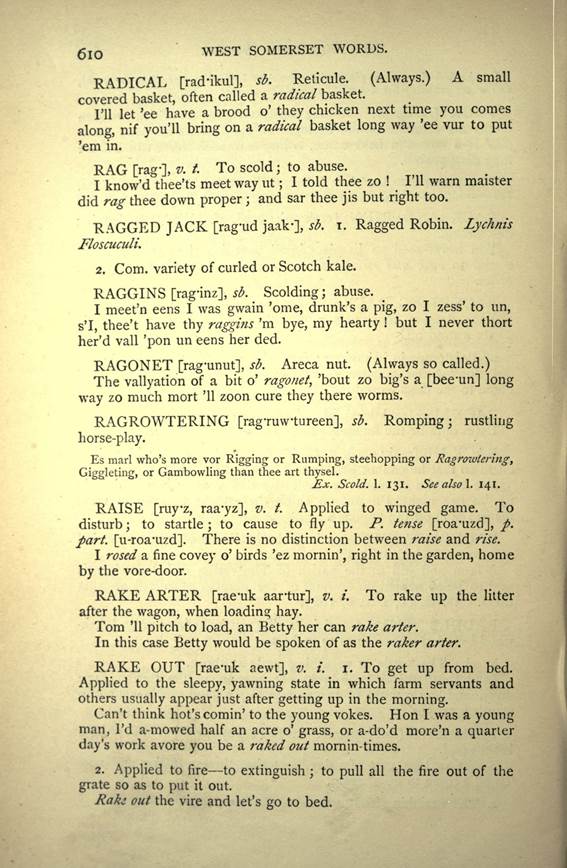
(delwedd B9470) (tudalen 610)
|
WEST
SOMERSET WORDS. 6ll
RAKE UP [rae'uk aup], v. t. i. To cover; to bury.
Come on, rake up the vire, and let's go to bed, /". e. cover the embers with ashes, so that they may keep
alight. Of wood fire, an every-day
saying. Coal fires are generally "raked out."
At Lillington in Dorset is the following epitaph, date 1669:
Reader, you have within this grave
A Cole rakt up in dust. His Courteous Fate
saw it was Late,
And that to Bed He must. Soe all was
swept up to be kept
Alive until the day, The Trump should
blow it up and shew
The Cole but sleeping lay. Then doe
not doubt the Coles not out,
Though it in ashes lyes, That little
sparke now in the Darke
Will like the Phoenyx rise. (Copied by
S. Philip Unwin, Shipley, Yorkshire.)
2. Also to stir up; to poke up; to rouse.
To rake up the fire (depending on tone and context) means to stir it, but in this sense roke up (q. v.)
is more usual. Note difference from
rake out.
RAKING [rae'ukeen], sb. Loose stalks of corn, or litter of hay raked up after the main crop is loaded.
Finished harvest, Mr. White? Ees, all in to a little rakin.
RAKY UP [rae'ukee aup], v. i. and ref. To rouse or bestir oneself.
Come, soce! do 'ee raky up a bit; why thick there job'll take a month o' Zindays like you be gwain on.
and wi' the same tha wut rakee up and gookee. Ex. Scold. 1. 144. Ad, thoa es rakad up, and tuck en be tha
Collar. Ex. Courtship, 1. 355.
RALLY [raal-ee], v. t. i. To scold.
Her wad'n a bad sort of old ummun; but her'd a-got a bit of a tongue like her wid rally the maaidens
mind, nif there was ort amiss, an' no
mistake!
2. sb. Scolding; quarrelling; vituperation.
There was a purty rally betwixt 'em, sure 'nough; they called one tother i. e. one another but everthing.
RAM [raam], v. t. To stuff or press together; to pack carelessly. They on't never ride like that, ^-rammed in
thick farshin, more Vi half o'm '11 be
a spwoiled. Said of packing some apples.
RAMBLE [raarrrl, rarely raanvbl], sb. The branch of a tree when felled. A large tree when cut down is
divided into (i) The butt or stock,
called timber [turn air],
R R 2
|
|
|
|
|
ñ
(delwedd B9471) (tudalen 611)
|
612 WEST SOMERSET WORDS.
(2) The larger branches, cut off into such lengths as are worth sawing into board, called second timber
[sak'un tiinrur].
(3) The crooked limbs, and such as are too large for faggot -wood; called rambles.
(4) The tops of the branches, which are bound up into faggots; these tops are called the wood [eo'd].
(5) The moot or stump, including all the moors or roots.
RAM-CAT [raanr-kyat], sb. A tom-cat. Usual name. Tom is” genteel” talk. In parts of Devon they
say Ram-cat and Day-cat. In W. Somerset it is Ram-cat and Ewe-cat [yoa'kyat].
Already has killed one Ram-cat. 1802.
Peter Pindar, Great Cry and Little Wool, vol. v. p. 185.
RAMES [rae'umz], sb. A skeleton; hence the mere bones, the framework; remains or remnants of
anything. Also, and very generally,
applied to any person or animal unnaturally thin.
Poor old rames, her's most come to a nottomy; there idn fat enough about her vor to graice a gimlet.
Said of a person.
" Reg'lar old rames” is a common description of any lean, half-starved
person or animal. Also the framework of anything when the principal part is gone; as” the rames
of a gate," a very common description
of part of a broken gate.
The shelf was purty high, sure 'nough; there wadn on'y the rames of a goose 'twixt vower o' us.
There's the rames of a wheelbarrow lyin' about; take an' burn out th'ire stuff, Yll do agee-an.
RAMMEL [raanrul], adj. Contraction of raw-milk, applied to cheese made from the best milk, to
distinguish it from skim-milk cheese.
[Wee doa-un maek noa'un bud raam'ul chee'z yuur; voaks dhiit-v u-boa-ut aawur geo'dz wau'ns,
kau-mth ugee'un,] we make none but
raw-milk cheese here; those who have once bought our (dairy) goods corne again.
RAMMISH [raanreesh], adj. Strong in smell; rank; stinking. A ram in hot weather is one of the rankest
of animals.
Thick there dog's 'ouse do smell rammish, sure 'nough, vor all I've a warsh'n an' a-clane un out proper.
And stod vp in his stomak, ]>at stank as )>e deuel; In vche a nok of his nauel, hot nowhere he
fynde} No rest ne recouerer, hot
ramelande myre.
E. Allit. Poems, Patience (Jonah], 11. 274, 278-9.
For al the world thay stynken as a goot;
Her savour is so rammyssch and so hoot, That though a man fro hem a mile be, The savour wol infeste him trusteth me.
Chaucer, Prol of the Chanounes Ycnian, 1. 333.
|
|
|
|
|
ñ
(delwedd B9472) (tudalen 612)
|
WEST
SOMERSET WORDS. 613
RAMPAGEOUS [raanrparjus], adj. Violent; obstreperous; unruly. Applied to persons or animals.
The / has possibly crept in by confusion with ramping, from rampe, to rear, to rage.
Quiet! ya rampageous young son of a bitch!
RAMAGE, or coragyous. Corragiosus, luitosus Promp. Parv.
>er ben bestis pat hau venym, as pe heynde, >e hounde, and pe wolf, and
o>er bestis, pat whenne pei arn
ramagous or joli, here venym gretly noyep, so ]>at oftyn sipes pei makyn men sike. Shane MS.
2584, f. 173, quoted by Way.
Or ellis he is not wise ne sage,
No more than is a gote rainage. Chaucer, Romaunt of the Rose, 1. 5386.
RAMPIN [raanrpeen],/^/. adj. Distracted; overcome; raving. The idea is tearing or pawing like a wild
beast.
I be rampin way the toothache. I 'an't a-had a wink o' zlee-ap ez two nights.
Poor blid, they do zay her's rampin maze, i. e. raving mad, ever sinze he was a-brought home.
For pe saul sese pan about it stande -
Grysly devels agayn it raumpande, A Is
vvode lyons pai sal pan fare And
raiimpe on hym, and skoul, and stare. Pricke of Cons. 11. 2906, 2224.
RAMPSING [raanrseen], adj. Big; awkward; ungainly. [Guurt raam'seen tue* an'dud fuul'ur,]
great awkward two-handed fellow, /'.
e. strong.
RAM'S CLAWS [raanrz tlaa-z], sb. The stalks of the common butter-cup, when overgrown. Ranunculus
acris. In some seasons, especially wet
ones, the butter-cup attains a rank growth, and the cattle refuse to eat it, so that the
meadow, if not mown for hay, becomes
covered with coarse stalks without leaves, but still bearing the yellow flowers on the top these are
called ram's claws. The name is
analogous to bent or bonnet (q. v.) applied to grasses.
It is likely that this may be a corruption of the old word ramsy. The application to another plant does not
at all affect this suggestion, for the
same name is often given to many different species.
RAMZYS, herbe (rammys, K. s. ramsis, H. ramseys, P.). Affodyllus. Pr. Parv.
Ramsons are named of the later practitioners Alliiim sylrestre, or
Beares Garlicke: Alliitm latifolium,
and Moly Hippocraticum: in English, Ramsons,
Ramsies, and Buckrams. Gerard, Herbal, p. 180.
Ramsey an herbe. Palsgrave.
RAMSHACKLE [raam-shaak-1],^'. Rickety; disjointed; out of order; dilapidated.
Call thick a carriage! I calls 'n a riglur ramshackle old shandrydan.
No, I an't a tookt the farm, such a proper ramshackle old house
|
|
|
|
|
ñ
(delwedd B9473) (tudalen 613)
|
6 14 WEST SOMERSET WORDS.
didn plase the missus; but I zaid to her tho, same time, s' I, You know we can't never live by a fine 'ouse.
But there, her zaid her widn never go
there, zo twadn no good, but the place was
well 'nough else.
RANE [rae-un], v. t. i. To cause to crack or split. Nif that there board idn a-put away the zun
'11 rane it all to pieces.
2. Also applied to cloth to overstretch, so as to cause it to become thin, and almost torn.
Thick there board-cloth was wole and sound avore her warsh 'n, now he's craned eens he on't hardly hang
together.
3. v. i. [rae'unee]. To crack; to split.
We've a perch the board in under thick gurt tree, in the [shee-ud] shade like, eens midn rany. T'll drowy
there vast enough, 'cause the wind can
come to it. Said by a sawyer of sawn timber.
Oak's most the wistest tim'er is, vor to rany.
4. sb. [rae-un]. A crack in wood, or a thin overstretched place in a piece of cloth.
RANGE [ran-j], sb. A sieve used for straining liquids and not for sifting dry matter. In cider making,
the juice is strained through a range;
so in cheese making. Many cooking recipes direct, “Strain off through a fine
range" i. e. a hair sieve.
RANGLY [rang'lee], v. i. To twine, or move in a sinuous manner. (Rare.) Rangling plants are such as
entwine round other plants, as hops,
woodbine.
RANTER [ran'tur], sb. An outdoor preacher. The word is distinctly depreciatory.
One o' those yer ranter fullers, hot '11 vind prayers so long's anybody else '11 vind mate n' drink.
RAP [raap], v. t. i. To exchange; to swap (q. v.).
[Aa-1 raap wai'ee, gi mee zik'spuns tu beot,] I will exchange with you, (if you) give me sixpence to boot.
Our Jim told me how Tailder Jones should zay how he'd rap a new suit o' clothes vor two o' they there
little pigs; but Jim zaid he widn rap
way un, 'thout he'd let'n had a new hat 'long way 'em.
2. sb. An exchange.
[Dhai-d u-gau't-n een u raap' vur dree buuirlz u stroa* un u pilch- krauk,] they obtained it in an
exchange for three bundles of straw
and a pitch crock.
Capical good mare her is, mind. I had her in a rap \vi' George Toms vor th' old oss and dree poun'.
3. sb. Applied to land or crops a strip.
|
|
|
|
|
ñ
(delwedd B9474) (tudalen 614)
|
WEST SOMERSET WORDS. 615
What b'ee gwain to put thick rap o' groun' to, where you had the carrots last year?
There's always a covey o' birds in one or tother o' they raps o' mangle and taties.
4. Plot of any shape; piece cut off.
Mus' have a rap o' cloth vor the bum cork, paper idn no good. I've a got a rap o' taties over in Mr.
Hosegood's field, but they baint hardly
a-worth diggin'.
RAPE [rae'up], v. t. To scratch with violence. To scratch implies gentleness, i.e. to gently rub so
as to cause pleasure; hence the
figurative expression, "to scratch his back" (/. e. to wheedle, to butter up), evidently from the
delight given to a dog, cat, or other
animal by that operation.
Hast a-got other bit o' rag in thy pocket? I've &-rape my 'and way a gurt humack, eens he do blid like a
pig.
RAPID [raa-peed], adj. Violent; rough.
I zim I be a little bit better s'mornin, doctor, the pain idn nothin' near so rapid 's 'twas.
Sober! don't 'ee be so rapid way un; neef 'ee don't take care and be tender way un, you'll tear'n all to
pieces. Said of using a
mowing-machine.
RARE [rae-ur], adj. i. Raw; under-done applied to meat.
'Tis a little beet too rare vor my aitin'.
'T'll do nezackly vor me, I likes it rare. Ang.-Sax. hrere, raw.
Rere or nesche, as eggys. Mottis (sorhilis). Promp. Parv.
maces and ginger, rere egges, and poached egges not hard, theyr yolkes
be a cordiall. An. Borde, Breviary of
Health, quoted by Way, P. P. 430.
Reere as an egge is, mol, molle. Palsgrave, p. 322.
2. adj. Excellent in quality; good; prime.
Natlins be rare trade, I be ter'ble fond o'm. Yours is rare cider. That's a rare piece o' wheat. We'd
a-got rare fun, sure 'nough. Thick's a
rare knive to cut.
RASH [raa-sh], adj. and adv. Rough; awkward in handling.
Sober! you be to rash by half, you'll tear the cover o' un all to pieces; he wadn a-made vor to be a-sar'd
(served) so rash. (On opening a box.)
Much the same as RAPID.
RASTY [raas-tee], adj. i. Rancid See RUSTY.
Put barlie to malting, lay flitches a salting.
Through follie too beastlie, much bacon is reastie. Tusser, 2O, v. 2.
2. Choleric; irritable.
Mr. Cole's a good maister to we, but he can be rasty like sometimes, nif he's
a put out.
|
|
|
|
|
ñ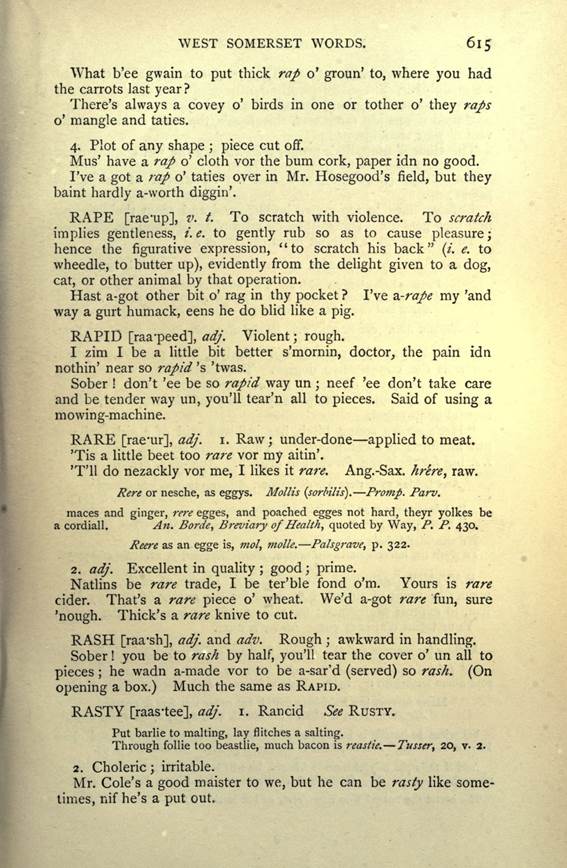
(delwedd B9475) (tudalen 615)
|
616 WEST SOMERSET WORDS.
RAT [raat], v. t.; p. t. [raafud], /. /. [u-raafud]. To cause to rot or decay.
I heard a man say in praise of some good tipple
Darn'd if this idn rare trade, this here's the stuff to rat out the veet o' your stockins.
The vloor o' the tallet's proper ^.-ratted way the wet coming in.
RATCH(Y [raa-ch(ee], v. t. and /. To stretch at waking or getting up.
I always likes to zee young bulliks ratch and ream theirzul well hon they gets up. I warn they be growin'
and getting on.
Th 1 old dog don't bethink to ratchy, do er?
and seofcfcen he gon ramien, and raxlede swi$e. La^amon, 1. 25991.
Benedicite he by-gan with a bolke and hus brest knokede, Rci$cledt~93&. remed ' and routte at
]>e laste. Piers Plow. vm. 6. Roxed
and raxed in other readings. See P. Plow. B. 398.
Northumb. Rax. See BROCKETT. Raxled, E. Allit. Poems, Patience, 1. 1174.
RATHE [rae-udh, rae'uv], adj. Early. The positive, of which rather is the comparative degree. The
expression” we be gwain t'ave a rave
spring de year" is not uncommon. The word also implies in persons or animals precocity of
development, either mental or
physical.
" Her's a rave young bitch, her is," was said of a girl, and
was not intended as a compliment. They
yeffers be rave, sure 'nough, /. e.
big for their age, forward in growth. Ang.-Sax. hrceft.
And holde}? ys do3tere wij? deshonour, & hermyej? hem late & rathe.
Sir Femmbras, 1. 3873.
" O dere cosyn myn, dan Johan," sche sayde, “What ayleth yow so
rathe to arise?" Chaucer, Schipmannes Tale, 1. 98.
Wi' shoulder'd shule an' peckiss, rathe
Ta work the lab'rers starts. Pulman, Rustic Sketches, p. 22. See also p. 56.
RATHER [rae'udhur, rae'uvur], adj. Comp. of rathe. Earlier; sooner in point of time. Not used for the
rather of literary English, to express preference; for this zoonder or leaver
are the words.
Your taties d'always come rather 1 ^ ours.
Rathare (or sonnare, infra}. Pocius. Sonnare, or rathere. Cicius. Pr. Parv.
and Jyf J>at I passe Rather >an sche, it ys my wytt J>at att
spengolS. . . be sold a-non
forth-with; 1417. Stephen Thomas, Fifty Earliest Wills, p. 38.
Many sarsyn} J>an huld hem coye '. >at ra\er wer fers & proute.
Sir Ferumbras, 1. 2286. See also 11. 426, 2331, 2705, 2924, 2958.
but whan ]>e bataile is i-doo, }>an schal he be as he was rafyer, he
and opere kny^tes al i-liche. Trevisa,
Lib. I. cap. xxvi. p. 261. See also Ib. p. 93.
And if thou put a lytel terre in his eye, he will mend the rather (i. e.
quicker,
Fitzherbert, Husbandry. Ed. Skeat, E. D. S. 46/3. Tha cortst tha natted Yoe now-reert, or but
leetle rather. Ex. Scold. 1. 210.
|
|
|
|
|
ñ
(delwedd B9476) (tudalen 616)
|
WEST
SOMERSET WORDS. 617
RATHE-RIPE [raedrruruyp, rae'uv-ruyp], sb. An early kind of apple: yellow codling, with pinkish
streaks. The first pronun., the
commoner of the two, is, I believe, intended for rather-ripe.
A girl who developed into a woman at an early age would be called rathe-ripe by elderly educated
people. See Ex. Scold. p. 148. Th and
v are interchangeable. Fitzherbert (Husbandry, Ed. Skeat, E. D. S. p. 14, 1. 9) spells
nave of a wheel nathe.
RAT'S-BANE [raa'ts-bae'im], sb. Chervil. A common wild umbelliferous plant, in appearance
something like hemlock probably
mistaken for it. Chcerophyllum sylvestre.
RATTLE [raa'tl], sb. and vb. Noise of any kind; chatter. A keeper of my acquaintance always uses this
word.
We shan't never get aneast 'em way all this yur rattle. The birds be all a-urned out way our
rattle.
]>er-fore ]>ei ratellen ]>at it is a3enst charite to tellen opynly here
cursed disceitis & synnes. Wydif t
Works, E. E. T. S. p. 274.
RATTLE-BAG [raaf 1-bag], adj. Wild; harum-scarum; roystering; spendthrift.
Ees, I knows'n, and a purty rattle-bag osbird a is too.
RATTLE-BRAIN [raafl-braa-yn], adj. and sb. Same as RATTLE-BAG.
RATTLER [raaf lur], sb. i. A roysterer; a wild liver. He's a proper rattler, 'ton't be long Vore
he've a-brought gwain hot little the
poor old man lef m.
2. Cant term for a lie.
Nif that idn a rattler tell me!
RATTLE-TRAP [raafl-traap], sb. and adj. i. A makeshift contrivance; a shaky, rickety thing;
shabby; dilapidated.
I baint gwain in thick old rattle-trap, I'd zoonder walk by half.
Purty rattle-trap concarn you've a-stick'd up agin my wall. I baint gwain to put up way that, take my
word vor't, zo there now 1
2. Movables; odds and ends; chattels.
Look sharp'n get your rattle-traps out o' the way.
RATTLING [raafleen], adj. Fast; wild; profligate. He mid do very well in thick farm, nif he
wad'n so rattlin; but there, the
father o' un was jist the same.
RATTY [raaf ee], v. i. To become rotten. For ex. see VINNY.
RANDY [ran -dee], sb. A merry-making; a jollification; a drinking party.
I widn gee much vor none o' these here taytotal clubs. I likes
|
|
|
|
|
ñ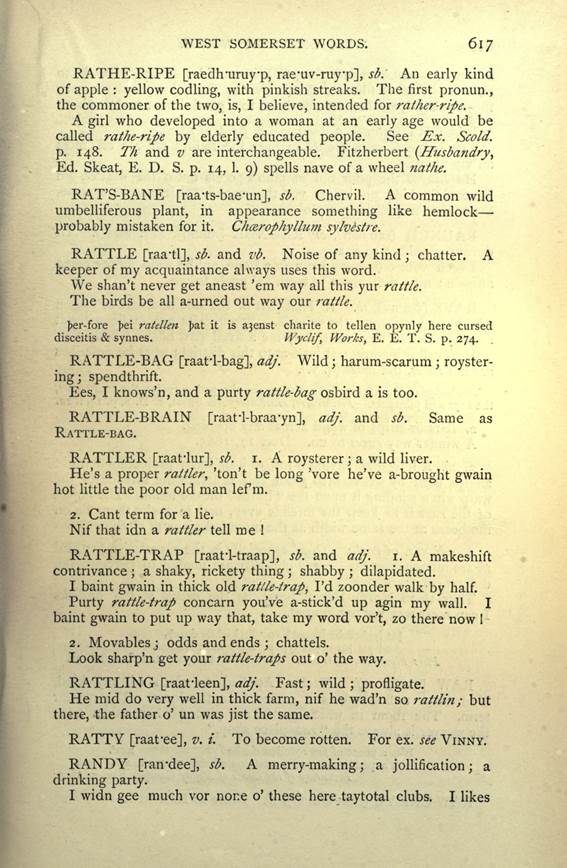
(delwedd B9477) (tudalen 617)
|
618 WEST SOMERSET WORDS.
a beet of a randy once a year, to Wite-suntide. Why, we walks to church spaktable like, an' then we walks
droo the parish so var's the Blackbird,
an then we zits down to a good dinner and drinkins.
RAUGHT [rairut],/. tense ix&p.part. breach.
The bullicks 've Draught in over the railin's an' ate off 'most all my plants.
He raught the poor old 'ummun's goods out o' the winder, gin he could'n bide no longer vor the smoke,
an' 'twas jist a-come, the roof ad'n
a-vall'd in tap o' un.
RAUNCH [rairnsh], or RAUNGE [rairnj], v. t. and L To devour greedily; to gnaw.
I zeed your old dog z-raungin a bone, an' he widn let me come aneas'n; nif a didn show 'is teeth an'
girzle to me.
RAVE [rae'uv], sb. i. That part of the side of a cart or wagon which projects over the wheels. Some carts
are made without raves, but when they
exist, they are a fixed part of the” body."
Halliwell is incorrect, at least as to this district; what he describes are not raves, but lades (q. v.).
The bodye of the wayne of oke, the staues, the nether rathes, the ouer
rathes, the keys and pikstaues.
Fitzherbert, Husbandry, ed. Skeat, E. D. S. p. 14, 1. 22.
2. Bars or strips of wood across any opening.
A winder way raves to un. Dec. 17, 1885.
3. sb. A long bar having a row of iron teeth projecting at right angles, used by weavers to guide and
separate the threads of the warp when
winding it upon the” beam” of the loom. The object of the rave is to keep the threads even,
and to make them lie on the beam at
the same width as the intended piece of cloth.
4. adj. var. of rathe. (Com. especially in the superlative.) v and th are interchangeable; many children are
unable to perceive the difference.
They there North Devon beast be the rawest sort o' bullicks I can meet way vor my ground.
Jjat lyghtliche launce]> vp ' litel while dure]>, And J>at J>at rarest rypej> rote)?
most saunest. Piers Plowman, xm. 222.
See also Ib. vn. 322, X. 148, xvni. 46.
RAW [rair], adj. Tech. Applied to cloth of any kind. Undressed, unfinished, as it comes from the
loom. The regular term. The room in
which goods are placed when taken from
the weaver is always the” raw-piece shop."
It'm a peece of rawe wollen clothe xxx*.
It'm a peddicoate and a wastecoate being a pawne. xx s .
Inventory of the Goods of Henry Gaudy e, Exeter. 1609.
RAW-CREAM [rair-krai-m], sb. Same as RAW-HEAD.
|
|
|
|
|
ñ
(delwedd B9478) (tudalen 618)
|
WEST
SOMERSET WORDS. 619
RAW-HEAD [rair-ard], sb. Natural cream which rises upon the milk and is skimmed off, in distinction
from that produced by scalding. More
common than raw-cream, which latter is the
alternative name in the west wherever the practice of scalding obtains, to distinguish it from
scald-cream. An old doctor prescribed,
"a tumbler-full of raw-head every morning."
RAW-MILK [rau'-mulk], sb. Milk as it comes from the cow; not skimmed. (Always.)
A woman applying to” the Board” for relief for a deserted grandchild said,”
You zee I be forced to buy a pint o' raw-milk a day." Aug. 20, 1885.
RAWNING-KNIFE [rairneen-nuyv], sb. Large knife used by butchers.
RAWNY [rau-nee], v. i. i. To eat greedily and with noise. Bill! cas'n ait thy mait more dacenter'n
that is? why thee's rawny jist the
very same's a gurt pig.
2. Same as RHYNY.
RAY [raa-y], v. t. To deck out; to dress. (Com.) Where be you gwain then s'mornin', all
grayed out so fine?
RAYD, or arayed wythe clothynge, or other thynge of honeste (thynge of clennesse, K. P.). Ornatus. Promp. Parv.
With dyuers stones, precious and riche;
Thus was she rated, yet saugh I never her liche. Chaucer, C. of Love, 1. 818.
That neuere reed good rewle: ne resons boolus! ffor ben \>&y rayed arith: ]>ey
recchith no fforther.
Langland, Rich, the Redeles, III. 119.
RE- [rai 1 -]. The prefix is nearly always accentuated, and pronounced broad,
[^^rsaa'rv], reserve. [^rpai't], repeat. [Rai-tuyur], retire, [^rtrai't,]
retreat, [./farzuyn,] resign, &c. The
vocabulary is very small in these words, and that, coupled with the fact that the speakers feel them to be”
fine” words, causes them always to be
emphasized on both syllables.
READ [hrard], v. t. To estimate truly; to see through; to comprehend; to predict.
Anybody could read 'ee. Why, can zee wet 'pon the face o' un.
[Neef Tau'm doa'im aul'tur-z an* piirtee kwik*, aay kn rai'd ee'z faurteen saa'f unuuf',] if Tom does not
alter his hand (change his course of
life) very shortly, I can surely predict his fortune.
REAM [rai'm], v. t. i. To enlarge a hole in wood or metal. The tapering instrument used for the
purpose is always called a reamer.
They there screws 'ont go vore I've ^-reamed the holes droo the hinges.
|
|
|
|
|
ñ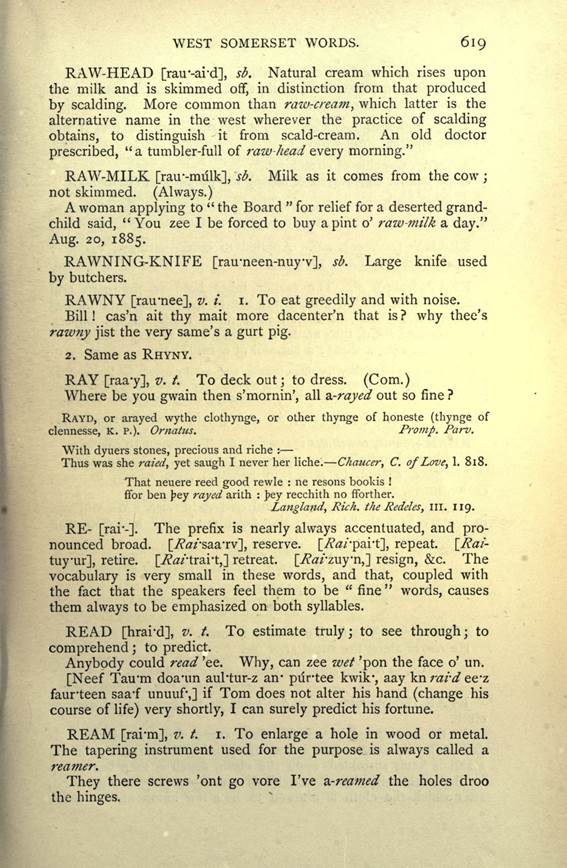
(delwedd B9479) (tudalen 619)
|
620 WEST SOMERSET WORDS.
2. To stretch or draw out any elastic substance.
You can ream that there cloth, t'ont break same's some o' the ratted stuff they sells about.
3. Applied also to cider.” 'Tis ^.-reamed" means that it has become viscous. See ROPY.
4. intr. Capable of stretching.
Good leather to reamy, i. e. having the property of stretching.
5. To stretch oneself on awaking, or on getting up. Same as RATCHY (q. v.). See also illus. under
RATCHY.
REAMY [rai'mee], adj. Applied to cider stringy; viscous; like oil. Same as ROPY (q. v.}.
REAP [rai'p], sb. The reaper takes hold of the corn and gathers it with his left arm, giving two or
more cuts until he has enough for a
sheaf; he then lays it down ready for the binder. The unbound sheaf, thus made, is called a
reap or reap d corn.
Ang.-Sax. ripe, a sheaf; a handful of corn.
and in some places they lay them (beanes and pees) on repes, and whan
they be dry they laye them to-gether
on heapes, lyke hey-cockes, and neuer bynde
them. Fitzherbert, Husbandry, Ed. Skeat, E. D. S. 29-4.
REAP-HOOK [ree-p-eok], sb. A large sickle used for reaping.
REAR [ree-ur, sometimes rae'ur], v. t. To rouse; to disturb. Her begind to holler, her reared all the
house. Sep. 19, 1880. Ang.-Sax.
hreran, to raise; to agitate. Also rderan, to raise, excite, move, advance.
Cotgrave has, to rere, eslever, and eslever, to raise. We still say, in literary English,” to raise the
neighbourhood," and” to rtar a
monument."
For woman is a feble wight
To rere a warre against a knight. Chaucer 's Dream, 1. 469.
penne J> e rebaudej so ronk rerd such a noyse, at a}ly hurled in his ere} her harlote}
speche;
Early Alliterative Poems, Cleanness, 1. 873.
REAR [ree-ur], v. i. To mock; to hoot.
He reared along the street after me.
Go, ya rearing, snapping, tedious, cutted Snibblenose.
Ex. Scold. 1. 106. See also \. 313.
REAR UP [ree-ur aup], v. t. Tech. in the finishing of woollen cloth.
In the raw state, /. e. as the cloth comes from the loom, it is full of the oil used in the process of
spinning the yarns. A strong alkali is
freely sprinkled upon the cloth, which is then beaten up in the mill until the oil and alkali are
thoroughly amalgamated, after which
the cloth is allowed to lie a few hours until a slight
|
|
|
|
|
ñ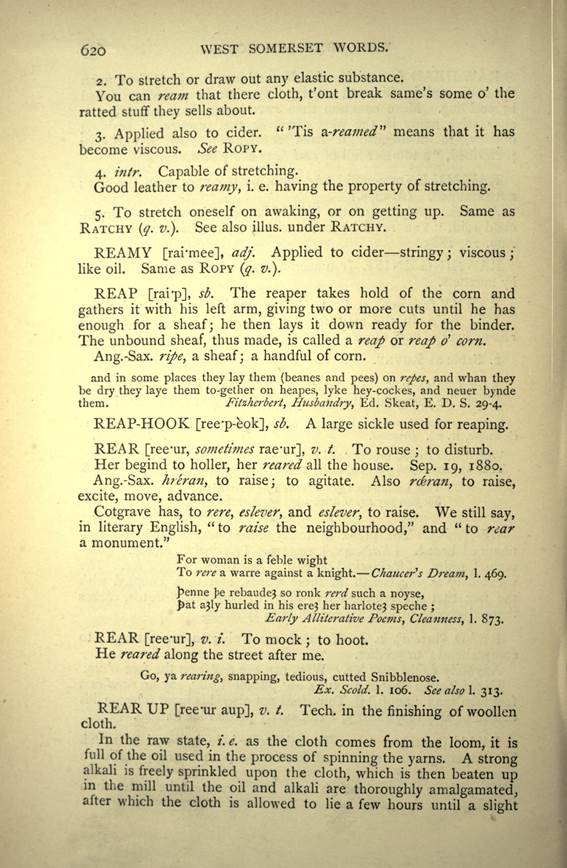
(delwedd B9480) (tudalen 620)
|
WEST SOMERSET WORDS. 621
fermentation commences; then it is washed in a machine with clean water, and the cloth is thus cleansed
from the grease. The process up to the
time of washing is called rearing up.
RECKLIN [raek-leen], sb. Reckoning; bill; account. Compare chimley, chimney.
Here, missus! what's the recklin?
RECKON [raek-n], v. i. To believe; to think; to consider. I reckm taties '11 be [maa-yn skee-us]
maain scarce de year.
RECKON UP [raek-n aup], v. t. To appraise; to estimate at its true value.
Didn take long vor to reckon 'ee up, nobody idn never gwain not vor to be a-tookt in way puttin 'ee
down vor a gen'lman.
REDDING [hrid'een more commonly uurd'een], sb. Red ochre or ruddle used to daub over sheep and
common cheeses. (Ruddle or raddle are
unknown in this sense.)
REDE. See WREDE.
RED-LANE [huurd-lae'un], sb. The throat.
Purty near all [ee'z] his wages goes down the herd-lane, there
idn much a-lef vor her an' the
chillern.
RED-RAG [huurd-rag-], sb. The tongue.
Her idn much amiss, nif could on'y stop thick there herd rag.
RED-TAIL [huurd-taa'yul], more commonly [lae'udee huurd-taa-yul], sb. The
redstart. Phcenicura ruticilla.
RED-WATER [huurd-wairdr, hiird-watrdr], sb. A disease common among cattle, especially when kept
on poor moorland.
REED [hree'd], sb. Wheaten straw combed and straightened for thatching.
A good lot of reed for sale. Apply, &c. Advertisement, Wellington
Weekly News, Aug. 20, 1885. See Tusser,
51/5 SHUT 9.
And in Sommerset shire, about Zelcestre and Martok, they doo shere theyr wheate very lowe, and all the wheate-strawe
that they pourpose to make thacke of,
they do not thresshe it, but cutte of the eares, and bynde it in sheues, and
call it rede: and therwith they thacke
their houses.
Fitzherbert, Husbandry, Ed. Skeat, E. D. S. 27, 1. 21.
It is no longer the custom to cut off the ears.
Reeds (in the pi.) would be those growing in swamps or water.
REED MAKER [hree'd maek'ur], sb. A machine driven by power for straightening and preparing wheat
straw for thatching, by combing out
short and bruised stalks.
Root pulper, turnip cutter, sheep troughs, pigs troughs, reed maker, c.
Advert, of Farm Salt, Wellington I Veekly News, Oct. 15, 1885.
|
|
|
|
|
ñ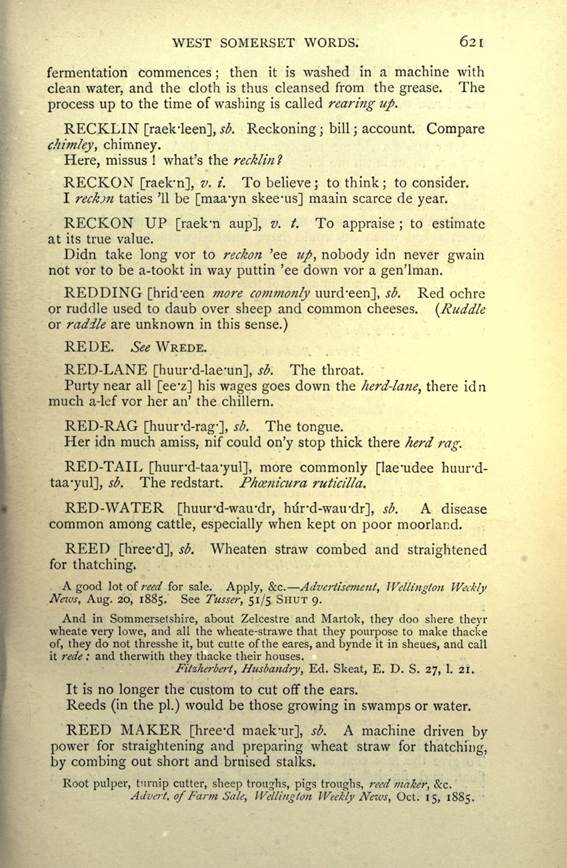
(delwedd B9481) (tudalen 621)
|
622 WEST SOMERSET WORDS.
REED-MOTE [hree'd-moa'ut], sb. A single stalk of wheat straw. The” straws” served with squashes
and slings would be called reed-moles
by us.
REFUSE [rai-fue-z], sb. Refusal; option; pre-emption. Arter you'd a gid me the refuse o' un, I
did'n think you'd part way un, 'thout
lattin me know'd it.
REIVE [ruyv], v. t. To sift seed or grain, through a particular sieve in winnowing.
" I an't Si-reived a good much o' it, not eet," a man said to
me, when asked when he would have
finished winnowing a quantity of
clover seed.
Halliwell spells this reeve, but such a word is unknown in the west. It appears thus in some of the
Northern Glossaries.
This must surely be the same as the old word rive, to deprive; take away from; to rake out; also to divide
or separate, from which we get the sb.
rift.
RYVE. Rastmm. Promp. Parv.
Icham for wowyng al forwake
Wery so water in wore;
Lest eny rene me my make,
Ychabbe y-3yrned Jore. Sp. Lyric Poetry (Morris), A. 34.
And thorwgh the body, gan hym for to ryve;
And thus the worthy knyght was brought of lyve. Chaucer, Tr. 6 Cr. 1. 1573.
Als lyons, libardes and wolwes kene,
]>at wald worow men byly ve,
And rogg ]>am in sender and ryve; Hampole, Pr. of Cons. 1. 1228.
REIVING-ZIEVE [ruyveen-zee'v], sb. A peculiar sieve used in winnowing.
Can take out all th' eaver out o' it way the reiving-zievt. See Trans. Devon Association, 1881, vol.
xm. p. 93.
REMLET [ninrlut-, sometimes ninvlunt], sb. A remnant; remainder. (Very com.)
Her ax me nif I could take all the remlet, zo I zaid I wid nif her'd bate drippence a yard.
Remelawnt (remenaunt, residuum, F.). Residuus, reliquus. Promp. Parv.
Byt not on thy brede, and lay hyt doun,
That is no curtesye to vse in town;
But breke as mych as JJQU wylle etc,
The remelant to pore >ou shalle lete Boke of Curtasye, 1. 51.
RENDER [rai'ndur], v. t. Tech. among plasterers and architects. To give the first coat of mortar to a wall
or ceiling. To” render, float, and
finish," in some material stated, is constantly seen in builders' specifications.
|
|
|
|
|
ñ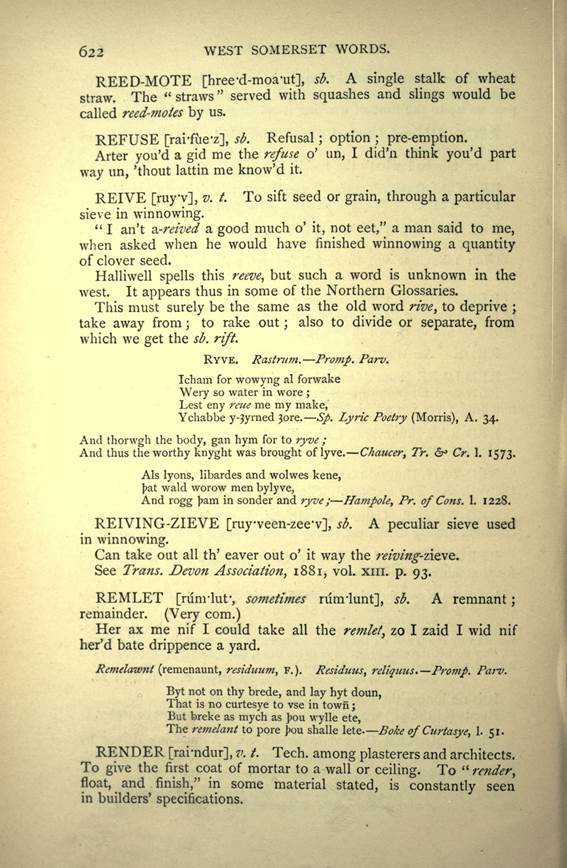
(delwedd B9482) (tudalen 622)
|
WEST
SOMERSET WORDS. 623
RENE [hree'n], v. t. To strip off bark; to rind. I zee the deer bin here again; zee how
they've &-rened the young trees.
RENT PAYING [rarnt paa-yeen], adj. Profitable. Such as will so increase in value as to provide for
the rent. This is a very favourite
expression \ also that of describing animals as rent-payers. Both are
constantly used by auctioneers.
They can now with the greatest confidence commend the above as rent-paying animals, and having in them some of the
best strains of the Volis, Dodhill, and
Norton flocks. Adv. of Flock Sale, Wellington Weekly Nevus, Oct. 15,
1885.
RERE MOUSE [rae'ur maewz], sb. A bat. Less common than flitter-mouse. Ang.-Sax. hrere-mus^ a
bat.
uespertilio, reremowse. Wrighfs Vocab. 625/9.
And not to rewle as reremys: and rest on >e daies,
And spende of ]>e spicerie: more J>an it nedid. Lang. Rich, the Red.
in. 272.
REVEAL [rai'vae'ul], sb. Tech. in building. The space which any framework, as of a door or window, is
kept back from the front or face line.
The walls be that thin, the winders be a-foc'd to be a-keept out flush, idn no {rai'vae'ul} 't all.
Set back the frame eens mid show a vower'n half reveal.
REVEL [hraevl], sb. Nearly every village has its annual revel a kind of feast, which is evidently the
survival of the festival held on the
day of the patron saint, and of the sports and pastimes of the olden time. In most cases” Revel
Sunday” is that which follows or is
nearest to the anniversary of the saint to whom the church is dedicated, and doubtless once
this was so always, but many village
churches have been rebuilt and re-dedicated, while the date of the revel remains unchanged. At
this time it is still usual to keep up
the annual festivity; children and servants go home to visit parents. Wrestling and
cudgel-playing used to take place in
many villages; in some, bull-baiting, cock-fighting, and similar amusements; but in all cases
drinking was and is the chief
attraction. Hence revel and reveller have acquired a depreciatory meaning.
Ther-for ich rede $ow riche: reticles when 3e maken
For to solace Jour soules: suche mynstrales to haue; P. Plow. viil. 1 02.
REW [rue-], sb. i. The row or ridge in which grass falls when cut with a scythe. Also when gathered up
into a ridge in the process of
hay-making.
2. v. tr. To rew up the hay is to collect it into large ridges ready to be loaded on the wagon. Previous
to this it has often to be gathered
into small ridges and then scattered again.” Take; n rew it up in single strik rews," means
that each haymaker is to
|
|
|
|
|
ñ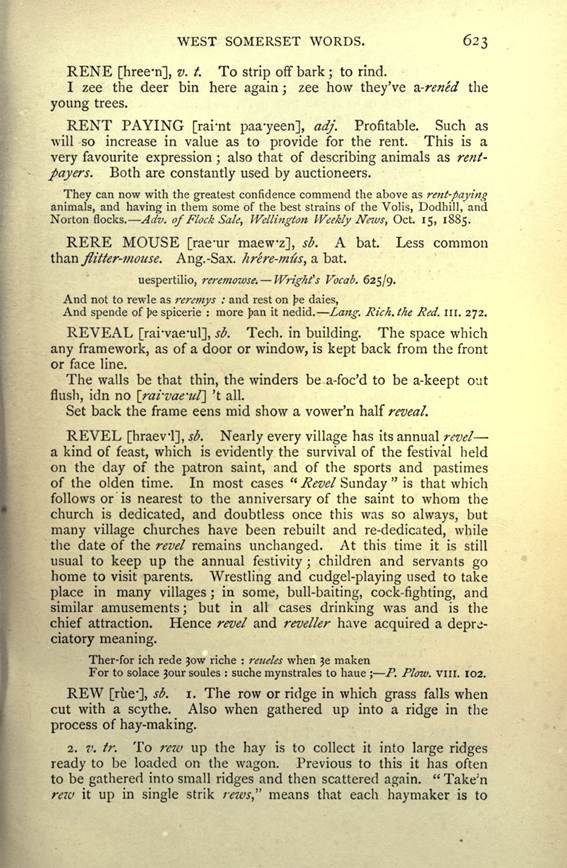
(delwedd B9483) (tudalen 623)
|
624 WEST SOMERSET WORDS.
gather into a row just so much hay as he can draw in with one pull or movement of his rake. To rew up
into” double-strik rews” is for each
person to make two pulls, and thus cover double the space, making a row twice the size.
& many a scheld was J>ar y-cleued f & many a man was to-hewe;
Of legges & armes honde & heued '. sone J>an lay ful ]?e rewe. Sir
Per. 1. 3025.
And f>orw a candel, clomyng: in a corsed place,
Fel a-doun, and for-brende: for]) al ]>e reive. Piers Plow. iv. 106.
REX-BUSH [raak-s-beo-sh], sb. A clump of rushes. (Always.) A very old saying is:” The Barle and the
Exe do both urn
out o' the same rex-bush." The meaning is that the two rivers with
such different courses rise very close together.
Rex-bush! Fath! tell me o' tha Rex-bush, ye teeheeing Pixy! Ex. Sc. \. 129.
REXEN [raak-sn, vraak'sn], sb. Rushes. One of the very few words which retain the en plural; even this
is now becoming “improved” into rtxens. Comp. lit. chickens.
Of an undrained field it is usual to hear, "he's all a-urned to rexens.”
Can put up a little mow and thatch 'n way rexen. See HURSH.
RHINE [hree-n], sb. In the fen or moor district of Somerset, extending west nearly as far as Taunton,
the wide open drains are all written
rhine and pronounced ree'n. See Macaulay's account of the Battle of Sedge Moor.
RHINY [hruynee], adj. i. Thin; lean; hungry-looking. Jennings and Williams spell this rawny.
Fat her! a rhiny old thing, her've a-zeed too many Zindays, I b'lieve; I count mid so well try to fat a
yurdle. Said of a cow.
2. Miserly; near; close-fisted; too stingy to be clean. Proper rhiny old fuller, 'tis a waeth
aiteenpence to get a shillin out o'
ee.
The slouen and the careles man, the roinish nothing nice,
To lodge in chamber comely deckt, are seldom suffred twice. Tusser, 102, v.
I.
RIBBIN [nib-een], sb. Riband. (Always.)
Who would not rather suffer whipping,
Than swallow toasts of bits otribbin? Hudibras, II. c. i. 1. 858.
RID. Riddance. See HIRD.
RIDDLE [hriid-1, hiir-dl], v. t. and sb. To sift; a sieve. T'on't take 'boo vive minutes vor to hirdle
down they arshes.
RIDE [ruyd], v. i. i. To be angry; to be enraged.
A surly old man whom boys delighted to tease, complained to me and said, [Dhu jaa'kaas toa'udz du
uuiree due- ut vur tu maek mee ruyd,]
the jackass toads only do it to make me enraged. March 30, 1878. (Very com.)
|
|
|
|
|
ñ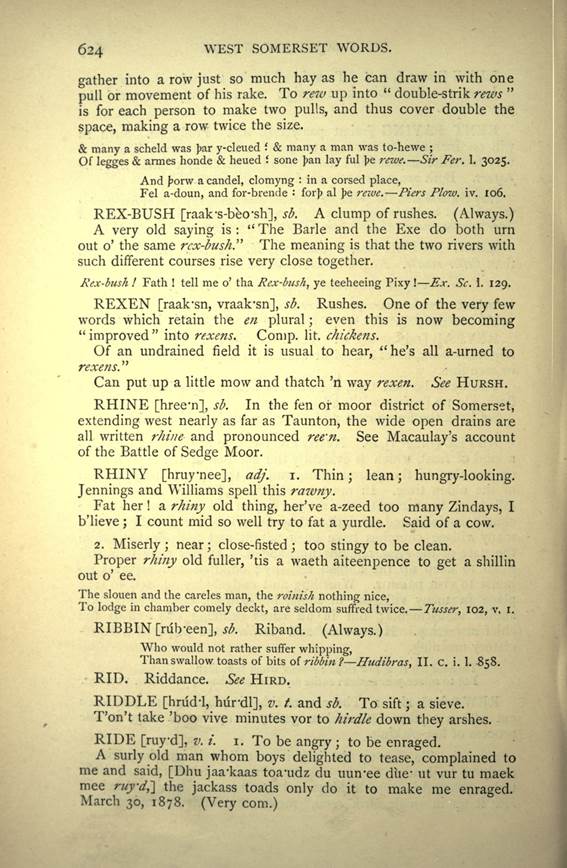
(delwedd B9484) (tudalen 624)
|
WEST SOMERSET WORDS. 625
[Doa-n tak muuch tu mak ee' ruyd,~\ it does not take much to make him rave and storm. April 14, 1878.
2. To journey in a carriage of any sort; to proceed.
You can jump in the train and ride so var's Norton, and tidn not more 'n a mild therevrom.
The Athenczum, Nov. 28, 1885, p. 699, calls "riding in a gig" an Americanism. No other phrase would be
used by a Somerset native.
And ryde forth by ricchesse: ac rest bow naujt j>erinne,
For if ]>ow couplest J>e ])er-with: to clergye comestow neuere.
Piers Plowman, B. x. 158. I'll hang
you both, you rascals! I can but ride
....
And you for the bacon you took on the highway, From the poor market woman, as she rode
from Rom ford.
Massinger, City Madam, III. i.
And he made him to ride in the second chariot. Genesis , xli. 43.
3. To go, or to be carried safely in any vehicle.
Thick load on't never ride home; he'll turn over 'vore he've a rode half way.
The landlord of an inn said of a plant he had placed on the carriage,” He'll ride there, miss,"
meaning it will go safely.
4. To climb. Implies going where the climber is either trespassing, making mischief, or rudely and
improperly climbing.
They there factory maidens be always ridin' up 'pon thick there hedge arter the two or dree flowers. They
be always ridirt about arter vokeses
flowers.
Come down there, you boys! What! can't make merschy 'nough else, 'thout ridin* all over the roof o'
thick there linhay?
No odds how firm they be, they rails '11 zoon be a-tord down: pass honever anybody will, sure to zee a
passle o' women a.-rid/n' up 'pon 'em.
See HAG-RIDED, PIXY-RIDED.
5. sb. A green path through a wood; a lane cut through underwood or furze.
Shan't never do nort way the rabbits here nif there idn some rides a-cut.
RIDE AND TIE [ruyd-n-tuy], v. i. When two people have but one beast, and take turns to ride, they
are sa: d to ride and tie.
The same form is used in work and tie, and in other operations in which tie seems to imply taking a turn
or spell.
RIDERS [ruydurz], sb. Circus performers; a circus company. The riders be comin' next wick. (Always.)
RIDGE AND FURROW [lirj-n voa-r]. When addressing the quality [urj-n vuurtt]. Applied to land
when left in regular ridges
s s
|
|
|
|
|
ñ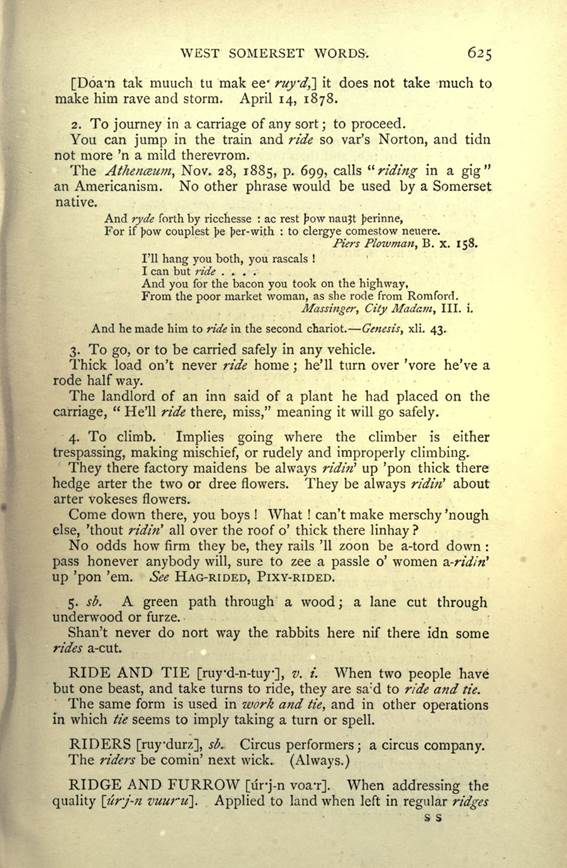
(delwedd B9485) (tudalen 625)
|
WEST SOMERSET WORDS.
divided by furrows. The object is to assist the surface drainage. See ALL-VORE.
RIG [rig], sb. i. A game; a lark; a practical joke.
They'd a-got a purty rig way th' old 'ummun's things; they turned over her warshin tub, and then they pushed
down the butt o' bees way a long
stick; nobody could'n g'in the garden vor two or dree days, the young osbirds.
2. sb. An imperfectly castrated horse. (Very com.)
3. Term for a woman implying wantonness.
Proper rig her is, an' no mistake.
RIG [rig], v. t. i. To dress; to deck out. Same as RAY. My eyes! id'n her &-rigd out then?
2. To rig up is to make ready; to put together. Tidn no gain way those here machines vor
little farms, takes so long vor to rig
em up as do vor to do the work arterwards.
RIGGLE [rig'l], sb. A groove cut round some article, as a notch cut round a stick, to make a lash
hold on better. The groove on a pulley
is a riggle. For ill us. see W. S. Gram. p. 98.
RIGGLETIN [rig'lteen], adj. Wanton; lewd. (Com.)
I bain't noways a frightened to hear o' it; I never didn look vor
nort else, her was always one o' they there riggletin sort, and th'
old umman wadn never no better.
A wud ha had a coad, riggelting, parbreaking, piping body in tha!
Ex. Scold. 1. 147.
RIGGY [rig'ee], v. i. To romp in a lewd manner; to act the wanton.
Her was one o' they there good-tempered ones, hon I know'd her, fit to riggy way anybody that corned
along.
But thee, thee wut steehoppee, and colty, and hobby, and riggy wi' enny kesson Zoul. Ex. Scold. 1. 296. See also
Ib. \. 265.
RIGHT [rait], sb. Often used in a curiously personal sense. [Neef uun-ee rai'tud u-gau't liz war, uur
wud'n bee u-saard zoa,] if only right
had got his way, she would not be so ill treated.
RIGHT-HAND-SIDE [rai't-an-zuyd], sb. The right side. Right and left, when used to indicate
position, take hand in connection with
them.
When you come to the vower cross way, turn round 'pon your right hand, and keep on gin you come to a
lake o' water 'pon your
left-hand-side.
The right hand-side of his head was ter'ble cut about.
The right-hand-side of your foot.
|
|
|
|
|
ñ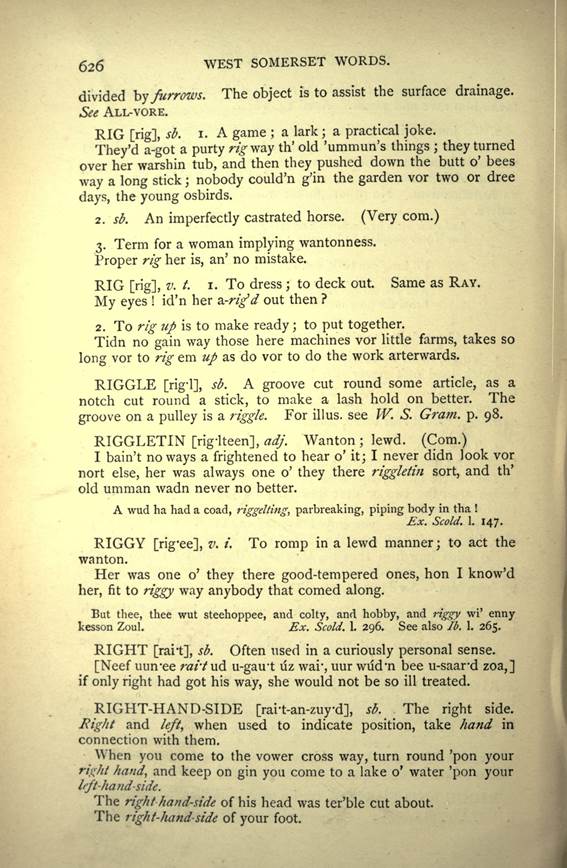
(delwedd B9486) (tudalen 626)
|
WEST SOMERSET WORDS. 627
RIGHT-HAND SULL [rai't-an zoo'ul], sb. A plough made to turn the sod to the right of the
ploughman. This is the ordinary kind,
most in use.
RIGHT OUT [ruyt aewt, rai't aewt], adv. Completely; entirely; absolutely and finally. Also in a
bold, straightforward manner, without
mincing matters; outright. (Very common.)
He ax me vor to let'n had th 'oss 'pon trial; but I zaid I'd warn un (warrant him) sound and quiet nif he'd
buy un right ouf, but I widn part way
un no other ways.
'Twas a proper nasty trick, and zo I told'n to his face, right out.
RIGHTS [rai-ts, ruyts], sb. pi Stag hunting. The points or projections growing from the side of both
horns of a stag, by which up to six or
seven years old his exact age can be determined.
Doubtless this term is derived from the fact that after four years a perfect deer should by right have the
bow, bay and tray to which the name
rights applies; it does not apply to the "points on top." See UPRIGHT, WARRANTABLE, POINTS.
John. And a hart of ten
I trow he be, madam, or blame your men;
And standing 'fore the dogs; he bears a head
Large and well beam'd, with all rights summ'd and spread. Ben Jonson, Sad Shepherd, I. ii.
Though a good bodied deer, he had only the rights of a four-year-old deer.
Records of North Devon Staghounds, p. 62.
He had all his rights, with seven on top of one horn, and six on the other.
Collyns, p. 196.
Before a crowd of sportsmen, tourists, fishermen, and seaside loungers, a
fine stag, having all his rights, is
killed on the beach by the huntsman, and the first blood of the season is obtained. Wellington
Weekly News, Aug. 19, 1886.
In the Wellington Weekly News, Sept. 29, 1887, is an account of the death of two stags on the same day.
One had all his rights.
He was killed just above Marsh Bridge early in the afternoon, a good
stag with all his rights and two upon
top. The other had not. A fine old stag,
having four on top on each side, but lacking his bay points.
RIGHTSHIP [rai-tshup], sb. Justice; truth; dependence. Nif was any rightship in it, poor vokes
widn ha to work s'hard, and they widn
be so bad off nother. (Very com.)
RIN [hrhv, not quite hnirr], var. pron. Run. Very com. with individual speakers, specially in
Devonshire; some say ren' or hren\
A farmer of Culmstock and many others always use this form.
The water rinth away to waste. I can't abear no such rin, to the back door.
Ang.-Sax. rinnan, irnan, yrnan, eornan, O. L. Germ., O. H. Germ., Goth. rinnan, O. Fris. O. Icel. rinna, retina, O.
Dutch rinnen, rennen, runnen (riii,
ren, urn), currere. Stratmann.
S S 2
|
|
|
|
|
ñ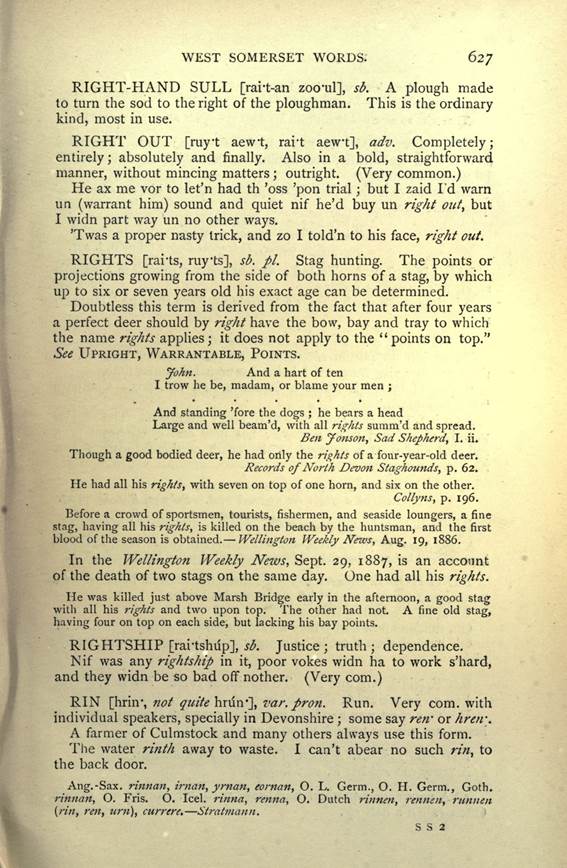
(delwedd B9487) (tudalen 627)
|
628 WEST SOMERSET WORDS.
For a best, when it es born, may ga
Als tite aftir, and ryn to and fra; Hampole, Pr. of Cons. 1. 470.
That who so euer wolde rin with his dowter. Gesta Rom. pp. 122, 133.
RINE [hruyn], sb. and v. t. Bark of a tree; rind. The word bark is used technically, and applies to
that stripped from oak to be used for
tanning.
The cows Ve z-rin'd they there apple trees, eens idn no rim a-lef 'pon some o'm.
And |>o sche caste in rynde and rote,
And sed and flour, ]>at was for bote.
Gower, Tale of the Cojfers (Morris), 1. 297.
RING [ring-], v. t. To put a wire or other "jewel” in a swine's snout to prevent its rooting.
'Tis time thick varth o' pigs was &-ringd, I zee they be 'ginnin to rooty.
RING [ring], sb. Of bells, the entire set or peal.
There idn no purtier ring o' bells no place 'n what ours be. I rings number vive now, vor I baint the man
I was one time.
" Ring of bells” is rather a favourite sign for inns. Compare "Cry of hounds."
As a v. t. rang and rung were until lately unknown. The regular p. t. is ring"d and p. p.
it-ring" d; but now one often hears p. t. ruung'd, and p. p. u-ruung'd, as the effect
of the Education Act. See
INTRODUCTION.
When bells da ring the'r even in peal,
Bells oft a-ringd ver woe and weal. Pulman, Rus. Sk. p. 27.
RING-BONE [ring-boa *un], sb. A com. disease in horses' feet.
A ryng-bone is an yll soraunce, and appereth before on the foote, aboue
the houe, as well before as behynde.
Fitzherberts Husbandry, Ed. Skeat, 98, I .
RING-HOME [ring-oa-m]. To ring the church bells when a parishioner (who can pay) brings home his
bride.
What be the bells gwain vor?
Oh, don'ee know? why they be ringing-home the young Mr
Oh brave! then there'll be a purty drunk's nest way em umbye night.
RICK [rik-], v. t. and sb. To sprain, or twist.? Wrick. I've di-rick me ankle shockin' bad.
Her've a-meet way a rick in her back, eens her [kaa'n] can't bow herzel, no, nit vor to pick up so much as a
pin.
RIP [nip], sb. i. A term of reproach for a woman. A purty old rip her is, sure 'nough.
2. A very coarse-toothed hand-saw, used for sawing soft woods. Often called a half->.
|
|
|
|
|
ñ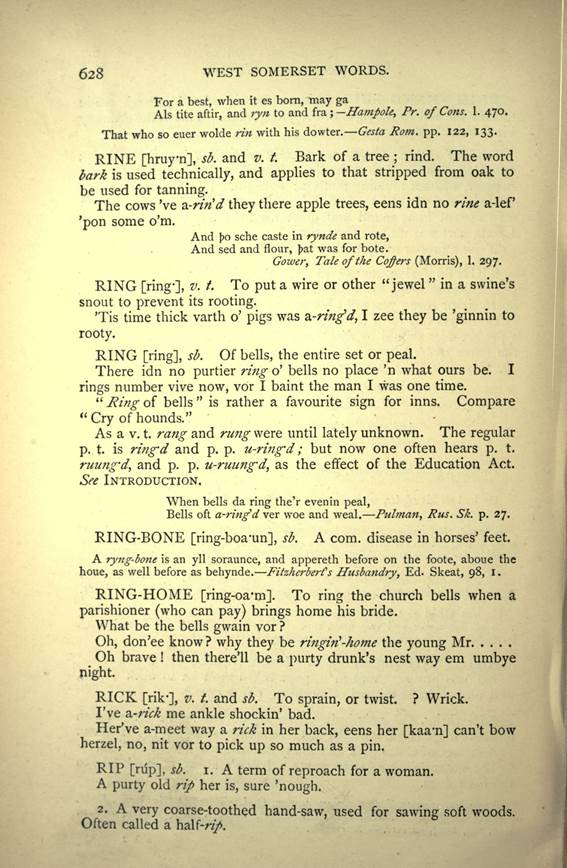
(delwedd B9488) (tudalen 628)
|
WEST SOMERSET WORDS. 629
3. v. t. To saw in the direction of the grain of the wood. Tak'n rip down thick there board dree inches
in.
RIPPING [rup-een], sb. The act of stripping the bark from oak for tanning.
[Aay-v u-bim* aewt t-Oa'kum, rup'een, moo'ur-n uz vaurfneet], I've been out to Holcombe, ripping, more
than this fortnight.
RIPPING-TIME [rup-een-tuym], sb. The time when the oak sap has risen, so that the bark can be
ripped or peeled off easily.
[Aay muyn twuz jis* ubaewt rup'een-tuym,~] I remember it was just about ripping-time. Com. term for
spring.
RISE [ruyz], v. i. To ferment; to leaven.
We zits the sponge (g. v.) eight or nine o'clock o' night, and then we lets it bide to rise gin vive or zix in
the mornin', 'cordin' to the weather
and that; and then zoon's the rest o' the batch is ready we takes the sponge and breaks it all down
together. Oct 12, 1885.
RISE [ruyz], v. t. To raise.
I should like to do it, oncommon, nif on'y I could rise the money. Raise is unknown.
RISEMENT [ruyzmunt], sb. Advance in price.
They've a-ros'd the bread in to Taa'nun (Taunton), but there 'ant a-bin no risement yer, not 'eet.
RISH [rish], sb. Com. pron. of rush, though not so general as rex, rexen. Comp. drish = thrush, vlish
= flush.
Ang.-Sax. risce, rixe.
RYSCHE or rusche. Cerpus,juncus. Promp. Parv.
To be cursed in consistorie: she counteth nou3te a rise he (resshe C.;
reisshe A.). Piers Plowman, B. in.
141.
The stalk was as rish right, And
theron stode the knoppe upright: Chaucer, Rom. of the Rose, 1. 1701.
Kyng Richard garte al the Ynglys
Schere rysches in the marys,
To fyll the dykes of Daroun. Rich. C. de Lion, 1. 6037.
ROAD [roa'ud, rau-ud]. The/^r. "to go to road? or” to turn to road? represents a very common practice
among small owners, viz. to let out
donkeys or cattle to browse on the roadside.
Unfortunately the habit does not stop there, but is frequently followed by opening the gate of a
neighbour's field after night-fall.
ROAR [roa'ur], sb. Uproar; disturbance; row.
A farmer after exclaiming against free trade, said,” But there, we should have a purty roar sure 'nough, nif they
was vor t' aim to put any tax 'pon
corn or eet fat stock." Aug. i, 1887.
Ang.-Sax. krdr (?), O. L. Germ, hrdra, O. H. Germ, rttora. Stratmann.
|
|
|
|
|
ñ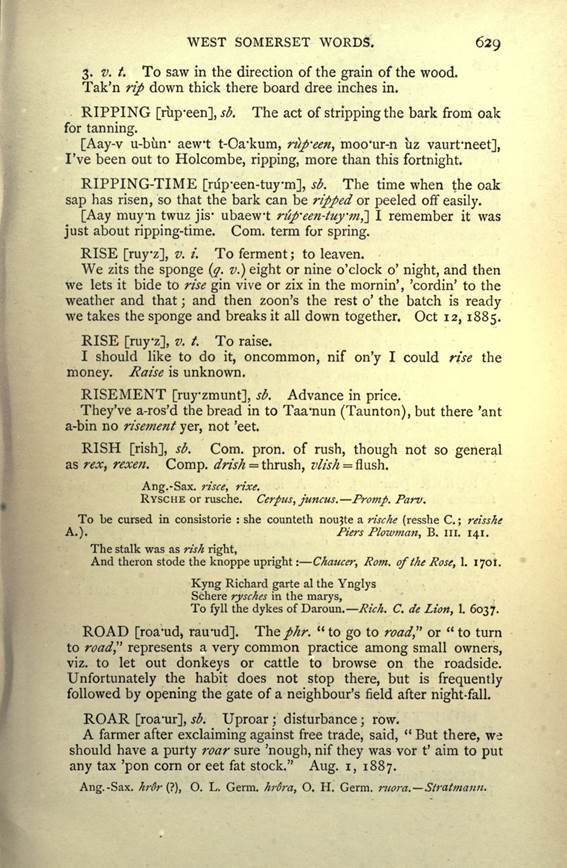
(delwedd B9489) (tudalen 629)
|
630 WEST SOMERSET WORDS.
RORE, or truble amonge ]>e puple. Tumultus, commotio, disttirbiwn. Pr. l!
arv.
Rom, trouble trouble. Palsgrave.
All the world was full of fere and in a roare. Herman^ quoted by Way, P- P., P- 436.
ROBIN HOOD [rab-een eo'd], sb. The campion Lychnis diurna. The usual name for this commonest
of flowers.
In the Seventh Report of the Devon Association, 1884, vol. xvi. p. 112, a woman is said to have called this
Robin Wood. It is possible this woman
may have been to school and learnt that 'ood is spelt with a w, and so have taken care to display
her knowledge. Such a case is quite
common, and in that of fay-run (q. v.) has become the accepted form.
ROD [hraud-], p. tense and /. part, of ride. Very common pron., especially in the Hill district of
W. S. among farmers.
Mr. Taap's son've &-rod over to zay how the hounds be ccmin' tomarra.
fforth J>an rod he stoutely i wel i-armed oppon his stede,
ys herte was god & sykerly f serued him to do }>at dede: Sir Fer. 1.
254.
And rod forth to reson: and rouned in hus ere, Than reson rod forth: and tok reward of no
man.
Piers Plowman^ V. 11. 14, 40. See also Ib. XXIII. 181.
ROGUES-AGREED [roa-gz-ugree-d], sb. Confederates. They purtend avore the jistices how they
'adn never a-zeed wan t'other avore,
but lor! anybody could zee they was rogues-agreed.
ROKER [roa'kur], sb. A long-hooked iron, used to stoke furnace fires.
ROKE(Y [roa-k(ee], v. t. and /. To stir; to rake; to poke.
I never zeed eens the cow was bad, gin I come to roke her up, and than I zeed her could'n muv.
Roktwp the vire, I zim 'tis cold like.
Take'n rokey in under the moot, th' otter 'ont never start like that there.
ROLLY [raul-ee], sb. A crowd or gathering. The use of this word implies contempt.
Who was there? well, 'twas a middlin' roily o'm, I 'ant a zeed no jish rough lot's longful time.
There was a purty roily o' vokes, sure 'nough. July 10, 1887.
ROMPSTAL [ruunrsl], sb. A term of reproach for a woman. It means much more than "rude
girl," it implies wantonness in
the worst sense. See Exmoor Scold. 1. 146.
RONK [raung-k], adj. Rank. The sb. rank is pronounced as lit. Kng. In very common use in several
senses, mostly technical.
|
|
|
|
|
ñ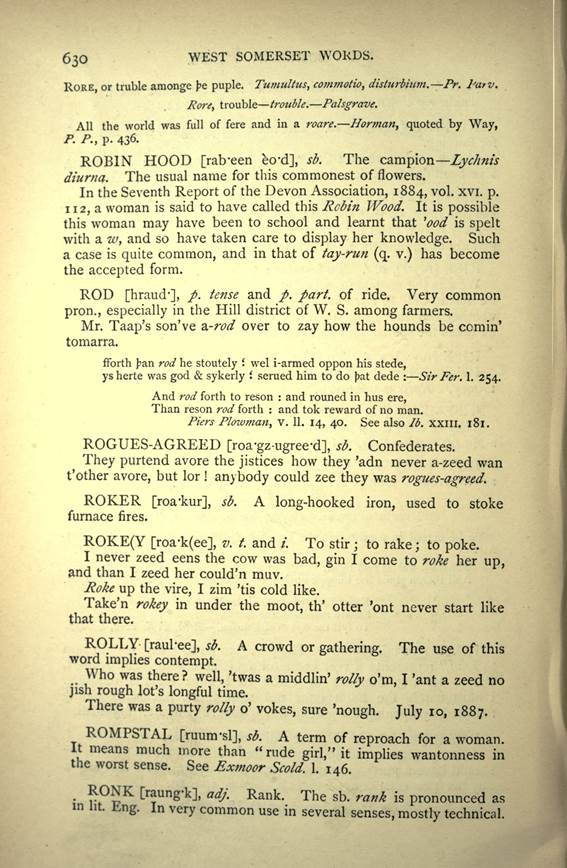
(delwedd B9490) (tudalen 630)
|
WEST SOMERSET WORDS. 63 I
A plane of which the iron projects so as to cut too thick a shaving, is said to be” to ronk"
Stones broken too small for the
traffic on a road would be described as "not ronk enough."
A carpenter would say of a board,” I
must scrape 'm (plane) over a bit,
else he'll be a little bit [tiie* raung'K\. n A smell might be described as” middlin' ronk” if very bad.
An over-rough file is “to roiik" or if too smooth "not ronk
enough."
Zo vishin' we mus' stap
Till autumn's vloods da cleynze the stream,
O' weeds that chucks en, ronk and green. Pulman, Rus. Sk. p. 20.
)>at watj J?e rauen so ronk' j?at rebel war} euer; E. All. Poems, Deluge,
1. 455.
Hit arn ronk, hit arn rype & redy to manne;
j?enne J?e rebaudej so ronk rerd such a noyse. Ib. Cleanness, 11. 869-873.
ROOKERY [reok-uree], sb. A noisy dispute; disturbance: probably from the noise made by rooks in
their parliament.
I yeard em zay, how there was a middlin' rookery in to the board 'bout stoppin' o' pay 'cause the chillern
'adn a-bin to school.
ROOM [reo'm], sb. Dandriff; scurf in the head.
Our Tommy 've a-got a ter'ble roomy head. I can't keep 'm clain nohow; I do warsh 'n 'most every
Zadurday night, but the room comth
again torackly.
ROOST IN [reo-st ee-n], v. t. To mark the roosting-place of game birds. (Usual term.)
At Culmstock, a farmer said of poachers,” Nif they can't come vor to roost em in, they can't make no hand
wi' the pa'tridges.' 1 Sept. i, 1885.
ROPE [hroa-p, hroo'up], sb. The common measure used in husbandry for draining or hedging; also in
walling. In the former it represents
20 lineal feet, in the latter it is 20 feet by i foot high.
CLASS 6. To the Agricultural Labourer who shall best dig and lay a Rope and Half of Hedge and make up the Wood.
First Prize, IDS.
CLASS 7. To the Agricultural Labourer (under 20 years of age) who shall best dig and lay a Rope of Hedge and make
up the Wood. First Prize, 6s.
Particulars of Culmstock Ploughing Match, Nov. 10, 1886.
ROPY [roa-pee, rocrupee], adj. Said of cider viscous; same as reamy.
Can't drink it, 'tis so ropy's a thong.
ROPYNGE, ale or oj?er lycowre (ropy as ale, K. H. of Ale). Viscosus.Pr. Parv.
ale must haue these properties, it must be fresshe and cleare, it must not
be ropy, nor smoky. A. Bord, Regiment,
quoted by Furnivall, Babees Book, p. 208.
Ropy small beer, hopping biscuit and horse-beef.
1798. Peter Pindar, Tales of the Hoy, vol. iv. 382.
RORY-TORY [roa'uree-toa'uree], adj. Usually applied to colour in dress. Tawdry; over loud; in too
great contrast.
|
|
|
|
|
ñ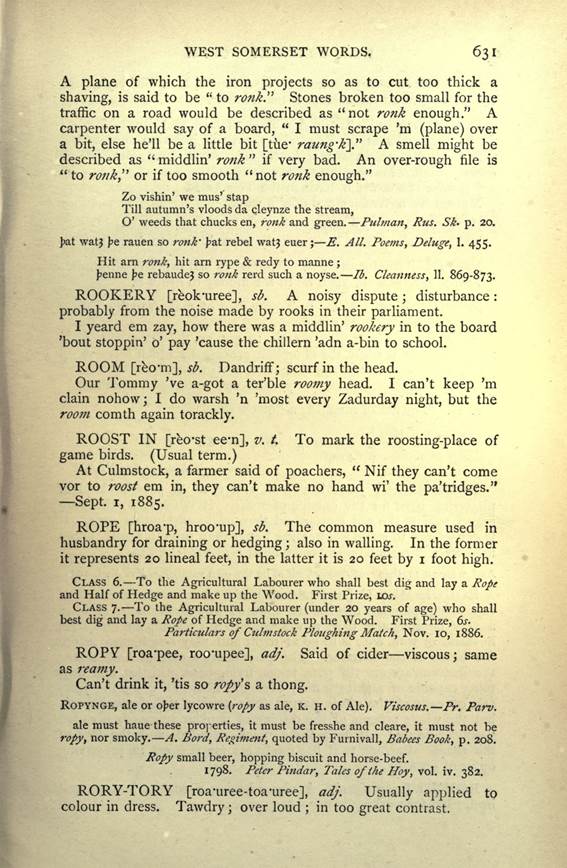
(delwedd B9491) (tudalen 631)
|
632 WEST SOMERSET WORDS.
Of all the rory-tory bonnets ever you zeed, Mrs. Vickery's beat 'em all, he was all the colours o' the
rainbow.
ROSED [roa-uzd], /. t. and /. part, of raise and rise. Many of the strong verbs of lit. Eng. take the weak
inflexion superadded to the strong, as
in break, brokt, take, tookt, &c. See W. S. Gram. p. 48. Many more are acquiring it.
I rosed a fine covey o' birds in the Ten Acres.
Maister 've &-rosed me a shillin' a week.
ROT [raat], v. An imprecation.
'Od rat it all! This is commonly worn down into Drat it.
ROT-GUT [raafguut], adj. Applied to bad drink of all kinds. Proper rat-gut stuff, 'tis a wo'th the
money to drink it.
ROUGH [hruuf], v. t. i. To roughen or make rough: chiefly applied to shoeing horses in frost.
To rough usually means merely to put on the shoe, with nails made to project, while the complete process
by which three sharp points are forged
out of the shoe itself is” to cork."
Tell Jim jis to rough the pony, can't stop to have J m a-corked.
2. sb. The act of roughing a horse's shoe.
1887 s. d.
Jan. 3. 8 shoes 6/. 4th, 4 ruffs, Sd. 6 8
4. 4 ruffs 8
From a Wellington Smith's Bill.
ROUGH-CAST [ruuf-kaa's], sb. and v. t. A peculiar kind of plastering used for the outside of walls.
It is made by throwing gravel against
the wet mortar and then white-washing all over. It is considered to stand wet weather better
than smooth work. Often used fig.;
also sometimes pronounced row-cast [ruwkaas].
And more an zo, thee wut rowcast, nif et be thy own vauther. Ex. Sc. 1. 193.
ROUGH-MUSIC [ruuf'-mue-zik], sb. A common method of expressing popular displeasure towards any individuals,
such as a very quarrelsome pair, a
wife-beater, a cuckold, an unfaithful
husband or wife, &c., is to go at night and play rough-music
before the house of the offender. The
players are a mob of both sexes; the
instruments are tin pots, tongs, frying-pans, whistles, and anything capable
of making a din; over and above all come the jeers and cat-calls of the whole party. The noise
is called rough-music, but the whole
process of the display of popular animosity is called “skimity-riding."
It is a thing much dreaded, and the fear of
the shame attaching to it has doubtless much effect in preserving outward decency.
ROUND [raewn], sb. A plane having a convex bottom and iron, used for working hollows or grooves.
|
|
|
|
|
ñ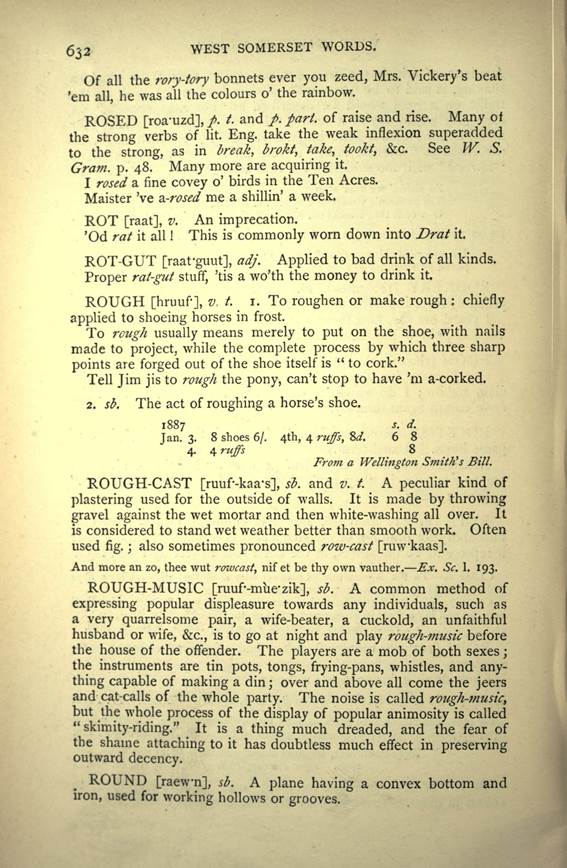
(delwedd B9492) (tudalen 632)
|
WEST SOMERSET WORDS. 633
I got a rare set o' rouns 'n hollers, dree sizes, vor zeb'm un zixpence.
ROUND-HOUSE [raewn-aewz], sb. The shed or building in which the horse-gear for driving machinery
is fixed. Few farms are without a
round-house in which the horses go round and round. The outside shape of these places hardly
ever corresponds to the name, hence
the path of the horses must give its name to the building.
ROUNDING [ruwndeen, or raewndeen], adj. A technical word signifying convexity.
[Dhik dhae'ur dae'ul dhae*ur-z un un'sh ruwndeen, veol aup',] that deal there is fully an inch convex.
ROUNDSHAVE [raewnshee'uv], v. t. To abuse; to scold. Her can roundshave^ mind, nif her's a mind
to, vor all her's so quiet lookin'.
Than tha wut chocklee, and bannee, and blazee, and roundshave ennybody that deth bet zey ay to tha. Exmoor
Scolding, 1. 232. See also Ib. 1. 311.
ROUSE [raews, ruws], adv. and sb. With a noise; generally applied to something that has fallen, or
suddenly collapsed.
We'd on'y but jist a-got down over the stairs, hon down come the roof, rouse, an' then torackly arter,
the chimley vailed way a rouse right
drue the vloor, jis the very same's a gun.
ROUSE-ABOUT [raewz-ubaewt], adj. Used generally to give force in conjunction with big or gurt. It
implies coarseness, roughness,
awkwardness, yet withal bustling activity. "A gurt rouse-about piece," is a very frequent
term for a big rough woman.
a rubbacrock, rouzeabout, platvooted, zidlemouth'd swashbucket Ex. Sc. 1.
56. ROUSER [raewzur], sb. Cant term
for a big lie.
ROUT [raewt], sb. Rut, or wheel-track. This word has never a sound approaching to lit. rut, except in
the form ruck (q. v.).
You can't go way no carriage, why the routs be so deep's my knees.
ROUT OUT [raewt-aewt], v. t. To make a clean sweep; to turn out everything in the act of
searching.
Tidn no good to zay can't vin'un. I tell 'ee I zeed'n there, an' you must rout out everything gin he's
a-voun'.
ROUTY [raewtee], v, i. i. Applied to pigs to root, /. e. to plough up the ground with the snout.
Will! why has'n a ring'd they there pigs, eens I told thee? They'll bide an routy in thick field o'
grown gin the spine's jis lig a
ploughed field.
|
|
|
|
|
ñ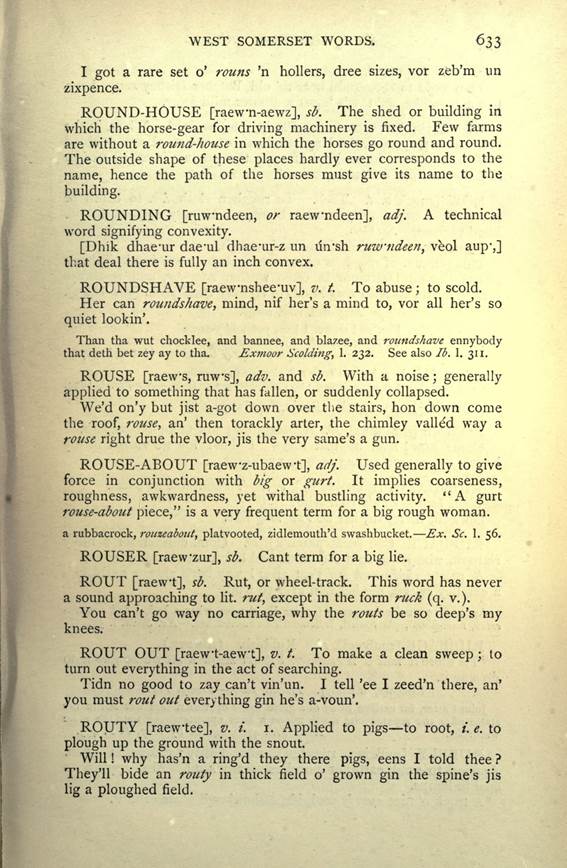
(delwedd B9493) (tudalen 633)
|
634 WEST SOMERSET WORDS.
2. v. i. To snore.
They used to zay, could hear th 1 old Butcher Disney routy down to the turnpike, an' that's 'most a quarter
mild away.
ROVINGS [roa-veens], sb. Partly, spun worsted. When, in the process of preparing, the long bands of
combed wool are doubled and drawn into
a loose kind of rope, the product is called ravings and the machine a”
|
|
|
|
|
ñ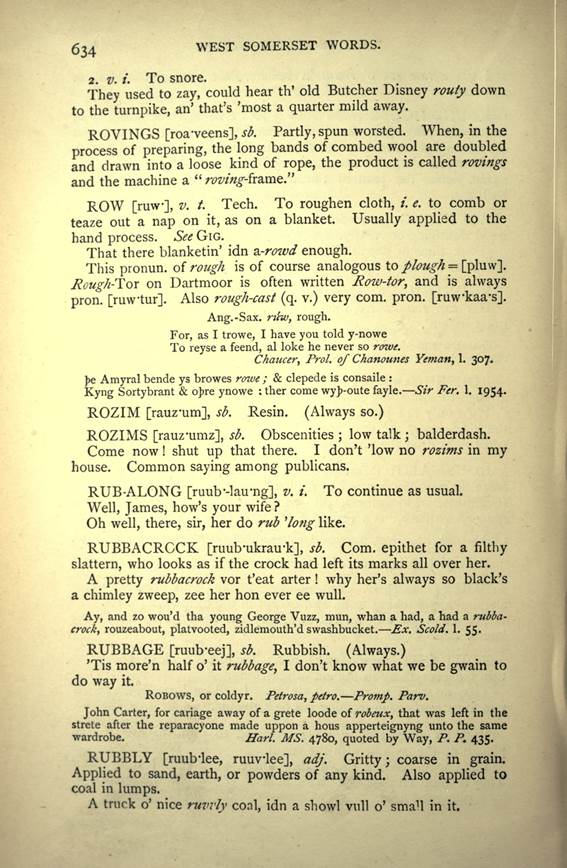
(delwedd B9494) (tudalen 634)
|
ROW [ruw], v. t. Tech. To roughen cloth, /'.
e. to comb or teaze out a nap on it,
as on a blanket. Usually applied to the
hand process. See GIG.
That there blanketin' idn &-rowd enough.
This pronun. of rough is of course analogous to plough = [pluvv]. Rough-To* on Dartmoor is often written
Row-tor, and is always pron. [ruwtur].
Also rough-cast (q. v.) very com. pron. [ruwkaa's]. Ang.-Sax. ruw, rough.
For, as I trowe, I have you told y-nowe
To reyse a feend, al loke he never so rcrwe.
Chaucer^ ProL of Chanounes Yeman> 1. 307.
)>e Amyral bende ys browes rows; & clepede is consaile:
Kyng Sortybrant & o>re ynowe: ther come wy>-oute fayle. Sir Per. 1.
1954.
ROZIM [rauz'um], sb. Resin. (Always so.)
ROZIMS [rauz-umz], sb. Obscenities; low talk; balderdash. Come now! shut up that there. I don't 'low
no rozims in my house. Common saying
among publicans.
RUB-ALONG [ruub'-lau-ng], v. i. To continue as usual.
Well, James, how's your wife?
Oh well, there, sir, her do rub 'long like.
RUBBACRCCK [ruub'tikrairk], sb. Com. epithet for a filthy slattern, who looks as if the crock had
left its marks all over her.
A pretty rubbacrock vor t'eat arter! why her's always so black's a chimley zweep, zee her hon ever ee wull.
Ay, and zo wou'd tha young George Vuzz, mun, whan a had, a had a rubba-crock^
rouzeabout, platvooted, zidlemouth'd swashbucket. Ex. Scold. 1. 55.
RUBBAGE [ruub-eej], sb. Rubbish. (Always.)
'Tis more'n half o' it rubbage, I don't know what we be gwain to do way it.
ROBOWS, or coldyr. Petrosa, petro. Promp. Parv.
John Carter, for cariage away of a grete loode of robeux, that was left in
the strete after the reparacyone made
uppon a hous apperteignyng unto the same
wardrobe. Harl. MS. 4780, quoted by Way, P. P. 435.
RUBBLY [ruub'lee, ruuvlee], adj. Gritty; coarse in grain. Applied to sand, earth, or powders of any
kind. Also applied to coal in lumps.
A truck o' nice ruvrly coal, idn a showl vull o' sma 1! in it.
|
|
|
|
|
ñ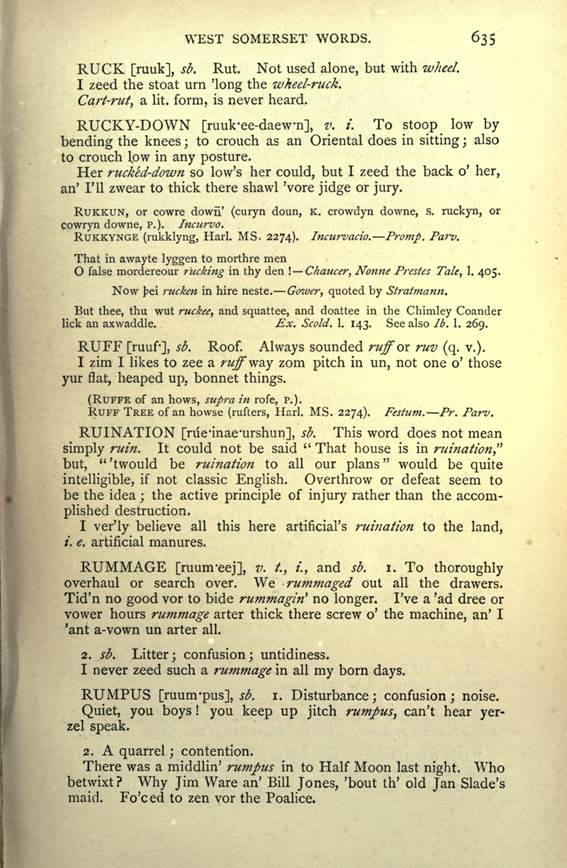
(delwedd B9495) (tudalen 635)
|
WEST SOMERSET WORDS. 635
RUCK [ruuk], sb. Rut. Not used alone, but with wheel. I zeed the stoat urn 'long the
wheel-ruck. Cart-rut, a lit. form, is never
heard.
RUCK Y-D OWN [ruuk-ee-daewn], v. i. To stoop low by bending the knees; to crouch as an Oriental
does in sitting; also to crouch l.ow
in any posture.
Her rucked-down so low's her could, but I zeed the back o' her, an' I'll zwear to thick there shawl 'vore
jidge or jury.
RUKKUN, or cowre down' (curyn doun, K. crowdyn downe, S. ruckyn, or cowryn downe, P.). Incurvo.
RUKKYNGE (rukklyng, Harl. MS- 2274). Incurvacio. Promp. Parv.
That in awayte lyggen to morthre men
O false mordereour rucking in thy den \-Ckaucer, Nonne Prestes Tale, 1. 405.
Now J>ei rucken in hire neste. Gower, quoted by Stratmann.
But thee, thu wut ruckee, and squattee, and doattee in the Chimley
Coander lick an axwaddle. Ex. Scold.
1. 143. See also Ib. 1. 269.
RUFF [ruuf*], sb. Roof. Always sounded ruff 'or ruv (q. v.). I zim I likes to zee a ruff way zom pitch
in un, not one o' those yur flat,
heaped up, bonnet things.
(RUFFE of an hows, supra in rofe, P.).
RUFF TREE of an howse (rufters, Harl. MS. 2274). Festum. Pr. Parv.
RUINATION [riie'inae'urshun], sb. This word does not mean simply ruin. It could not be said” That
house is in ruination" but,”
'twould be ruination to all our plans” would be quite intelligible, if not classic English.
Overthrow or defeat seem to be the
idea; the active principle of injury rather than the accomplished
destruction.
I ver'ly believe all this here artificial's ruination to the land, /. e. artificial manures.
RUMMAGE [ruunreej], v. t., /., and sb. i. To thoroughly overhaul or search over. We rummaged out
all the drawers. Tid'n no good vor to
bide rummagin* no longer. I've a 'ad dree or
vower hours rummage arter thick there screw o' the machine, an' I 'ant a-vown un arter all.
2. sb. Litter; confusion; untidiness.
I never zeed such a rummage in all my born days.
RUMPUS [ruunvpus], sb. i. Disturbance; confusion; noise. Quiet, you boys! you keep up jitch rumpus,
can't hear yerzel speak.
2. A quarrel; contention.
There was a middlin' rumpus in to Half Moon last night. Who betwixt? Why Jim Ware an' Bill Jones, 'bout
th' old Jan Slade's maid. Fo'ced to
zen vor the Poalice.
|
|
|
|
|
ñ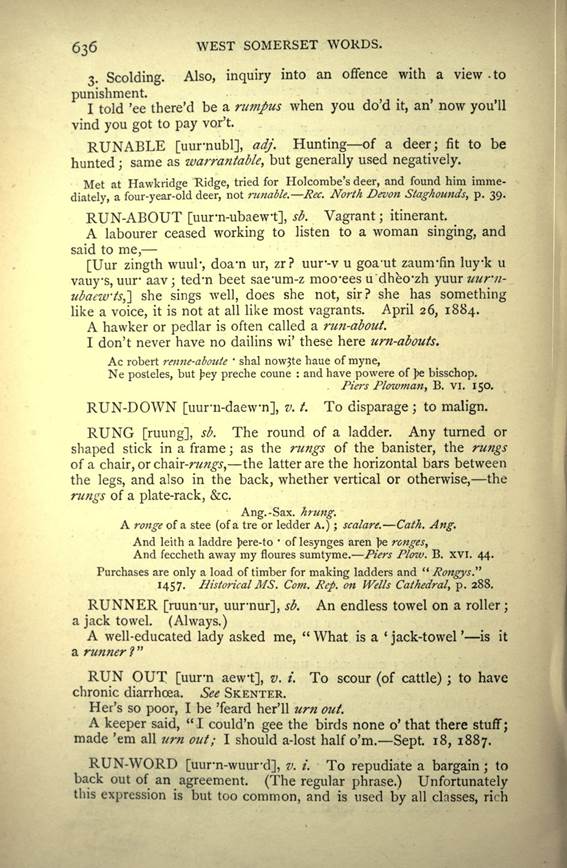
(delwedd B9496) (tudalen 636)
|
636 WEST SOMERSET WORDS.
3. Scolding. Also, inquiry into an offence with a view . to punishment.
I told 'ee there'd be a rumpus when you do'd it, an' now you'll vind you got to pay vor't.
RUNABLE [uurnubl], adj. Hunting of a deer; fit to be hunted; same as warrantable, but generally
used negatively.
Met at Hawkridge Ridge, tried for Holcombe's deer, and found him immediately,
a four-year-old deer, not runable. Rec. North Devon Staghounds, p. 39.
RUN-ABOUT [uurn-ubaewt], sb. Vagrant; itinerant.
A labourer ceased working to listen to a woman singing, and said to me,
[Uur zingth wuul 1 , doa'n ur, zr? uur-v u goa'ut zaunvfin luyk u vauys, uur aav; ted'n beet sae'um-z moo*ees
u dheo'zh y\mruurn-ubaewts,~\ she sings well, does she not, sir? she has
something like a voice, it is not at
all like most vagrants. April 26, 1884.
A hawker or pedlar is often called a run-about.
I don't never have no dailins wi' these here urn-abouts.
Ac robert renne-aboute ' shal now^te haue of myne,
Ne posteles, but J?ey preche coune: and have powere of ]>e bisschop.
. Piers Plowman, B. vi. 150.
RUN-DOWN [uurn-daewn], v. t. To disparage; to malign.
RUNG [ruung], sb. The round of a ladder. Any turned or shaped stick in a frame; as the rungs of
the banister, the rungs of a chair, or
chair-rungs, the latter are the horizontal bars between the legs, and also in the back, whether
vertical or otherwise, the rungs of a
plate-rack, &c.
Ang.-Sax. hrung. A range of a stee (of
a tre or ledder A.); scalare. Cath. Ang.
And leith a laddre ]>ere-to of lesynges aren Ipe ronges,
And feccheth away my floures sumtyme. Piers Plow. B. XVI. 44.
Purchases are only a load of timber for making ladders and” Rongys" 1457. Historical MS. Com. Rep. on Wells
Cathedral, p. 288.
RUNNER [ruun-ur, uurnur], sb. An endless towel on a roller; a jack towel. (Always.)
A well-educated lady asked me,” What is a * jack-towel ' is it a runner?”
RUN OUT [uurn aewt], v. i. To scour (of cattle); to have chronic diarrhoea. See SKENTER.
Her's so poor, I be 'feard her' 11 urn out.
A keeper said, "I could'n gee the birds none o' that there stuff; made 'em all urn out; I should a-lost half
o'm. Sept. 18, 1887.
RUN-WORD [uurn-wuurd], v. i. To repudiate a bargain; to back out of an agreement. (The regular
phrase.) Unfortunately this expression
is but too common, and is used by all classes, rich
|
|
|
|
|
ñ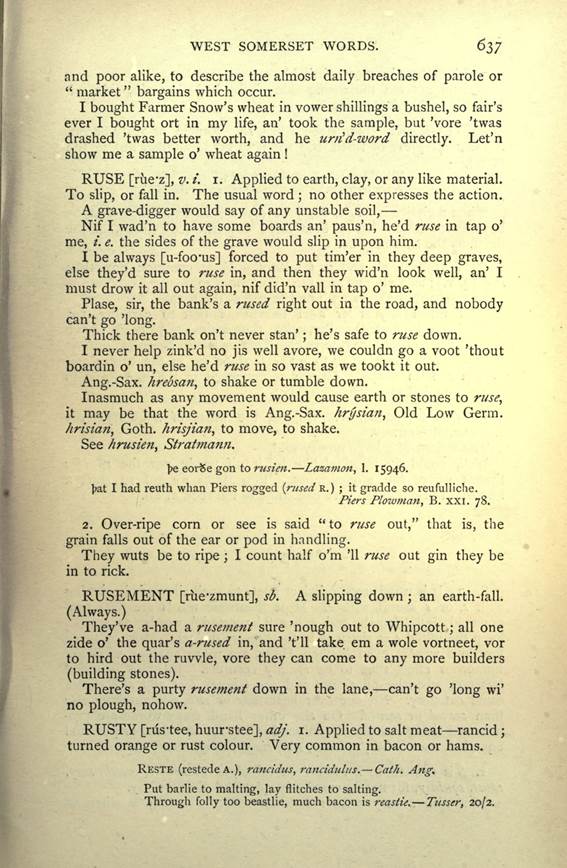
(delwedd B9497) (tudalen 637)
|
WEST SOMERSET WORDS. 637
and poor alike, to describe the almost daily breaches of parole or
“market" bargains which occur.
I bought Farmer Snow's wheat in vower shillings a bushel, so fair's ever I bought ort in my life, an' took the
sample, but 'vore 'twas drashed 'twas
better worth, and he urrfd-word directly. Let'n show me a sample o' wheat again!
RUSE [riie-z], v. i. i. Applied to earth, clay, or any like material. To slip, or fall in. The usual word; no
other expresses the action.
A grave-digger would say of any unstable soil,
Nif I wad'n to have some boards an' paus'n, he'd ruse in tap o' me, /. e. the sides of the grave would slip
in upon him.
I be always [u-foo-us] forced to put tim'er in they deep graves, else they'd sure to ruse in, and then they
wid'n look well, an' I must drow it
all out again, nif did'n vail in tap o' me.
Plase, sir, the bank's a rused right out in the road, and nobody can't go 'long.
Thick there bank on't never stan'; he's safe to ruse down.
I never help zink'd no jis well avore, we couldn go a voot 'thout boardin o' un, else he'd ruse in so vast as
we tookt it out.
Ang.-Sax. hrebsan, to shake or tumble down.
Inasmuch as any movement would cause earth or stones to ruse, it may be that the word is Ang.-Sax.
hrysian, Old Low Germ. hrisian, Goth,
hrisjian, to move, to shake.
See hrusien, Stratmann.
}>Q eoi'tSe gon to rusien. Lazamon, 1. 15946.
]>at I had reuth whan Piers rogged (rused R.); it gradde so reufulliche.
Piers Plowman, B. XXI. 78.
2. Over-ripe corn or see is said” to ruse out," that is, the grain falls out of the ear or pod in
handling.
They wuts be to ripe; I count half o'm '11 ruse out gin they be in to rick.
RUSEMENT [rue-zmunt], sb. A slipping down; an earth-fall. (Always.)
They've a-had a rusement sure 'nough out to Whipcott; all one zide o' the quar's a-rused in, and 't'll
take em a wole vortneet, vor to hird
out the ruvvle, vore they can come to any more builders (building stones).
There's a purty rusement down in the lane, can't go 'long wi' no plough, nohow.
RUSTY [rus'tee, huurstee], adj. i. Applied to salt meat rancid; turned orange or rust colour. Very common
in bacon or hams.
RESTE (restedeA.), rancidus, randdulus. Cath. Ang*
Put bavlie to malting, lay flitches to salting.
Through folly too beastlie, much bacon is reastie. Tusser, 20/2.
|
|
|
|
|
ñ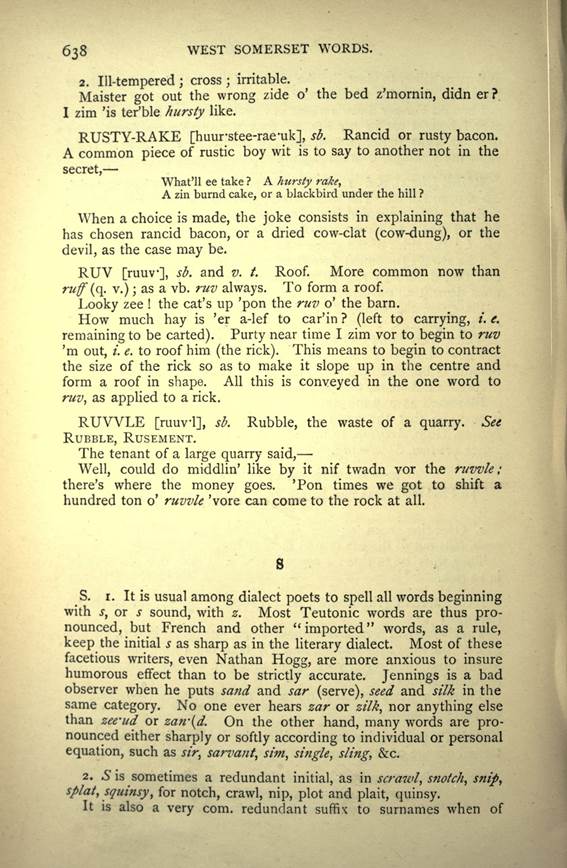
(delwedd B9498) (tudalen 638)
|
638 WEST SOMERSET WORDS.
2. Ill-tempered; cross; irritable.
Maister got out the wrong zide o' the bed z'mornin, didn er? I zim 'is ter'ble hursty like.
RUSTY-RAKE [huurstee-rae'uk], sb. Rancid or rusty bacon. A common piece of rustic boy wit is to say
to another not in the
secret,
What'll ee take? A hursty rake,
A zin burnd cake, or a blackbird under the hill?
When a choice is made, the joke consists in explaining that he has chosen rancid bacon, or a dried
cow-clat (cow-dung), or the devil, as
the case may be.
RUV [ruuv], sb. and v. t. Roof. More common now than ruf(q. v.); as a vb. ruv always. To form a
roof.
Looky zee! the cat's up 'pon the ruv o' the barn.
How much hay is 'er a-lef to car' in? (left to carrying, /. e. remaining to be carted). Purty near time I
zim vor to begin to ruv 'm out, /. e.
to roof him (the rick). This means to begin to contract the size of the rick so as to make it slope
up in the centre and form a roof in
shape. All this is conveyed in the one word to ruv, as applied to a rick.
RUVVLE [ruuvl], sb. Rubble, the waste of a quarry. See RUBBLE, RUSEMENT.
The tenant of a large quarry said,
Well, could do middlin' like by it nif twadn vor the ruvvle; there's where the money goes. 'Pon times we
got to shift a hundred ton o' ruvvle
'vore can come to the rock at all.
8
S. i. It is usual among dialect poets to spell all words beginning with s, or s sound, with z. Most Teutonic
words are thus pronounced, but French and other "imported" words,
as a rule, keep the initial s as sharp
as in the literary dialect. Most of these
facetious writers, even Nathan Hogg, are more anxious to insure humorous effect than to be strictly
accurate. Jennings is a bad observer
when he puts sand and sar (serve), seed and silk in the same category. No one ever hears zar or
zilk, nor anything else than zee'ud or
zan'(d. On the other hand, many words are pronounced either sharply or softly
according to individual or personal
equation, such as sir, sarvant, sim, single, sling, &c.
2. S is sometimes a redundant initial, as in scrawl, snotch, snip, splat, squinsy, for notch, crawl, nip, plot
and plait, quinsy.
It is also a very com. redundant suffix to surnames when of
|
|
|
|
|
ñ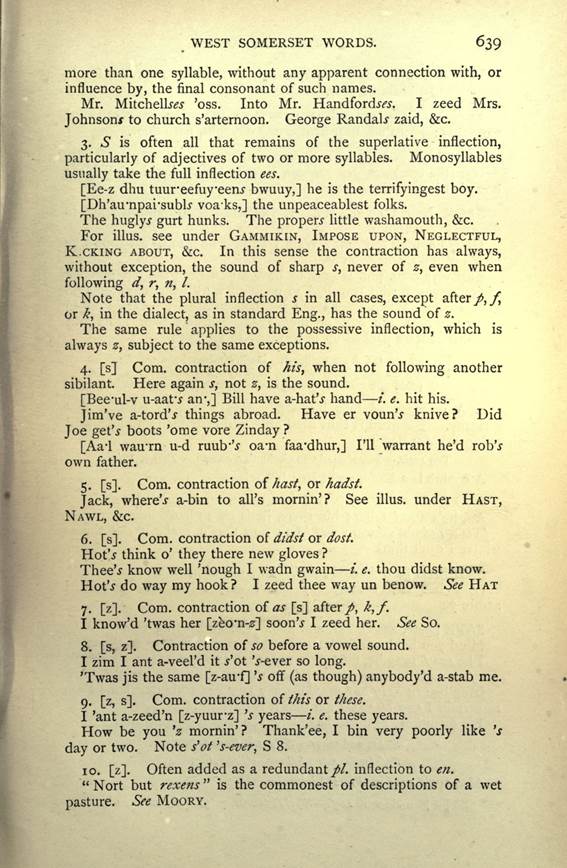
(delwedd B9499) (tudalen 639)
|
WEST SOMERSET WORDS. 639
more than one syllable, without any apparent connection with, or influence by, the final consonant of such
names.
Mr. Mitchells 'oss. Into Mr. Handforcte. I zeed Mrs. Johnson* to church s'arternoon. George
Randal-f zaid, &c.
3. S is often all that remains of the superlative inflection, particularly of adjectives of two or more
syllables. Monosyllables usually take
the full inflection ees.
[Ee-z dhu tuureefuyeenj bwuuy,] he is the terrifyingest boy.
[Dh'au'npai'subLf voa'ks,] the unpeaceablest folks.
The huglys gurt hunks. The propers little washamouth, &c.
For illus. see under GAMMIKIN, IMPOSE UPON, NEGLECTFUL, K.CKING ABOUT, &c. In this sense the
contraction has always, without
exception, the sound of sharp s, never of z, even when following d, r, n, I.
Note that the plural inflection s in all cases, except after/,/ or k, in the dialect, as in standard Eng.,
has the sound of z.
The same rule applies to the possessive inflection, which is always z, subject to the same exceptions.
4. [s] Com. contraction of his, when not following another sibilant. Here again s, not z, is the
sound.
[Bee-ul-v u-aat's an-,] Bill have a-hat's hand /. e. hit his.
Jim've a-tord's things abroad. Have er voun's knive? Did Joe get's boots 'ome vore Zinday?
[Aa'l wau'rn u-d ruub*'s oa'n faa'dhur,] I'll warrant he'd rob's own father.
5. [s]. Com. contraction of hast, or hadst.
Jack, where'.r a-bin to all's mornin'? See illus. under HAST, NAWL, &c.
6. [s]. Com. contraction of didst or dost.
Hot's think o' they there new gloves?
Thee's know well 'nough I wadn gwain /. e. thou didst know. Hot's do way my hook? I zeed thee way un
benow. See HAT
7. [z]. Com. contraction of as [s] after/, k,f.
I know'd 'twas her [zeo'n-z] soon's I zeed her. See So.
8. [s, z]. Contraction of so before a vowel sound. I zim I ant a-veel'd it s'ot 's-ever so
long.
'Twas jis the same [z-au'f] 's off (as though) anybody'd a-stab me.
9. [z, s]. Com. contraction of this or these.
I 'ant a-zeed'n [z-yuurz] 's years /'. e. these years. How be you 'z mornin'? Thank'ee, I bin very
poorly like 's day or two. Note Jot
^s-ever, S 8.
10. [z]. Often added as a redundant//, inflection to en.
" Nort but rexens” is the commonest of descriptions of a wet pasture. See MOORY.
|
|
|
|
|
ñ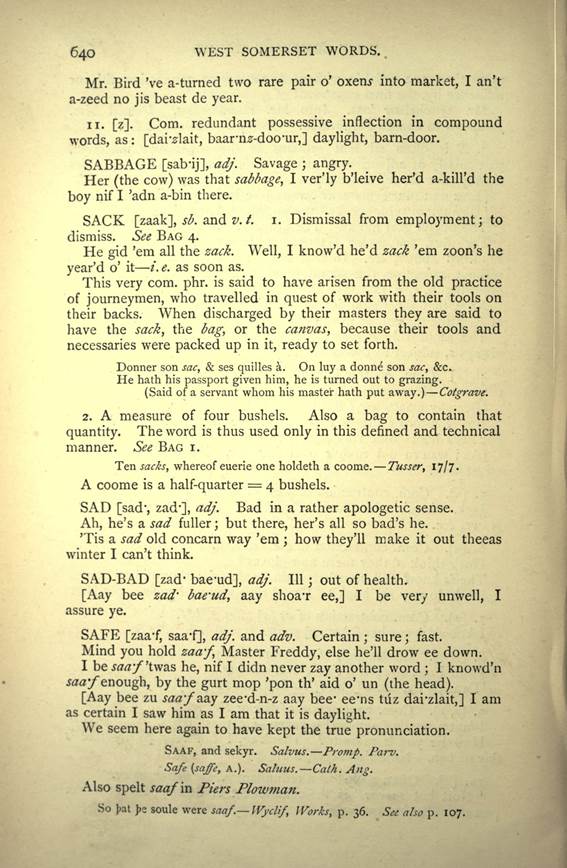
(delwedd B9500) (tudalen 640)
|
640 WEST SOMERSET WORDS.
Mr. Bird Ve a-turned two rare pair o' oxen,? into market, I an't a-zeed no jis beast de year.
ii. [z]. Com. redundant possessive inflection in compound words, as: [dai^lait, baarnz-doo'ur,]
daylight, barn-door.
SABBAGE [sab'ij], adj. Savage; angry.
Her (the cow) was that sabbage, I ver'ly b'leive her'd a-kill'd the boy nif I 'adn a-bin there.
SACK [zaak], sb. and v. t. i. Dismissal from employment; to dismiss. See BAG 4.
He gid 'em all the zack. Well, I know'd he'd zack 'em zoon's he year'd o' it /. e. as soon as.
This very com. phr. is said to have arisen from the old practice of journeymen, who travelled in quest of
work with their tools on their backs.
When discharged by their masters they are said to have the sack, the bag, or the canvas,
because their tools and necessaries
were packed up in it, ready to set forth.
Donner son sac, & ses quilles a. On luy a donne son sac, &c. He hath his passport given him, he is
turned out to grazing.
(Said of a servant whom his master hath put away.) Cotgrave.
2. A measure of four bushels. Also a bag to contain that quantity. The word is thus used only in
this denned and technical manner. See
BAG i.
Ten sacks, whereof euerie one holdeth a coome. Tusser, 17/7.
A coome is a half-quarter = 4 bushels.
SAD [sad', zad-], adj. Bad in a rather apologetic sense. Ah, he's a sad fuller; but there, her's all
so bad's he. 'Tis a sad old concarn
way 'em; how they'll make it out theeas
winter I can't think.
SAD-BAD [zad- bae-ud], adj. Ill; out of health. [Aay bee zad' bae'ud, aay shoa'r ee,] I be
very unwell, I assure ye.
SAFE [zaa-f, saa-f], adj. and adv. Certain; sure; fast. Mind you hold zaa'f^ Master Freddy, else
he'll drow ee down. I be saa'f 'twas
he, nif I didn never zay another word; I knowd'n j^/enough, by the gurt mop 'pon th' aid o'
un (the head).
[Aay bee zu saa'f aay zee'd-n-z aay bee 1 ee'ns tiiz dai'zlait,] I am as certain I saw him as I am that it is
daylight.
We seem here again to have kept the true pronunciation. SAAF, and sekyr. Salvus.Promp. Paw. Safe (saffe, A . ) . Saluus. Calk
.Aug. Also spelt saaf'm Piers Plowman.
So J>at J>e soule were saaf. Wydif, Works, p. 36. See also p. 107.
|
|
|
|
|
ñ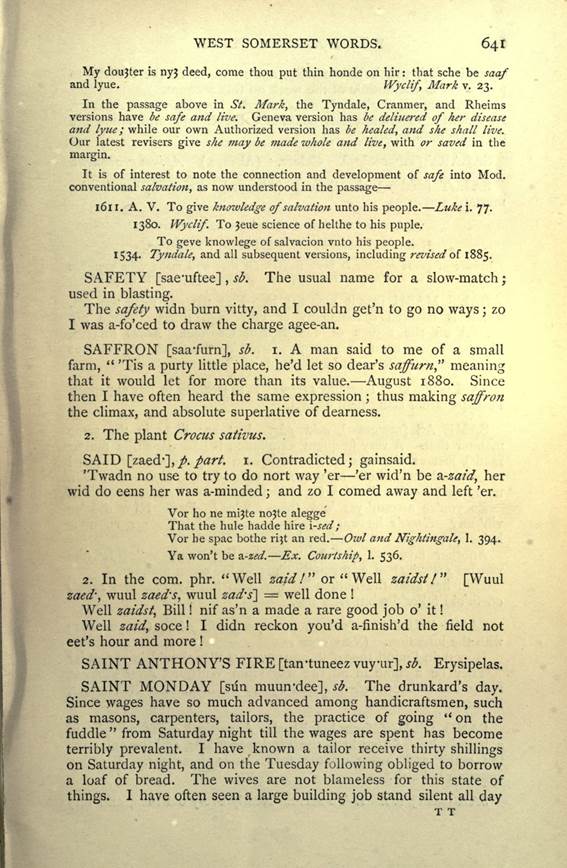
(delwedd B9501) (tudalen 641)
|
WEST SOMERSET WORDS. 641
My doubter is ny$ deed, come them put thin honde on hir: that sche be
saaf and lyue. Wyclif, Mark v. 23.
In the passage above in St. Mark, the Tyndale, Cranmer, and Rheims versions have be safe and live. Geneva
version has be deliuered of her disease
and lyue; while our own Authorized version has be healed, and she
shall live. Our latest revisers give
she may be made -whole and live, with or saved in the margin.
It is of interest to note the connection and development of safe into
Mod. conventional salvation, as now
understood in the passage
1611. A. V. To give knowledge of salvation unto his people. Luke i. 77. 1380. Wyclif. To Jeue science of helthe to
his puple.
To geve knowlege of salvacion vnto his people. 1534. Tyndale, and all subsequent versions,
including revised of 1885.
SAFETY [sae'uftee] , sb. The usual name for a slow-match; used in blasting.
The safety widn burn vitty, and I couldn get'n to go no ways; zo I was a-fo'ced to draw the charge agee-an.
SAFFRON [saa'furn], sb. i. A man said to me of a small farm,” 'Tis a purty little place, he'd let
so dear's saffurn" meaning that
it would let for more than its value. August 1880. Since then I have often heard the same
expression; thus making saffron the
climax, and absolute superlative of dearness.
2. The plant Crocus sativus. .
SAID [zaed*],/. part. i. Contradicted; gainsaid. 'Twadn no use to try to do nort way 'er 'er
wid'n be &-zaid, her wid do eens
her was a-minded; and zo I corned away and left 'er.
Vor ho ne mi^te no^te alegge
That the hule hadde hire \-sed;
Vor he spac bothe ri}t an red. Owl and Nightingale, I. 394.
Ya won't be a-*/. Ex. Courtship, 1. 536.
2. In the com. phr. "Well zaid!" or "Well zaidst!"
[Wuul zaed', wuul zaed's, wuul zad m
s~\ = well done!
Well zaidst^ Bill! nif as'n a made a rare good job o' it!
Well zaid, soce! I didn reckon you'd a-finish'd the field not eet's hour and more!
SAINT ANTHONY'S FIRE [tan'tuneez vuyur], sb. Erysipelas.
SAINT MONDAY [sun muuirdee], sb. The drunkard's day. Since wages have so much advanced among
handicraftsmen, such as masons,
carpenters, tailors, the practice of going *' on the fuddle” from Saturday night till the wages
are spent has become terribly
prevalent. I have known a tailor receive thirty shillings on Saturday night, and on the Tuesday
following obliged to borrow a loaf of
bread. The wives are not blameless for this state of things. I have often seen a large building
job stand silent all day
T T
|
|
|
|
|
ñ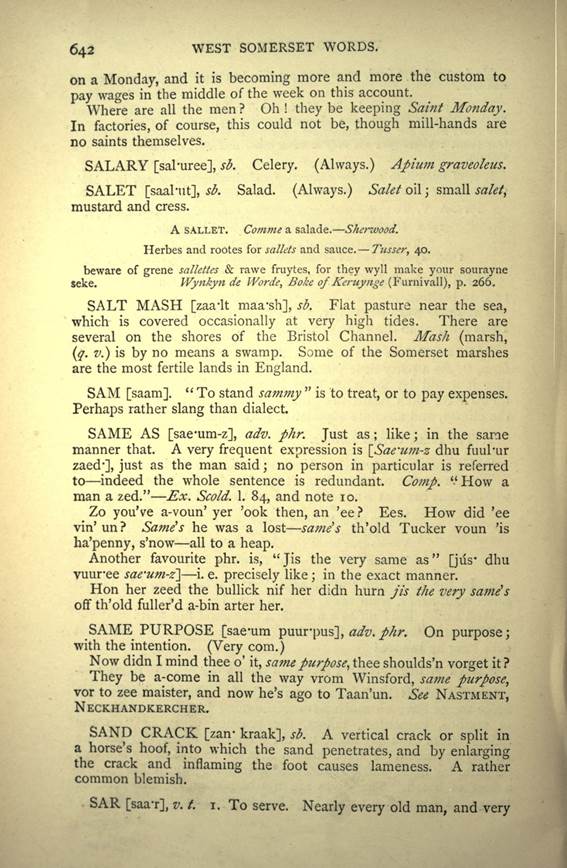
(delwedd B9502) (tudalen 642)
|
642 WEST SOMERSET WORDS.
on a Monday, and it is becoming more and more the custom to pay wages in the middle of the week on this
account.
Where are all the men? Oh! they be keeping Saint Monday. In factories, of course, this could not be,
though mill-hands are no saints
themselves.
SALARY [sal'uree], sb. Celery. (Always.) Apium graveoleus.
SALET [saal-ut], sb. Salad. (Always.) Salet oil j small salet, mustard and cress.
A SALLET. Conime a salade. Sherwood.
Herbes and rootes for salkts and sauce. Titsser, 40.
beware of grene sallettes & rawe fruytes, for they wyll make your
sourayne seke. Wynkyn de Worde, Boke
of Keruynge (Furnivall), p. 266.
SALT MASH [zaa'lt maa'sh], sb. Flat pasture near the sea, which is covered occasionally at very high
tides. There are several on the shores
of the Bristol Channel. Mash (marsh,
(q. v.) is by no means a swamp. Some of the Somerset marshes are the most fertile lands in England.
SAM [saam].” To stand sammy” is to treat, or to pay expenses. Perhaps rather slang than dialect.
SAME AS [sae-um-z], adv. phr. Just as; like; in the same manner that. A very frequent expression is
[Sae'um-z dhu fuul'ur zaed'], just as
the man said; no person in particular is referred to indeed the whole sentence is redundant.
Comp. '-'How a man a zed." Ex.
Scold. 1. 84, and note 10.
Zo you've a-voun' yer 'ook then, an 'ee? Ees. How did 'ee vin'un? Same's he was a lost same's th'old
Tucker voun 'is ha'penny, s'now all to
a heap.
Another favourite phr. is, "Jis the very same as" [juV dhu vuuree sae'um-z~\ i. e. precisely like; in
the exact manner.
Hon her zeed the bullick nif her didn hurn jis the very same's off th'old fuller'd a-bin arter her.
SAME ^ PURPOSE [sac-urn puurpus], adv. phr. On purpose; with the intention. (Very com.)
Now didn I mind thee o' it, same purpose, thee shoulds'n vorget it?
They be a-come in all the way vrom Winsford, same purpose, vor to zee maister, and now he's ago to
Taan'un. See NASTMENT,
NECKHANDKERCHER.
SAND CRACK [zan- kraak], sb. A vertical crack or split in a horse's hoof, into which the sand
penetrates, and by enlarging the crack
and inflaming the foot causes lameness. A rather common blemish.
SAR [saa-r], v. t. i. To serve. Nearly every old man, and very
|
|
|
|
|
ñ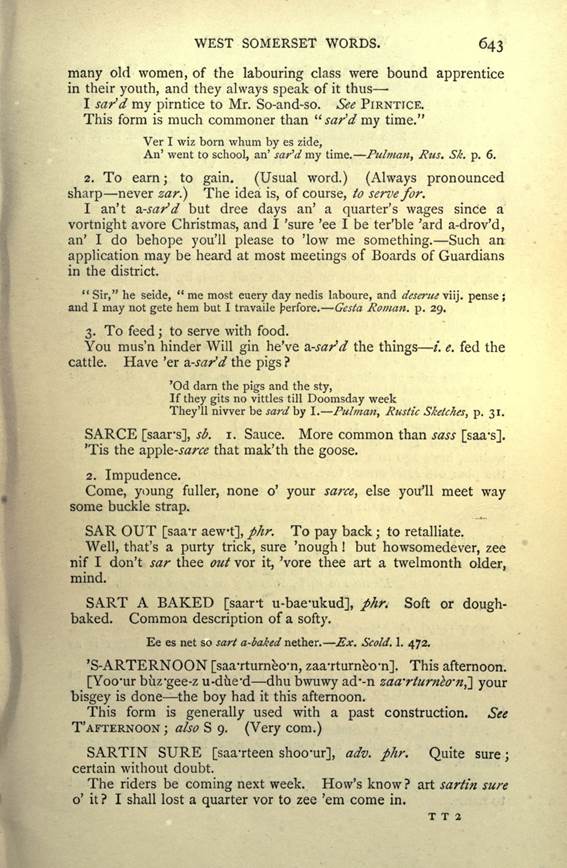
(delwedd B9503) (tudalen 643)
|
WEST SOMERSET WORDS. 643
many old women, of the labouring class were bound apprentice in their youth, and they always speak of it
thus
I sar d my pirntice to Mr. So-and-so. See PIRNTICE.
This form is much commoner than "sar'd my time."
Ver I wiz born whum by es zide,
An' went to school, an' sar'dmy time. Pulman, Riis. Sk. p. 6.
2. To earn; to gain. (Usual word.) (Always pronounced sharp never zar.} The idea is, of course,
to serve for.
I an't a.-sar*d but dree days an' a quarter's wages since a vortnight avore Christmas, and I 'sure 'ee
I be ter'ble 'ard a-drov'd, an' I do
behope you'll please to 'low me something. Such an application may be heard at most meetings
of Boards of Guardians in the
district.
" Sir," he seide,” me most euery day nedis laboure, and deserue
viij. pense; and I may not gete hem
but I travaile J^erfore. Gesta Roman, p. 29.
3. To feed \ to serve with food.
You mus'n hinder Will gin he've z.-sar'd the things /. e. fed the cattle. Have 'er a.-sar'd the pigs?
'Od darn the pigs and the sty,
If they gits no vittles till Doomsday week
They'll nivver be sard by I. Pulman, Rustic Sketches, p. 31.
SARCE [saars], sb. i. Sauce. More common than sass [saa's]. 'Tis the apple-sane that mak'th the goose.
2. Impudence.
Come, young fuller, none o' your sarce, else you'll meet way some buckle strap.
SAR OUT [saa-r aewt], phr. To pay back; to retalliate.
Well, that's a purty trick, sure 'nough! but howsomedever, zee nif I don't sar thee out vor it, Vore thee
art a twelmonth older, mind.
SART A BAKED [saart u-bae'ukud], phr. Soft or dough-baked. Common description
of a softy.
Ee es net so sart a-baked nether. Ex. Scold. 1. 472.
'S-ARTERNOON [saa'rturneo'n, zaa-rturneo-n]. This afternoon.
[Yoo'ur buz'gee-z u-diie'd dhu bwuwy ad'-n zaa'rturnbo'n^\ your bisgey is done the boy had it this
afternoon.
This form is generally used with a past construction. See T'AFTERNOON; also S 9. (Very com.)
SARTIN SURE [saa'rteen shoo'ur], adv. phr. Quite sure; certain without doubt.
The riders be coming next week. How's know? art sartin sure o' it? I shall lost a quarter vor to zee
'em come in.
T T 2
|
|
|
|
|
ñ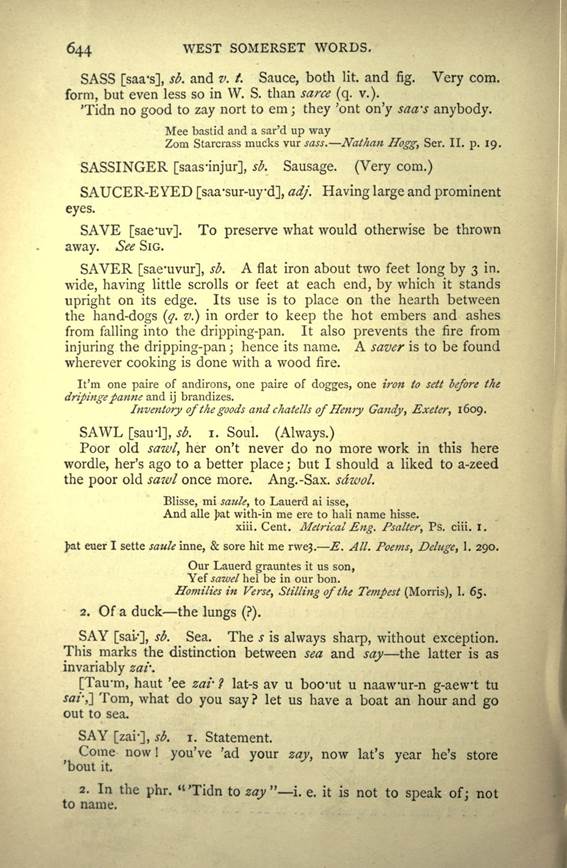
(delwedd B9504) (tudalen 644)
|
644 WEST SOMERSET WORDS.
SASS [saa-s], sb. and v. t. Sauce, both lit. and fig. Very com. form, but even less so in W. S. than sarce
(q. v.).
Tidn no good to zay nort to em; they 'ont on'y saa's anybody.
Mee bastid and a sar'd up way
Zom Starcrass mucks vur sass. Nathan Hogg, Ser. II. p. 19.
SASSINGER [saas-injur], sb. Sausage. (Very com.)
SAUCER-EYED [saa'sur-uyd], adj. Having large and prominent eyes.
SAVE [sae'uv]. To preserve what would otherwise be thrown away. See SIG.
SAVER [sae-uvur], sb. A flat iron about two feet long by 3 in. wide, having little scrolls or feet at each
end, by which it stands upright on its
edge. Its use is to place on the hearth between the hand-dogs (q. v.) in order to keep the
hot embers and ashes from falling into
the dripping-pan. It also prevents the fire from injuring the dripping-pan; hence its name.
A saver is to be found wherever
cooking is done with a wood fire.
It'm one paire of andirons, one paire of dogges, one iron to sett before
the dripinge panne and ij brandizes.
Inventory of the goods and chatells of Henry Gaudy, Exeter, 1609.
SAWL [sairl], sb. i. Soul. (Always.)
Poor old sawl t her on't never do no more work in this here wordle, her's ago to a better place; but I
should a liked to a-zeed the poor old
sawl once more. Ang.-Sax. sdwoL
Blisse, mi satile, to Lauerd ai isse,
And alle J>at with-in me ere to hali name hisse.
xiii. Cent. Metrical Eng. Psalter, Ps. ciii. I.
>at euer I sette saule inne, & sore hit me rwe^. E. All. Poems,
Deluge, \. 290.
Our Lauerd grauntes it us son, Yef
sawel hel be in our bon. Homilies in
Verse, Stilling of the Tempest (Morris), 1. 65.
2. Of a duck the lungs (?).
SAY [sai/j, sb. Sea. The s is always sharp, without exception. This marks the distinction between sea and
say the latter is as invariably zai'.
[Tau-m, haut 'ee zai'? lat-s av u boo*ut u naawur-n g-aewt tu sat;"] Tom, what do you say? let us
have a boat an hour and go out to sea.
SAY [zai-], sb. i. Statement.
Come now! you've 'ad your zay, now lat's year he's store 'bout it.
2. In the phr. "Tidn to zay"i. e. it is not to speak of; not to name.
|
|
|
|
|
ñ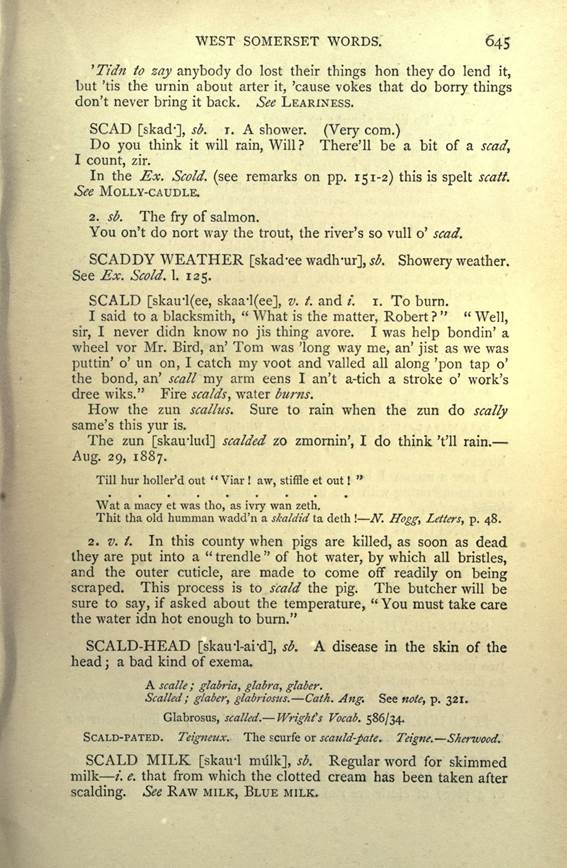
(delwedd B9505) (tudalen 645)
|
WEST
SOMERSET WORDS. 645
J Tidn to zay anybody do lost their things hon they do lend it, but 'tis the urnin about arter it, 'cause
vokes that do borry things don't never
bring it back. See LEARINESS.
SCAD [skad-], sb. i. A shower. (Very com.)
Do you think it will rain, Will? There'll be a bit of a scad, I count, zir.
In the Ex. Scold, (see remarks on pp. 151-2) this is spelt scatt. See MOLLY-CAUDLE.
2. sb. The fry of salmon.
You on't do nort way the trout, the river's so vull o' scad.
SCADDY WEATHER [skad'ee wadrrur], sb. Showery weather. See Ex. Scold. 1. 125.
SCALD [skairl(ee, skaa-l(ee], v. t. and /. i. To burn.
I said to a blacksmith,” What is the matter, Robert?” “Well, sir, I never didn know no jis thing avore.
I was help bondin' a wheel vor Mr.
Bird, an' Tom was 'long way me, an' jist as we was puttin' o' un on, I catch my voot and
vailed all along 'pon tap o' the bond,
an' scall my arm eens I an't a-tich a stroke o' work's dree wiks." Fire scalds, water burns.
How the zun scallus. Sure to rain when the zun do scatty same's this yur is.
The zun [skau'lud] scalded zo zmornin', I do think 't'll rain. Aug. 29, 1887.
Till hur holler'd out” Viar! aw, stiffle et out!”
Wat a macy et was tho, as ivry wan zeth.
Thit tha old humman wadd'n a skaldid ta deth! N. Hogg, Letters, p. 48.
2. v. /. In this county when pigs are killed, as soon as dead they are put into a” trendle” of hot water,
by which all bristles, and the outer
cuticle, are made to come off readily on being scraped. This process is to scald the pig.
The butcher will be sure to say, if
asked about the temperature,” You must take care the water idn hot enough to burn."
SCALD-HEAD [skau'1-ard], sb. A disease in the skin of the head; a bad kind of exema.
A scalle; glabria, glabra, glaber.
Scalled; glaber, glabriosus. Cath. Ang. See note, p. 321.
Glabrosus, scalled. Wrights Vocab. 586/34.
SCALD-FATED. Teigneux. The scurfe or scauld-pate. Teigne. Sherwood.
SCALD MILK [skau-1 miilk], sb. Regular word for skimmed milk /. e. that from which the clotted
cream has been taken after scalding.
See RAW MILK, BLUE MILK.
|
|
|
|
|
ñ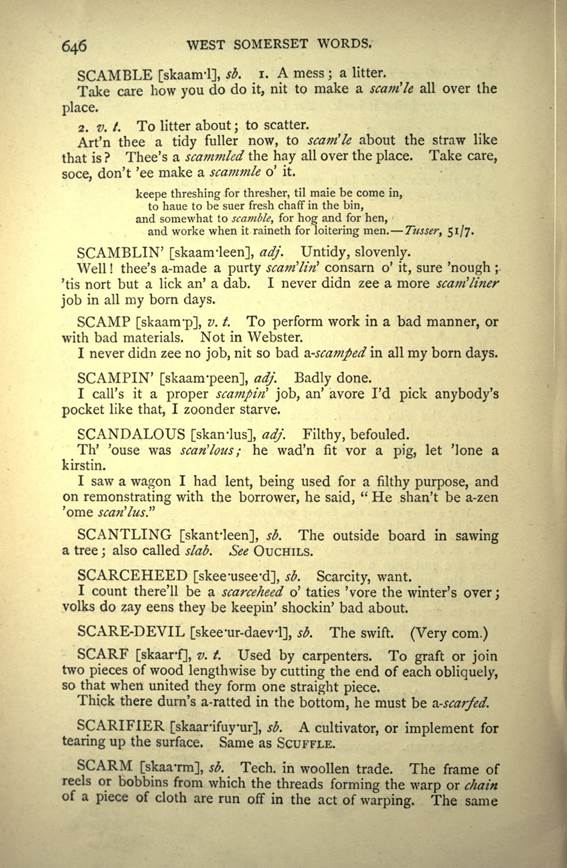
(delwedd B9506) (tudalen 646)
|
646 WEST SOMERSET WORDS.
SCAMBLE [skaanrl], sb. i. A mess; a litter.
Take care how you do do it, nit to make a fcam'U all over the place.
2. v. t. To litter about; to scatter.
Art'n thee a tidy fuller now, to scanile about the straw like that is? Thee's a scammled the hay all over
the place. Take care, soce, don't 'ee
make a scammle o' it.
keepe threshing for thresher, til maie be come in,
to haue to be suer fresh chaff in the bin,
and somewhat to scamble, for hog and for hen,
and worke when it raineth for loitering men. Tttsser, 51/7.
SCAMBLIN' [skaanrleen], adj. Untidy, slovenly.
Well! thee's a-made a purty scam'liri consarn o' it, sure 'nough; 'tis nort but a lick an' a dab. I never
didn zee a more scam' liner job in all
my born days.
SCAMP [skaanrp], v. t. To perform work in a bad manner, or with bad materials. Not in Webster.
I never didn zee no job, nit so bad ^.-scamped in all my born days.
SCAMPIN' [skaanvpeen], adj. Badly done.
I call's it a proper scampin' job, an' avore I'd pick anybody's pocket like that, I zoonder starve.
SCANDALOUS [skairlus], adj. Filthy, befouled.
Th' 'ouse was scarilous; he wad'n fit vor a pig, let 'lone a kirstin.
I saw a wagon I had lent, being used for a filthy purpose, and on remonstrating with the borrower, he
said,” He shan't be a-zen 'ome
scan'lus"
SCANTLING [skanfleen], sb. The outside board in sawing a tree; also called slab. See OUCHILS.
SCARCEHEED [skee-usee-d], sb. Scarcity, want.
I count there'll be a scarceheed o' taties 'vore the winter's
over; volks do zay eens they be
keepin' shockin' bad about.
SCARE-DEVIL [skee'ur-daevl], sb. The swift. (Very com.)
SCARF [skaarf], v. t. Used by carpenters. To graft or join two pieces of wood lengthwise by cutting
the end of each obliquely, so that
when united they form one straight piece.
Thick there durn's a-ratted in the bottom, he must be ^-scarfed.
SCARIFIER [skaarifuyur], sb. A cultivator, or implement for tearing up the surface. Same as SCUFFLE.
SCARM [skaa-rm], sb. Tech. in woollen trade. The frame of reels or bobbins from which the threads
forming the warp or chain of a piece
of cloth are run off in the act of warping. The same
|
|
|
|
|
ñ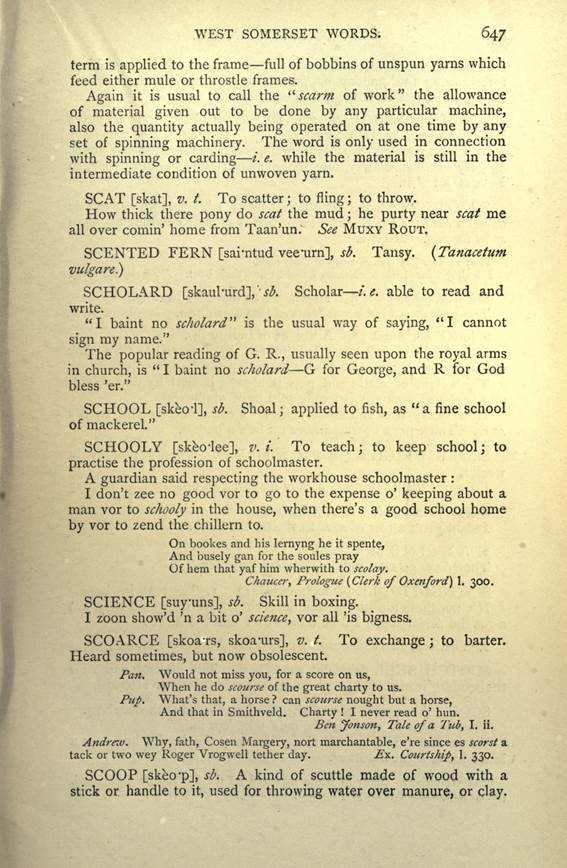
(delwedd B9507) (tudalen 647)
|
WEST
SOMERSET WORDS. 647
term is applied to the frame full of bobbins of unspun yarns which feed either mule or throstle frames.
Again it is usual to call the” scarm of work" the allowance of material given out to be done by any
particular machine, also the quantity
actually being operated on at one time by any
set of spinning machinery. The word is only used in connection with spinning or carding /. e. while the
material is still in the intermediate
condition of unwoven yarn.
SCAT [skat], v. t. To scatter; to fling; to throw. How thick there pony do scat the mud; he
purty near scat me all over comin'
home from Taan'un. See MUXY ROUT.
SCENTED FERN [sarntud vee'urn], sb. Tansy. (Tanacetum vulgar e)
SCHOLARD [skaul-urd], ' sb. Scholar i.e. able to read and write.
"I baint no scholard" is the usual way of saying, "I
cannot sign my name."
The popular reading of G. R., usually seen upon the royal arms in church, is” I baint no scholard G for
George, and R for God bless 'er."
SCHOOL [skeo-1], sb. Shoal; applied to fish, as "a fine school of mackerel."
SCHOOLY [skeo-lee], v. i. To teach; to keep school; to
practise the profession of schoolmaster.
A guardian said respecting the workhouse schoolmaster:
I don't zee no good vor to go to the expense o' keeping about a
man vor to schooly in the house, when there's a good school home
by vor to zend the chillern to.
On bookes and his lernyng he it spente,
And busely gan for the soules pray
Of hem that yaf him wherwith to scolay.
Chaucer, Prologue (Clerk of Oxenford) 1. 300.
SCIENCE [suyuns], sb. Skill in boxing.
I zoon show'd 'n a bit o' science, vor all 'is bigness.
SCOARCE [skoa'rs, skoa'urs], v. t. To exchange; to barter. Heard sometimes, but now obsolescent.
Pan. Would not miss you, for a score on us,
When he do scourse of the great charty to us.
Pup. What's that, a horse? can scourse nought but a horse, And that in Smithveld. Charty! I never read
o' him.
Ben Jonson, Tale of a Tub, I. ii.
Andreiu. Why, fath, Cosen Margery, nort marchantable, e're since es scorst
a tack or two wey Roger Vrogwell
tether day. Ex.. Courtship, 1. 330.
SCOOP [skeo'p], sb. A kind of scuttle made of wood with a stick or handle to it, used for throwing
water over manure, or clay.
|
|
|
|
|
ñ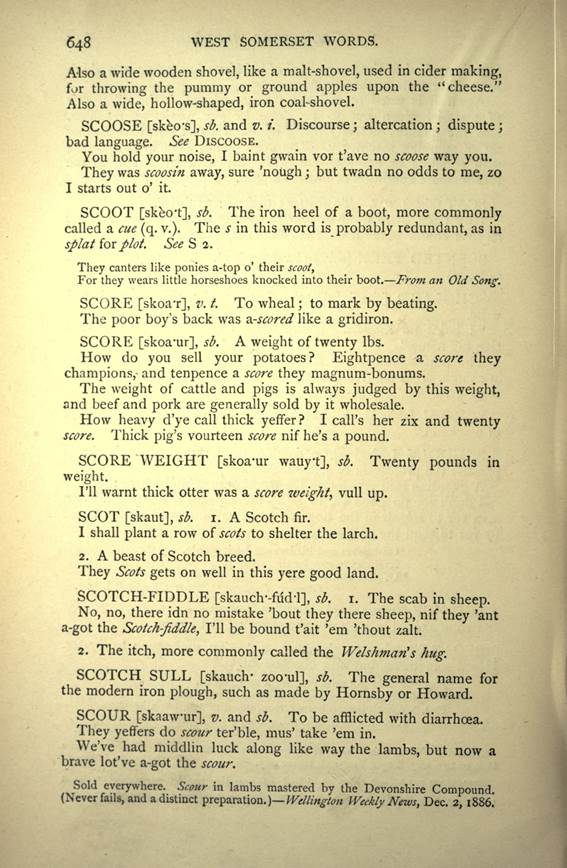
(delwedd B9508) (tudalen 648)
|
648 WEST SOMERSET WORDS.
A-lso a wide wooden shovel, like a malt-shovel, used in cider making, for throwing the pummy or ground apples
upon the "cheese." Also a
wide, hollow-shaped, iron coal-shovel.
SCOOSE [skeo-s], sb. and v. i. Discourse; altercation; dispute; bad language. See DISCOOSE.
You hold your noise, I baint gwain vor t'ave no scoose way you.
They was scoosin away, sure 'nough; but twadn no odds to me, zo I starts out o' it.
SCOOT [skeo't], sb. The iron heel of a boot, more commonly called a cue (q. v.). The s in this word is
probably redundant, as in splat iox
plot. See Si.
They canters like ponies a-top o' their scoot,
For they wears little horseshoes knocked into their boot. From an Old Song.
SCORE [skoa-r], v. t. To wheal; to mark by beating. The poor boy's back was ^-scored like a
gridiron.
SCORE [skoa-ur], sb. A weight of twenty Ibs.
How do you sell your potatoes? Eightpence a score they champions,- and tenpence a score they
magnum-bonums.
The weight of cattle and pigs is always judged by this weight, and beef and pork are generally sold by it
wholesale.
How heavy d'ye call thick yeffer? I call's her zix and twenty score. Thick pig's vourteen score nif he's
a pound.
SCORE WEIGHT [skoa-ur wauyt], sb. Twenty pounds in weight.
I'll warnt thick otter was a score weight, vull up.
SCOT [skaut], sb. i. A Scotch fir.
I shall plant a row of scots to shelter the larch.
2. A beast of Scotch breed.
They Scots gets on well in this yere good land.
SCOTCH-FIDDLE [skauch'-fiid-l], sb. i. The scab in sheep. No, no, there idn no mistake 'bout they
there sheep, nif they 'ant a-got the
Scotch-fiddle, I'll be bound t'ait 'em 'thout zalt.
2. The itch, more commonly called the Welshman's hug.
SCOTCH SULL [skauch- zoo'ul], sb. The general name for the modern iron plough, such as made by
Hornsby or Howard.
SCOUR [skaawur], v. and sb. To be afflicted with diarrhoea. They yerTers do scour ter'ble, mus' take
'em in. We've had middlin luck along
like way the lambs, but now a brave
lot've a-got the scour.
Sold everywhere. Scour in lambs mastered by the Devonshire Compound. (Never fails, and a distinct preparation. )
Wellington Weekly News, Dec. 2, 1886.
|
|
|
|
|
ñ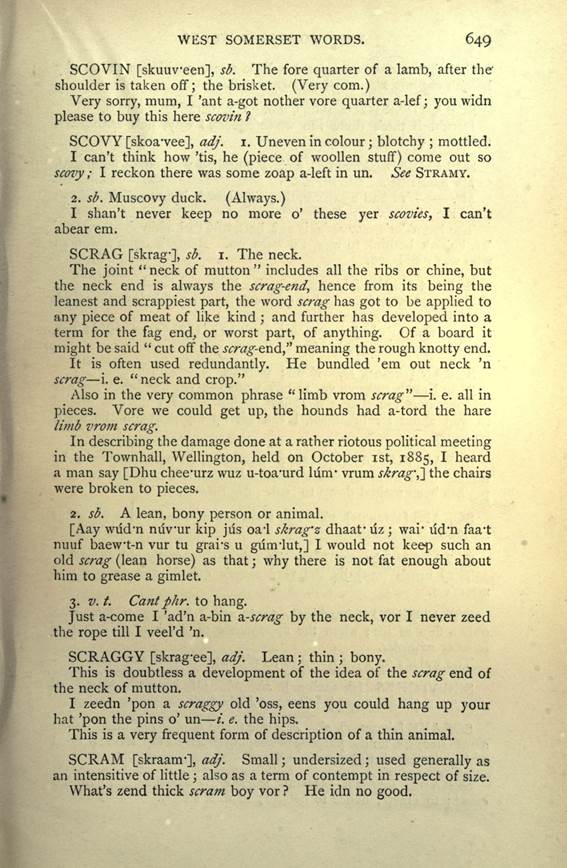
(delwedd B9509) (tudalen 649)
|
WEST
SOMERSET WORDS. 649
SCOVIN [skuuveen], sb. The fore quarter of a lamb, after the shoulder is taken off; the brisket. (Very
com.)
Very sorry, mum, I 'ant a-got nother vore quarter a-lef; you widn please to buy this here scovin?
SCOVY [skoa'vee], adj. i. Uneven in colour; blotchy; mottled. I can't think how 'tis, he (piece of
woollen stuff) come out so scovy; I
reckon there was some zoap a-left in un. See STRAMY.
2. sb. Muscovy duck. (Always.)
I shan't never keep no more o' these yer scovies, I can't abear em.
SCRAG [skrag-], sb. i. The neck.
The joint "neck of mutton" includes all the ribs or chine, but the neck end is always the scrag-end, hence
from its being the leanest and
scrappiest part, the word scrag has got to be applied to any piece of meat of like kind; and further
has developed into a term for the fag
end, or worst part, of anything. Of a board it might be said” cut off the .sm^-end,"
meaning the rough knotty end.
It is often used redundantly. He bundled 'em out neck 'n scrag i. e.” neck and crop."
Also in the very common phrase "limb vrom scrag" i. e. all in pieces. Vore we could get up, the hounds
had a-tord the hare limb vrom scrag.
In describing the damage done at a rather riotous political meeting in the Townhall, Wellington, held on
October ist, 1885, I heard a man say
[Dhu chee'urz wuz u-toa'urd liinr vrum skrag' ^\ the chairs were broken to pieces.
2. sb. A lean, bony person or animal.
[Aay wiid'n niivur kip jus oai skrag'z dhaaf uz; war iid*n faa't nuuf baewt-n vur tu grai's u giinrlut,] I
would not keep such an old scrag (lean
horse) as that; why there is not fat enough about him to grease a gimlet.
3. v. t. Cant phr. to hang.
Just a-come I 'ad'n a-bin &-scrag by the neck, vor I never zeed the rope till I veel'd 'n.
SCRAGGY [skrag-ee], adj. Lean; thin; bony.
This is doubtless a development of the idea of the scrag end of the neck of mutton.
I zeedn 'pon a scraggy ^ > old 'oss, eens you could hang up your hat 'pon the pins o' un /. e. the hips.
This is a very frequent form of description of a thin animal.
SCRAM [skraanr], adj. Small; undersized; used generally as an intensitive of little; also as a term of
contempt in respect of size. What's
zend thick scram boy vor? He idn no good.
|
|
|
|
|
ñ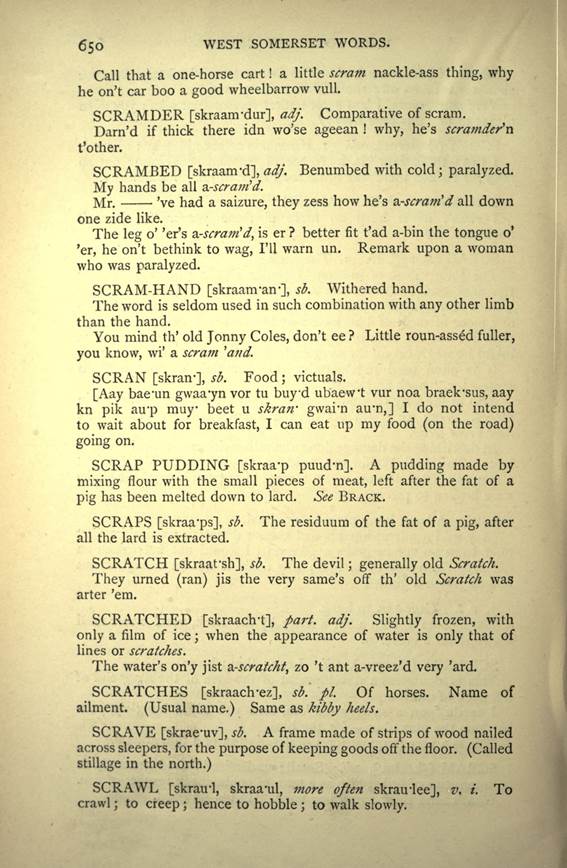
(delwedd B9510) (tudalen 650)
|
650 WEST SOMERSET WORDS.
Call that a one-horse cart! a little scram nackle-ass thing, why he on't car boo a good wheelbarrow vull.
SCRAMDER [skraanvdur], adj. Comparative of scram. Darn'd if thick there idn wo'se ageean!
why, he's scramder'n t'other.
SCRAMBED [skraanrd], adj. Benumbed with cold; paralyzed.
My hands be all a.-scram'd.
Mr. 've had a saizure, they zess how he's Zrscram'd all down
one zide like.
The leg o' 'er's &-scrairid, is er? better fit t'ad a-bin the tongue o' 'er, he on't bethink to wag, I'll warn un.
Remark upon a woman who was paralyzed.
SCRAM-HAND [skraanrair], sb. Withered hand.
The word is seldom used in such combination with any other limb than the hand.
You mind th' old Jonny Coles, don't ee? Little roun-asse'd fuller, you know, wi' a scram 'and.
SCRAN [skrair], sb. Food; victuals.
[Aay bae'un gwaa'yn vor tu buyd ub'aewt vur noa braek'sus, aay kn pik au*p muy beet u skran' gwai'n au'n,]
I do not intend to wait about for
breakfast, I can eat up my food (on the road)
going on.
SCRAP PUDDING [skraa'p puud'n]. A pudding made by mixing flour with the small pieces of meat,
left after the fat of a pig has been
melted down to lard. See BRACK.
SCRAPS [skraa-ps], sb. The residuum of the fat of a pig, after all the lard is extracted.
SCRATCH [skraafsh], sb. The devil; generally old Scratch. They urned (ran) jis the very same's off
th' old Scratch was arter 'em.
SCRATCHED [skraach-t], part. adj. Slightly frozen, with only a film of ice; when the appearance of
water is only that of lines or
scratches.
The water's on'y jist z-scratcht t zo 't ant a-vreez'd very 'ard.
SCRATCHES [skraacrrez], sb. pi. Of horses. Name of ailment. (Usual name.) Same as kibby heels.
SCRAVE [skrae'uv], sb. A frame made of strips of wood nailed across sleepers, for the purpose of keeping
goods off the floor. (Called stillage
in the north.)
SCRAWL [skrairl, skraa'ul, more often skrairlee], v. i. To crawl; to creep; hence to hobble; to walk
slowly.
|
|
|
|
|
ñ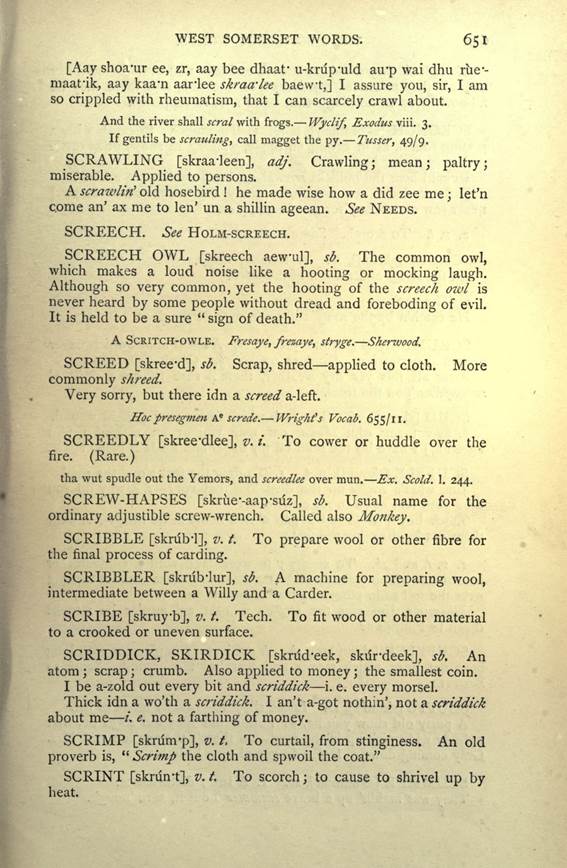
(delwedd B9511) (tudalen 651)
|
WEST
SOMERSET WORDS. 651
[Aay shoa'ur ee, zr, aay bee dhaat' u-krup'uld airp wai dhu rue*-maat'ik, aay
kaa'n aarlee skraa'lee baewt,] I assure you, sir, I am so crippled with rheumatism, that I can
scarcely crawl about.
And the river shall scral with frogs. Wyclif, Exodus viii. 3. If gentils be scrauling, call magget the
py. Tttsser, 49/9.
SCRAWLING [skraa-leen], adj. Crawling; mean; paltry; miserable. Applied to persons.
A scrawlirt old hosebird! he made wise how a did zee me; let'n c.ome an' ax me to len' un a shillin
ageean. See NEEDS.
SCREECH. See HOLM-SCREECH.
SCREECH OWL [skreech aewul], sb. The common owl, which makes a loud noise like a hooting or
mocking laugh. Although so very
common, yet the hooting of the screech owl is
never heard by some people without dread and foreboding of evil. It is held to be a sure” sign of
death."
A SCRITCH-OWLE. Fresaye, frezaye, stryge. Sherwood.
SCREED [skree'd], sb. Scrap, shred applied to cloth. More commonly shreed.
Very sorry, but there idn a screed a-left.
Hoc presegmen A e screde. Wright's Vocab. 655/11.
SCREEDLY [skree'dlee], v.i. To cower or huddle over the fire. (Rare.)
tha wut spudle out the Yemors, and screedlee over mun. Ex. Scold. 1. 244.
SCREW-HAPSES [skrue'-aap-suz], sb. Usual name for the ordinary adjustible screw-wrench. Called
also Monkey.
SCRIBBLE [sknib-1], v. t. To prepare wool or other fibre for the final process of carding.
SCRIBBLER [skriib'lur], sb. A machine for preparing wool, intermediate between a Willy and a Carder.
SCRIBE [skruyb], v. t. Tech. To fit wood or other material to a crooked or uneven surface.
SCRIDDICK, SKIRDICK [sknid'eek, skiirdeek], sb. An atom; scrap; crumb. Also applied to money;
the smallest coin.
I be a-zold out every bit and scriddick i. e. every morsel.
Thick idn a wo'th a scriddick. I an't a-got nothin', not a scriddick about me /. e. not a farthing of money.
SCRIMP [skninrp], v. t, To curtail, from stinginess. An old proverb is,” Scrimp the cloth and spwoil
the coat."
SCRINT [sknirrt], v. t. To scorch; to cause to shrivel up by heat.
|
|
|
|
|
ñ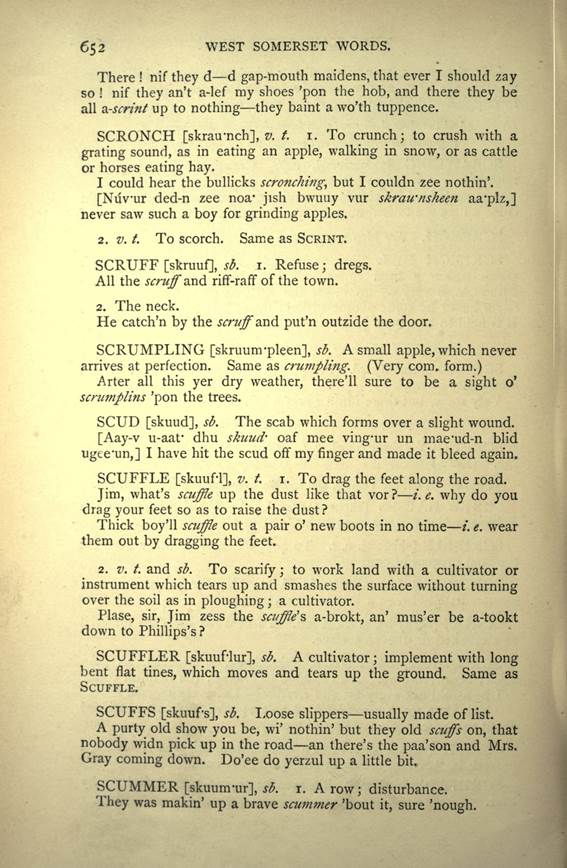
(delwedd B9512) (tudalen 652)
|
652 WEST SOMERSET WORDS.
There! nif they d d gap-mouth maidens, that ever I should zay so! nif they an't a-lef my shoes 'pon the
hob, and there they be all
&-scrint up to nothing they baint a wo'th tuppence.
SCRONCH [skrau-nch], v. t. i. To crunch; to crush with a grating sound, as in eating an apple,
walking in snow, or as cattle or
horses eating hay.
I could hear the bullicks scronching^ but I couldn zee nothin'.
[Niivur ded-n zee noa* jish bwuuy vur skrau'nsheen aa'plz,] never saw such a boy for grinding apples.
2. v. t. To scorch. Same as SCRINT.
SCRUFF [skruuf], sb. i. Refuse; dregs.
All the scruff 'and riff-raff of the town.
2. The neck.
He catch'n by the scruff and put'n outzide the door.
SCRUMPLING [skruunvpleen], sb. A small apple, which never arrives at perfection. Same as crumpling.
(Very com. form.)
Arter all this yer dry weather, there'll sure to be a sight o' scrumplins 'pon the trees.
SCUD [skuud], sb. The scab which forms over a slight wound.
[Aay-v u-aaf dhu skuud' oaf mee ving-ur un mae'ud-n blid
ugee'un,] I have hit the scud off my finger and made it bleed again.
SCUFFLE [skuuf-1], v. t. i. To drag the feet along the road.
Jim, what's scuffle up the dust like that vor? /". e. why do you drag your feet so as to raise the dust?
Thick boy'll scuffle out a pair o' new boots in no time /. e. wear them out by dragging the feet.
2. v. t. and sb. To scarify; to work land with a cultivator or instrument which tears up and smashes the
surface without turning over the soil
as in ploughing; a cultivator.
Plase, sir, Jim zess the scuffle's a-brokt, an' mus'er be a-tookt down to Phillips's?
SCUFFLER [skuuflur], sb. A cultivator; implement with long bent flat tines, which moves and tears up
the ground. Same as SCUFFLE.
SCUFFS [skuuf-s], sb. Loose slippers usually made of list.
A purty old show you be, wi' nothin' but they old scuffs on, that nobody widn pick up in the road an there's
the paa'son and Mrs. Gray coming down.
Do'ee do yerzul up a little bit.
SCUMMER [skuunrur], sb. i. A row; disturbance. They was makin' up a brave scummer 'bout
it, sure 'nough.
|
|
|
|
|
ñ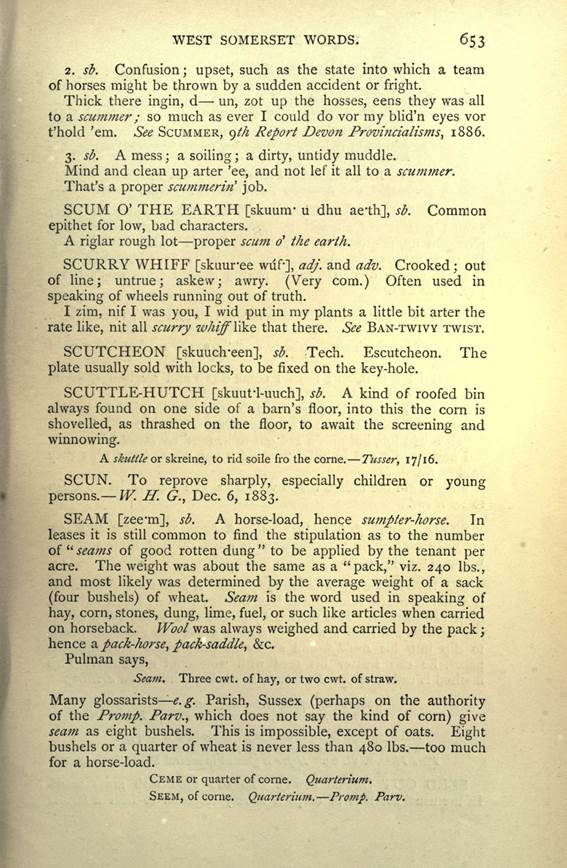
(delwedd B9513) (tudalen 653)
|
WEST
SOMERSET WORDS. 653
2. sb. Confusion; upset, such as the state into which a team of horses might be thrown by a sudden
accident or fright.
Thick there ingin, d un, zot up the hosses, eens they was all to a scummer; so much as ever I could do
vor my blid'n eyes vor t'hold 'em. See
SCUMMER, gth Report Devon Provincialisms, 1886.
3. sb. A mess; a soiling; a dirty, untidy muddle.
Mind and clean up arter 'ee, and not lef it all to a scummer. That's a proper scummenn job.
SCUM O' THE EARTH [skuunv u dhu aeth], sb. Common epithet for low, bad characters.
A riglar rough lot proper scum o* the earth.
SCURRY WHIFF [skuuree wuT], adj. and adv. Crooked; out of line; untrue; askew; awry. (Very com.)
Often used in speaking of wheels
running out of truth.
I zim, nif I was you, I wid put in my plants a little bit arter the rate like, nit all scurry whiff \fa&
that there. See BAN-TWIVY TWIST.
SCUTCHEON [skuuclreen], sb. Tech. Escutcheon. The plate usually sold with locks, to be fixed
on the key-hole.
SCUTTLE-HUTCH [skuufl-uuch], sb. A kind of roofed bin always found on one side of a barn's floor,
into this the corn is shovelled, as
thrashed on the floor, to await the screening and winnowing.
A shuttle or skreine, to rid soile fro the corne. Tusser, 17/16.
SCUN. To reprove sharply, especially children or young persons. W. H. G., Dec. 6, 1883.
SEAM [zee'm], sb. A horse-load, hence sumpter-horse. In leases it is still common to find the stipulation
as to the number of” seams of good
rotten dung” to be applied by the tenant per
acre. The weight was about the same as a "pack," viz. 240
Ibs., and most likely was determined
by the average weight of a sack (four
bushels) of wheat. Seam is the word used in speaking of hay, corn, stones, dung, lime, fuel, or
such like articles when carried on
horseback. Wool was always weighed and carried by the pack; hence a pack-horse, pack-saddle, &c.
Pulman says,
Seam. Three cwt. of hay, or two cwt. of straw.
Many glossarists e. g. Parish, Sussex (perhaps on the authority of the Promp. Parv., which does not say the
kind of corn) give seam as eight
bushels. This is impossible, except of oats. Eight bushels or a quarter of wheat is never less
than 480 Ibs. too much for a
horse-load.
CEME or quarter of corne. Quarterium.
SEEM, of corne. Quarterium. Promp. Parv.
|
|
|
|
|
ñ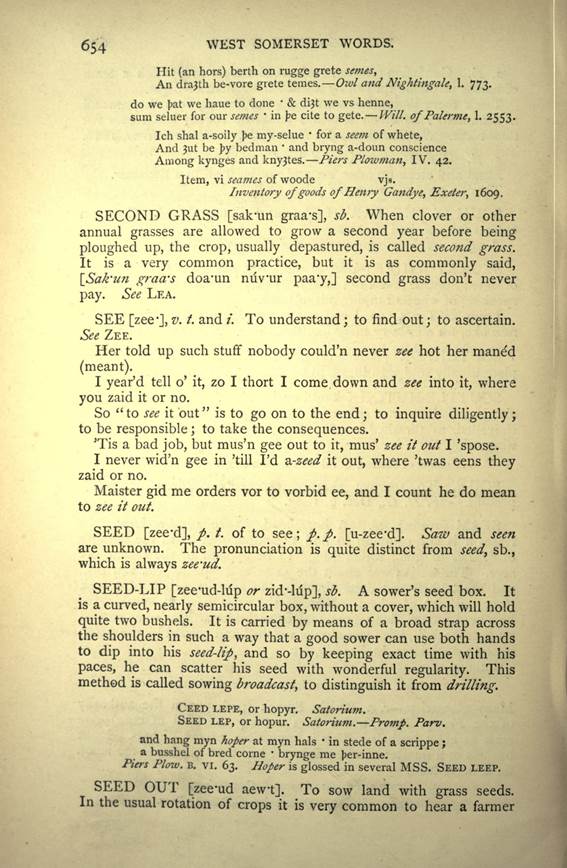
(delwedd B9514) (tudalen 654)
|
654 WEST SOMERSET WORDS.
Hit (an hors) berth on rugge grete semes,
An dra^th be-vore grete temes. Owl and Nightingale, 1. 773.
do we J>at we haue to done ' & di}t we vs henne,
sum seluer for our semes ' in >e cite to gete. Will, of Palerme, 1. 2553.
|
|
|
|
|
ñ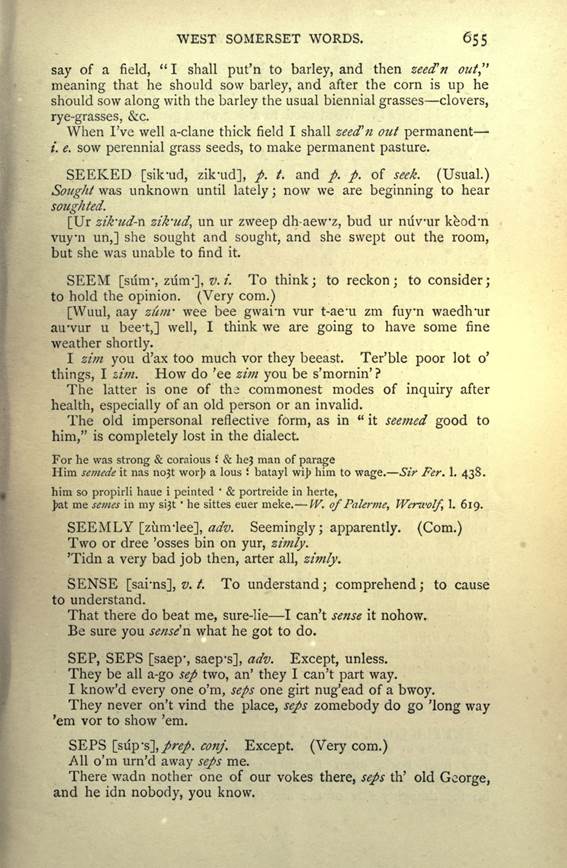
(delwedd B9515) (tudalen 655)
|
Ich shal a-soily J>e my-selue for a seem of
whete, And 3ut be J>y bedman and
bryng a-doun conscience Among kynges
and kny3tes. Piers Plowman, IV. 42.
Item, vi seames of woode vjs.
Inventory of goods of Henry Gandye, Exeter, 1609.
SECOND GRASS [sak'un graa's], sb. When clover or other annual grasses are allowed to grow a second
year before being ploughed up, the
crop, usually depastured, is called second grass. It is a very common practice, but it is as
commonly said, [Sak'un graa's doa'un
nuVur paa'y,] second grass don't never
pay. See LEA.
SEE [zee'], v. t. and /". To understand; to find out; to ascertain. See ZEE.
Her told up such stuff nobody could'n never zee hot her maned (meant).
I year'd tell o' it, zo I thort I come, down and zee into it, where you zaid it or no.
So” to see it but” is to go on to the end; to inquire diligently; to be responsible; to take the
consequences.
'Tis a bad job, but mus'n gee out to it, mus' zee it out I 'spose.
I never wid'n gee in 'till I'd &-zeed it out, where 'twas eens they zaid or no.
Maister gid me orders vor to vorbid ee, and I count he do mean to zee it out.
SEED [zee-d], p. t. of to see; p.p. [u-zee'd]. Saw and seen are unknown. The pronunciation is quite
distinct from seed, sb., which is
always zee'ud.
SEED-LIP [zee-ud-hip or zid'-liip], sb. A sower's seed box. It is a curved, nearly semicircular box,
without a cover, which will hold quite
two bushels. It is carried by means of a broad strap across the shoulders in such a way that a good
sower can use both hands to dip into
his seed-lip, and so by keeping exact time with his paces, he can scatter his seed with
wonderful regularity. This method is
called sowing broadcast, to distinguish it from drilling.
CEED LEPE, or hopyr. Satorium.
SEED LEP, or hopur. Satorium. Promp. Parv.
and hang myn hoper at myn hals * in stede of a scrippe; a busshel of bred corne ' brynge me
|>er-inne. Piers Plow. B. vi. 63.
Hoper is glossed in several MSS. SEED LEEP.
SEED OUT [zee-iid aewt]. To sow land with grass seeds. In the usual rotation of crops it is very
common to hear a farmer
|
|
|
|
|
ñ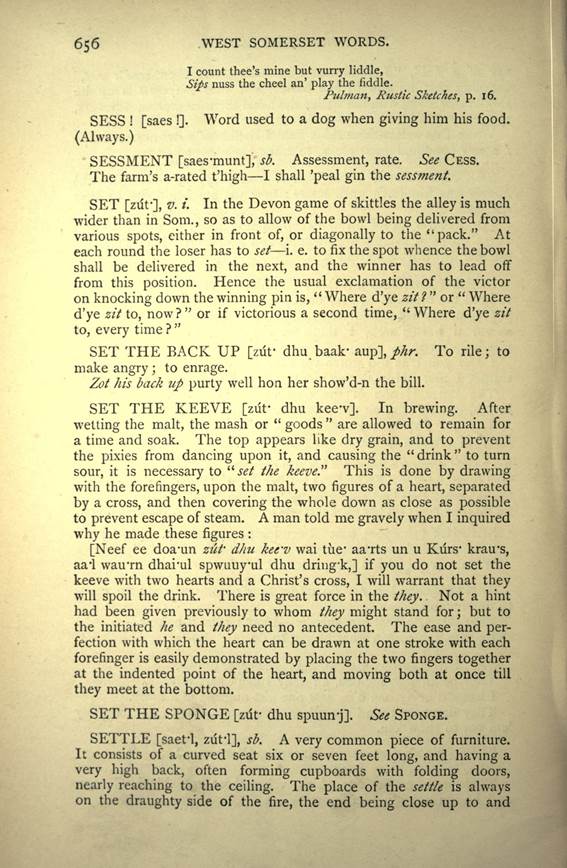
(delwedd B9516) (tudalen 656)
|
WEST SOMERSET WORDS. 655
say of a field, "I shall put'n to barley, and then zeed'n out," meaning that he should sow barley, and
after the corn is up he should sow
along with the barley the usual biennial grasses clovers, rye-grasses, &c.
When I've well a-clane thick field I shall zeed'n out permanent i. e. sow perennial grass seeds, to make
permanent pasture.
SEEKED [sik-ud, zik'ud], p. t. and p. p. of seek. (Usual.) Sought was unknown until lately; now we are
beginning to hear sough ted.
[Ur zik'ud-n. zik'ud, un ur zweep dh-aew'z, bud ur nuvur keod'n vuyn un,] she sought and sought, and she
swept out the room, but she was unable
to find it.
SEEM [sum', ziinr], v. t. To think; to reckon; to consider; to hold the opinion. (Very com.)
[Wuul, aay zunr wee bee gwarn vur t-ae'u zm fuyn waedh'ur au-vur u bee%] well, I think we are going
to have some fine weather shortly.
I zim you d'ax too much vor they beeast. Ter'ble poor lot o' things, I zim. How do 'ee zim you be
s'mornin'?
The latter is one of ths commonest modes of inquiry after health, especially of an old person or an
invalid.
The old impersonal reflective form, as in” it seemed good to him," is completely lost in the
dialect.
For he was strong & coraious i & he} man of parage
Him semede it nas no^t worj) a lous ' batayl wij> him to wage. Sir Fer. 1.
438.
him so propirli haue i peinted ' & portreide in herte,
Jjat me semes in my 5131 ' he sittes euer meke. W. of Paler me, Werwolf, 1.
619.
SEEMLY [zum "lee], adv. Seemingly; apparently. (Com.) Two or dree 'osses bin on yur, zimly. 'Tidn a very bad job then, arter all,
zimly.
SENSE [sai'ns], v. t. To understand; comprehend; to cause to understand.
That there do beat me, sure-lie I can't sense it nohow. Be sure you sensed what he got to do.
SEP, SEPS [saep', saep's], adv. Except, unless. They be all a-go sep two, an' they I can't
part way. I know'd every one o'm, seps
one girt nug'ead of a bwoy. They never
on't vind the place, seps zomebody do go 'long way 'em vor to show 'em.
SEPS [sup 's\)prep. conj. Except. (Very com.)
All o'm urn'd away seps me.
There wadn nother one of our vokes there, seps th' old George, and he idn nobody, you know.
|
|
|
|
|
ñ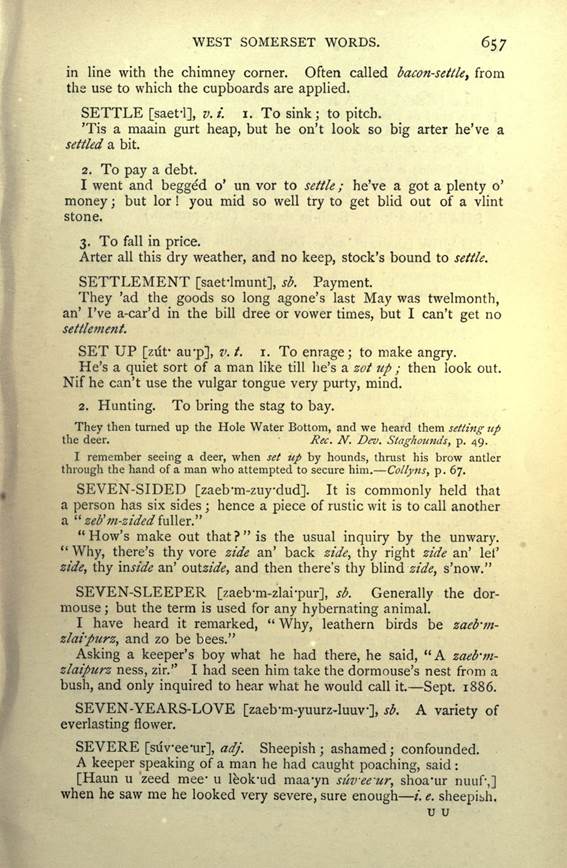
(delwedd B9517) (tudalen 657)
|
656 WEST SOMERSET WORDS.
I count thee's mine but vurry liddle,
Sips nuss the cheel an' play the fiddle.
Pu/man t Rustic Sketches, p. 16.
SESS! [saes!]. Word used to a dog when giving him his food. (Always.)
SESSMENT [saes-munt], sb. Assessment, rate. See CESS. The farm's a-rated t'high I shall 'peal gin
the sessment.
SET [ziit-], v. i. In the Devon game of skittles the alley is much wider than in Som., so as to allow of the
bowl being delivered from various
spots, either in front of, or diagonally to the "pack." At each round the loser has to set i. e. to
fix the spot whence the bowl shall be
delivered in the next, and the winner has to lead off from this position. Hence the usual
exclamation of the victor on knocking
down the winning pin is, "Where d'ye zit?" or” Where d'ye zitto, now?" or if victorious a
second time, "Where d'ye zit to,
every time?”
SET THE BACK UP [zuf dhu baak' aup], phr. To rile; to make angry; to enrage.
Zot his back up purty well hon her show'd-n the bill.
SET THE KEEVE [ziif dhu kee'v]. In brewing. After wetting the malt, the mash or” goods” are
allowed to remain for a time and soak.
The top appears like dry grain, and to prevent the pixies from dancing upon it, and
causing the "drink" to turn
sour, it is necessary to” set the keeve" This is done by
drawing with the forefingers, upon the
malt, two figures of a heart, separated
by a cross, and then covering the whole down as close as possible to prevent escape of steam. A man told me
gravely when I inquired why he made
these figures:
[Neef ee doa'un zut' dhu kee'v wai tiie* aa'rts un u Kiirs* krau's, aai wau'rn dhai'ul spwuuyul dhu dring'k,]
if you do not set the keeve with two
hearts and a Christ's cross, I will warrant that they will spoil the drink. There is great force
in the they. Not a hint had been given
previously to whom they might stand for; but to the initiated he and they need no
antecedent. The ease and perfection with which the heart can be drawn at one
stroke with each forefinger is easily
demonstrated by placing the two fingers together at the indented point of the heart, and
moving both at once till they meet at
the bottom.
SET THE SPONGE [zuf dhu spumrj]. See SPONGE.
SETTLE [saefl, zuf 1], sb. A very common piece of furniture. It consists of a curved seat six or seven
feet long, and having a very high
back, often forming cupboards with folding doors, nearly reaching to the ceiling. The place
of the settle is always on the
draughty side of the fire, the end being close up to and
|
|
|
|
|
ñ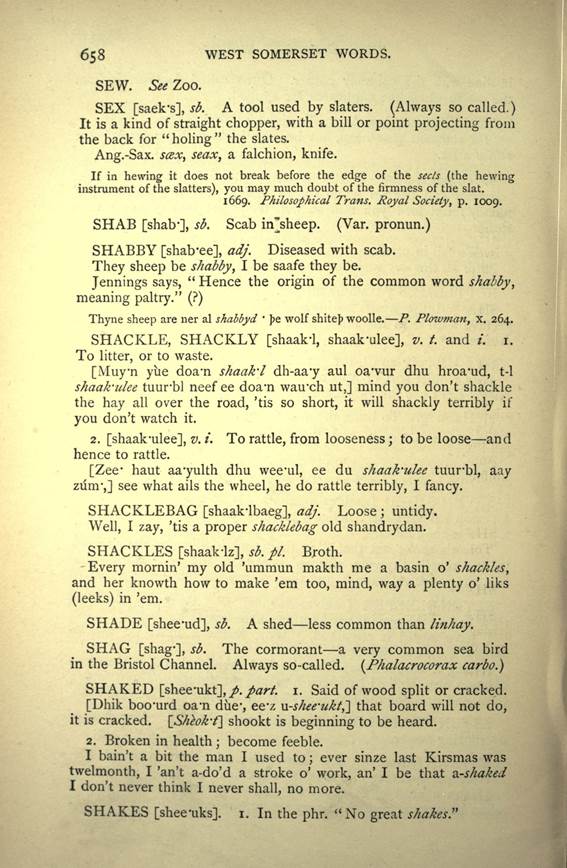
(delwedd B9518) (tudalen 658)
|
WEST SOMERSET WORDS. 657
in line with the chimney corner. Often called bacon-settle, from the use to which the cupboards are applied.
SETTLE [saet-1], v.i. i. To sink; to pitch.
'Tis a maain gurt heap, but he on't look so big arter he've a settled a bit.
2. To pay a debt.
I went and begge'd o' un vor to settle; he've a got a plenty o' money; but lor! you mid so well try to get
blid out of a vlint stone.
3. To fall in price.
Arter all this dry weather, and no keep, stock's bound to settle.
SETTLEMENT [saeflmunt], sb. Payment.
They 'ad the goods so long agone's last May was twelmonth, an' I've a-car'd in the bill dree or vower
times, but I can't get no settlement.
SET UP [ziif au-p], v. t. i. To enrage; to make angry. He's a quiet sort of a man like till he's a
zot up; then look out. Nif he can't
use the vulgar tongue very purty, mind.
2. Hunting. To bring the stag to bay.
They then turned up the Hole Water Bottom, and we heard them setting iip the deer. Rec. N. Dev. Staghounds, p. 49.
I remember seeing a deer, when set up by hounds, thrust his brow antler through the hand of a man who attempted to
secure him. Collyns, p. 67.
SEVEN-SIDED [zaeb'm-zuydud]. It is commonly held that a person has six sides; hence a piece of
rustic wit is to call another a
"zeb'm-ztded fuller."
" How's make out that?” is the usual inquiry by the unwary. “Why,
there's thy vore zide an' back zide, thy right zide an' let' zide, thy mside an' outeftfc, and then
there's thy blind zide, s'now."
SEVEN-SLEEPER [zaeb'm-zlai-pur], sb. Generally
the dormouse; but the term is used for any hybernating animal.
I have heard it remarked,” Why, leathern birds be zaeb'm-zlai'purz, and zo be
bees."
Asking a keeper's boy what he had there, he said, "A zaeb'm-zlaipurz
ness, zir." I had seen him take the dormouse's nest from a bush, and only inquired to hear what he
would call it. Sept. 1886.
SEVEN-YEARS-LOVE [zaeb'm-yuurz-luuv], sb. A variety of everlasting flower.
SEVERE [siivee-ur], adj. Sheepish; ashamed; confounded. A keeper speaking of a man he had caught
poaching, said: [Haun u zeed mee* u
leok'tid maa'yn s&vee'ur, shoa'ur nuuf*,]
when he saw me he looked very severe, sure enough /. e. sheepibh.
u u
|
|
|
|
|
ñ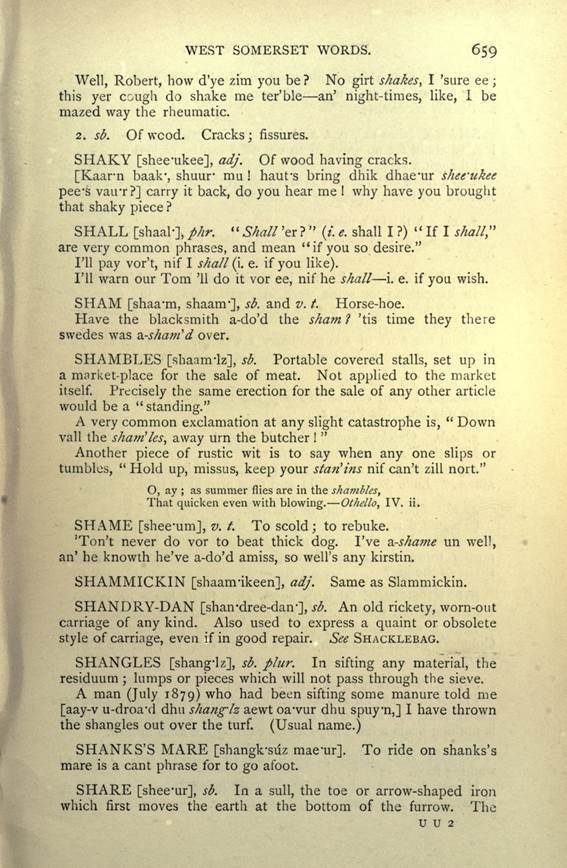
(delwedd B9519) (tudalen 659)
|
658 WEST SOMERSET WORDS.
SEW. See Zoo.
SEX [sack's], sb. A tool used by slaters. (Always so called.) It is a kind of straight chopper, with a
bill or point projecting from the back
for” holing” the slates.
Ang.-Sax. s<zx> seax, a falchion, knife.
If in hewing it does not break before the edge of the sects (the hewing instrument of the slatters), you may much
doubt of the firmness of the slat.
1669. Philosophical Trans. Royal Society, p. 1009.
SHAB [shab'], sb. Scab irf sheep. (Var. pronun.)
SHABBY [shab-ee], adj. Diseased with scab.
They sheep be shabby, I be saafe they be.
Jennings says,” Hence the origin of the common word shabby, meaning paltry." (?)
Thyne sheep are ner al shabbyd ' ]>e wolf shite]) woolle. P. Plowman, x.
264.
SHACKLE, SHACKLY [shaak'l, shaak'ulee], v. t. and /. i. To litter, or to waste.
[Muyn yue doa*n shaak'l dh-aa'y aul oa'vur dhu hroa'ud, t-1 shaak'ulee tuurbl neef ee doa'n wau'ch ut,]
mind you don't shackle the hay all
over the road, 'tis so short, it will shackly terribly if you don't watch it.
2. [shaak'ulee], v. i. To rattle, from looseness; to be loose and hence to rattle.
[Zee* haut aa'yulth dhu wee'ul, ee du shaak'ulee tuur'bl, aay ziirrr,] see what ails the wheel, he do
rattle terribly, I fancy.
SHACKLEBAG [shaak'lbaeg], adj. Loose; untidy.
Well, I zay, 'tis a proper shacklebag old shandrydan.
SHACKLES [shaak-lz], sb. pi. Broth.
Every mornin' my old 'ummun makth me a basin o' shackles, and her knowth how to make 'em too, mind,
way a plenty o' liks (leeks) in 'em.
SHADE [shee-ud], sb. A shed less common than linhay.
SHAG [shag'], sb. The cormorant a very common sea bird in the Bristol Channel. Always so-called.
{Phalacrocorax carbo.}
SHAKED [shee-ukt], /. part. i. Said of wood split or cracked. [Dhik boo'urd oa'n due', ee'z \\-shee'
ukt,~\ that board will not do, it is
cracked. \ - Shtok-f\ shookt is beginning to be heard.
2. Broken in health; become feeble.
I bain't a bit the man I used to; ever sinze last Kirsmas was twelmonth, I 'an't a-do'd a stroke o' work,
an' I be that &-shaked I don't
never think I never shall, no more.
SHAKES [shee-uks]. i. In the phr. "No great shakes."
|
|
|
|
|
ñ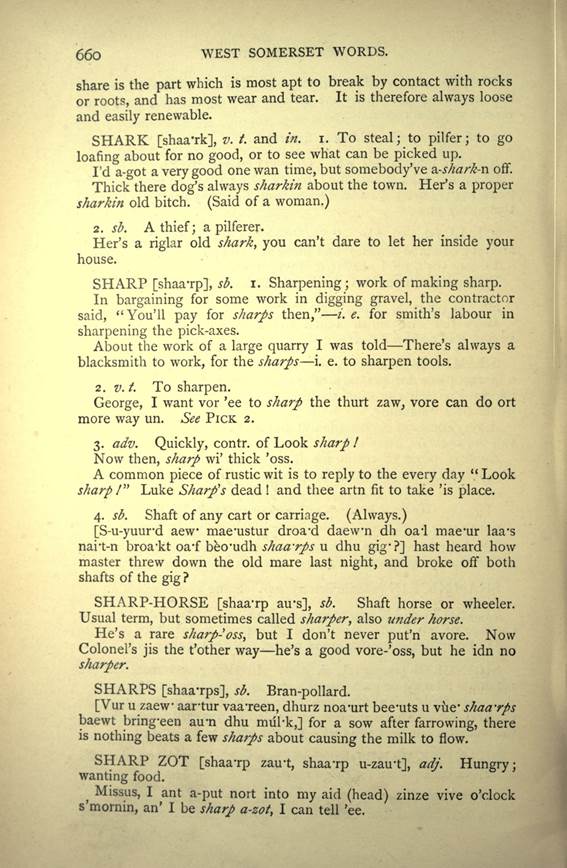
(delwedd B9520) (tudalen 660)
|
WEST
SOMERSET WORDS. 659
Well, Robert, how d'ye zim you be? No girt shakes, I 'sure ee; this yer cough do shake me ter'ble an'
night-times, like, I be mazed way the
rheumatic.
2. sb. Ofwcod. Cracks; fissures.
SHAKY [shee'ukee], adj. Of wood having cracks.
[Kaarn baak', shuur mu! haufs bring dhik dhae'ur shee'ukee pee's vairr?] carry it back, do you hear
me! why have you brought that shaky
piece?
SHALL [shaal-], phr. "Shall 'er?” (/. e. shall I?)” If I shall? are very common phrases, and mean "if
you so desire." I'll pay vor't,
nif I shall (\. e. if you like). I'll
warn our Tom '11 do it vor ee, nif he shall i. e. if you wish.
SHAM [shaa-m, shaanr], sb. and v. t. Horse-hoe. Have the blacksmith a-do'd the sham? 'tis
time they there swedes was a-shani'd
over.
SHAMBLES [sbaanrlz], sb. Portable covered stalls, set up in a market-place for the sale of meat. Not
applied to the market itself.
Precisely the same erection for the sale of any other article would be a "standing."
A very common exclamation at any slight catastrophe is,” Down vail the shanties, away urn the butcher!”
Another piece of rustic wit is to say when any one slips or tumbles,” Hold up, missus, keep your
stariins nif can't zill nort."
O, ay; as summer flies are in the shambles,
That quicken even with blowing. Othello, IV. ii.
SHAME [shee-umj, v. t. To scold; to rebuke.
'Ton't never do vor to beat thick dog. I've %.-shame un well, an' he knowth he've a-do'd amiss, so well's
any kirstin.
SHAMMICKIN [shaanrikeen], adj. Same as Slammickin.
SHANDRY-DAN [shan-dree-darr], sb. An old rickety, worn-out carnage of any kind. Also used to express a
quaint or obsolete style of carriage,
even if in good repair. See SHACKLEBAG.
SH ANGLES [shang'lz], sb. plur. In sifting any material, the residuum; lumps or pieces which will not
pass through the sieve.
A man (July 1879) who had been sifting some manure told me [aay-v u-droa'd dhu shang'lz aewt oa'vur
dhu spuyn,] I have thrown the shangles
out over the turf. (Usual name.)
SHANK S'S MARE [shangk'suz mae'ur]. To ride on shanks's mare is a cant phrase for to go afoot.
SHARE [shee-ur], sb. In a sull, the toe or arrow-shaped iron which first moves the earth at the bottom
of the furrow. The
u u 2
|
|
|
|
|
ñ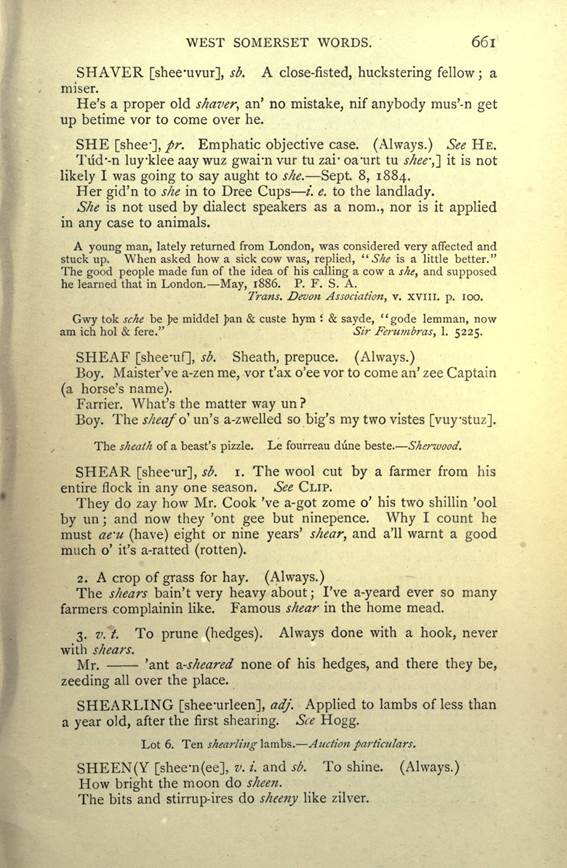
(delwedd B9521) (tudalen 661)
|
660 WEST SOMERSET WORDS.
share is the part which is most apt to break by contact with rocks or roots, and has most wear and tear. It is
therefore always loose and easily
renewable.
SHARK [shaa'rk], v. t. and in. i. To steal; to pilfer; to go loafing about for no good, or to see what
can be picked up.
I'd a-got a very good one wan time, but somebody've &-shark-n off.
Thick there dog's always sharkin about the town. Her's a proper sharkin old bitch. (Said of a woman.)
2. sb. A thief; a pilferer.
Her's a riglar old shark, you can't dare to let her inside your house.
SHARP [shaa-rp], sb. i. Sharpening; work of making sharp.
In bargaining for some work in digging gravel, the contractor said, "You'll pay for sharps
then," /. e. for smith's labour in
sharpening the pick-axes.
About the work of a large quarry I was told There's always a blacksmith to work, for the sharps i. e. to
sharpen tools.
2. v. t. To sharpen.
George, I want vor 'ee to sharp the thurt zaw, vore can do ort more way un. See PICK 2.
3. adv. Quickly, contr. of Look sharp!
Now then, sharp wi' thick 'oss.
A common piece of rustic wit is to reply to the every day” Look sharp /" Luke Sharp's dead! and thee
artn fit to take 'is place.
4. sb. Shaft of any cart or carriage. (Always.)
[S-u-yuurd aew mae'ustur droa-d daewn dh oai mae'ur laa's nai't-n broa'kt oa'f beo'udh shaa'rps u dhu
gig'?] hast heard how master threw
down the old mare last night, and broke off both shafts of the gig?
SHARP-HORSE [shaa'rp airs], sb. Shaft horse or wheeler. Usual term, but sometimes called sharper,
also under horse.
He's a rare sharp- 'oss, but I don't never put'n avore. Now Colonel's jis the t'other way he's a good
vore-'oss, but he idn no sharper.
SHARPS [shaa-rps], sb. Bran-pollard.
[Vur u zaew aartur vaa'reen, dhurz noa'urt bee'uts u vue' shaa'rps baewt bring-een au'n dhu miil-k,] for a sow
after farrowing, there is nothing
beats a few sharps about causing the milk to flow.
SHARP ZOT [shaa'rp zairt, shaa'rp u-zairt], adj. Hungry; wanting food.
^ Missus, I ant a-put nort into my aid (head) zinze vive o'clock s'mornin, an' I be sharp a-zot, I can tell
'ee.
|
|
|
|
|
ñ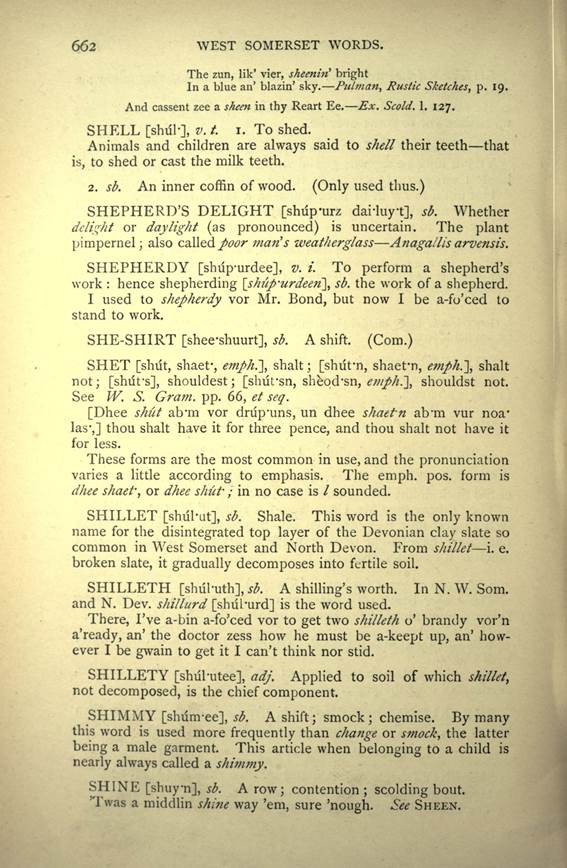
(delwedd B9522) (tudalen 662)
|
WEST SOMERSET WORDS. 66l
SHAVER [shee'uvur], sb. A close-fisted, huckstering fellow; a miser.
He's a proper old shaver, an' no mistake, nif anybody mus'-n get up betime vor to come over he.
SHE [shee ],//-. Emphatic objective case. (Always.) See HE.
Tiid'-n luyklee aay wuz gwai'n vur tu zar oa'urt tu shee-,~\ it is not likely I was going to say aught to she.
Sept. 8, 1884.
Her gid'n to she in to Dree Cups /". e. to the landlady.
She is not used by dialect speakers as a nom., nor is it applied in any case to animals.
A young man, lately returned from London, was considered very affected
and stuck up. When asked how a sick
cow was, replied, "She is a little better." The good people made fun of the idea of his
calling a cow a she, and supposed he
learned that in London. May, 1886. P. F. S. A.
Trans. Devon Association, v. xvill. p. 100.
Gwy tok sche be ]>e middel ]>an & custe hym i & sayde,
"gode lemman, now am ich hoi
& fere." Sir Ferumbras, 1. 5225.
SHEAF [shee-uf], sb. Sheath, prepuce. (Always.) Boy. Maister've a-zen me, vor t'ax o'ee vor
to come an' zee Captain (a horse's
name).
Farrier. What's the matter way un?
Boy. The sheaf Q un's a-zwelled so big's my two vistes [vuystuz].
The sheath of a beast's pizzle. Le fourreau dune beste. Sherwood.
SHEAR [sheemr], sb. i. The wool cut by a farmer from his entire flock in any one season. See CLIP.
They do zay how Mr. Cook 've a-got zome o' his two shillin 'ool by un; and now they 'ont gee but ninepence.
Why I count he must ae'u (have) eight
or nine years' shear, and a'll warnt a good
much o' it's a-ratted (rotten).
2. A crop of grass for hay. (Always.)
The shears bain't very heavy about; I've a-yeard ever so many farmers complainin like. Famous shear in
the home mead.
3. v. t. To prune (hedges). Always done with a hook, never with shears.
Mr. 'ant ^-sheared none of his hedges, and there they be,
zeeding all over the place.
SHEARLING [shee'urleen], adj. Applied to lambs of less than a year old, after the first shearing. See
Hogg.
Lot 6. Ten shtarling\&T[fo&. Auction particulars.
SHEEN (Y [shee-n(ee], v. i. and sb. To shine. (Always.)
How bright the moon do sheen.
The bits and stirrup-ires do sheeny like zilver.
|
|
|
|
|
ñ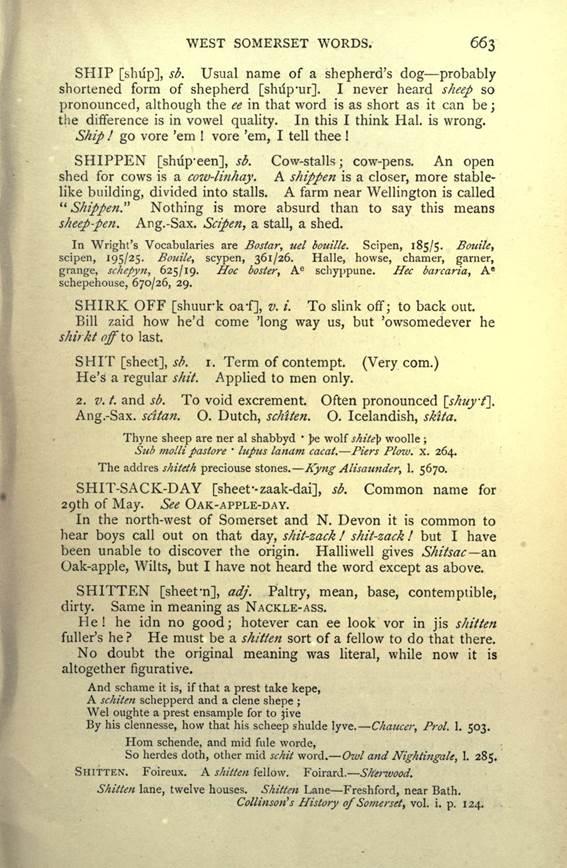
(delwedd B9523) (tudalen 663)
|
662 WEST SOMERSET WORDS.
The zun, lik' vier, shtenitf bright
In a blue an' blazin' sky. Pulman, Rustic Sketches, p. 19.
And cassent zee a sheen in thy Reart Ee. Ex. Scold. 1. 127.
SHELL [shuT], v. t. i. To shed.
Animals and children are always said to shell their teeth that is, to shed or cast the milk teeth.
2. sb. An inner coffin of wood. (Only used thus.)
SHEPHERD'S DELIGHT [shiip'urz darluyt], sb. Whether delight or daylight (as pronounced) is
uncertain. The plant pimpernel; also
called poor man's weatherglass Anagallis arvensis.
SHEPHERDY [shiip-urdee], v. i. To perform a shepherd's work: hence shepherding \shup'urdeen\ sb.
the work of a shepherd.
I used to shepherdy vor Mr. Bond, but now I be a-fo'ced to stand to work.
SHE-SHIRT [shee-shuurt], sb. A shift. (Com.)
SHET [shut, shaet-, emph.], shalt; [shiifn, shaef n, emph.\ shalt not; [shut's], shouldest; [shuf sn,
sheod'sn, emph.~\, shouldst not. See
W. S. Gram. pp. 66, et seq.
[Dhee shut ab'm vor dnip'uns, un dhee shaet- n ab'm vur noa' las',] thou shalt have it for three pence,
and thou shalt not have it for less.
These forms are the most common in use, and the pronunciation varies a little according to emphasis. The
emph. pos. form is dJiee shaet') or
dhee shut"; in no case is / sounded.
SHILLET [shul'ut], sb. Shale. This word is the only known name for the disintegrated top layer of the
Devonian clay slate so common in West
Somerset and North Devon. From shillet i. e.
broken slate, it gradually decomposes into fertile soil.
SHILLETH [shiil'uth], sb. A shilling's worth. In N. W. Som. and N. Dev. shillurd [shuTurd] is the word
used.
There, I've a-bin a-fo'ced vor to get two shilleth o' brandy vor'n a' ready, an' the doctor zess how he must
be a-keept up, an' however I be gwain to get it I can't think nor stid.
SHILLETY [shuTutee], adj. Applied to soil of which shillet, not decomposed, is the chief component.
SHIMMY [shunree], sb. A shift; smock; chemise. By many this word is used more frequently than
change or smock, the latter being a
male garment. This article when belonging to a child is nearly always called a shimmy.
SHINE [shuyn], sb. A row; contention; scolding bout. T\vas a middlin shine way 'em, sure 'nough.
See SHEEN.
|
|
|
|
|
ñ
(delwedd B9524) (tudalen 664)
|
WEST
SOMERSET WORDS. 663
SHIP [shiip], sb. Usual name of a shepherd's dog probably shortened form of shepherd [shiip'ur]. I
never heard sheep so pronounced,
although the ee in that word is as short as it can be; the difference is in vowel quality. In this
I think Hal. is wrong.
Ship! go vore 'em! vore 'em, I tell thee!
SHIPPEN [shiip-een], sb. Cow-stalls; cow-pens. An open shed for cows is a coiv-linhay. A shippen
is a closer, more stable-like building, divided into stalls. A farm near
Wellington is called
"Shippen" Nothing is more absurd than to say this means sheep-pen. Ang.-Sax. Scipen, a stall, a
shed.
In Wright's Vocabularies are Bostar, uel bouille. Scipen, 185/5. Bouile, scipen, 195/25. Bouile, scypen, 361/26.
Halle, howse, chamer, garner, grange,
schepyn, 625/19. Hoc boster, A e schyppune. Hec barcaria, A e schepehouse, 670/26, 29.
SHIRK OFF [shuurk oaf], v. L To slink off; to back out. Bill zaid how he'd come 'long way us, but
'owsomedever he shit kt off to last.
SHIT [sheet], sb. i. Term of contempt. (Very com.) He's a regular shit. Applied to men only.
2. v. t. and sb. To void excrement. Often pronounced \ - shuyf}. Ang.-Sax. scitan. O. Dutch, schtten. O.
Icelandish, skita.
Thyne sheep are ner al shabbyd ' )>e wolf shite\ woolle; Sub molli pastors ' hipus lanam cacat.
Piers Plow. x. 264.
The addres shiteth preciouse stones. Kyng Alisaunder, 1. 5670.
SHIT-SACK-DAY [sheet --zaak-dai], sb. Common name for 29th of May. See OAK-APPLE-DAY.
In the north-west of Somerset and N. Devon it is common to hear boys call out on that day, shit-zack!
shit-zack! but I have been unable to
discover the origin. Halliwell gives Shitsac2j\ Oak-apple, Wilts, but I have not heard the
word except as above.
SHITTEN [sheet -n], adj. Paltry, mean, base, contemptible, dirty. Same in meaning as NACKLE-ASS.
He! he idn no good; hotever can ee look vor in jis shitten fuller's he? He must be a shitten sort of a
fellow to do that there.
No doubt the original meaning was literal, while now it is altogether figurative.
And schame it is, if that a prest take kepe,
A schiten schepperd and a clene shepe;
Wei oughte a prest ensample for to jive
By his clennesse, how that his scheep shulde lyve. Chaucer, Pro!. 1.
503. Horn schende, and mid fule worde,
So herdes doth, other mid schit word. Owl and Nightingale, 1. 285. SHITTEN. Foireux. A shitten fellow.
Foirard. Sherwood.
Shitten lane, twelve houses. Shitten Lane Freshford, near Bath.
CoMnson's History of Somerset, vol. i. p. 124.
|
|
|
|
|
ñ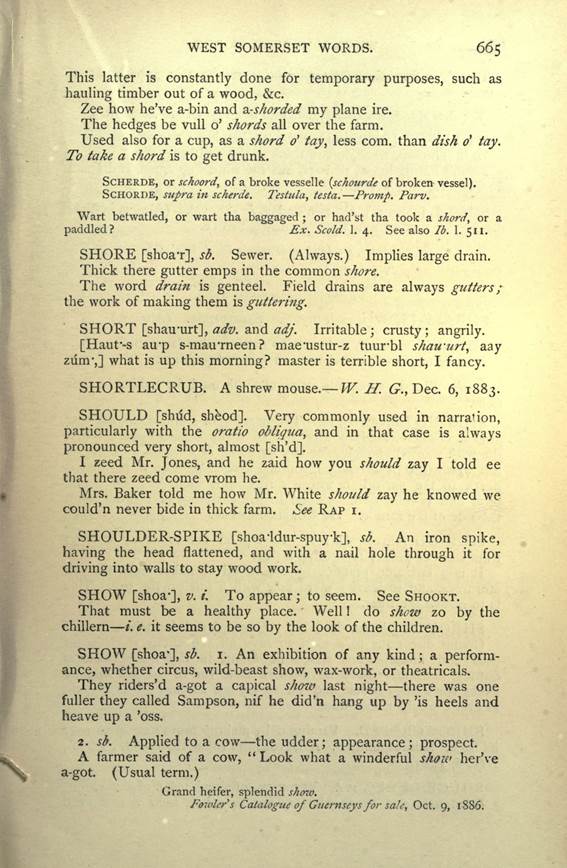
(delwedd B9525) (tudalen 665)
|
664 WEST SOMERSET WORDS.
SHITVIRE [sheefvuyur], sb. Term for an overbearing, quarrelsome bully; a very passionate man.
Never used for a woman, for whom
spitfire is the equivalent.
[Aay kyaa-lz ee'upraup-ur sheet'vuyur,~\ I calls he a proper bully.
SHIVE [shuyv], sb. A large slice or piece; a round off a loaf.
'Tis winderful hot they chillern'll put away, let 'em have it. 'Tidn 'boo quarter nower agone I gid 'em a
skive o' burd'n butter apiece, and now
they be jis the very same's off they was starvin'.
That he assayes knelande on kne,
\}Q keruer hym parys a schyuer so fre. Boke of Curtasye, 1. 691.
SHOD [shaud-], v. t. To spill. (Always.) P. t. [shaud'], /. /. [u-shaud'].
Tommy, mind you don't shod it, else father'll sure to leather 'ee.
There, now, I told 'ee you'd shod it, and now you've a-bin an' tor'd the pitcher too! Never cry arter shod
milk.
But Tiny winc'd, and Tiny hunch'd,
An' Tiny cock'd her nose, An' Tiny
upsot the pail also
An' shaud the milk auver his hose. Pulman, R. Sk. p. 30.
SHOE A COLT [sheo- u koa'lt]. To cause to pay colt-ale, or the fine customary on first entering an
employment.
Jim, they be gwain to shoe a colt up to th' old Phil's, umbye night; we mid so well g'in an' have some o'
it.
SHOEMAKERS [shue-maek-urz], sb. The water-bugs which dart about on the surface. (Always.)
SHOOKT [sheo-kt],/. /. and/./, of to shake [shee-uk, sheo'kt, u-sheo'kt].
[Mae-ustur shoa'th-z-au'f u wuz u-sheo'kt maa'ynlee,] master looks as though he were much shaken /. e. broken
in health.
This form is used in Sussex (see Parish], butrnot in this district, in the sense of split. See SHARED. In the
ordinary lit. sense both shee'ukt and
sheo'kt are used.
SHOOT. See SHUT.
SHOP [shaup], sb. Any room where any work or business is done, not necessarily selling, as vlex
shop, raw-piece shop, tendin' shop,
press shop, smith's shop.
SHOP-GOODS [shaup'-geo-dz], sb. Grocery rarely drapery. He d'outride vor Mr. Honmball, zellin'
crockery and shop-goods an' that.
Grocery only is here meant. Comp. Dairy-goods.
SHORD [shairurd, shoa'urd], sb. and v. t. Broken crockery; a notch in a knife or any cutting
instrument; a gap in a hedge. A large
gap made for a cart to pass is called a gate-sherd^, v.).
|
|
|
|
|
ñ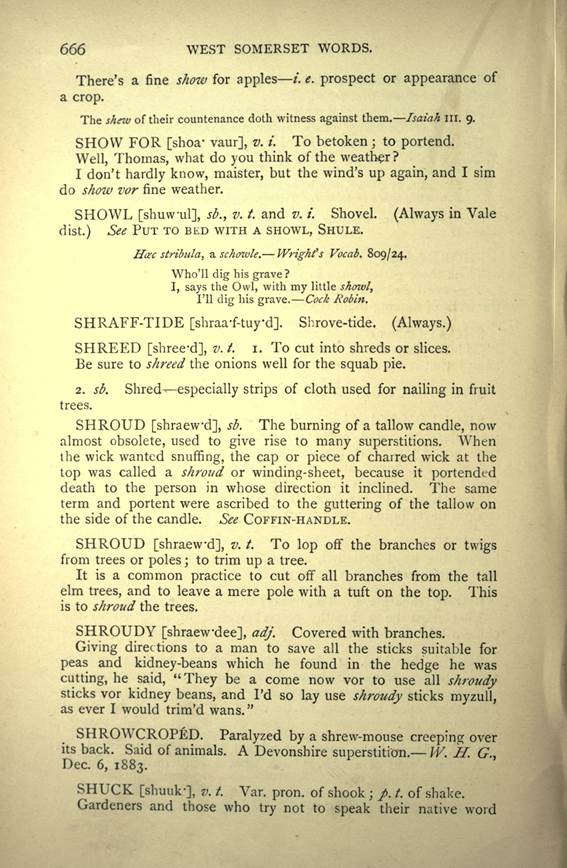
(delwedd B9526) (tudalen 666)
|
WEST
SOMERSET WORDS. 665
This latter is constantly done for temporary purposes, such as hauling timber out of a wood, &c.
Zee how he've a-bin and &-shorded my plane ire.
The hedges be vull o' shords all over the farm.
Used also for a cup, as a shord d 1 toy, less com. than dish o' tay. To take a shord is to get drunk.
SCHERDE, or sckoord, of a broke vesselle (schourde of broken vessel). SCHORDE, supra in scherde. Testula, testa.
Promp. Parv.
Wart betwatled, or wart tha baggaged; or had'st tha took a shord, or a paddled? Ex. Scold. 1. 4. See also Ib. 1.
511.
SHORE [shoa'r], sb. Sewer. (Always.) Implies large drain. Thick there gutter emps in the common
shore. The word drain is genteel.
Field drains are always gutters; the
work of making them is guttering.
SHORT [shairurt], adv. and adj. Irritable; crusty; angrily. [Hauf-s au'p s-mau'rneen? mae'ustur-z
tuurbl shau'urt^ aay ztinr,] what is
up this morning? master is terrible short, I fancy.
SHORTLECRUB. A shrew mouse. W. H. G., Dec. 6, 1883.
SHOULD [shiid, sheod]. Very commonly used in narration, particularly with the oratio obliqua, and
in that case is always pronounced very
short, almost [sh'd].
I zeed Mr. Jones, and he zaid how you should zay I told ee that there zeed come vrom he.
Mrs. Baker told me how Mr. White should zay he knowed we could'n never bide in thick farm. See RAP
i.
SHOULDER-SPIKE [shoa-ldur-spuyk], sb. An iron spike, having the head flattened, and with a nail
hole through it for driving into walls
to stay wood work.
SHOW [shoa'J, v, i. To appear; to seem. See SHOOKT. That must be a healthy place. Well! do show
zo by the chillern i. e. it seems to
be so by the look of the children.
SHOW [shoa % ], sb. i. An exhibition of any kind; a performance, whether
circus, wild-beast show, wax-work, or theatricals.
They riders'd a-got a capical show last night there was one fuller they called Sampson, nif he did'n
hang up by 'is heels and heave up a
'oss.
2. sb. Applied to a cow the udder; appearance; prospect. A farmer said of a cow,” Look what a
winderful show her've a-got. (Usual
term.)
Grand heifer, splendid s/ww.
Fowler's Catalogue of Guernseys for sale, Oct. 9, 1886.
|
|
|
|
|
ñ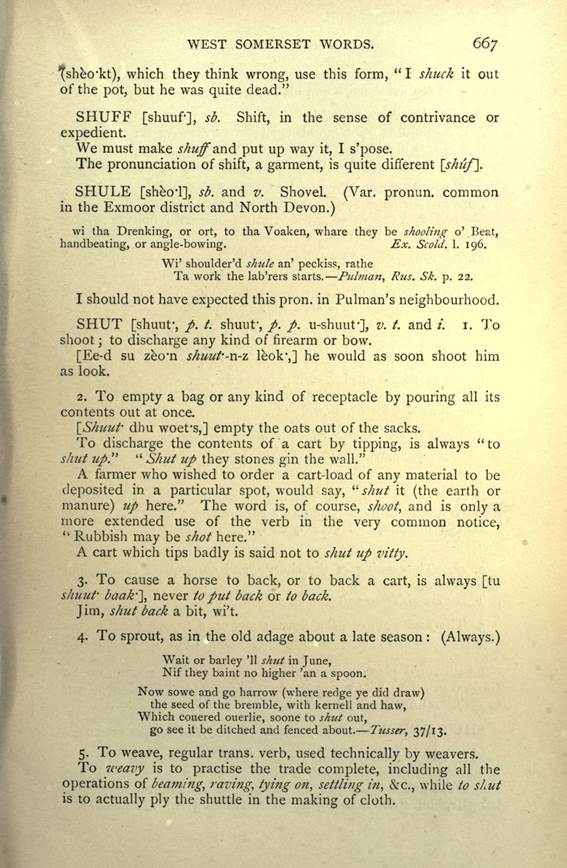
(delwedd B9527) (tudalen 667)
|
666 WEST SOMERSET WORDS.
There's a fine show for apples/, e. prospect or appearance of a crop.
The shew of their countenance doth witness against them. Isaiah HI. 9.
SHOW FOR [shoa- vaur], v. i. To betoken; to portend. Well, Thomas, what do you think of the
weather? I don't hardly know, maister,
but the wind's up again, and I sim do
show vor fine weather.
SHOWL [shuwul], sb. 9 v. t. and v. /'. Shovel. (Always in Vale dist.) See PUT TO BED WITH A SHOWL, SHULE.
Hcec stribula, a schowle. Wright's Vocab. 809/24.
Who'll dig his grave? I, says the Owl,
with my little showl, I'll dig his
grave. Cock Robin.
SHRAFF-TIDE [shraa-f-tuyd]. Shrove-tide. (Always.)
SHREED [shree'd], v. t, i. To cut into shreds or slices. Be sure to shreed the onions well for the
squab pie.
2. sb. Shred-' especially strips of cloth used for nailing in fruit trees.
SHROUD [shraewd], sb. The burning of a tallow candle, now almost obsolete, used to give rise to many
superstitions. When the wick wanted
snuffing, the cap or piece of charred wick at the top was called a shroud or winding-sheet,
because it portended death to the
person in whose direction it inclined. The same term and portent were ascribed to the
guttering of the tallow on the side of
the candle. See COFFIN-HANDLE.
SHROUD [shraewd], v. t. To lop off the branches or twigs from trees or poles; to trim up a tree.
It is a common practice to cut off all branches from the tall elm trees, and to leave a mere pole with a
tuft on the top. This is to shroud the
trees.
SHROUDY [shraewdee], adj. Covered with branches.
Giving directions to a man to save all the sticks suitable for peas and kidney-beans which he found in the
hedge he was cutting, he said,
"They be a come now vor to use all shroudy sticks vor kidney beans, and I'd so lay use
shroudy sticks myzull, as ever I would
trim'd wans.”
SHROWCROPED. Paralyzed by a shrew-mouse creeping over its back. Said of animals. A Devonshire
superstition. W. H. G., Dec. 6, 1883.
SHUCK [shuuk-], v. t. Var. pron. of shook; /. /. of shake. Gardeners and those who try not to speak
their native word
|
|
|
|
|
ñ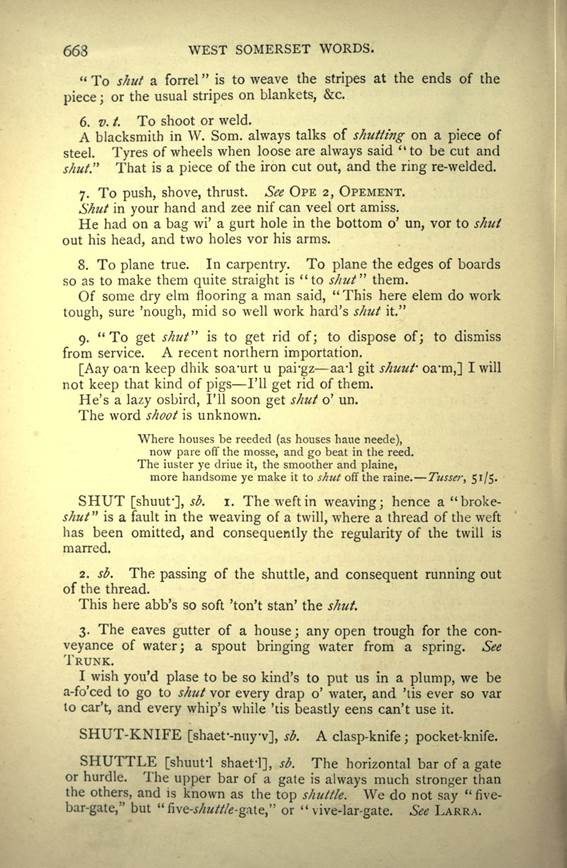
(delwedd B9528) (tudalen 668)
|
WEST SOMERSET WORDS. 667
tsheo'kt), which they think wrong, use this form,” I shuck it out of the pot, but he was quite dead."
SHUFF [shuuf'], sb. Shift, in the sense of contrivance or expedient.
We must make s/iufand put up way it, I s'pose.
The pronunciation of shift, a garment, is quite different [shuf],
SHULE [sheo'l], sb. and v. Shovel. (Var. pronun. common in the Exmoor district and North Devon.)
wi tha Drenking, or ort, to tha Voaken, whare they be shooting o' Beat, handbeating, or angle-bowing. Ex. Scold. \.
196.
Wi' shoulder'd shule an' peckiss, rathe
Ta work the lab'rers starts. Pulman, Rtis. Sk. p. 22.
I should not have expected this pron. in Pulman's neighbourhood.
SHUT [shuuf, /. t. shunt', p. p. u-shiiuf], v. t. and /". i. To shoot; to discharge any kind of firearm or
bow.
[Ee-d su zeo-n shuut'-n.-z leok',] he would as soon shoot him as look.
2. To empty a bag or any kind of receptacle by pouring all its contents out at once.
\ - Shuut' dhu woefs,] empty the oats out of the sacks.
To discharge the contents of a cart by tipping, is always "to shut up"“ Shut up they stones gin the
wall."
A farmer who wished to order a cart-load of any material to be deposited in a particular spot, would say,
"shut it (the earth or manure) up
here." The word is, of course, shoot, and is only a more extended use of the verb in the very
common notice, “Rubbish may be shot here."
A cart which tips badly is said not to shut up vitty.
3. To cause a horse to back, or to back a cart, is always [tu shuut' baak'~\, never to put back or to
back.
Jim, shut back a bit, wi't.
4. To sprout, as in the old adage about a late season: (Always.)
Wait or barley '11 shut in June,
Nif they baint no higher 'an a spoon.
Now sowe and go harrow (where redge ye did draw) the seed of the bremble, with kernell and
haw,
Which couered onerlie, soone to shttt out,
go see it be ditched and fenced about. Tusser, 37/13.
5. To weave, regular trans, verb, used technically by weavers. To li'eavy is to practise the trade
complete, including all the
operations of beaming, raving, tying on, settling in, c., while to shut is to actually ply the shuttle in the
making of cloth.
|
|
|
|
|
ñ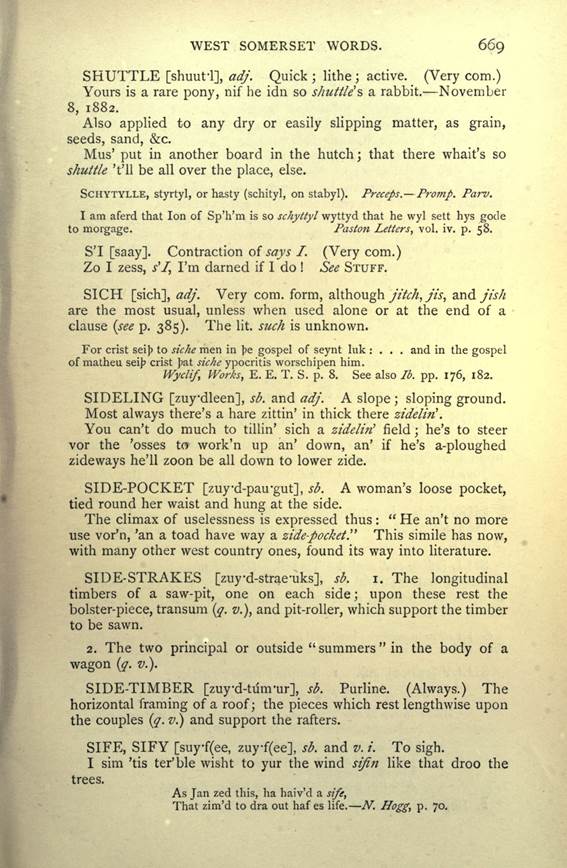
(delwedd B9529) (tudalen 669)
|
663 WEST SOMERSET WORDS.
" To shut a forrel” is to weave the stripes at the ends of the piece; or the usual stripes on blankets,
&c.
6. v. t. To shoot or weld.
A blacksmith in W. Som. always talks of shutting on a piece of steel. Tyres of wheels when loose are
always said "to be cut and
shut." That is a piece of the iron cut out, and the ring re-welded.
7. To push, shove, thrust. See OPE 2, OPEMENT. Shut in your hand and zee nif can veel ort
amiss.
He had on a bag wi' a gurt hole in the bottom o' un, vor to shut out his head, and two holes vor his arms.
8. To plane true. In carpentry. To plane the edges of boards so as to make them quite straight is ''to
shut" them.
Of some dry elm flooring a man said,” This here elem do work tough, sure 'nough, mid so well work hard's
shut it."
9. "To get shut" is to get rid of; to dispose of; to dismiss from service. A recent northern importation.
[Aay oa'n keep dhik soa'urt u pai'gz aa'l git shuut' oa*m,j I will not keep that kind of pigs I'll get rid of
them. He's a lazy osbird, I'll soon
get shut o' un. The word shoot is
unknown.
Where houses be reeded (as houses haue neede), now pare off the mosse, and go beat in the
reed.
The luster ye driue it, the smoother and plaine,
more handsome ye make it to shut off the raine. Tusser, 51/5.
SHUT [shuut'], sb. i. The weft in weaving; hence a "broke-shut" is
a fault in the weaving of a twill, where a thread of the weft has been omitted, and consequently the
regularity of the twill is marred.
2. sb. The passing of the shuttle, and consequent running out of the thread.
This here abb's so soft 'ton't stan' the shut.
3. The eaves gutter of a house; any open trough for the conveyance of water;
a spout bringing water from a spring. See
TRUNK.
I wish you'd plase to be so kind's to put us in a plump, we be a-fo'ced to go to shut vor every drap o'
water, and 'tis ever so var to car't,
and every whip's while 'tis beastly eens can't use it.
SHUT-KNIFE [shaef-nuyv], sb. A clasp-knife; pocket-knife.
SHUTTLE [shuufl shaefl], sb. The horizontal bar of a gate or hurdle. The upper bar of a gate is always
much stronger than the others, and is
known as the top shuttle. We do not say” five-bar-gate," but
"nve-^#/*-gate," or” vive-lar-gate. See LARRA.
|
|
|
|
|
ñ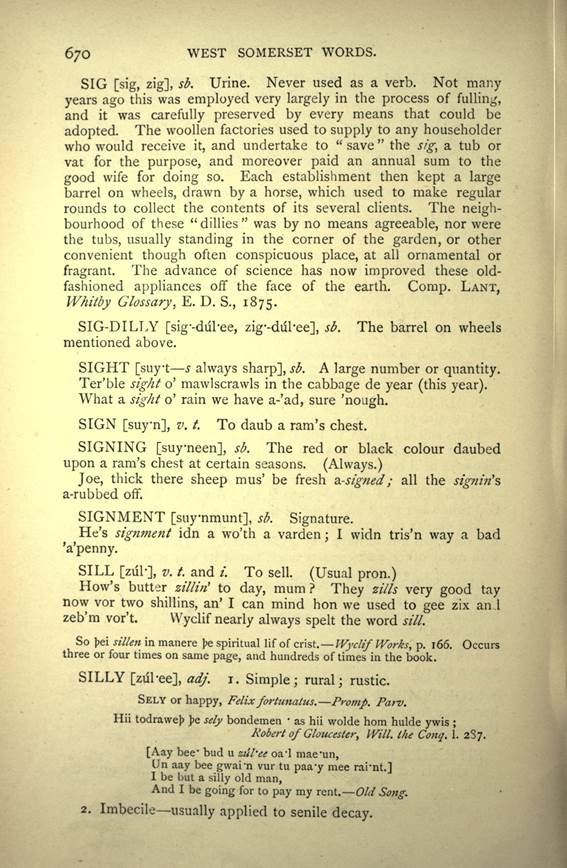
(delwedd B9530) (tudalen 670)
|
WEST SOMERSET WORDS. 669
SHUTTLE [shuufl], adj. Quick; lithe; active. (Very com.)
Yours is a rare pony, nif he idn so shuttled a rabbit. November 8, 1882.
Also applied to any dry or easily slipping matter, as grain, seeds, sand, &c.
Mus' put in another board in the hutch; that there whait's so shuttle 't'll be all over the place, else.
SCHYTYLLE, styrtyl, or hasty (schityl, on stabyl). Preceps. Promp. Parv.
I am aferd that Ion of Sp'h'm is so schyttyl wyttyd that he wyl sett hys
gode to morgage. Paston Letters, vol.
iv. p. 58.
S'l [saay]. Contraction of says I. (Very com.) Zo I zess, s'f, I'm darned if I do! See
STUFF.
SICH [sich], adj. Very com. form, although jitch, jis, and jish are the most usual, unless when used alone
or at the end of a clause (see p.
385). The lit. such is unknown.
For crist sei]> to sic he men in ]>e gospel of seynt Ink: . . . and in
the gospel of matheu seij? crist Jrnt
sic he ypocritis worschipen him.
Wyclif, Works, E. E. T. S. p. 8. See also Ib. pp. 176, 182.
SIDELING [zuydleen], sb. and adj. A slope; sloping ground.
Most always there's a hare zittin' in thick there zideliri .
You can't do much to tillin' sich a zideliri field; he's to steer vor the 'osses to work'n up an' down, an'
if he's a-ploughed zideways he'll zoon
be all down to lower zide.
SIDE-POCKET [zuyd-pau-gut], sb. A woman's loose pocket, tied round her waist and hung at the side.
The climax of uselessness is expressed thus:” He an't no more use vor'n, 'an a toad have way a
zide-pocket" This simile has now,
with many other west country ones, found its way into literature.
SIDE-STRAKES [zuyd-strae'uks], sb. i. The longitudinal timbers of a saw-pit, one on each side;
upon these rest the bolster-piece,
transum (q. #.), and pit-roller, which support the timber to be sawn.
2. The two principal or outside "summers "in the body of a wagon (q. v.\
SIDE-TIMBER [zuyd-tiinvur], sb. Purline. (Always.) The horizontal framing of a roof; the pieces
which rest lengthwise upon the couples
(q. v.) and support the rafters.
SIFE, SIFY [suyf(ee, zuyf(ee], sb. and v. i. To sigh. I sim 'tis ter'ble wisht to yur the wind
stftn like that droo the trees.
As Jan zed this, ha haiv'd a sift,
That zim'd to dra out haf es life. N. Hogg, p. 70.
|
|
|
|
|
ñ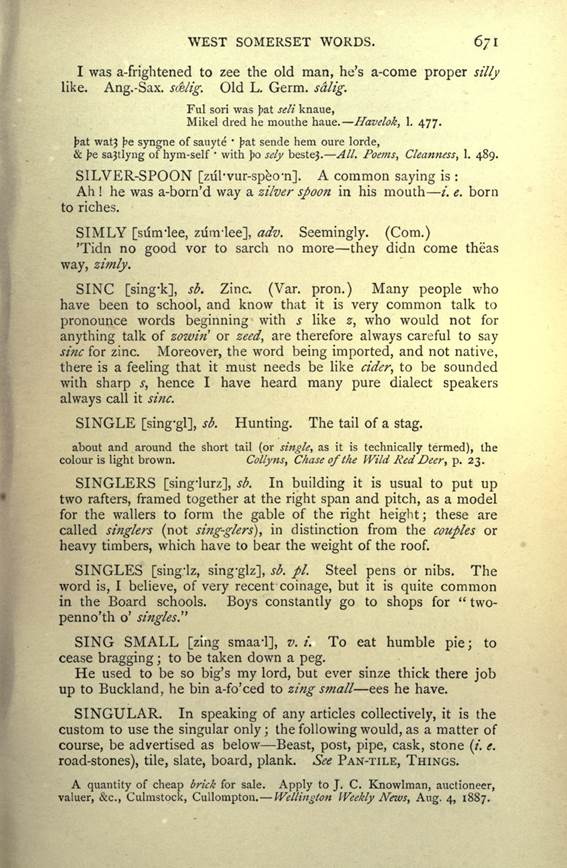
(delwedd B9531) (tudalen 671)
|
670
WEST SOMERSET WORDS.
SIG [sig, zig], sb. Urine. Never used as a verb. Not many years ago this was employed very largely in
the process of fulling, and it was
carefully preserved by every means that could be adopted. The woollen factories used to
supply to any householder who would
receive it, and undertake to” save” the sfg, a tub or vat for the purpose, and moreover paid an
annual sum to the good wife for doing
so. Each establishment then kept a large
barrel on wheels, drawn by a horse, which used to make regular rounds to collect the contents of its
several clients. The neighbourhood of these "dillies" was by no
means agreeable, nor were the tubs,
usually standing in the corner of the garden, or other convenient though often conspicuous place,
at all ornamental or fragrant. The
advance of science has now improved these old-fashioned appliances off the
face of the earth. Comp. LANT, Whitby
Glossary, E. D. S., 1875.
SIG-DILLY [sig'-duTee, zig--duTee], sb. The barrel on wheels mentioned above.
SIGHT [suyt s always sharp], sb. A large number or quantity. Ter'ble sight o' mawlscrawls in the cabbage
de year (this year). What a sight o'
rain we have a-'ad, sure 'nough.
SIGN [suyn], v. t. To daub a ram's chest.
SIGNING [suyneen], sb. The red or black colour daubed upon a ram's chest at certain seasons.
(Always.)
Joe, thick there sheep mus' be fresh z-signed; all the signing a-rubbed off.
SIGNMENT [suynmunt], sb. Signature.
He's signment idn a wo'th a varden; I widn tris'n way a bad 'a'penny.
SILL [ziil-], v . t. and /. To sell. (Usual pron.) How's butter zillirf to day, mum? They
zills very good tay now vor two
shillins, an* I can mind hon we used to gee zix an. I zeb'm vor't. Wyclif nearly always spelt the
word sill.
So >ei sillen in manere J>e spiritual lif of crist. Wyclif Works, p.
166. Occurs three or four times on
same page, and hundreds of times in the book.
SILLY [zuTee], adj. i. Simple; rural; rustic.
SELY or happy, Felix for tunatus. Promp. Parv.
Hii todrawe)> >e sely bondemen as hii wolde horn hulde ywis;
Robert of Gloucester, Will, the Conq. 1. 287.
[Aay bee' bud u ziil'ee oa'l mae'un,
Un aay bee gwai'n vur tu paa'y mee ra'rnt.] I be but a silly old man, And I be going for to pay my rent. Old
Song.
2. Imbecile usually applied to senile decay.
|
|
|
|
|
ñ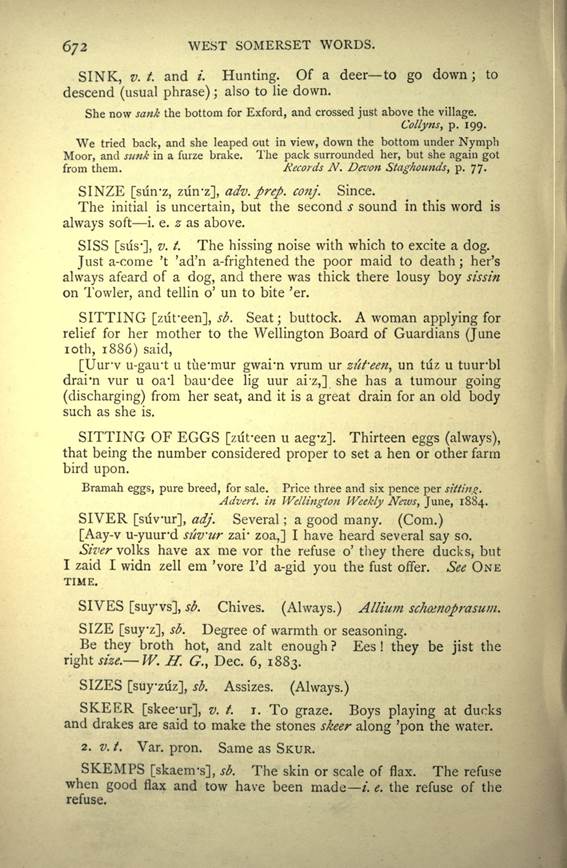
(delwedd B9532) (tudalen 672)
|
WEST SOMERSET WORDS. 6/1
I was a-frightened to zee the old man, he's a-come proper silly like. Ang.-Sax. sceltg. Old L. Germ, salig.
Ful sori was J>at sell knaue,
Mikel dred he mouthe haue. Havelok, 1. 477.
|?at wat3 }?e syngne of sauyte * >at sende hem cure lorde,
& \>Q sa3tlyng of hym-self ' with JK> sely beste3. AIL Poems,
Cleanness, 1. 489.
SILVER-SPOON [zuTvur-speo'n]. A common saying is: Ah! he was a-born'd way a zilver spoon in
his mouth /. e. born to riches.
SIMLY [siinrlee, ziinrlee], adv. Seemingly. (Com.) 'Tidn no good vor to sarch no more they
didn come the'as way, zimly.
SING [sing'k], sb. Zinc. (Var. pron.) Many people who have been to school, and know that it is
very common talk to pronounce words
beginning with s like z, who would not for
anything talk of zowiri or zeed, are therefore always careful to
say sine for zinc. Moreover, the word
being imported, and not native, there
is a feeling that it must needs be like cider, to be sounded with sharp j, hence I have heard many pure
dialect speakers always call it sine.
SINGLE [sing-gl], sb. Hunting. The tail of a stag.
about and around the short tail (or single, as it is technically termed),
the colour is light brown. Colly ns,
Chase of the Wild Red Deer y p. 23.
SINGLERS [sing'lurz], sb. In building it is usual to put up two rafters, framed together at the right
span and pitch, as a model for the
wallers to form the gable of the right height; these are called stnglers (not sing-glers], in
distinction from the couples or heavy
timbers, which have to bear the weight of the roof.
SINGLES [sing-lz, sing-glz], sb. pi. Steel pens or nibs. The word is, I believe, of very recent coinage,
but it is quite common in the Board
schools. Boys constantly go to shops for” two-penno'th o' singles."
SING SMALL [zing smaa'l], v. L To eat humble pie; to cease bragging; to be taken down a peg.
He used to be so big's my lord, but ever sinze thick there job up to Buckland, he bin a-fo'ced to zing
small ees he have.
SINGULAR. In speaking of any articles collectively, it is the custom to use the singular only; the
following would, as a matter of
course, be advertised as below Beast, post, pipe, cask, stone (/.
e. road-stones), tile, slate, board,
plank. See PAN-TILE, THINGS.
A quantity of cheap brick for sale. Apply to J. C. Knowlman, auctioneer, valuer, &c., Culmstock, Cullompton.
Wellington Weekly News, Aug. 4, 1887.
|
|
|
|
|
ñ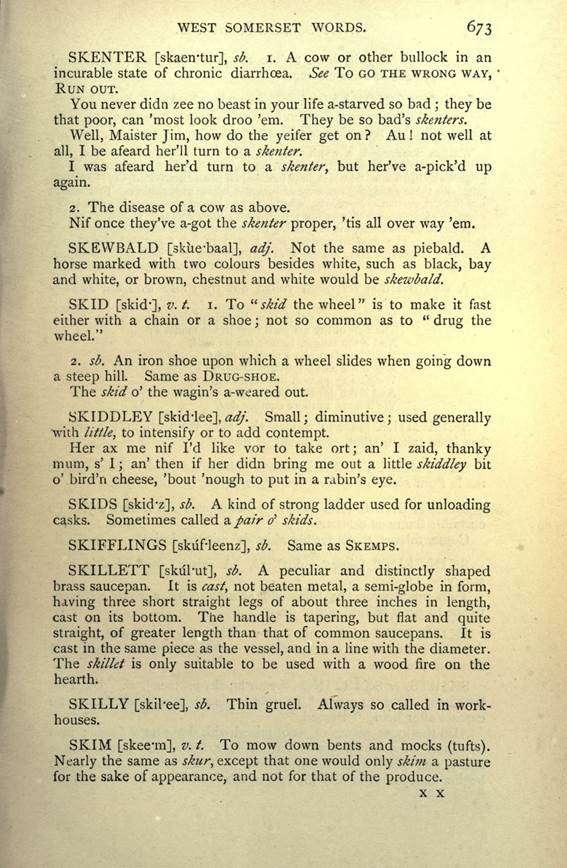
(delwedd B9533) (tudalen 673)
|
672 WEST SOMERSET WORDS.
SINK, v. t. and i. Hunting. Of a deer to go down; to descend (usual phrase); also to lie down.
She now sank the bottom for Exford, and crossed just above the village.
Colly ns, p. 199.
We tried back, and she leaped out in view, down the bottom under Nymph Moor, and sunk in a furze brake. The pack
surrounded her, but she again got from
them. Records N. Devon Staghounds, p. 77.
SINZE [siirrz, ziiirz], adv. prep. conj. Since. The initial is uncertain, but the second s
sound in this word is always soft i.
e. z as above.
SISS [suV], v. t. The hissing noise with which to excite a dog.
Just a-come 't 'ad'n a-frightened the poor maid to death; her's always afeard of a dog, and there was thick
there lousy boy sissin on Towler, and
tellin o' un to bite 'er.
SITTING [ziifeen], sb. Seat; buttock. A woman applying for relief for her mother to the Wellington
Board of Guardians (June loth, 1886)
said,
[Uurv u-gaut u tue'mur gwarn vrum ur zut'een, un tiiz u tuurbl drai'n vur u oa'l bau'dee lig uur ai'z,]
she has a tumour going (discharging)
from her seat, and it is a great drain for an old body such as she is.
SITTING OF EGGS [zut-een u aeg-z]. Thirteen eggs (always), that being the number considered proper to
set a hen or other farm bird upon.
Bramah eggs, pure breed, for sale. Price three and six pence per
sitting. Advert, in Wellington Weekly
News, June, 1884.
SIVER [suVur], adj. Several; a good many. (Com.) [Aay-v u-yuurd suvur zai' zoa,] I have
heard several say so. .S/zwvolks have
ax me vor the refuse o' they there ducks, but
I zaid I widn zell em 'vore I'd a-gid you the fust offer. See ONE
TIME.
SIVES [suyvs], sb. Chives. (Always.) Allium schctnoprasum.
SIZE [suyz], sb. Degree of warmth or seasoning. Be they broth hot, and zalt enough? Ees!
they be jist the right size. W. H. G.,
Dec. 6, 1883.
SIZES [suyziiz], sb. Assizes. (Always.)
SKEER [skee-ur], v. t. i. To graze. Boys playing at ducks and drakes are said to make the stones
skeer along 'pon the water.
2. v. t. Var. pron. Same as SKUR.
SKEMPS [skaenrs], sb. The skin or scale of flax. The refuse when good flax and tow have been made/', e.
the refuse of the refuse.
|
|
|
|
|
ñ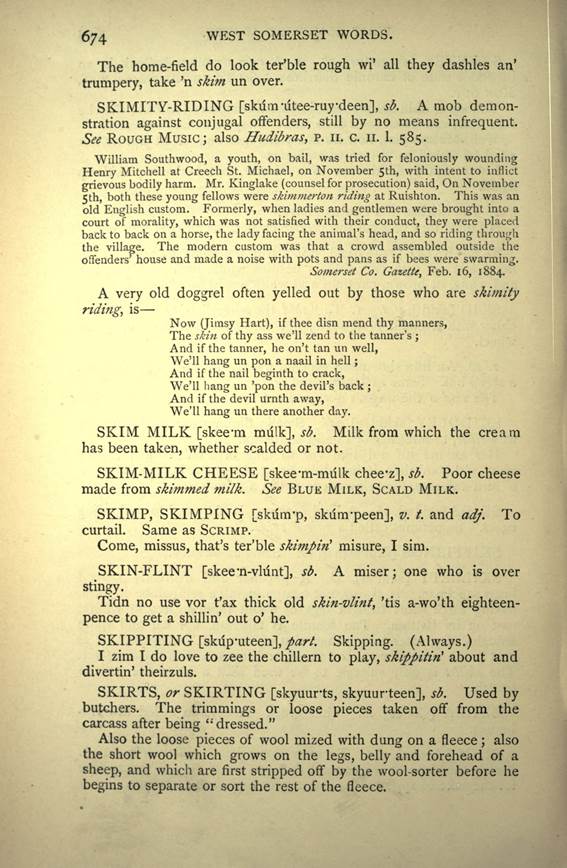
(delwedd B9534) (tudalen 674)
|
WEST SOMERSET WORDS. 673
SKENTER [skaen-tur], sb. i. A cow or other bullock in an incurable state of chronic diarrhoea. See
To GO THE WRONG WAY, RUN OUT.
You never didn zee no beast in your life a-starved so bad; they be that poor, can 'most look droo 'em. They be
so bad's skenters.
Well, Maister Jim, how do the yeifer get on? Au! not well at all, I be afeard her'll turn to a skenter.
I was afeard her'd turn to a skenter, but her've a-pick'd up again.
2. The disease of a cow as above.
Nif once they've a-got the skenter proper, 'tis all over way 'em.
SKEWBALD [skue'baal], adj. Not the same as piebald. A horse marked with two colours besides
white, such as black, bay and white,
or brown, chestnut and white would be skewbald.
SKID [skid-], v. t. i. To "skid the wheel" is to make it fast either with a chain or a shoe; not so
common as to” drug the wheel."
2. sb. An iron shoe upon which a wheel slides when going down a steep hill. Same as DRUG-SHOE. The skid o' the wagin's a-weared out.
SKIDDLEY [skid "lee], adj. Small; diminutive; used generally "with little, to intensify or to add
contempt.
Her ax me nif I'd like vor to take ort; an' I zaid, thanky mum, s' 1; an' then if her didn bring me
out a little skiddley bit o' bird'n
cheese, 'bout 'nough to put in a rabin's eye.
SKIDS [skid'z], sb. A kind of strong ladder used for unloading casks. Sometimes called & pair o 1
skids.
SKIFFLINGS [skuTleenz], sb. Same as SKEMPS.
SKILLETT [skuTut], sb. A peculiar and distinctly shaped brass saucepan. It is cast, not beaten
metal, a semi-globe in form, having
three short straight legs of about three inches in length, cast on its bottom. The handle is tapering,
but flat and quite straight, of
greater length than that of common saucepans. It is cast in the same piece as the vessel, and
in a line with the diameter. The
skillet is only suitable to be used with a wood fire on the hearth.
SKILLY [skil'ee], sb. Thin gruel. Always so called in workhouses.
SKIM [skee'm], v. t. To mow down bents and mocks (tufts). Nearly the same as skur, except that one
would only skim a pasture for the sake
of appearance, and not for that of the produce.
x x
|
|
|
|
|
ñ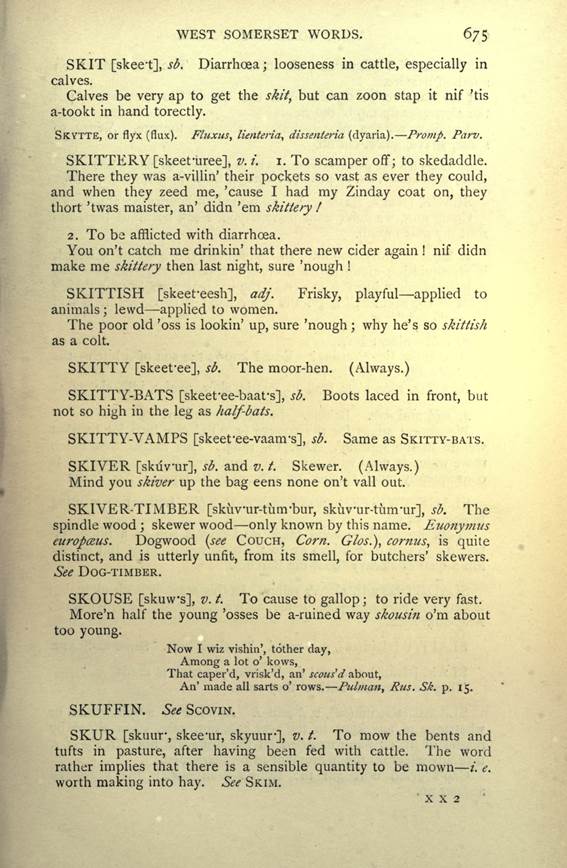
(delwedd B9535) (tudalen 675)
|
674 WEST SOMERSET WORDS.
The home-field do look ter'ble rough wi' all they dashles an' trumpery, take 'n skim un over.
SKIMITY- RIDING [skiinvutee-ruy'deen], sb. A mob demonstration against
conjugal offenders, still by no means infrequent. See ROUGH Music; also Hudibras, p. n. c. n.
1. 585.
William Southwood, a youth, on bail, was tried for feloniously wounding Henry Mitchell at Creech St. Michael, on
November 5th, with intent to inflict
grievous bodily harm. Mr. Kinglake (counsel for prosecution) said, On
November 5th, both these young fellows
were skimmerton riding at Ruishton. This was an old English custom. Formerly, when ladies
and gentlemen were brought into a
court of morality, which was not satisfied with their conduct, they
were placed back to back on a horse,
the lady facing the animal's head, and so riding through the village. The modern custom was that a
crowd assembled outside the offenders'
house and made a noise with pots and pans as if bees were swarming.
Somerset Co. Gazette, Feb. 16, 1884.
A very old doggrel often yelled out by those who are skimity riding, is
Now (Jimsy Hart), if thee disn mend thy manners, The skin of thy ass we'll zend to the
tanner's; And if the tanner, he on't
tan un well, We'll hang un pon a naail
in hell; And if the nail beginth to
crack, We'll hang un 'pon the devil's
back; And if the devil urnth
away, We'll hang un there another day.
SKIM MILK [skee'm mtilk], sb. Milk from which the cream has been taken, whether scalded or not.
SKIM-MILK CHEESE [skee-m-miilk chee-z], sb. Poor cheese made from skimmed milk. See BLUE MILK,
SCALD MILK.
SKIMP, SKIMPING [skiinvp, skunvpeen], v. t. and adj. To curtail. Same as SCRIMP.
Come, missus, that's ter'ble skimpiri misure, I sim.
SKIN-FLINT [skee'n-vliint], sb. A miser; one who is over stingy.
Tidn no use vor t'ax thick old skin-vlint, 'tis a-wo'th eighteen-pence to get
a shillin' out o' he.
SKIPPITING [skiip-uteen], part. Skipping. (Always.) I zim I do love to zee the chillern to
play, skippitirf about and divertin'
theirzuls.
SKIRTS, or SKIRTING [skyuurts, skyuurteen], sb. Used by butchers. The trimmings or loose pieces
taken off from the carcass after being
'-'dressed."
Also the loose pieces of wool mized with dung on a fleece; also the short wool which grows on the legs,
belly and forehead of a sheep, and
which are first stripped off by the wool-sorter before he begins to separate or sort the rest of the
fleece.
|
|
|
|
|
ñ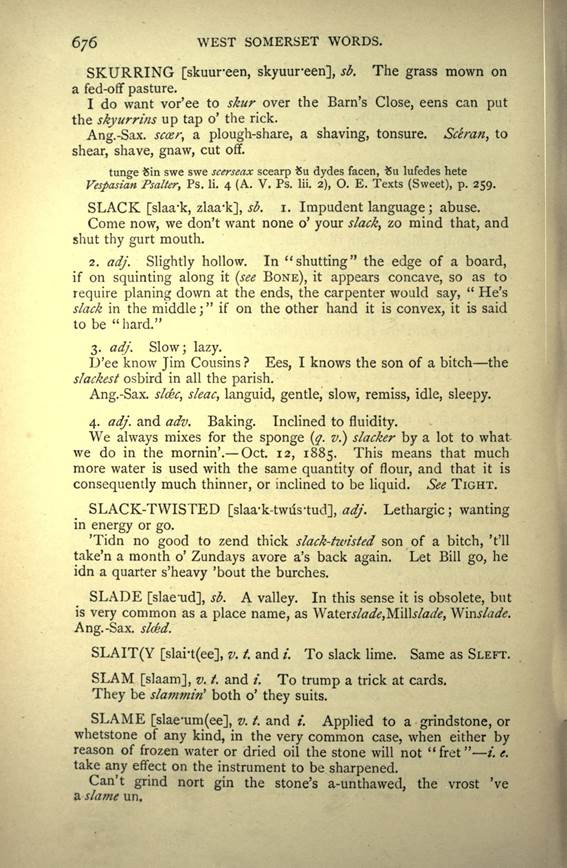
(delwedd B9536) (tudalen 676)
|
WEST SOMERSET WORDS. 675
SKIT [skeet], sb. Diarrhoea; looseness in cattle, especially in calves.
Calves be very ap to get the skit, but can zoon stap it nif 'tis a-tookt in hand torectly.
SKVTTE, or flyx (flux). Fluxus, lienteria, dissenteria (dyaria). Promp. Parv.
SKITTERY [skeef uree], v. i. i. To scamper off; to skedaddle.
There they was a-villin' their pockets so vast as ever they could, and when they zeed me, 'cause I had my
Zinday coat on, they thort 'twas
maister, an' didn 'em skittery!
2. To be afflicted with diarrhoea.
You on't catch me drinkin' that there new cider again! nif didn make me skittery then last night, sure
'nough!
SKITTISH [skeefeesh], adj. Frisky, playful applied to animals; lewd applied to women.
The poor old 'oss is lookin' up, sure 'nough; why he's so skittish as a colt.
SKITTY [skeef ee], sb. The moor-hen. (Always.)
SKITTY-BATS [skeef ee-baafs], sb. Boots laced in front, but not so high in the leg as half-bats.
SKITTY- VAMPS [skeef ee-vaanrs], sb. Same as SKITTY-BATS.
SKIVER [skuvur], sb. and v. t. Skewer. (Always.) Mind you skiver up the bag eens none on't
vail out.
SKIVER-TIMBER [skuvur-tunrbur, skuvur-timvur], sb. The spindle wood; skewer wood only known by
this name. Euonymus europcRus. Dogwood
(see COUCH, Corn. Glos.), cornus, is quite
distinct, and is utterly unfit, from its smell, for butchers'
skewers. See DOG-TIMBER.
SKOUSE [skuws], v. t. To cause to gallop; to ride very fast. More'n half the young 'osses be a-mined way
skousin o'm about too young.
Now I wiz vishin', tother day,
Among a lot o' kows, That caper'd,
vrisk'd, an' scous'd about,
An" made all sarts o' rows. Pulman, Rus. Sk. p. 15.
SKUFFIN. See SCOVIN.
SKUR [skuur, skee'ur, skyuur], v. t. To mow the bents and tufts in pasture, after having been fed
with cattle. The word rather implies
that there is a sensible quantity to be mown /". e. worth making into hay. See SKIM.
X X 2
|
|
|
|
|
ñ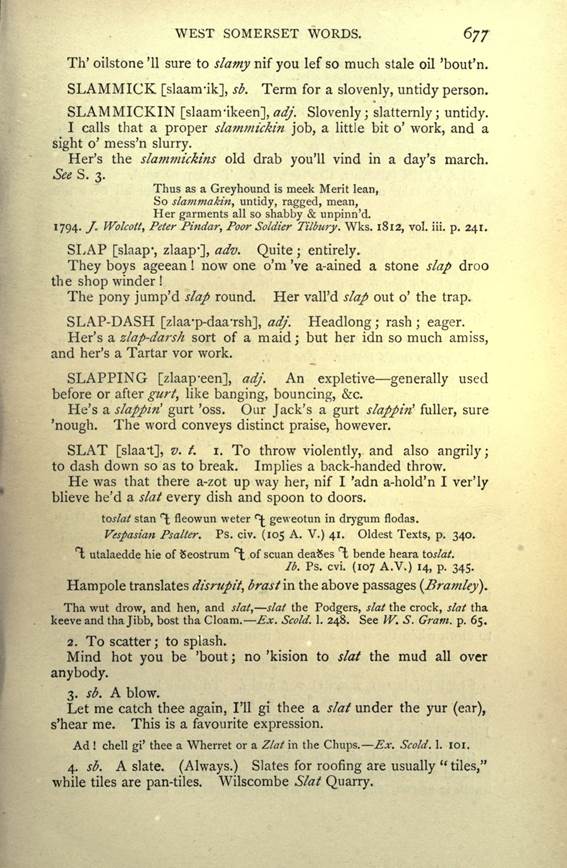
(delwedd B9537) (tudalen 677)
|
6/6 WEST SOMERSET WORDS.
SKURRING [skuureen, skyuureen], sb. The grass mown on a fed-off pasture.
I do want vor'ee to skur over the Barn's Close, eens can put the skyurrins up tap o' the rick.
Ang.-Sax. sc&r, a plough-share, a shaving, tonsure. Sceran, to shear, shave, gnaw, cut off.
tunge Sin swe swe scerseax scearp $u dydes facen, $u lufedes hete Vespasian Psalter, Ps. li. 4 (A. V. Ps. Hi.
2), O. E. Texts (Sweet), p. 259.
SLACK [slaa'k, zlaa'k], sb. i. Impudent language; abuse. Come now, we don't want none o' your slack,
zo mind that, and shut thy gurt mouth.
2. adj. Slightly hollow. In "shutting" the edge of a board, if on squinting along it (see BONE), it
appears concave, so as to require
planing down at the ends, the carpenter would say,” He's slack in the middle;” if on the other hand
it is convex, it is said to be
"hard."
3. adj. Slow; lazy.
D'ee know Jim Cousins? Ees, I knows the son of a bitch the slackest osbird in all the parish.
Ang.-Sax. slcec, sleac, languid, gentle, slow, remiss, idle, sleepy.
4. adj. and adv. Baking. Inclined to fluidity.
We always mixes for the sponge (q. v.) slacker by a lot to what we do in the mornin'. Oct. 12, 1885. This
means that much more water is used
with the same quantity of flour, and that it is consequently much thinner, or inclined to
be liquid. See TIGHT.
SLACK-TWISTED [slaa'k-twuVtud], adj. Lethargic; wanting in energy or go.
'Tidn no good to zend thick slack-twisted son of a bitch, 't'll take'n a month o' Zundays avore a's back
again. Let Bill go, he idn a quarter
s'heavy 'bout the burches.
SLADE [slae'ud], sb. A valley. In this sense it is obsolete, but is very common as a place name, as
Waterf/tf<&,Mill.f/dwfe, Wins/ade.
Ang.-Sax. sided.
SLAIT(Y [slai-t(ee], v. t. and /*. To slack lime. Same as SLEFT.
SLAM [slaam], v. t. and /. To trump a trick at cards. They be slammiri both o' they suits.
SLAME [slae-um(ee], v. t. and /*. Applied to a grindstone, or whetstone of any kind, in the very common
case, when either by reason of frozen
water or dried oil the stone will not "fret" *'. c. take any effect on the instrument to be
sharpened.
Can't grind nort gin the stone's a-unthawed, the vrost 've a slame un.
|
|
|
|
|
ñ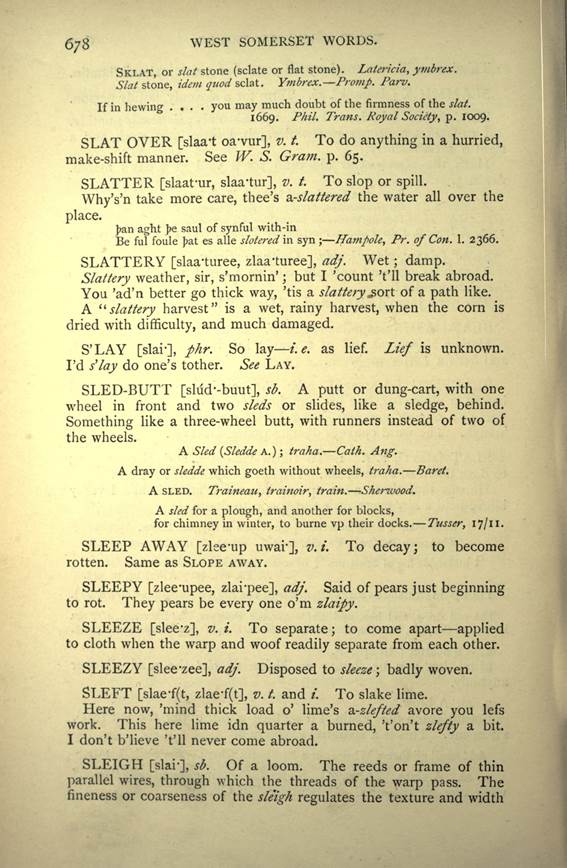
(delwedd B9538) (tudalen 678)
|
WEST SOMERSET WORDS. 6//
Th' oilstone '11 sure to slamy nif you lef so much stale oil 'bout'n. SLAMMICK [slaanrik], sb. Term for a
slovenly, untidy person.
SLAMMICKIN [slaanrikeen], adj. Slovenly; slatternly; untidy. I calls that a proper slammickin job, a
little bit o' work, and a sight o'
mess'n slurry.
Her's the slammickins old drab you'll vind in a day's march. See S. 3.
Thus as a Greyhound is meek Merit lean,
So slammakin, untidy, ragged, mean,
Her garments all so shabby & unpinn'd. 1794. J. Wolcott, Peter Pindar, Poor
Soldier Tilbury. Wks. 1812, vol. iii. p. 241.
SLAP [slaap*, zlaap 1 ], adv. Quite; entirely. They boys ageean! now one o'm 've a-ained a
stone slap droo the shop winder!
The pony jump'd slap round. Her vall'd slap out o' the trap.
SLAP-DASH [zlaa'p-daa'rsh], adj. Headlong; rash; eager. Her's a zlap-darsh sort of a maid; but her
idn so much amiss, and her's a Tartar
vor work.
SLAPPING [zlaap -een], adj. An expletive generally used before or after gurt, like banging,
bouncing, &c.
He's a slappiri gurt 'oss. Our Jack's a gurt slappirt fuller, sure 'nough. The word conveys distinct praise,
however.
SLAT [slaal], v. t. i. To throw violently, and also angrily; to dash down so as to break. Implies a
back-handed throw.
He was that there a-zot up way her, nif I 'adn a-hold'n I ver'ly blieve he'd a slat every dish and spoon to
doors.
ioslat stan ^ fleowun weter ^ geweotun in drygum flodas. Vespasian Psalter. Ps. civ. (105 A. V.) 41.
Oldest Texts, p. 340.
T; utalaedde hie of Seostrum ^t of scuan deacSes T; bende heara toj/a/.
Ib. Ps. cvi. (107 A.V.) 14, p. 345.
Hampole translates disrupit, brast'm the above passages (Bramlty).
Tha wut drow, and hen, and slat, slat the Podgers, slat the crock, slat
tha keeve and tha Jibb, bost tha
Cloam. Ex. Scold. 1. 248. See W. S. Gram. p. 65.
2. To scatter; to splash.
Mind hot you be 'bout; no 'kision to slat the mud all over anybody.
3. sb. A blow.
Let me catch thee again, I'll gi thee a slat under the yur (ear), s'hear me. This is a favourite expression.
Ad! chell gi' thee a Wherret or a Zlat in the Chups. Ex. Scold. 1. 101.
4. sb. A slate. (Always.) Slates for roofing are usually” tiles," while tiles are pan-tiles. Wilscombe Slat
Quarry.
|
|
|
|
|
ñ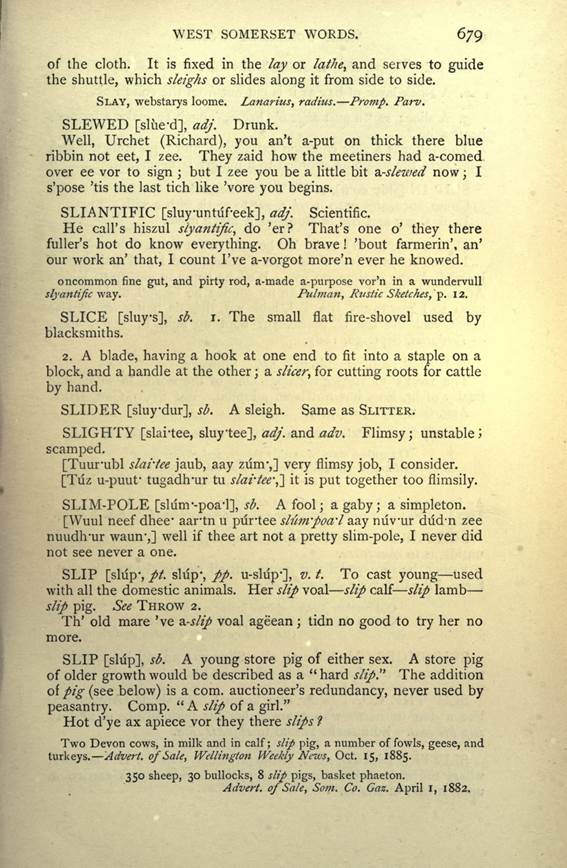
(delwedd B9539) (tudalen 679)
|
678 WEST SOMERSET WORDS.
SKLAT, or slat stone (sclate or flat stone). Latericta, ymbrex. Slat stone, idem quod sclat. Ymbrex. Promp.
Parv.
If in hewing . . . you may much doubt of the firmness of the slat.
1669. Phil. Trans. Royal Society, p. 1009.
SLAT OVER [slaa-t oa*vur], v. t. To do anything in a hurried, make-shift manner. See W. S. Gram. p. 65.
SLATTER [slaat-ur, slaa'tur], v. t. To slop or spill.
Why's'n take more care, thee's &-slattered the water all over the
place.
)>an aght >e saul of synful with-in
Be ful foule J>at es alle slotered in syn; Hampole, Pr. of Con. 1. 2366.
SLATTERY [slaaturee, zlaa'turee], adj. Wet; damp.
dried
with difficulty, and much damaged.
S'LAY [slar], phr. So lay i.e. as lief. Lief is unknown. I'd s'lay do one's tother. See LAY.
SLED-BUTT [slud'-buut], sb. A putt or dung-cart, with one wheel in front and two sleds or slides,
like a sledge, behind. Something like
a three-wheel butt, with runners instead of two of the wheels.
A Sled (Sledde A.); traha.Cath. Ang.
A dray or sledde which goeth without wheels, traha. Baret. A SLED. Traineatt, trainoir, train.
S&erwood.
A sled for a plough, and another for blocks,
for chimney in winter, to burne vp their docks. Tusser, 17/11.
SLEEP AWAY [zlee'up uwar], v.f. To decay; to become rotten. Same as SLOPE AWAY.
SLEEPY [zlee-upee, zlarpee], adj. Said of pears just beginning to rot. They pears be every one o'm zlaipy.
SLEEZE [slee-z], v. i. To separate; to come apart applied to cloth when the warp and woof readily
separate from each other.
SLEEZY [slee'zee], adj. Disposed to sleeze-, badly woven.
SLEFT [slae-f(t, zlae-f(t], v. t. and *. To slake lime.
Here now, 'mind thick load o' lime's &-zlefted avore you lefs work. This here lime idn quarter a burned,
Von't zlefty a bit. I don't b'lieve
't'll never come abroad.
SLEIGH [slar], sb. Of a loom. The reeds or frame of thin parallel wires, through which the threads
of the warp pass. The fineness or
coarseness of the sleigh regulates the texture and width
|
|
|
|
|
ñ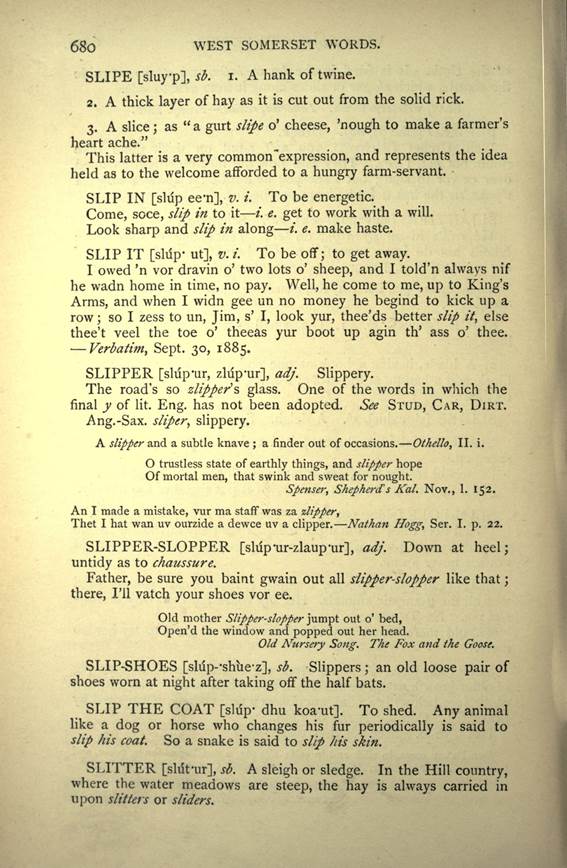
(delwedd B9540) (tudalen 680)
|
WEST SOMERSET WORDS. 679
of the cloth. It is fixed in the lay or lathe, and serves to guide the shuttle, which sleighs or slides along
it from side to side.
SLAY, webstarys loome. Lanarius, radius. Promp. Parv.
SLEWED [slue-d], adj. Drunk.
Well, Urchet (Richard), you an't a-put on thick there blue ribbin not eet, I zee. They zaid how the
meetiners had a-comed over ee vor to
sign; but I zee you be a little bit ^.-slewed now; I s'pose 'tis the last tich like 'vore you
begins.
SLIANTIFIC [sluyuntiSf-eek], adj. Scientific.
He call's hiszul siyantific, do 'er? That's one o' they there fuller's hot do know everything. Oh brave!
'bout farmerin', an' our work an'
that, I count I've a-vorgot more'n ever he knowed.
oncommon fine gut, and pirty rod, a-made a-purpose vor'n in a wundervull siyantific way. Pulman, Rustic Sketches, p.
12.
SLICE [sluys], sb. i. The small flat fire-shovel used by blacksmiths.
2. A blade, having a hook at one end to fit into a staple on a block, and a handle at the other; a slicer,
for cutting roots for cattle by hand.
SLIDER [sluydur], sb. A sleigh. Same as SLITTER.
SLIGHTY [slai-tee, sluytee], adj. and .adv. Flimsy; unstable; scamped.
[Tuurubl slai'tee jaub, aay ziinv,] very flimsy job, I consider. [TUz u-puut* tugadh'ur tu slai'tee;"]
it is put together too flimsily.
SLIM-POLE [sliinv-poa-1], sb. A fool; a gaby; a simpleton.
[Wuul neef dhee' aartn u piirtee slum'poa'l aay niivur diid-n zee nuudlvur waun',] well if thee art not a
pretty slim-pole, I never did not see
never a one.
SLIP [skip-, pt. sliip-, pp. u-sliip-], v. t. To cast young used with all the domestic animals. Her slip
voal slip calf slip lamb slip pig. See
THROW 2.
Th' old mare 've z-slip voal age'ean; tidn no good to try her no more.
SLIP [sliip], sb. A young store pig of either sex. A store pig of older growth would be described as a”
hard slip." The addition of pig
(see below) is a com. auctioneer's redundancy, never used by peasantry. Comp.” A slip of a girl."
Hot d'ye ax apiece vor they there slips?
Two Devon cows, in milk and in calf; slip pig, a number of fowls, geese,
and turkeys. Advert, of Sale,
Wellington Weekly News, Oct. 15, 1885.
350 sheep, 30 bullocks, 8 slip pigs, basket phaeton.
Advert, of Sale, Som. Co. Gaz. April I, 1882.
|
|
|
|
|
ñ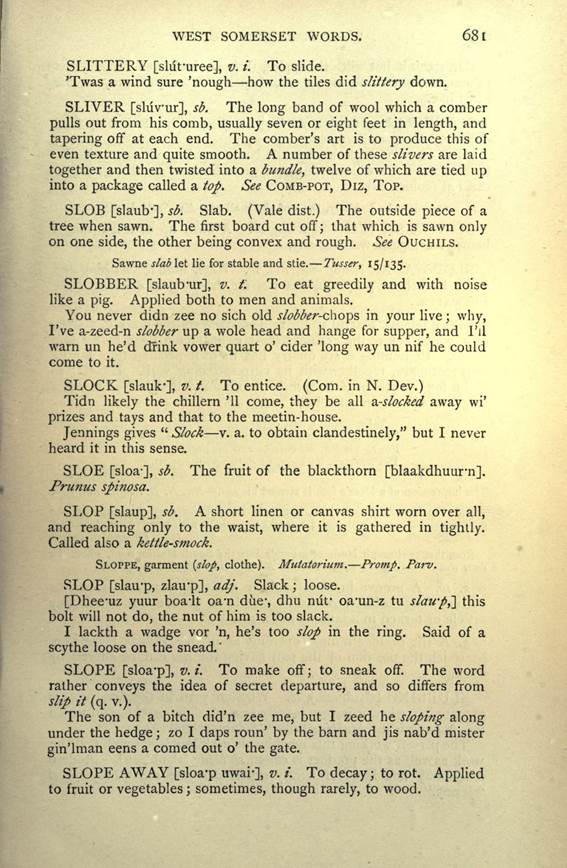
(delwedd B9541) (tudalen 681)
|
680 WEST SOMERSET WORDS.
SLIPE [sluyp], sb. i. A hank of twine.
2. A thick layer of hay as it is cut out from the solid rick.
3. A slice; as "a gurt slipe o' cheese, 'nough to make a farmer's heart ache."
This latter is a very common'"expression, and represents the idea held as to the welcome afforded to a hungry
farm-servant.
SLIP IN [sliip ee-n], v. i. To be energetic.
Come, soce, slip in to it /. e. get to work with a will.
Look sharp and slip in along /'. e. make haste.
SLIP IT [ship- ut], v. i. To be off; to get away.
I owed 'n vor dravin o' two lots o' sheep, and I told'n always nif he wadn home in time, no pay. Well, he come
to me, up to King's Arms, and when I
widn gee un no money he begind to kick up a
row; so I zess to un, Jim, s' I, look yur, thee'ds better slip it,
else thee't veel the toe o' theeas yur
boot up agin th' ass o' thee.
Verbatim, Sept. 30, 1885.
SLIPPER [sliip-ur, zliip'ur], adj. Slippery.
The road's so zlipper's glass. One of the words in which the final y of lit. Eng. has not been adopted.
See STUD, CAR, DIRT. Ang.-Sax. sliper,
slippery.
A slipper and a subtle knave; a finder out of occasions. Othello, II. i.
O trustless state of earthly things, and slipper hope Of mortal men, that swink and sweat for
nought.
Spenser, Shepherd s Kal. Nov., 1. 152.
An I made a mistake, vur ma staff was za zlipper,
Thet I hat wan uv ourzide a dewce uv a clipper. Nathan Hogg, Ser. I. p. 22.
SLIPPER-SLOPPER [sliip'ur-zlaup-ur], adj. Down at heel; untidy as to chaussure.
Father, be sure you baint gwain out all slipper-slopper like that; there, I'll vatch your shoes vor ee.
Old mother Slipper-slopper jumpt out o' bed,
Open'd the window and popped out her head.
Old Nursery Song. The Fox and the Goose.
SLIP-SHOES [sliip-'shue-z], sb. Slippers; an old loose pair of shoes worn at night after taking off the
half bats.
SLIP THE COAT [sliip- dhu koa-ut]. To shed. Any animal like a dog or horse who changes his fur
periodically is said to slip his coat.
So a snake is said to slip his skin.
SLITTER [sldfur], sb. A sleigh or sledge. In the Hill country, where the water meadows are steep, the hay
is always carried in upon slitters or
sliders.
|
|
|
|
|
ñ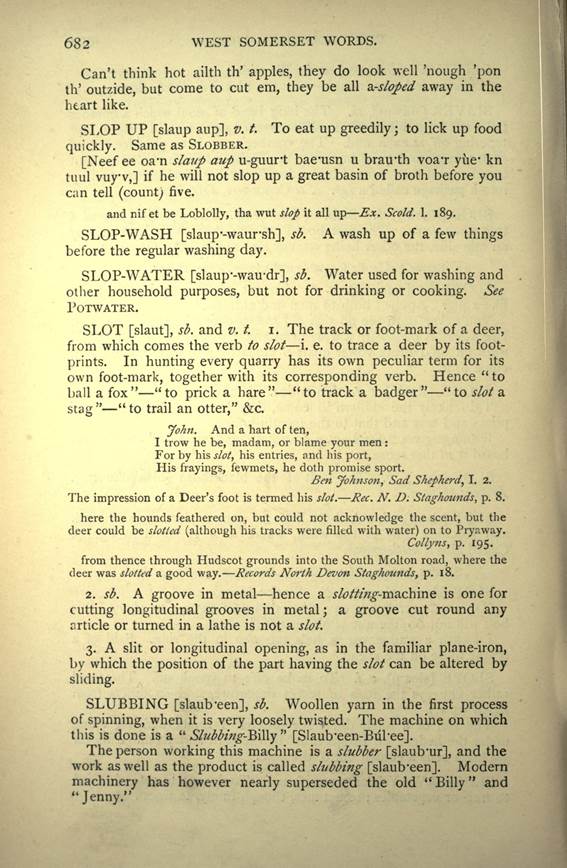
(delwedd B9542) (tudalen 682)
|
WEST SOMERSET WORDS. 68 [
SLITTERY [sliifuree], v. i. To slide.
'Twas a wind sure 'nough how the tiles did slittery down.
SLIVER [sliivur], sb. The long band of wool which a comber pulls out from his comb, usually seven or
eight feet in length, and tapering off
at each end. The comber's art is to produce this of even texture and quite smooth. A number of
these slivers are laid together and
then twisted into a bundle, twelve of which are tied up into a package called a top. See COMB-POT,
Diz, TOP.
SLOB [slaub-], sb. Slab. (Vale dist.) The outside piece of a tree when sawn. The first board cut off;
that which is sawn only on one side,
the other being convex and rough. See OUCHILS.
Sawne slab let lie for stable and stie. Tusser, 15/135.
SLOBBER [slaub -ur], v. t. To eat greedily and with noise like a pig. Applied both to men and
animals.
You never didn zee no sich old sfobbfr-chops in your live; why, I've a-zeed-n slobber up a wole head and
hange for supper, and I'll warn un
he'd drink vower quart o' cider 'long way un nif he could come to it.
SLOCK [slauk-], v. t. To entice. (Com. in N. Dev.)
Tidn likely the chillern '11 come, they be all 2,-slocked away wi'
prizes and tays and that to the meetin-house.
Jennings gives” Slock v. a. to obtain clandestinely," but I never
heard it in this sense.
SLOE [sloa-], sb. The fruit of the blackthorn [blaakdhuurn]. Prunus spinosa.
SLOP [slaup], sb. A short linen or canvas shirt worn over all, and reaching only to the waist, where it is
gathered in tightly. Called also a
kettle-smock.
SLOPPE, garment (slop, clothe). Mutatorium. Promp. Parv.
SLOP [slau'p, zlau'p], adj. Slack; loose.
[Dhee'uz yuur boa'lt oa'n due*, dhu nuf oa'un-z tu slau'p,~\ this bolt will not do, the nut of him is too
slack.
I lackth a wadge vor 'n, he's too slop in the ring. Said of a scythe loose on the snead."
SLOPE [sloa-p], v.i. To make off; to sneak off. The word rather conveys the idea of secret
departure, and so differs from slip it
(q. v.).
The son of a bitch did'n zee me, but I zeed he sloping along under the hedge; zo I daps roun' by the
barn and jis nab'd mister gin'lman
eens a corned out o' the gate.
SLOPE AWAY [sloa-p uwar], v. i. To decay; to rot. Applied to fruit or vegetables; sometimes, though
rarely, to wood.
|
|
|
|
|
ñ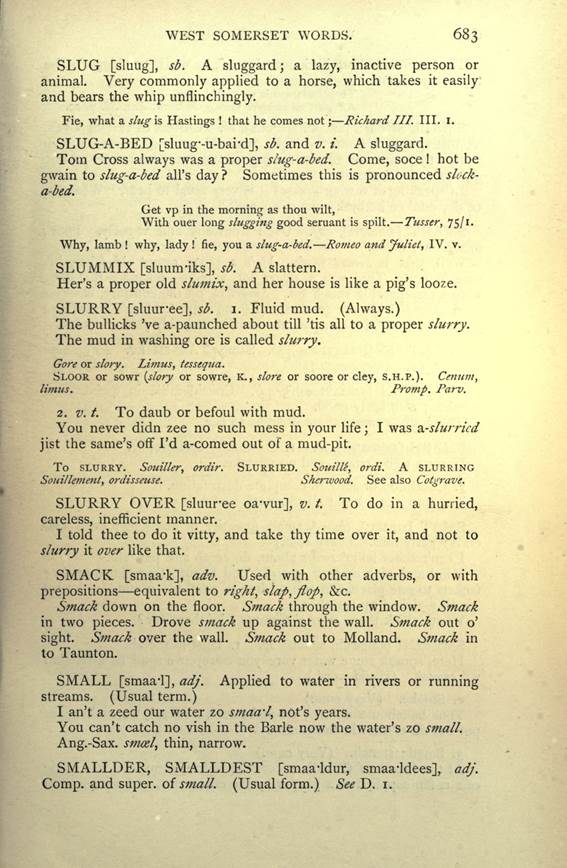
(delwedd B9543) (tudalen 683)
|
682 WEST SOMERSET WORDS.
Can't think hot ailth th' apples, they do look well 'nough 'pon th' outzide, but come to cut em, they be all
2,-sloped away in the heart like.
SLOP UP [slaup aup], v. t. To eat up greedily; to lick up food quickly. Same as SLOBBER.
[Neef ee oa*n slaup aup u-guurt bae'usn u brauth voa*r yue* kn tuul vuyv,] if he will not slop up a great
basin of broth before you can tell
(count; five.
and nif et be Loblolly, tha wut slop it all up Ex. Scold. 1. 189.
SLOP- WASH [slaup '-waursh], sb. A wash up of a few things before the regular washing day.
SLOP-WATER [slaup'-wau-dr], sb. Water used for washing and other household purposes, but not for
drinking or cooking. See POTWATER.
SLOT [slaut], sb. and v. t. i. The track or foot-mark of a deer, from which comes the verb to slot i. e. to
trace a deer by its footprints. In hunting every quarry has its own peculiar
term for its own foot-mark, together
with its corresponding verb. Hence” to
ball a fox" "to prick a hare" "to track a
badger" "to slot a stag
""to trail an otter," &c.
John. And a hart of ten, I trow he be,
madam, or blame your men: For by his
slot, his entries, and his port, His
frayings, fewmets, he doth promise sport.
Ben Johnson, Sad Shepherd, I. 2.
The impression of a Deer's foot is termed his slot. Rec. N. D. Staghounds, p.
8.
here the hounds feathered on, but could not acknowledge the scent, but
the deer could be slotted (although
his tracks were filltd with water) on to Pryaway.
Colly us, p. 195.
from thence through Hudscot grounds into the South Molton road, where
the deer was slotted a good way.
Records North Devon Staghounds, p. 18.
2. sb. A groove in metal hence a ^////z^-machine is one for cutting longitudinal grooves in metal; a
groove cut round any article or turned
in a lathe is not a slot.
3. A slit or longitudinal opening, as in the familiar plane-iron, by which the position of the part having
the slot can be altered by sliding.
SLUBBING [slaub'een], sb. Woollen yarn in the first process of spinning, when it is very loosely
twisted. The machine on which this is
done is a” Slubbing->\\\y” [Slaurreen-BuTee].
The person working this machine is a slubber [slaub'ur], and the work as well as the product is called
stubbing [slaub'een]. Modern machinery
has however nearly superseded the old "Billy" and "Jenny."
|
|
|
|
|
ñ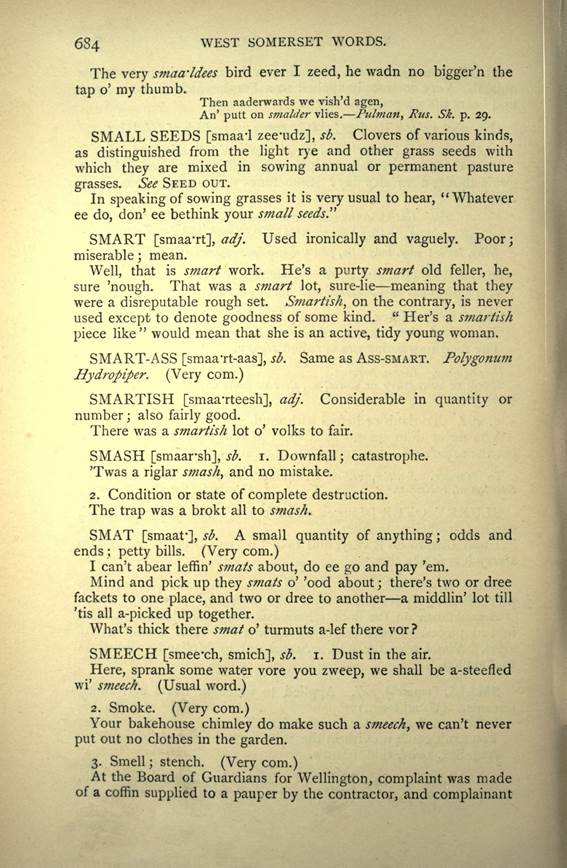
(delwedd B9544) (tudalen 684)
|
WEST SOMERSET WORDS. 683
SLUG [sluug], sb. A sluggard; a lazy, inactive person or animal. Very commonly applied to a horse,
which takes it easily and bears the
whip unflinchingly.
Fie, what a shigis Hastings! that he comes not; Richard III. III. I.
SLUG-A-BED [sluug--u-bard], sb. and v. i. A sluggard.
Tom Cross always was a proper slug-a-bed. Come, soce! hot be gwain to slug-a-bed all's day? Sometimes
this is pronounced slock-a-bed.
Get vp in the morning as thou wilt,
With ouer long slugging good seruant is spilt. Tusser, 75/1.
Why, lamb! why, lady! fie, you a slug-a-bed. Romeo and Juliet, IV. v.
SLUMMIX [sluunriks], sb. A slattern.
Her's a proper old slumix, and her house is like a pig's looze.
SLURRY [sltmree], sb. i. Fluid mud. (Always.)
The bullicks Ve a-paunched about till 'tis all to a proper slurry.
The mud in washing ore is called slurry.
Gore or slory. Limus, tesstqua.
SLOOR or sowr (slory or sowre, K., slore or score or cley, S.H.P.).
Cenum, liinus. Promp. Parv.
2. v.t. To daub or befoul with mud.
You never didn zee no such mess in your life; I was &-slurricd jist the same's off I'd a-comed out of a
mud-pit.
To SLURRY. Souiller, ordir. SLURRIED. Souill'e, ordi. A SLURRING Souillement, ordisseuse. Sherwood. See also
Cotgrave.
SLURRY OVER [sluuree oa-vur], v. t. To do in a hurried, careless, inefficient manner.
I told thee to do it vitty, and take thy time over it, and not to slurry it over like that.
SMACK [smaa'k], adv. Used with other adverbs, or with prepositions equivalent to right, slap,
flop, &c.
Smack down on the floor. Smack through the window. Smack in two pieces. Drove smack up against the
wall. Smack out o' sight. Smack over
the wall. Smack out to Molland. Smack in
to Taunton.
SMALL [smaa'l], adj. Applied to water in rivers or running streams. (Usual term.)
I an't a zeed our water zo smaa'l, not's years.
You can't catch no vish in the Barle now the water's zo small.
Ang.-Sax. srnal, thin, narrow.
SMALLDER, SMALLDEST [smaa-ldur, smaa-ldees], adj. Comp. and super, of small. (Usual form.)
See D. i.
|
|
|
|
|
ñ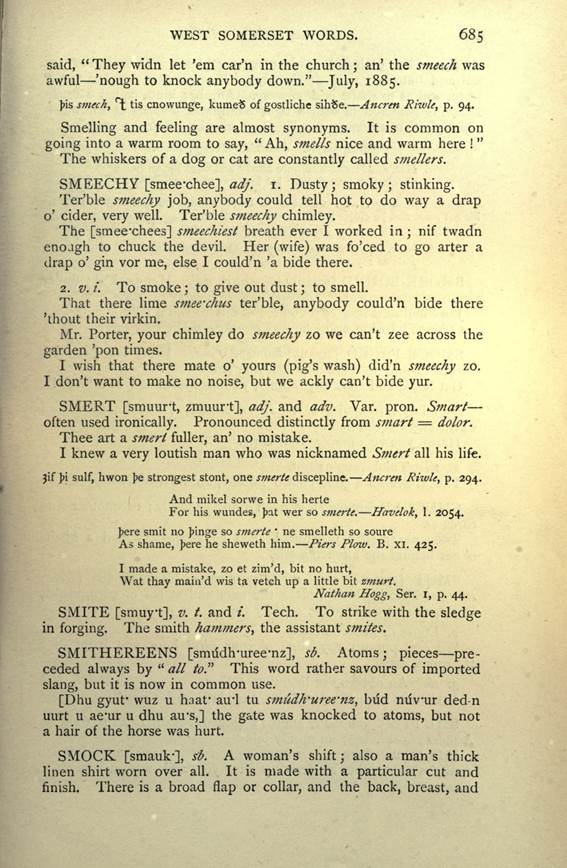
(delwedd B9545) (tudalen 685)
|
684 WEST SOMERSET WORDS.
The very smaa'ldees bird ever I zeed, he wadn no bigger'n the
tap o' my thumb.
Then aaderwards we vish'd agen,
An' putt on smolder vlies. Pulman, Rus. Sk. p. 29.
SMALL SEEDS [smaa'l zee'udz], sb. Clovers of various kinds, as distinguished from the light rye and
other grass seeds with which they are
mixed in sowing annual or permanent pasture
grasses. See SEED OUT.
In speaking of sowing grasses it is very usual to hear,” Whatever ee do, don' ee bethink your small
seeds"
SMART [smaa'rt], adj. Used ironically and vaguely. Poor; miserable; mean.
Well, that is smart work. He's a purty smart old feller, he, sure 'nough. That was a smart lot, sure-lie
meaning that they were a disreputable
rough set. Smartish, on the contrary, is never used except to denote goodness of some
kind.” Her's a smartish piece
like" would mean that she is an active, tidy young woman.
SMART- ASS [smaa'rt-aas], sb. Same as ASS-SMART. Polygonum Hydropiper. (Very com.)
SMARTISH [smaa'rteesh], adj. Considerable in quantity or number; also fairly good.
There was a smartish lot o' volks to fair.
SMASH [smaarsh], sb. i. Downfall; catastrophe. 'Twas a riglar smash, and no mistake.
2. Condition or state of complete destruction. The trap was a brokt all to smash.
SMAT [smaaf], sb. A small quantity of anything; odds and ends; petty bills. (Very com.)
I can't abear leffin' smats about, do ee go and pay 'em.
Mind and pick up they smats o' 'ood about; there's two or dree fackets to one place, and two or dree to
another a middlin' lot till 'tis all
a-picked up together.
What's thick there smat o' turmuts a-lef there vor?
SMEECH [smee-ch, smich], sb. i. Dust in the air. Here, sprank some water vore you zweep, we
shall be a-steefled wi' smeech. (Usual
word.)
2. Smoke. (Very com.)
Your bakehouse chimley do make such a smeech, we can't never put out no clothes in the garden.
3. Smell; stench. (Very com.)
At the Board of Guardians for Wellington, complaint was made of a coffin supplied to a pauper by the
contractor, and complainant
|
|
|
|
|
ñ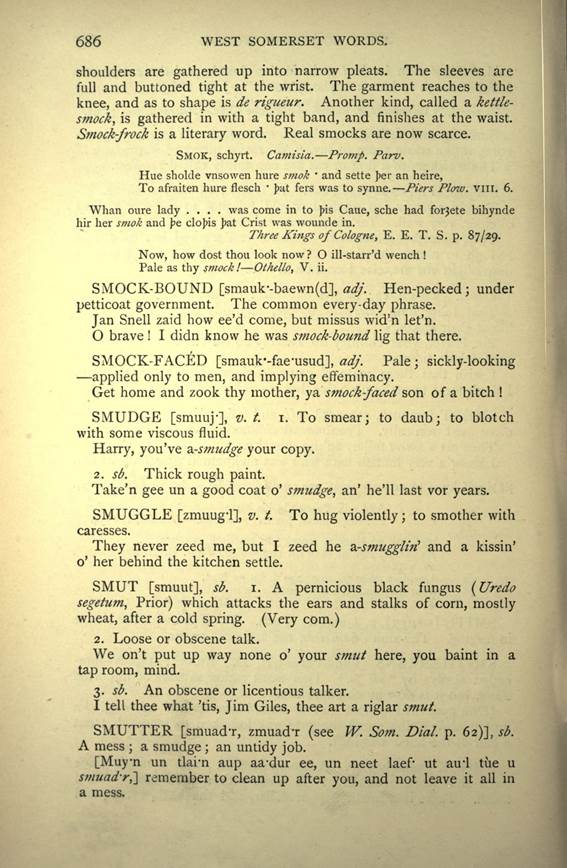
(delwedd B9546) (tudalen 686)
|
WEST SOMERSET WORDS. 685
said,” They widn let 'em car'n in the church; an' the smeech was awful 'nough to knock anybody down."
July, 1885.
J)is smtch, ^t tis cnowunge, kumefc of gostliche sihfce. Ancren Riwle^ p. 94.
Smelling and feeling are almost synonyms. It is common on going into a warm room to say,” Ah, smells
nice and warm here!” The whiskers of a
dog or cat are constantly called smellers.
SMEECHY [smee'chee], adj. i. Dusty; smoky; stinking.
Ter'ble smeechy job, anybody could tell hot to do way a drap o' cider, very well. Ter'ble smeechy
chimley.
The [smee-chees] smeechiest breath ever I worked in; nif twadn enoagh to chuck the devil. Her (wife) was
fo'ced to go arter a drap o' gin vor
me, else I could'n 'a bide there.
2. v. i. To smoke; to give out dust; to smell.
That there lime smee'chus ter'ble, anybody could'n bide there 'thout their virkin.
Mr. Porter, your chimley do smeechy zo we can't zee across the garden 'pon times.
I wish that there mate o' yours (pig's wash) did'n smeechy zo. I don't want to make no noise, but we ackly
can't bide yur.
SMERT [smuurt, zmuurt], adj. and adv. Var. pron. Smart often used ironically. Pronounced
distinctly from smart = dolor. Thee
art a smerl fuller, an' no mistake. I
knew a very loutish man who was nicknamed Smcrt all his life.
Jtf ]>i sulf, hwon ]>e strongest stont, one smerte discepline. Ancren
Ri%ule, p. 294.
And mikel sorwe in his herle
For his wundes, ]>at wer so smerte. Havelok, 1. 2054.
Jjere smit no J>inge so smerte ' ne smelleth so soure
As shame, Jjere he sheweth him. Piers Pltnv. B. XI. 425.
I made a mistake, zo et zim'd, bit no hurt,
Wat thay maiu'd wis ta vetch up a little bit zmurt.
Nathan fog, Ser. i, p. 44.
SMITE [smuyt], v. t. and /. Tech. To strike with the sledge in forging. The smith hammers, the
assistant smites.
SMITHEREENS [smiidlruree-nz], sb. Atoms; pieces preceded always by” all
to." This word rather savours of imported slang, but it is now in common use.
[Dhu gyuf wuz u haaf airl tu smiidh'uree'nz, bud mivur ded-n uurt u ae*ur u dhu au's,] the gate was
knocked to atoms, but not a hair of
the horse was hurt.
SMOCK [smauk 1 ], sb. A woman's shift; also a man's thick linen shirt worn over all. It is made with
a particular cut and finish. There is
a broad flap or collar, and the back, breast, and
|
|
|
|
|
ñ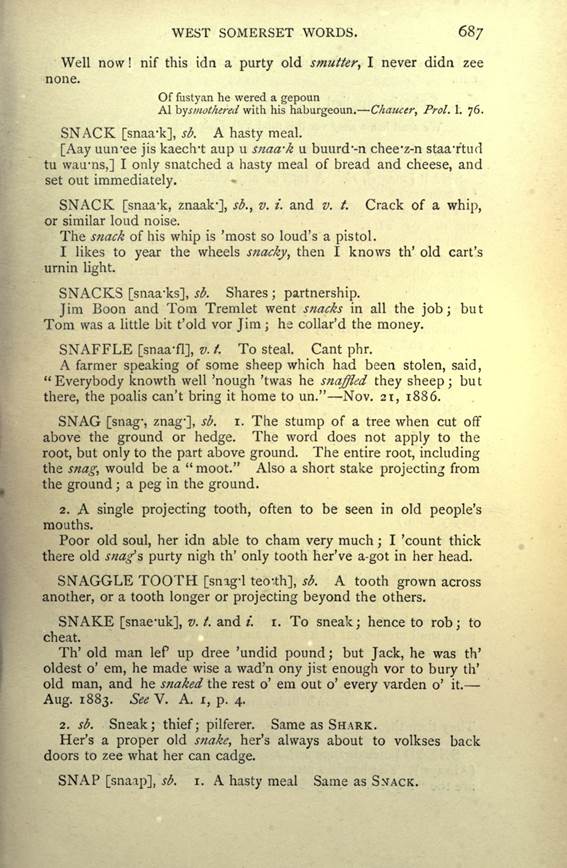
(delwedd B9547) (tudalen 687)
|
686 WEST SOMERSET WORDS.
shoulders are gathered up into narrow pleats. The sleeves are full and buttoned tight at the wrist. The
garment reaches to the knee, and as to
shape is de rigueur. Another kind, called a kettle-smock, is gathered in with
a tight band, and finishes at the waist.
Smock-frock is a literary word. Real smocks are now scarce.
SMOK, schyrt. Camisia. Promp. Parv.
Hue sholde vnsowen hure smok ' and sette ]>er an heire,
To afraiten hure flesch >at fers was to synne. Piers Plow. vin. 6.
Whan oure lady .... was come in to J>is Caue, sche had for^ete
bihynde hir her smok and \>e
clojris )>at Crist was wound e in.
Three Kings of Cologne, E. E. T. S. p. 87/29.
Now, how dost thou look now? O ill-starr'd wench! Pale as thy smock! Othello, V. ii.
SMOCK-BOUND [smauk--baewn(d], adj. Hen-pecked; under petticoat government. The common every-day
phrase. Jan Snell zaid how ee'd come,
but missus wid'n let'n.
brave! I didn know he was smock-bound lig that there.
SMOCK-FACED [smauk'-fae'usud], adj. Pale; sickly-looking applied only to men, and implying
effeminacy.
Get home and zook thy mother, ya smock-faced son of a bitch!
SMUDGE [srnuuj-], v. f. i. To smear; to daub; to blotch with some viscous fluid.
Harry, you've ^-smudge your copy.
2. sb. Thick rough paint.
Take'n gee un a good coat o' smudge, an' he'll last vor years.
SMUGGLE [zmuug-1], v. t. To hug violently; to smother with caresses.
They never zeed me, but I zeed he &-smuggliri and a kissin' o' her behind the kitchen settle.
SMUT [smuut], sb. i. A pernicious black fungus (Uredo segetum, Prior) which attacks the ears and
stalks of corn, mostly wheat, after a
cold spring. (Very com.)
2. Loose or obscene talk.
We on't put up way none o' your smut here, you baint in a tap room, mind.
3. sb. An obscene or licentious talker.
1 tell thee what 'tis, Jim Giles, thee art a riglar smut.
SMUTTER [smuad-r, zmuad'r (see W. Som. Dial. p. 62)], sb. A mess; a smudge; an untidy job.
[Muyn un darn aup aa'dur ee, un neet laef- ut airl tiie u smuad-r,~] remember to clean up after you,
and not leave it all in a mess.
|
|
|
|
|
ñ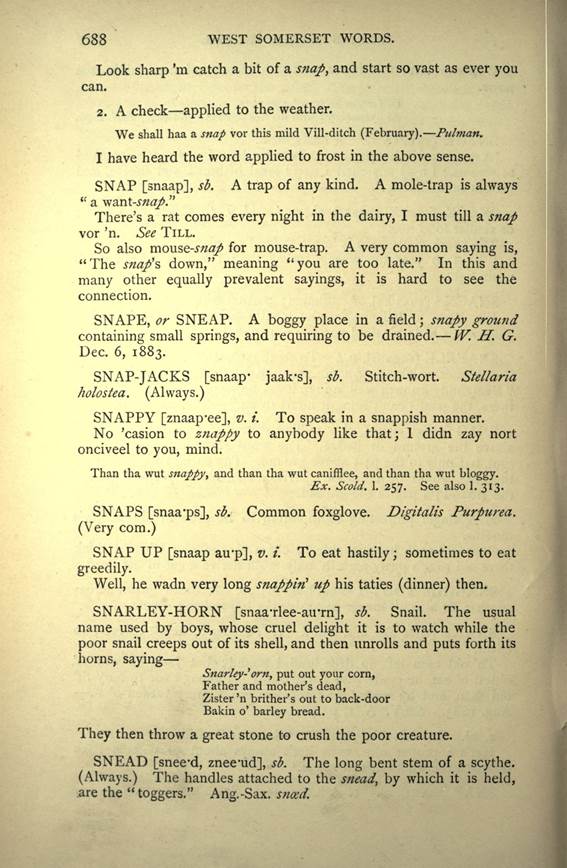
(delwedd B9548) (tudalen 688)
|
WEST SOMERSET WORDS. 687
Well now! nif this idn a purty old smutter, I never didn zee none.
Of fustyan he wered a gepoun
Al by 'smothered with his haburgeoun. Chaucer, Pro!. 1. 76.
SNACK [snaa-k], sb. A hasty meal.
[Aay uuivee jis kaeclrt aup u snaa'k u buurd'-n chee'z-n staa'rtud tu watrns,] I only snatched a hasty meal of
bread and cheese, and set out
immediately.
SNACK [snaa-k, znaak'], sb., v. i. and v. t. Crack of a whip, or similar loud noise.
The snack of his whip is 'most so loud's a pistol.
I likes to year the wheels snacky, then I knows th' old cart's urnin light.
SNACKS [snaa'ks], sb. Shares; partnership.
Jim Boon and Tom Tremlet went snacks in all the job; but Tom was a little bit t'old vor Jim; he
collar'd the money.
SNAFFLE [snaa-fl], v. t. To steal. Cant phr.
A farmer speaking of some sheep which had been stolen, said, "Everybody knowth well 'nough 'twas he
snaffled they sheep; but there, the
poalis can't bring it home to un." Nov. 21, 1886.
SNAG [snag', znag-], sb. i. The stump of a tree when cut off above the ground or hedge. The word does
not apply to the root, but only to the
part above ground. The entire root, including
the snag, would be a” moot." Also a short stake projecting
from the ground; a peg in the ground.
2. A single projecting tooth, often to be seen in old people's mouths.
Poor old soul, her idn able to cham very much; I 'count thick there old sna^s purty nigh th' only tooth
her've a-got in her head.
SNAGGLE TOOTH [snag-1 teo-th], sb. A tooth grown across another, or a tooth longer or projecting
beyond the others.
SNAKE [snae'uk], v. t. and /. i. To sneak; hence to rob; to cheat.
Th' old man lef up dree 'undid pound; but Jack, he was th' oldest o' em, he made wise a wad'n ony jist
enough vor to bury th' old man, and he
snaked the rest o' em out o' every varden o' it. Aug. 1883. See V. A. i, p. 4.
2. sb. Sneak; thief; pilferer. Same as SHARK.
Her's a proper old snake, her's always about to volkses back doors to zee what her can cadge.
SNAP [snaap], sb. i. A hasty meal Same as SXACK.
|
|
|
|
|
ñ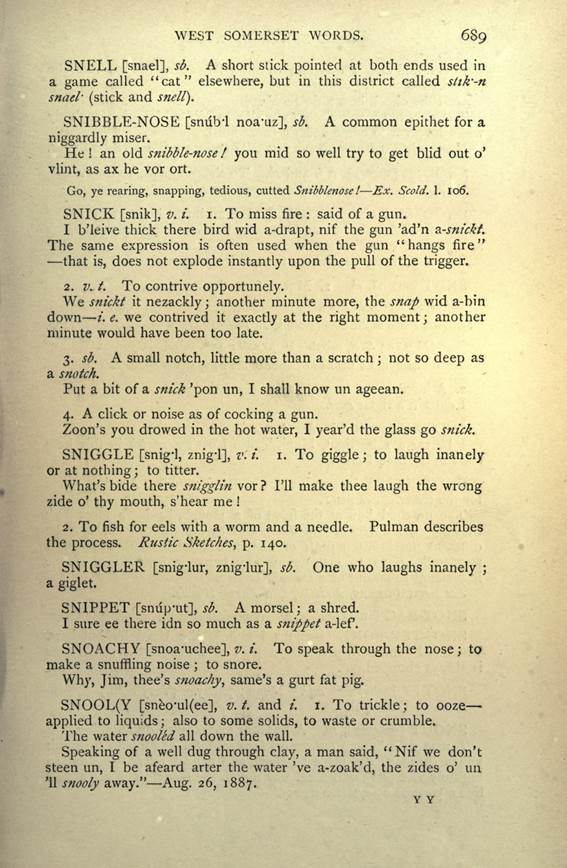
(delwedd B9549) (tudalen 689)
|
688 WEST SOMERSET WORDS.
Look sharp 'm catch a bit of a snap, and start so vast as ever you can.
2. A check applied to the weather.
We shall haa a snap vor this mild Vill-ditch (February). Pulman. I have heard the word applied to frost in
the above sense.
SNAP [snaap], sb. A trap of any kind. A mole-trap is always u a want-.$7Ztf/."
There's a rat comes every night in the dairy, I must till a snap vor 'n. See TILL.
So also mouse-snafl for mouse-trap. A very common saying is, "The snap's down," meaning
"you are too late." In this and
many other equally prevalent sayings, it is hard to see the connection.
SNAPE, or SNEAP. A boggy place in a field; snapy ground containing small springs, and requiring to
be drained. W. H. G. Dec. 6, 1883.
SNAP-JACKS [snaap- jaak's], sb. Stitch-wort. Stellaria holostea. (Always.)
SNAPPY [znaap'ee], v. i. To speak in a snappish manner. No 'casion to znappy to anybody like that;
1 didn zay nort onciveel to you, mind.
Than tha wut snappy, and than tha wut canifflee, and than tha wut bloggy.
Ex. Scold. 1. 257. See also 1. 313.
SNAPS [snaa'ps], sb. Common foxglove. Digitalis Purpurea. (Very com.)
SNAP UP [snaap au'p], v. i. To eat hastily; sometimes to eat greedily.
Well, he wadn very long snappiri up his taties (dinner) then.
SNARLEY-HORN [snaa-rlee-airrn], sb. Snail. The usual name used by boys, whose cruel delight it
is to watch while the poor snail
creeps out of its shell, and then unrolls and puts forth its horns, saying
Snarley-orn, put out your corn,
Father and mother's dead,
Zister 'n brither's out to back-door
Bakin o' barley bread.
They then throw a great stone to crush the poor creature.
SNEAD [snee-d, znee'ud], sb. The long bent stem of a scythe. (Always.) The handles attached to the
snead, by which it is held, are the
"loggers." Ang.-Sax. snced.
|
|
|
|
|
ñ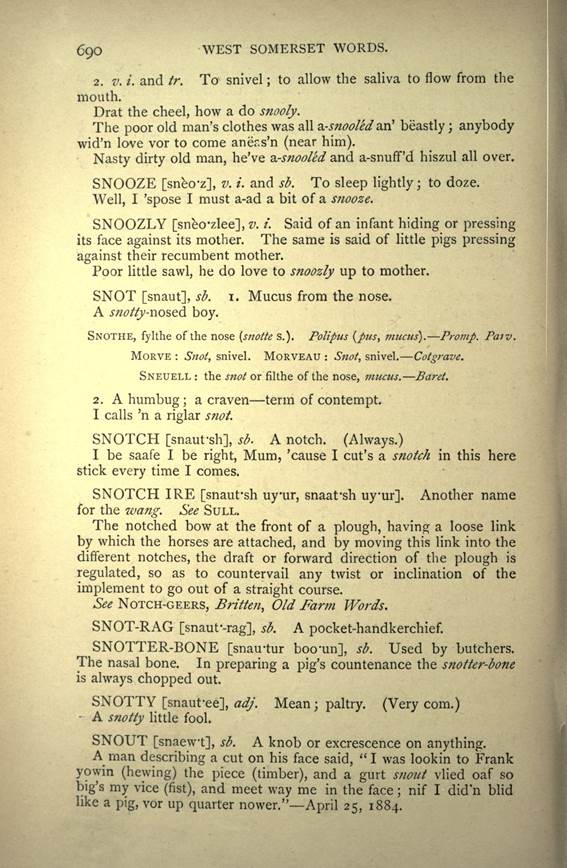
(delwedd B9550) (tudalen 690)
|
WEST SOMERSET WORDS. 689
SNELL [snael], sb. A short stick pointed at both ends used in a game called "cat" elsewhere,
but in this district called sttk'-n
snael' (stick and snell).
SNIBBLE-NOSE [sniiM noa'uz], sb. A common epithet for a niggardly miser.
He! an old snibble-nose! you mid so well try to get blid out o' vlint, as ax he vor ort.
Go, ye rearing, snapping, tedious, cutted Snibblenose! Ex. Scold. 1. 106.
SNICK [snik], v. i. i. To miss fire: said of a gun.
I b'leive thick there bird wid a-drapt, nif the gun 'ad'n &-snickt. The same expression is often used when the
gun "hangs fire" that is,
does not explode instantly upon the pull of the trigger.
2. v. t. To contrive opportunely.
We snickt it nezackly; another minute more, the snap wid a-bin down i.e. we contrived it exactly at the
right moment; another minute would
have been too late.
3. sb. A small notch, little more than a scratch; not so deep as a snotch.
Put a bit of a snick 'pon un, I shall know un ageean.
4. A click or noise as of cocking a gun.
Zoon's you drowed in the hot water, I year'd the glass go snick.
SNIGGLE [snig-1, znig-1], v. i. i. To giggle; to laugh inanely or at nothing; to titter.
What's bide there snigglin vor? I'll make thee laugh the wrong zide o' thy mouth, s'hear me!
2. To fish for eels with a worm and a needle. Pulman describes the process. Rustic Sketches, p. 140.
SNIGGLER [snig'lur, znig'lur], sb. One who laughs inanely; a giglet.
SNIPPET [smip-ut], sb. A morsel: a shred.
I sure ee there idn so much as a snippet a-lef .
SNOACHY [snoa'tichee], v. i. To speak through the nose; to make a snuffling noise; to snore.
Why, Jim, thee's snoachy, same's a gurt fat pig.
SNOOL(Y [sneo-ul(ee], v. t. and /. i. To trickle; to ooze applied to liquids; also to some solids, to
waste or crumble.
The water snooled all down the wall.
Speaking of a well dug through clay, a man said, "Nif we don't steen un, I be afeard arter the water 've
a-zoak'd, the zides o' un '11 snooly
away." Aug. 26, 1887.
Y Y
|
|
|
|
|
ñ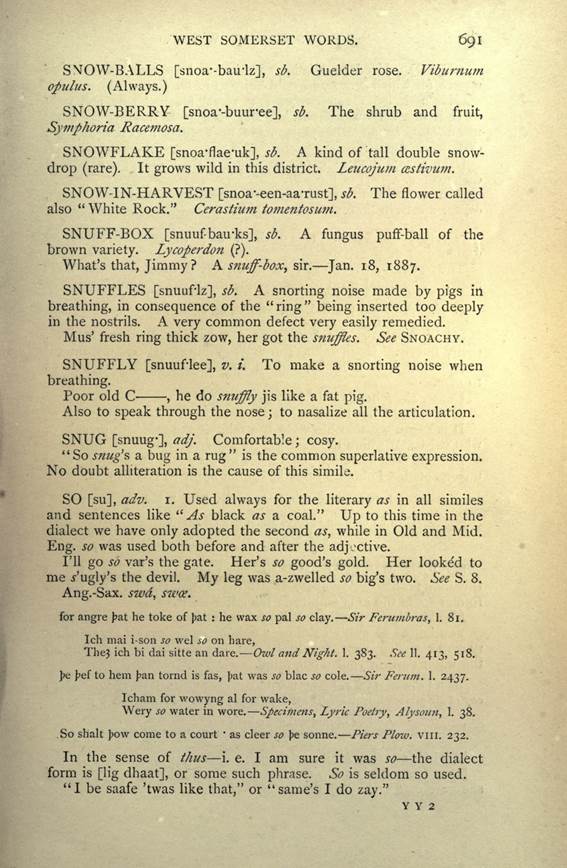
(delwedd B9551) (tudalen 691)
|
690 WEST SOMERSET WORDS.
2. v. i. and tr. To snivel; to allow the saliva to flow from the mouth.
Drat the cheel, how a do snooty.
The poor old man's clothes was all a.-snooled an' beastly; anybody wid'n love vor to come anens'n (near him).
Nasty dirty old man, he've &-snooled and a-snuff'd hiszul all over.
SNOOZE [sneo-z], v. i. and sb. To sleep lightly; to doze. Well, I 'spose I must a-ad a bit of a
snooze.
SNOOZLY [sneo-zlee], v. i. Said of an infant hiding or pressing its face against its mother. The same is
said of little pigs pressing against
their recumbent mother.
Poor little sawl, he do love to snoozly up to mother.
SNOT [snaut], sb. i. Mucus from the nose.
A j#0//j/-nosed boy.
SNOTHE, fylthe of the nose (snotte s.). Polipus (pus, mucus}. Promp,
Paiv. MORVE: Snot, snivel. MORVEAU:
Snot, snivel. Cotgrave. SNEUELL: the
snot or filthe of the nose, mucus. Baret.
2. A humbug; a craven term of contempt.
I calls 'n a riglar snot.
SNOTCH [snaufsh], sb. A notch. (Always.)
I be saafe I be right, Mum, 'cause I cut's a snotch in this here stick every time I comes.
SNOTCH IRE [snaut'sh uyur, snaat'sh uyur]. Another name for the wang. See SULL.
The notched bow at the front of a plough, having a loose link by which the horses are attached, and by
moving this link into the different
notches, the draft or forward direction of the plough is regulated, so as to countervail any twist
or inclination of the implement to go
out of a straight course.
See NOTCH-GEERS, Britten, Old Farm Words.
SNOT-RAG [snauf-rag], sb. A pocket-handkerchief.
SNOTTER-BONE [snau-tur boo'un], sb. Used by butchers. The nasal bone. In preparing a pig's
countenance the snotter-bone is always
chopped out.
SNOTTY [snaut'ee], adj. Mean; paltry. (Very com.) - A snotty little fool.
SNOUT [snaewt], sb. A knob or excrescence on anything.
A man describing a cut on his face said,” I was lookin to Frank yowin (hewing) the piece (timber), and a
gurt snout vlied oaf so big's my vice
(fist), and meet way me in the face; nif I did'n blid like a pig, vor up quarter nower."
April 25, 1884.
|
|
|
|
|
ñ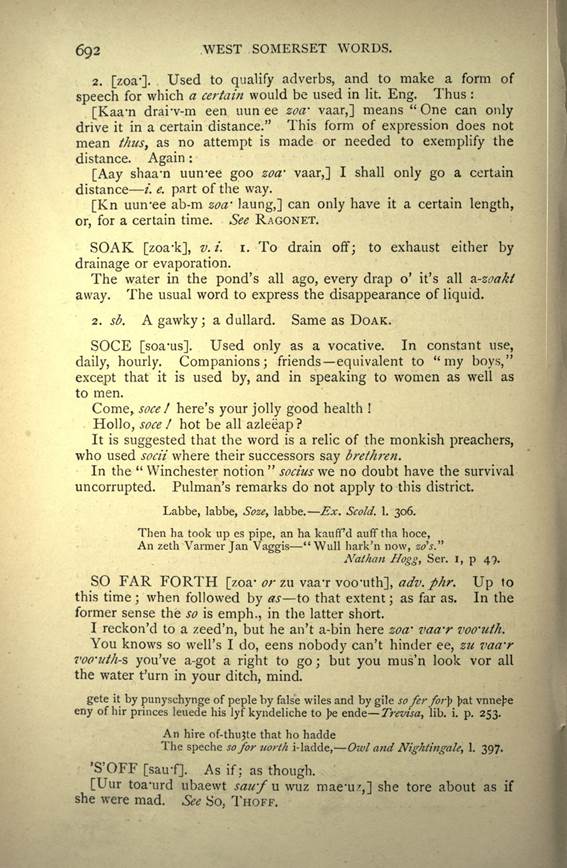
(delwedd B9552) (tudalen 692)
|
WEST SOMERSET WORDS. 691
S MOW-BALLS [snoa'-bairlz], sb. Guelder rose. Viburnum opulus. (Always.)
SNOW-BERRY [snoa'-buuree], sb. The shrub and fruit, Symphoria Racemosa.
SNOWFLAKE [snoa'flae'uk], sb. A kind of tall double snowdrop (rare). It grows
wild in this district. Leucojum ccstivum.
SNOW-IN-HARVEST [snoa'-een-aa-rust], sb. The flower called also "White Rock." Cerastium
tomentosum.
SNUFF-BOX [snuufbau-ks], sb. A fungus puff-ball of the brown variety. Lycoperdon (?).
What's that, Jimmy? A snuff-box, sir. Jan. 18, 1887.
SNUFFLES [snuuf-lz], sb. A snorting noise made by pigs in breathing, in consequence of the
"ring" being inserted too deeply
in the nostrils. A very common defect very easily remedied.
Mus' fresh ring thick zow, her got the snuffles. See SNOACHY.
SNUFFLY [snuuf-lee], v. i. To make a snorting noise when breathing.
Poor old C , he do snuffly jis like a fat pig.
Also to speak through the nose; to nasalize all the articulation.
SNUG [snuug*], adj. Comfortable; cosy.
"So snug's a bug in a rug" is the common superlative
expression. No doubt alliteration is
the cause of this simile.
SO [su], adv. i. Used always for the literary as in all similes and sentences like "As black as a
coal." Up to this time in the
dialect we have only adopted the second as, while in Old and Mid. Eng. so was used both before and after the
adjective.
I'll go so var's the gate. Her's so good's gold. Her looked to me j'ugly's the devil. My leg was a-zwelled
so big's two. See S. 8.
Ang.-Sax. surd, swce.
for angre J>at he toke of }>at: he wax so pal so clay. Sir Ferumbras,
1. 81.
Ich mai i-son so wel so on hare,
The} ich bi dai sitte an dare. Owl and Night. 1. 383. See 11. 413, 518.
Je f>ef to hem f>an tornd is fas, J>at was so blac so cole. Sir
Fenim. 1. 2437.
Ich am for wowyng al for wake,
Wery so water in wore. Specimens, Lyric Poetry, Alysoun, 1. 38.
So shalt Jxnv come to a court ' as cleer so }>e sonne. Piers Ploiv. vin.
232.
In the sense of thus i. e. I am sure it was so the dialect form is [lig dhaat], or some such phrase.
So is seldom so used. "I be saafe
'twas like that," or "same's I do zay."
Y Y 2
|
|
|
|
|
ñ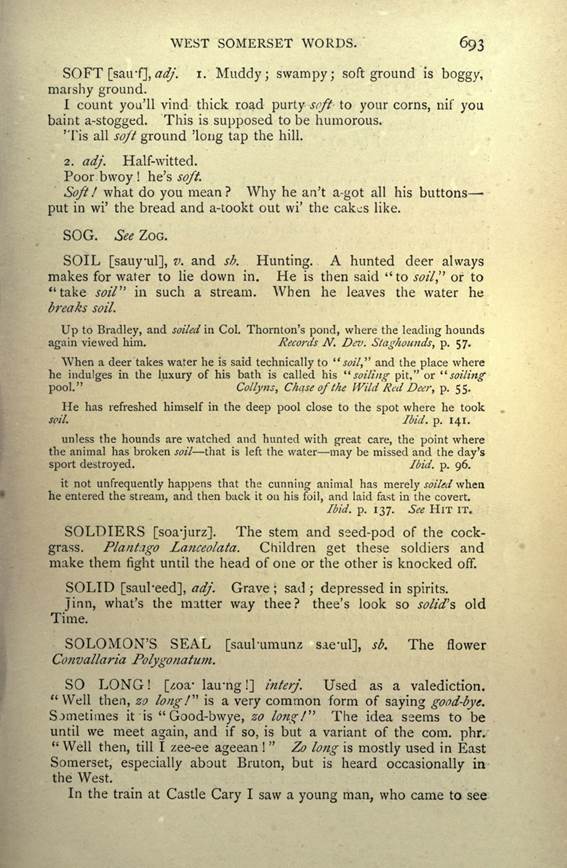
(delwedd B9553) (tudalen 693)
|
692 WEST SOMERSET WORDS.
2. [zoa*]. Used to qualify adverbs, and to make a form of speech for which a certain would be used in
lit. Eng. Thus:
[Kaa-n drai'v-m een nun ee zoa' vaar,] means "One can only drive it in a certain distance." This
form of expression does not mean thus,
as no attempt is made or needed to exemplify the distance. Again:
[Aay shaa'n uun'ee goo zoa' vaar,] I shall only go a certain distance /. e. part of the way.
[Kn uun'ee ab-m zoa' laung,] can only have it a certain length, or, for a certain time. See RAGONET.
SOAK [zoa'k], v. i. i. To drain off; to exhaust either by drainage or evaporation.
The water in the pond's all ago, every drap o' it's all &-zoakt away. The usual word to express the
disappearance of liquid.
2. sb. A gawky; a dullard. Same as DOAK.
SOCE [soa-us]. Used only as a vocative. In constant use, daily, hourly. Companions; friends
equivalent to "my boys,"
except that it is used by, and in speaking to women as well as to men.
Come r soce! here's your jolly good health!
Hollo, soce! hot be all azleeap?
It is suggested that the word is a relic of the monkish preachers, who used socii where their successors say
brethren.
In the” Winchester notion” socius we no doubt have the survival uncorrupted. Pulman's remarks do not apply
to this district.
Labbe, labbe, Soze, labbe. Ex. Scold. 1. 306.
Then ha took up es pipe, an ha kauffd aufftha hoce, An zeth Varmer Jan Vaggis” Wull hark'n now,
20*5."
Nathan Hogg, Ser. I, p 4?.
SO FAR FORTH [zoa- or zu vaa'r voo'uth], adv. phr. Up to this time; when followed by as to that
extent; as far as. In the former sense
the so is emph., in the latter short.
I reckon'd to a zeed'n, but he an't a-bin here zoa' vaa'r voo'uth.
You knows so well's I do, eens nobody can't hinder ee, zu vaa'r voo'uth-s you've a-got a right to go; but
you mus'n look vor all the water t'urn
in your ditch, mind.
gete it by punyschynge of peple by false wiles and by gile so for for}
}>at vnnejje eny of hir princes
leuede his lyf kyndeliche to ]>e ende Tremsa, lib. i. p. 253.
An hire of-thujte that ho hadde
The speche so for uorth i-ladde, Owl and Nightingale, 1. 397.
'S'OFF [sau-f]. As if: as though.
[Uur toa'urd ubaewt sau'f u wuz mae*u.?,] she tore about as if she were mad. See So, THOFF.
|
|
|
|
|
ñ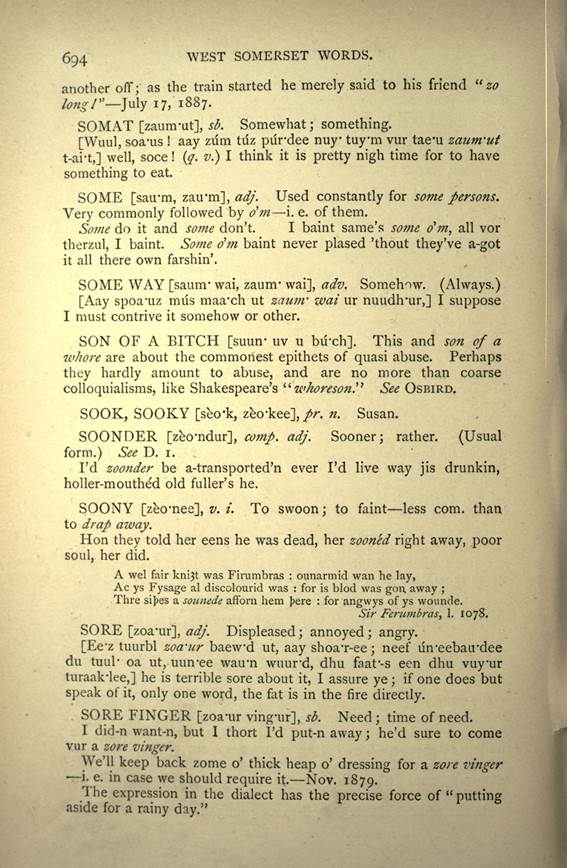
(delwedd B9554) (tudalen 694)
|
WEST SOMERSET WORDS. 693
SOFT [sairfj, adj. i. Muddy; swampy; soft ground is boggy, marshy ground.
I count you'll vind thick road purty soft to your corns, nif you baint a-stogged. This is supposed to be
humorous.
'Tis all soft ground 'long tap the hill.
2. adj. Half-witted. Poor bwoy! he's
soft.
Soft! what do you mean? Why he an't a-got all his buttons put in wi' the bread and a-tookt out wi'
the cakes like.
SOG. See Zoo.
SOIL [sauyul], v. and sb. Hunting. A hunted deer always makes for water to lie down in. He is then
said "to soil" or to
"take soil" in such a stream. When he leaves the water
he breaks soil.
Up to Bradley, and soiled in Col. Thornton's pond, where the leading
hounds again viewed him. Records N.
Dev. Staghotinds, p. 57.
When a deer takes water he is said technically to "soil," and the
place where he indulges in the luxury
of his bath is called his "soiling pit," or "soiling pool." Collyns, Chase of the Wild Red
Deer, p. 55.
He has refreshed himself in the deep pool close to the spot where he
took soil. Ibid. p. 141.
unless the hounds are watched and hunted with great care, the point
where the animal has broken soil that
is left the water may be missed and the day's
sport destroyed. Ibid. p. 96.
it not unfrequently happens that the cunning animal has merely soiled
when he entered the stream, and then
back it on his foil, and laid fast in the covert.
Ibid. p. 137. See HIT IT.
SOLDIERS [soa'jurz]. The stem and seed-pod of the cock-grass. Plantago
Lanceolata. Children get these soldiers and
make them fight until the head of one or the other is knocked off.
SOLID [saul'eed], adj. Grave; sad; depressed in spirits. Jinn, what's the matter way thee? thee's
look so solid 1?, old Time.
SOLOMON'S SEAL [saul'umunz sae'ul], sb. The flower Convallaria Polygonatum.
SO LONG! [>oa- lau'ng!] interj. Used as a valediction. "Well then, zo long!'"' 1 is a
very common form of saying good-bye.
Sometimes it is” Good-bwye, zo long!" The idea seems to be until we meet again, and if so, is but a
variant of the com. phr. “Well then, till I zee-ee ageean!” Zo long is mostly
used in East Somerset, especially
about Bruton, but is heard occasionally in
the West.
In the train at Castle Gary I saw a young man, who came to see
|
|
|
|
|
ñ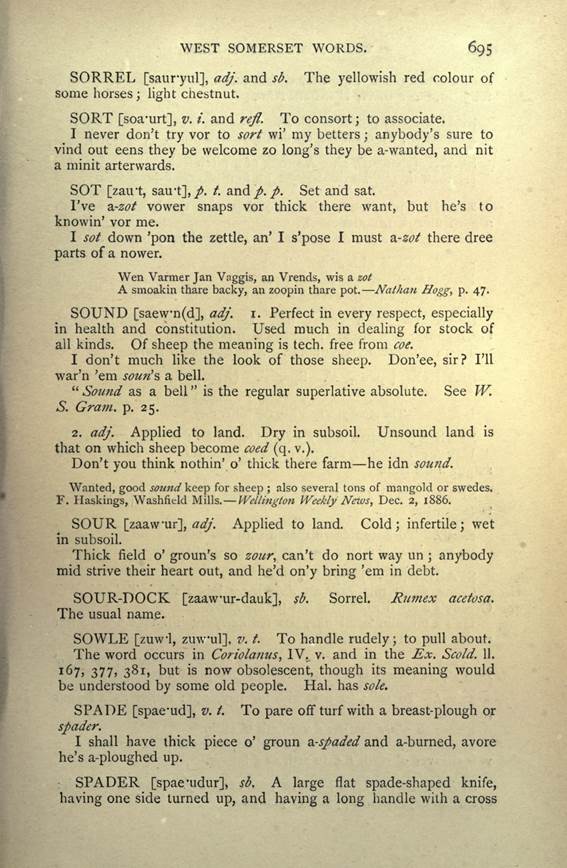
(delwedd B9555) (tudalen 695)
|
694 WEST SOMERSET WORDS.
another off; as the train started he merely said to his friend” zo longT July 17, 1887.
SOMAT [zaunvut], sb. Somewhat; something.
[Wuul, soa f us! aay z\im ttiz piirdee nuy tuym vur tae'u zaum'ut t-ai-t,] well, soce! (q. v.) I think it is
pretty nigh time for to have something
to eat.
SOME [sairm, zairm], adj. Used constantly for some persons. Very commonly followed by dm i. e. of them.
Some do it and some don't. I baint same's some tfm, all vor therzul, I baint. Some dm baint never
plased 'thout they've a-got it all
there own farshin'.
SOME WAY [saunr wai, zaunr wai], adv. Somehow. (Always.) [Aay spoanz mils maa'ch ut zauw wai ur
nuudh'ur,] I suppose I must contrive
it somehow or other.
SON OF A BITCH [sumr uv u bii'ch]. This and son of a whore are about the commonest epithets of
quasi abuse. Perhaps they hardly
amount to abuse, and are no more than coarse
colloquialisms, like Shakespeare's ''whoreson'' 1 See OSBIRD.
SOOK, SOOKY [seo-k, zeo'kee], pr. n. Susan.
SOONDER [zeo'ndur], comp. adj. Sooner; rather. (Usual form.) See D. i.
I'd zoonder be a-transported'n ever I'd live way jis drunkin, holler-mouthed old fuller's he.
SOONY [zeo-nee], v. i. To swoon; to faint less com. than to drap away.
Hon they told her eens he was dead, her zoon'ed right away, poor soul, her did.
A wel fair knijt was Firumbras: ounarmid wan he lay,
Ac ys Fysage al discolourid was: for is blod was gon. away;
Thre si);es a sounede afforn hem J>ere: for angwys of ys wounde.
Sir FerumbrciS) 1. 1078.
SORE [zoa-ur], adj. Displeased; annoyed; angry.
[Ee-z tuurbl zoa'ur baewd ut, aay shoa-r-ee; neef mreebau-dee du tuul- oa ut, uun-ee wau'n wuurd, dhu
faat'-s een clhu vuyur turaak-lee,] he
is terrible sore about it, I assure ye; if one does but speak of it, only one word, the fat is in
the fire directly.
SORE FINGER [zoa-ur ving-ur], sb. Need; time of need.
I did-n want-n, but I thort I'd put-n away; he'd sure to come vur a zore vinger.
We'll keep back zome o' thick heap o' dressing for a zore ringer i. e. in case we should require it. Nov.
1879.
The expression in the dialect has the precise force of” putting aside for a rainy day."
|
|
|
|
|
ñ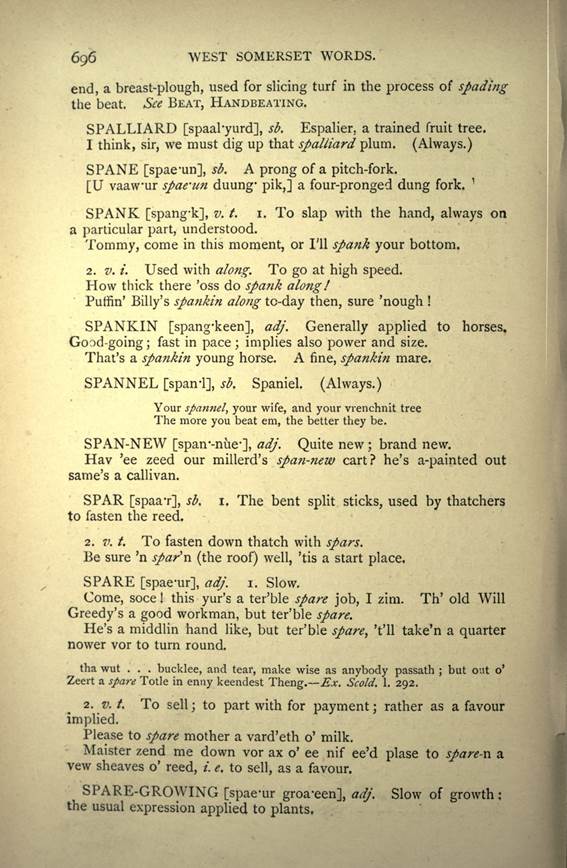
(delwedd B9556) (tudalen 696)
|
WEST SOMERSET WORDS. 695
SORREL [sauryul], adj. and sb. The yellowish red colour of some horses; light chestnut.
SORT [soa-urt], v. i. and refl. To consort; to associate.
I never don't try vor to sort wi' my betters; anybody's sure to vind out eens they be welcome zo long's
they be a-wanted, and nit a minit
arterwards.
SOT [zairt, sau't],/. t. and/./. Set and sat.
I've &-zot vower snaps vor thick there want, but he's to knowin' vor me.
I sot down 'pon the zettle, an' I s'pose I must &-zot there dree parts of a nower.
Wen Varmer Jan Vaggis, an Vrends, wis a zot
A smoakin thare backy, an zoopin thare pot. Nathan Hogg, p. 47.
SOUND [saewn(d], adj. i. Perfect in every respect, especially in health and constitution. Used much in
dealing for stock of all kinds. Of
sheep the meaning is tech. free from coe.
I don't much like the look of those sheep. Don'ee, sir? I'll war'n 'em svun's a bell.
" Sound as a bell” is the regular superlative absolute. See W. S. Gram. p. 25.
2. adj. Applied to land. Dry in subsoil. Unsound land is that on which sheep become coed (q. v.).
Don't you think nothin' o' thick there farm he idn sound.
Wanted, good sound keep for sheep; also several tons of mangold or
swedes. F. Haskings, Washfield Mills.
Wellington Weekly News, Dec. 2, 1886.
SOUR [zaawur], adj. Applied to land. Cold; infertile; wet in subsoil.
Thick field o' groun's so zour, can't do nort way un; anybody mid strive their heart out, and he'd on'y
bring 'em in debt.
SOUR-DOCK [zaawur-dauk], sb. Sorrel. Rumex acetosa. The usual name.
SOWLE [zuwl, zuwul], v. t. To handle rudely; to pull about.
The word occurs in Coriolanus, IV. v. and in the Ex. Scold. 11. J 67, 377, 381, but is now obsolescent,
though its meaning would be understood
by some old people. Hal. has sole.
SPADE [spae-ud], v. t. To pare off turf with a breast-plough or spader.
I shall have thick piece o' groun ^.-spaded and a-burned, avore he's a-ploughed up.
SPADER [spae'udur], sb. A large flat spade-shaped knife, having one side turned up, and having a
long handle with a cross
|
|
|
|
|
ñ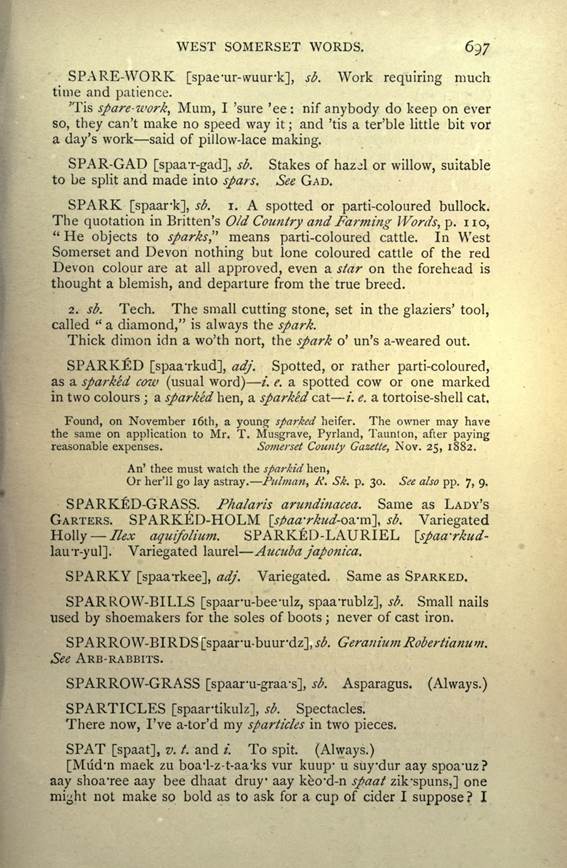
(delwedd B9557) (tudalen 697)
|
696 WEST SOMERSET WORDS.
end, a breast-plough, used for slicing turf in the process of spading the beat. See BEAT, HANDBEATING.
SPALLIARD [spaal'yurd], sb. Espalier, a trained fruit tree. I think, sir, we must dig up that spalliard
plum. (Always.)
SPANE [spae'un], sb. A prong of a pitch-fork.
[U vaawur spae'un duung* pik,] a four-pronged dung fork. 1
SPANK [spang'k], v. t. i. To slap with the hand, always on a particular part, understood.
Tommy, come in this moment, or I'll spank your bottom.
2. v. i. Used with along. To go at high speed.
How thick there 'oss do spank along!
Puffin' Billy's spankin along to-day then, sure 'nough!
SPANKIN [spang'keen], adj. Generally applied to horses. Good-going; fast in pace; implies also
power and size. That's a spankin young
horse. A fine, spankin mare.
SPANNEL [spairl], sb. Spaniel. (Always.)
Your spannel, your wife, and your vrenchnit tree The more you beat em, the better they be.
SPAN-NEW [span'-nue-], adj. Quite new; brand new. Hav 'ee zeed our millerd's span-new cart?
he's a-painted out same's a callivan.
SPAR [spaa-r], sb. i. The bent split sticks, used by thatchers to fasten the reed.
2. v. t. To fasten down thatch with spars.
Be sure 'n spar'n (the roof) well, 'tis a start place.
SPARE [spae-ur], adj. i. Slow.
Come, soce! this yur's a ter'ble spare job, I zim. Th' old Will Greedy's a good workman, but ter'ble spare.
He's a middlin hand like, but ter'ble spare, 't'll take'n a quarter nower vor to turn round.
tha wut . . . bucklee, and tear, make wise as anybody passath; but out
o' Zeert a spare Totle in enny
keendest Theng. .*. Scold. 1. 292.
2. v. t. To sell; to part with for payment; rather as a favour implied.
Please to spare mother a vard'eth o' milk.
Maister zend me down vor ax o' ee nif ee'd plase to spare-n a vew sheaves o' reed, /. e. to sell, as a
favour.
SPARE-GROWING [spae-ur groa-een], adj. Slow of growth: the usual expression applied to plants.
|
|
|
|
|
ñ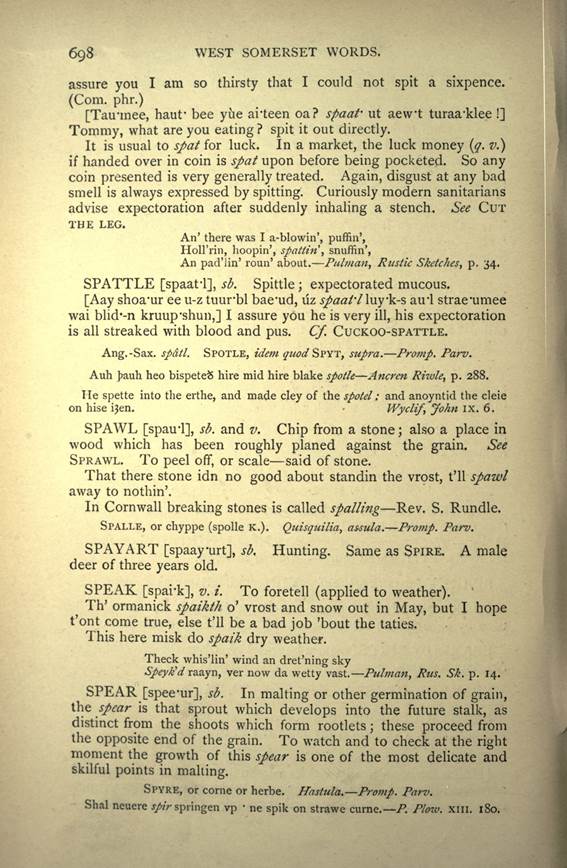
(delwedd B9558) (tudalen 698)
|
WEST SOMERSET WORDS. 697
SPARE-WORK [spae'ur-wuurk], sb. Work requiring much time and patience.
'Tis spare-work. Mum, I 'sure 'ee: nif anybody do keep on ever so, they can't make no speed way it; and
'tis a ter'ble little bit vor a day's
work said of pillow-lace making.
SPAR-GAD [spaa-r-gad], sb. Stakes of hazjl or willow, suitable to be split and made into spars. See GAD.
SPARK [spaark], sb. i. A spotted or parti-coloured bullock. The quotation in Britten's Old Country and
Farming Words, p. no, “He objects to sparks," means parti-coloured
cattle. In West Somerset and Devon
nothing but lone coloured cattle of the red
Devon colour are at all approved, even a star on the forehead is thought a blemish, and departure from the
true breed.
2. sb. Tech. The small cutting stone, set in the glaziers' tool, called” a diamond," is always the
spark.
Thick dimon idn a wo'th nort, the spark o' un's a-weared out.
SPARKED [spaa'rkud], adj. Spotted, or rather parti-coloured, as a sparked cow (usual word) /". e. a
spotted cow or one marked in two
colours; a sparked hen, a sparked cat /. e. a tortoise-shell cat.
Found, on November i6th, a young sparked heifer. The owner may have the same on application to Mr. T. Musgrave,
Pyrland, Taunt on, after paying
reasonable expenses. Somerset County Gazette, Nov. 25, 1882.
An' thee must watch the sparkid hen,
Or her'll go lay astray. Pulman, R. Sk. p. 30. See also pp. 7, 9.
SPARKED-GRASS. Phalaris arundinacea. Same as LADY'S GARTERS. SPARKED-HOLM {spaa-rkud-mm], sb.
Variegated Holly Ilex aquifolium.
SPARKED-LAURIEL {spaa'rkud-lauT-yul]. Variegated laurel Aucuba japonica.
SPARKY [spaa-rkee], adj. Variegated. Same as SPARKED.
SPARROW r -BILLS [spaaru-bee-ulz, spaa'rublz], sb. Small nails used by shoemakers for the soles of boots;
never of cast iron.
SPARROW-BIRDS [spaaru-buurdz], sb. Geranium Robertianum. See ARB-RABBITS.
SPARROW-GRASS [spaaru-graa-s], sb. Asparagus. (Always.)
SPARTICLES [spaartikulz], sb. Spectacles.
There now, I've a-tor'd my sparticles in two pieces.
SPAT [spaat], v. t. and i. To spit. (Always.)
[Mud 'ii maek zu boa*l-z-t-aa*ks vur kuup* u suydur aay spoa'uz? aay shoa'ree aay bee dhaat druy aay keo'd-n
spaat zik'spuns,] one mi^ht not make
so bold as to ask for a cup of cider I suppose? I
|
|
|
|
|
ñ
(delwedd B9559) (tudalen 699)
|
698 WEST SOMERSET WORDS.
assure you I am so thirsty that I could not spit a sixpence. (Com. phr.)
[Tau-mee, haut' bee yue ai'teen oa? spaat' ut aewt turaa'klee!] Tommy, what are you eating? spit it out
directly.
It is usual to spat for luck. In a market, the luck money (q. v.) if handed over in coin is spat upon before
being pocketed. So any coin presented
is very generally treated. Again, disgust at any bad smell is always expressed by spitting.
Curiously modem sanitarians advise
expectoration after suddenly inhaling a stench. See CUT
THE LEG.
An' there was I a-blowin', puffin',
Holl'rin, hoopin', spattin\ snuffin',
An pad'lin' roun' about. Pulman, Rustic Sketches, p. 34.
SPATTLE [spaat-1], sb. Spittle; expectorated mucous.
[Aay shoa'ur ee u-z tuurbl bae'ud, liz j^za/'/luyk-s airl strae'umee wai blid'-n kruup'shun,] I assure you he is
very ill, his expectoration is all
streaked with blood and pus. Cf. CUCKOO-SPATTLE.
Ang.-Sax. sp&tl. SPOTLE, idem guod SPYT, supra. Promp. Parv. Auh ))auh heo bispete<S hire mid hire
blake spoilt Ancren Riiule, p. 288.
He spette into the erthe, and made cley of the spotel: and anoyntid the
cleie on hise i^en. Wyclif, John IX.
6.
SPAWL [spairl], sb. and v. Chip from a stone; also a place in wood which has been roughly planed against
the grain. See SPRAWL. To peel off, or
scale said of stone.
That there stone idn no good about standin the vrost, t'll spawl away to nothin'.
In Cornwall breaking stones is called spalling Rev. S. Rundle. SPALLE, or chyppe (spolle K.). Quisquilia,
as-sula. Promp. Parv.
SPAYART [spaayurt], sb. Hunting. Same as SPIRE. A male deer of three years old.
SPEAK [spark], v. i. To foretell (applied to weather). Th' ormanick spaikth o' vrost and snow out
in May, but I hope font come true,
else t'll be a bad job 'bout the taties.
This here misk do spaik dry weather.
Theck whis'lin' wind an dret'ning sky
Speytfd jn&yn t ver now da wetty vast. Pulman, Rus. Sk. p. 14.
SPEAR [spee'ur], sb. In malting or other germination of grain, the spear is that sprout which develops
into the future stalk, as distinct
from the shoots which form rootlets; these proceed from the opposite end of the grain. To watch and
to check at the right moment the
growth of this spear is one of the most delicate and skilful points in malting.
SPYRE, or corne or herbe. Hastula. Promp. Parv. Shal neuere J/?> springen vp ne spik on
strawe curne. P. Ploiu. xm. 180.
|
|
|
|
|
ñ
|
WEST SOMERSET WORDS. 699
SPEER [spee'ur], v. i. Generally followed by into or about. To pry, spy, ferret, search out by inquiry; to
watch.
That's who 'twas, safe enough! I year'd how th 1 osbird had a-bin speerin about down there, damn un!
Ang.-Sax. spirian, to inquire, to track.
)>ai toke ]>air gesting in }>e tun,
And spird him efter vp and dun. Cursor Mundi, Magi, 1. 71-
SPELL [spuul], sb. A tale; a story; a narration.
Paason gid us a goodish spell ta-day. Hence Gospel, &c.
Pulman, A'. Sk. p. 141.
SPENSES [spai-nsiiz], sb. pi. Expenses. (Very com.)
For ill. see OVERDROW. This is not merely a modern contraction.
Ne he ne berefc no garsum bute gnedeliche his spense, ne clones noucSer,
bute one )>eo J>et he hauefc
neod to. Ancren Riwle, p. 350.
SPENSE; vbi expense Cath. Ang.
Hiren false confessouris wi]> grete spensis ]>at leden hem faste to
helle.
Wyclif, Works, p. 186.
SPEWY [spyue-ee], v. I i. To vomit.
'Twas a breath , sure 'nough; nif I wadn fit to spewy.
2. adj. Wet; undrained. Spewy ground is when water seems to ooze out at the surface.
Thick there vive acres is a nasty spewy sort of a field, he lies zour and wet like.
SPICKET [spik-ut], sb. Spigot; a wooden tap, of which the pin is made to screw in, and so close the
fawcet. It is used chiefly in brewing
(at home) to draw off the wort from the” keeve." Usually called [pain'un spik'ut^ pen and
spigot.
SPICKETTY [spik-utee], adj. Speckled; spotted. The word implies much smaller spots than sparked.
The eggs of thrushes, robins, &c.
are spicketty, while variegated plants are mostly sparked.
They there spicketty Bramahs be the best sort o' vowls.
SPILE [spuytil], v. t. To steal liquor by boring a small hole into the cask, and afterwards stopping it
with a peg. This very common theft is
usually made undiscoverable by driving up one
of the hoops of the cask, and then boring the hole on the spot, which will be covered by replacing the
hoop.
SPILL [spee'ul],^. i. Spindle. Any arbor or axle upon which a wheel revolves, as” the spill of a
wheel-barrow/'
[Aay mus ae'u nue* spee'ul tu mee kwee'ul tuurn, ee'z prau'pur u-wae'urd aewt,] I must have a new spindle
for my quill turn, it is entirely worn
out. See WORR A.
|
.....








































































































































































































